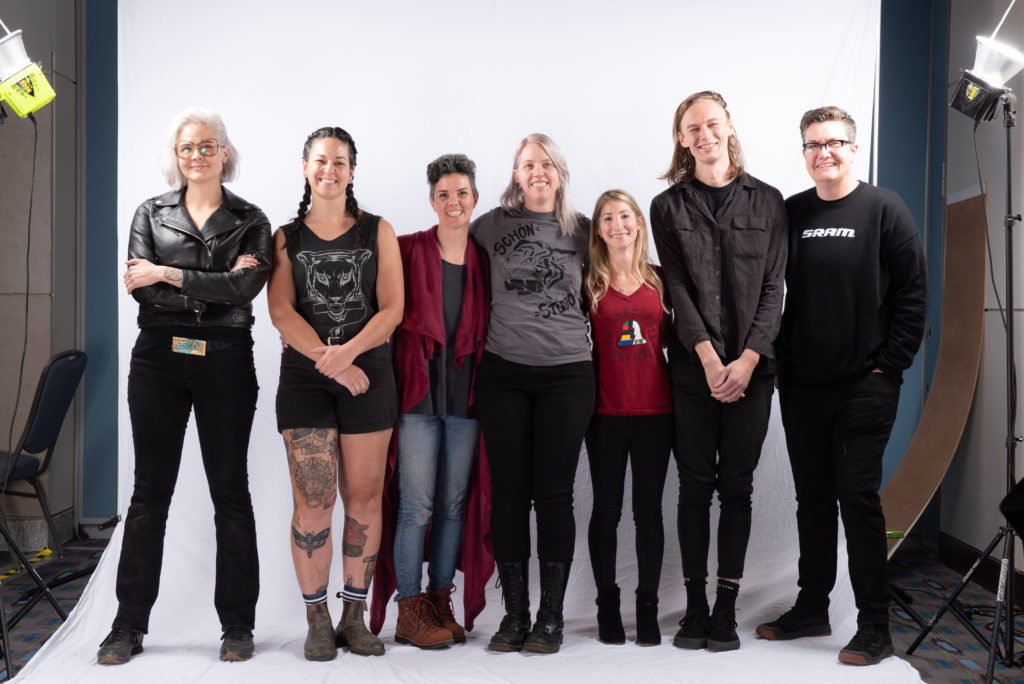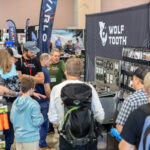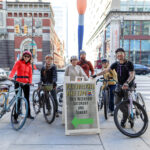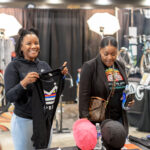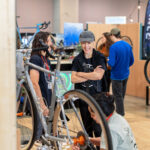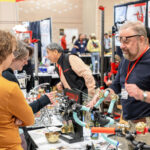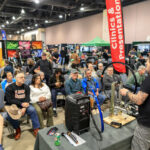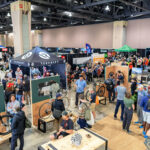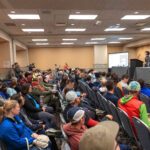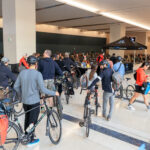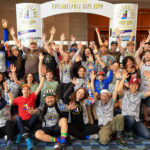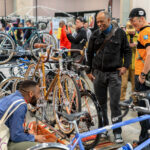PBE 2026
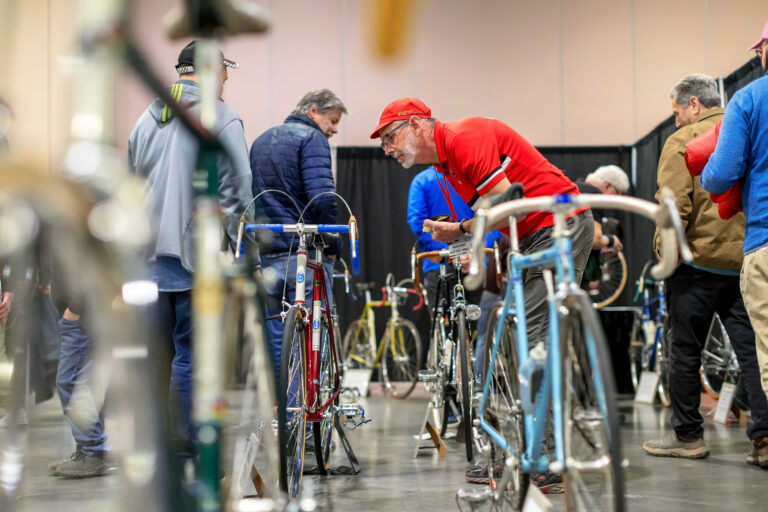
Vintage Bike Display
Saturday, March 14th 10:00AM – 5:00PM & Sunday, March 15th 10:00AM-4:00PM The Philly Bike Expo will once again feature a collection of vintage lightweight bicycles provided by leading vintage bicycle collectors and dealers. The display is carefully curated by Michael Kone of Classic Bicycles Auburn to show off both ultra rare exotics as well as […]
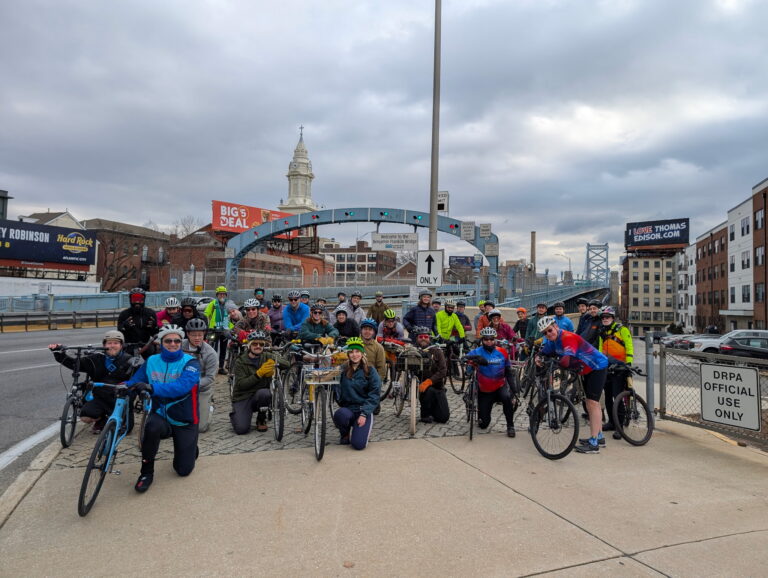
Ride to the Expo with the Philly Charity Bike Rides
Saturday, March 14th Meeting at Broad and Race streets at 8:00 am we will be rolling out at 8:15 for a 15 ish mile ride showing off some beautiful and iconic scenes of Philadelphia. We will have multiple leaders and all paces are welcome. This is a road ride so all bikes and all abilities […]
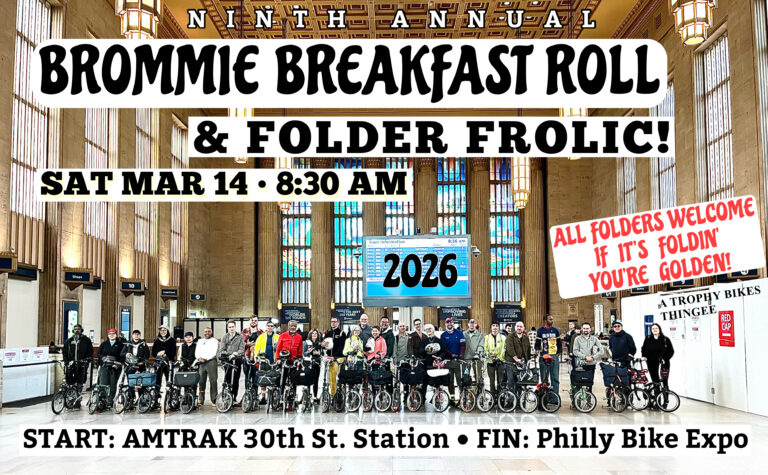
The Ninth Annual BROMMIE BREAKFAST ROLL + FOLDER FROLIC RIDES AGAIN!
Saturday, March 14th, 8:30AM. Meet at Center Info Booth inside 30th Street Station, 30th + Market St. ROLLS ( Party Pace ) at 9 AM and aim to reach the PHILLY BIKE EXPO right around doors open time. Be on time so you get in the CANDID GROUP GLAMOUR PHOTO. YES, scads of BROMPTONS predicted, but […]
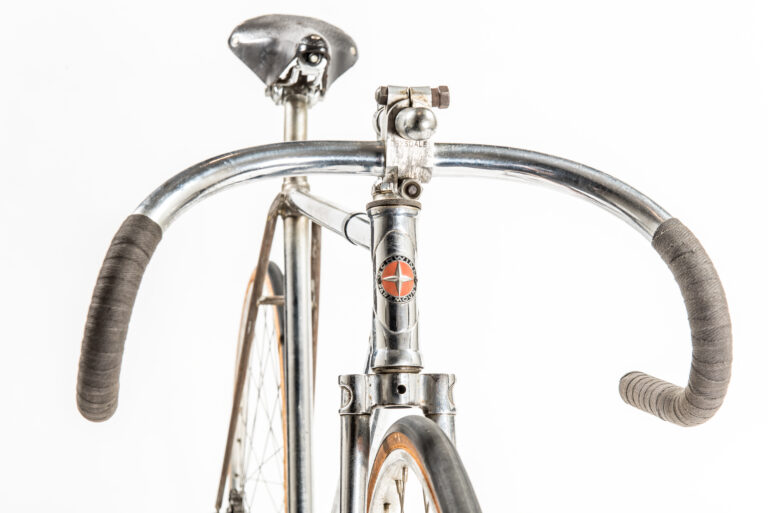
Schwinn History – The Story Behind the Story
Saturday March 14th, 12:00 PM Seminar room: 109B (Ground Level – 12th & Arch Streets entrance) Presented by Richard Schwinn Over a century after Schwinn’s founding, it remains the number one name in the world of bicycles in America. For much of this time, it has operated in relative secret. Now you can learn the […]

Why Harrisburg Matters to Road Safety
Saturday March 14th, 3:00 PM Seminar room: 109A (Ground Level – 12th & Arch Streets entrance) Presented by Piscitello Law and PA Safe Roads PAC In this seminar, Piscitello Law will introduce our cycling community to a key partner in change – the PA Safe Roads Political Action Committee (PAC). We discuss why the PAC […]
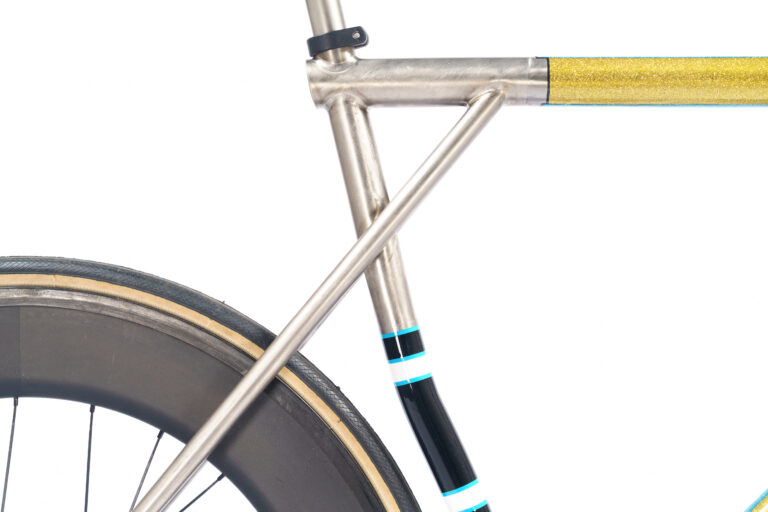
The Science of Corrosion for Bike People
Saturday March 14th, 10:30 AM Seminar room: 110A/B (Ground Level – 12th & Arch Streets entrance) Presented by Keithen Orson An introduction to the science of corrosion and why it matters for your bicycle. Common bike maintenance issues like stuck seatposts and rusty chains are discussed with an eye towards understanding different types of corrosion […]
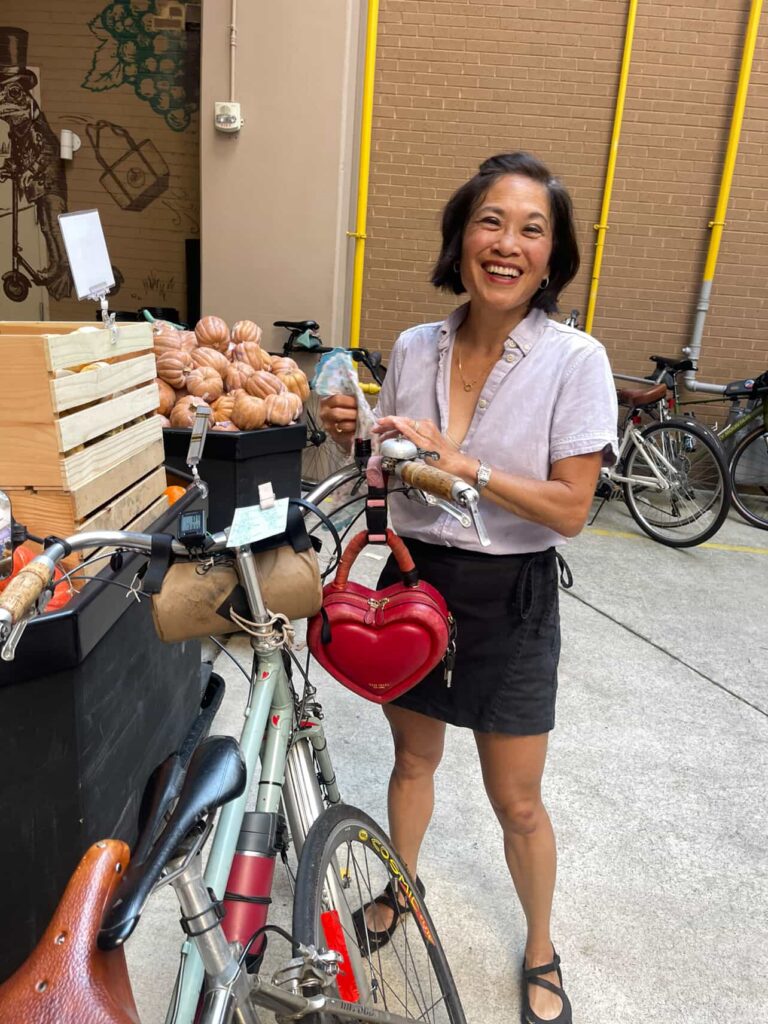
10 Things to Help you Bike More
Saturday March 14th, 10:30 AM Seminar room: 109A (Ground Level – 12th & Arch Streets entrance) Presented by Pamela Murray Every day can be a bike adventure when you’re well-equipped. Ride from home to your next bike adventure. Find out 10 things that help me to bike daily.
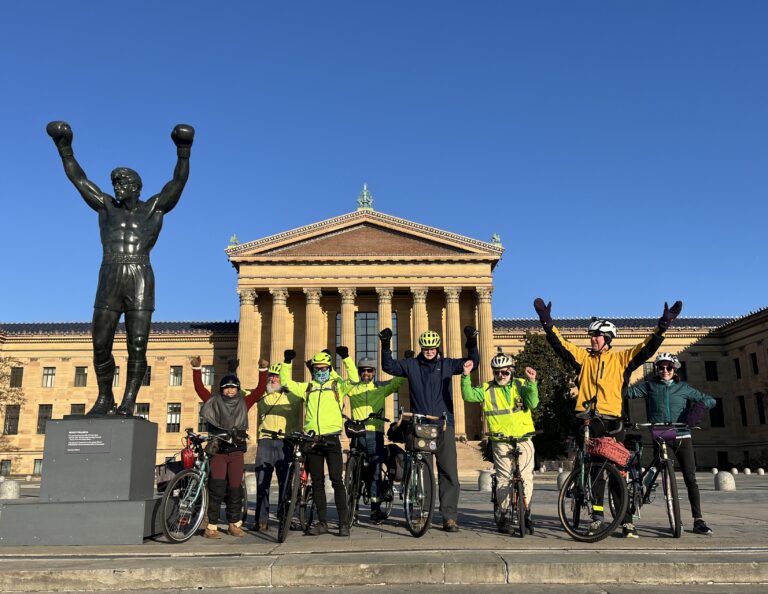
CyclingSavvy Ride to PBE – 2026 Edition
Sunday, March 15th Meet at 7:45 am at the Convention Center/Roll at 8:00 am (12th & Arch Streets entrance, across from the Reading Terminal Market) Come see the sights of Philly with CyclingSavvy Instructors demonstrating a few of our strategies and techniques. Part sightseeing, part CyclingSavvy demonstration ride. Building your situational awareness using CyclingSavvy skills […]

International Women’s Day 107K
Saturday March 14, 8:00AM (Registration required) Join the Pennsylvania Randonneurs for a welcoming populaire that rolls out from Philadelphia, follows quiet suburban roads to Evansburg State Park, and returns to the Expo. Randonneuring events are unsupported, self-paced, and non-competitive, with camaraderie very much at the heart of the rides. Expect to see a wide range […]
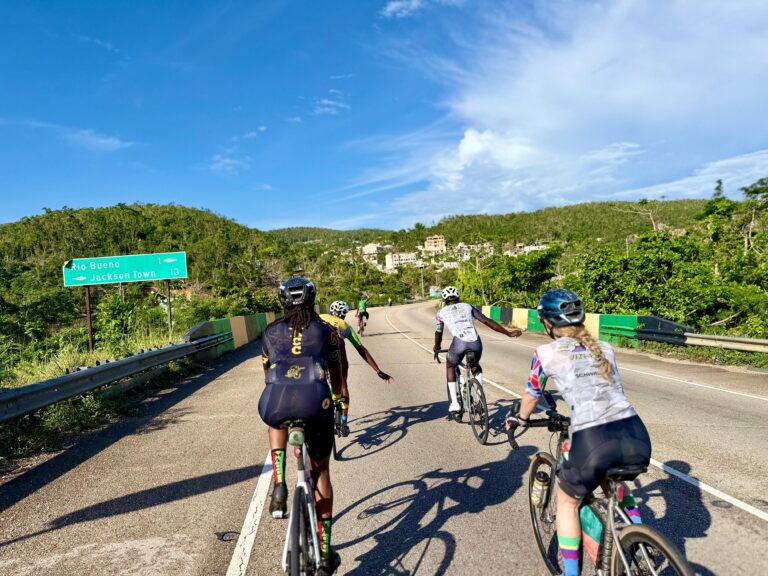
Jamaica: Pedalling through Reggae Paradise – Part 2
Saturday March 14th, 1:30 PM Seminar room: 110A/B (Ground Level – 12th & Arch Streets entrance) Presented by the Jamaica Tourist Board Whether it be mountain, paved road, gravel, triathlon, leisure or competitive… any kind of cycling in Jamaica is done with a reggae beat. Join the Jamaica Tourist Board team and Jamaica National Cycling […]

Crank Length: The long and Short of It
Sunday March 15th, 12:00 PM Seminar room: 109B (Ground Level – 12th & Arch Streets entrance) Presented by Matt Appleman, Appleman Bicycles, Crank Length Enthusiast Crank length is super weird. The potential to increase speed and comfort by changing crank length is huge! Let’s take a look at the mystical and magical creature of crank […]

Learning the 911 Trail
Sunday March 15th, 3:00 PM Seminar room: 109A (Ground Level – 12th & Arch Streets entrance) Presented by Jeffrey McCauley- President of the September of the September 11th National Memorial Trail Alliance, Bruce White – Ride Director htcdigtree@aol.com Come and learn about the federally designated 911 Trail and a way to honor the heroes of […]
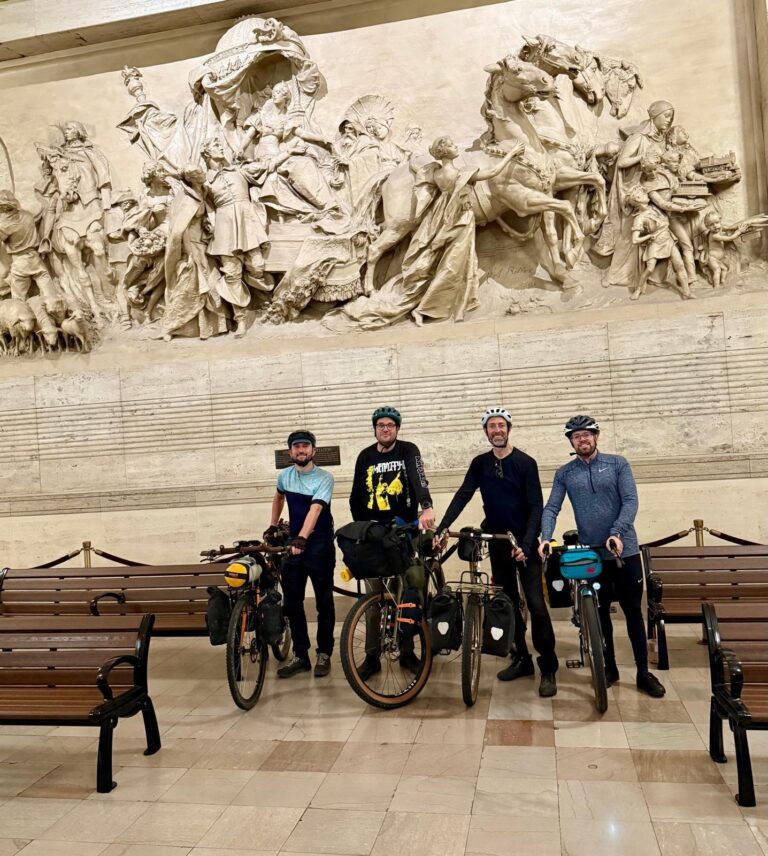
Bikepacking by Transit from Philadelphia
Sunday March 15th, 1:30 PM Seminar room: 110A/B (Ground Level – 12th & Arch Streets entrance) Presented by Julian Bender, The Jersey Devil Hunt Want to go bikepacking from Philadelphia, but don’t want to deal with cars? Our regional train network offers lots of options for access to bikepacking destinations near and far! Come to […]
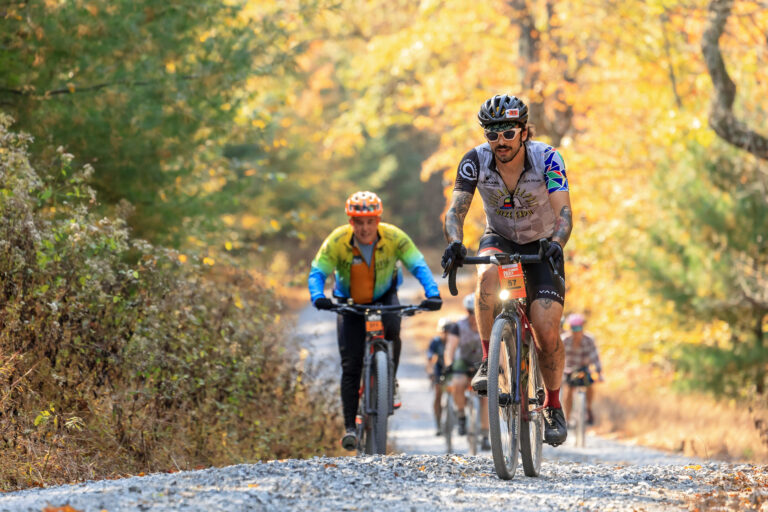
Find a gravel event in Pennsylvania that’s right for you.
Saturday March 14th, 1:30 PM Seminar room: 109B (Ground Level – 12th & Arch Streets entrance) Looking for a great gravel event to ride or race this year? Pennsylvania has plenty to choose from and 11 event directors are ready to tell you about them—speed dating style! Dave Pryor, Monkey Knife Fight, Grinduro, PA Gravel […]
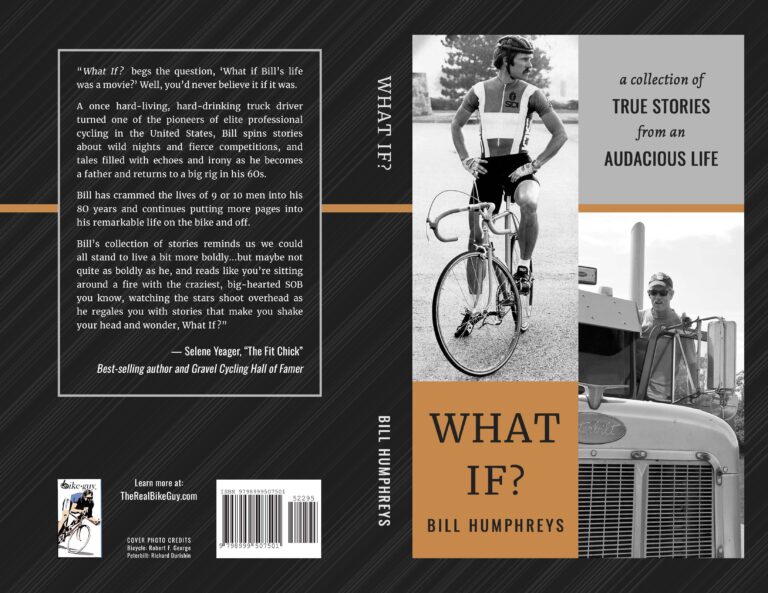
What If?
Sunday March 15th, 12:00 PM Seminar room: 110A/B (Ground Level – 12th & Arch Streets entrance) Presented by Bill Humphreys, Author Best selling cycling book with other adventures and distractions thrown in. This is an inspiring collection of real-life “What If’s,” chronicled by Bill Humphreys in an entertaining booklet. These stories offer readers not only […]

“OVERALLS Route” A Gravel Bike Adventure | 505 Miles
Saturday March 14th, 4:30 PM Seminar room: 109B (Ground Level – 12th & Arch Streets entrance) Film and Q&A Presented by Jake Haines, Pennsylvania Dirtbags Pennsylvania Erie to Philadelphia | A Gravel Bike Adventurepennsylvania.dirtbags Distance: 505 miElevation: 36.469 ft.5 Days – 4 Nights A band of misfits, commonly known as the Pennsylvania Dirtbags, headed from […]

Cycling Through the Menopause Transition
Saturday March 14th, 3:00 PM Seminar room: 110 A/B (Ground Level – 12th & Arch Streets entrance) Presented by Selene Yeager, Hit Play Not Pause Podcast Hot flashes. Mood swings. Sleepless nights. Joint pain. Body composition changes. Fatigue. And unpredictable performance. During the menopause transition, you never quite know which body will show up on […]

Learn to Ride Strategies for Tweens
Saturday March 14th, 1:30 PM Seminar room: 109 A (Ground Level – 12th & Arch Streets entrance) Presented by Sarah Billington Teaching older kids or tweens to learn to ride a bicycle (ages 9+ to 16) comes with some unique challenges that either child or adult curriculum are not well adapted. Focus areas of this […]

PA’s Endless Gravel & Wild Elk: Storytelling Through Pennsylvania’s Unpaved Backroads
Saturday March 14th, 10:30 AM Seminar room: 109B (Ground Level – 12th & Arch Streets entrance) Presented by David Landis, V2V Trails Northern Pennsylvania is home to more than 25,000 miles of unpaved roads—and two ambitious projects are bringing them to life. Endless Gravel PA and Wild Elk Gravel PA offer curated route networks of […]
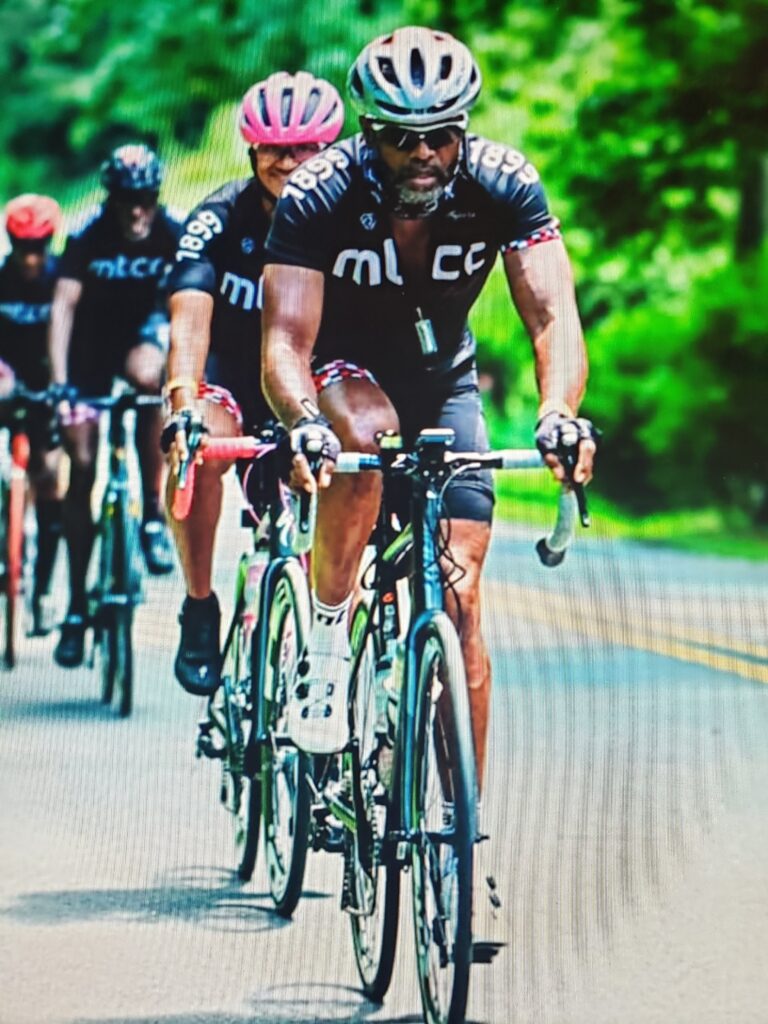
Hill Climbing Tips and Tricks
Saturday March 14th, 12:00 PM Seminar room: 110 A/B (Ground Level – 12th & Arch Streets entrance) Presented by Brian Williams, Major Taylor Techniques to help you ascend those dreaded hills properly, climb efficiently with minimum wasted effort and boost confidence.
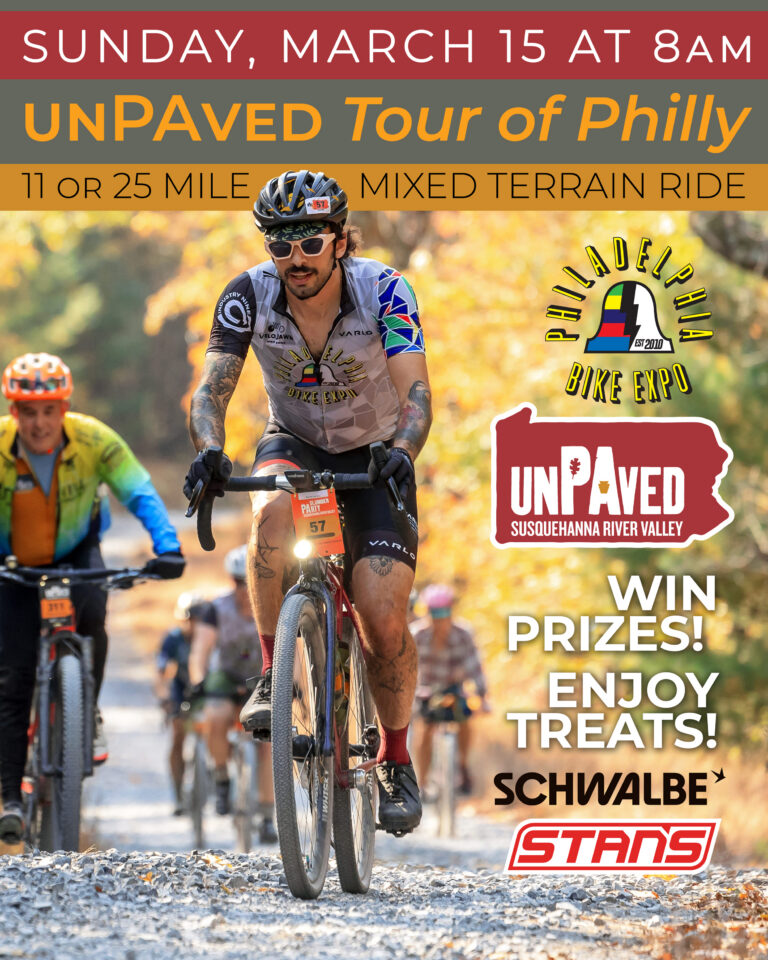
Tour of unPAved-Philly
Sunday, March 15th, Meet at the Rocky Steps at 7:50am/Roll at 8:00am Led by unPAved Pennsylvania and PBE Squad – Sponsored by Schwalbe & Stan’s
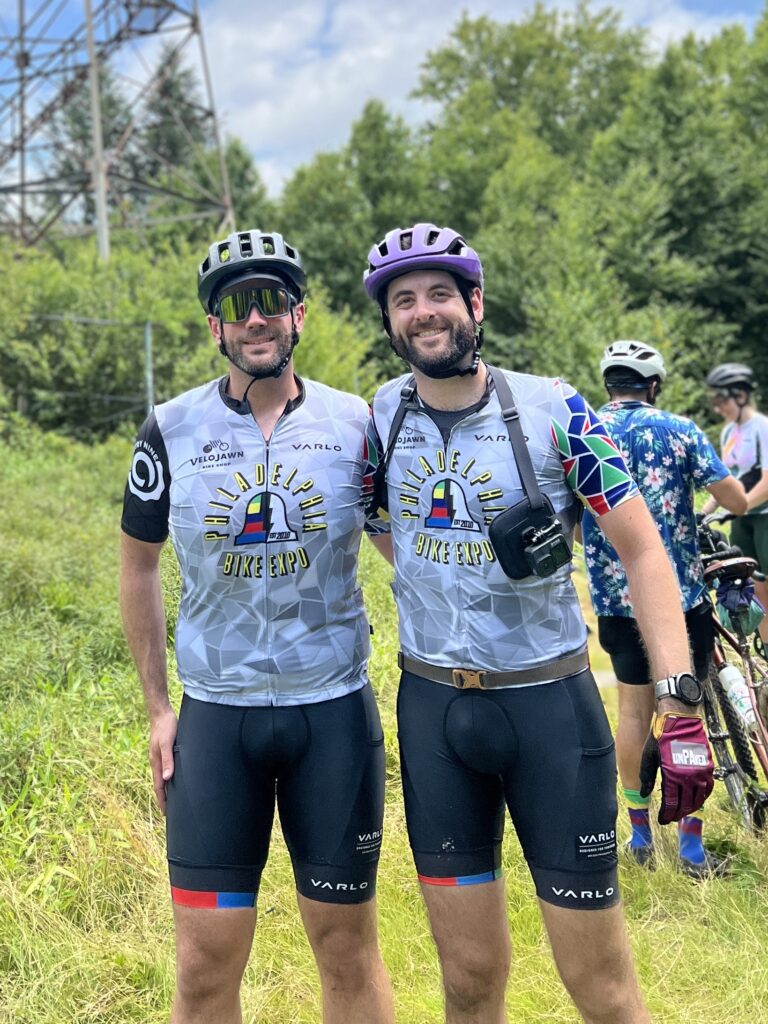
Ride with Dave & Bobby of the PBE Squad
Saturday March 14th, Meet at the Bala Cynwyd SEPTA train station at 9:00am Join local squad members Dave Kerwood and Bobby Graham for a guided ride to the Philadelphia Bike Expo from the Bala Cynwyd train station. The Bala Cynwyd train station is conveniently located at the top of the Cynwyd Heritage Trail, which we’ll […]
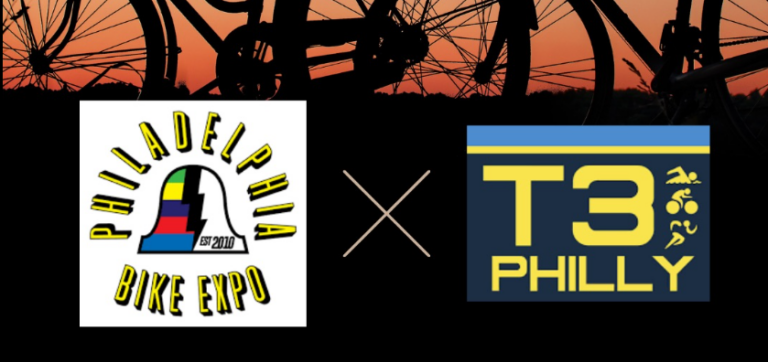
Trusty 20 with T3 Philly Multisport
Sunday March 15th, Meet at the Trellis @10:00am Who: ALL are welcome What: Wake up and ride with local triathlon group T3 Philly, along with our friends at the Philly Bike Expo! We’ll ride the beautiful “Trusty 20” route, starting at the Trellis by the art museum and concluding at the Philly Bike Expo, held […]
Plan B Training and Exercise When Sidelined by Illness or Injury
Sunday March 15th, 1:30 PM Seminar room: 109 A (Ground Level – 12th & Arch Streets entrance) Presented by Linda A. McGrane, MS, OTR/LOccupational Therapist and GerontologistOwner, Bike Tours by Linda, LLC Alternative training & exercise strategies during and after illness or injury, requiring short-term suspension of one’s cycling program during the rehabitation/reconditioning process. Positive […]
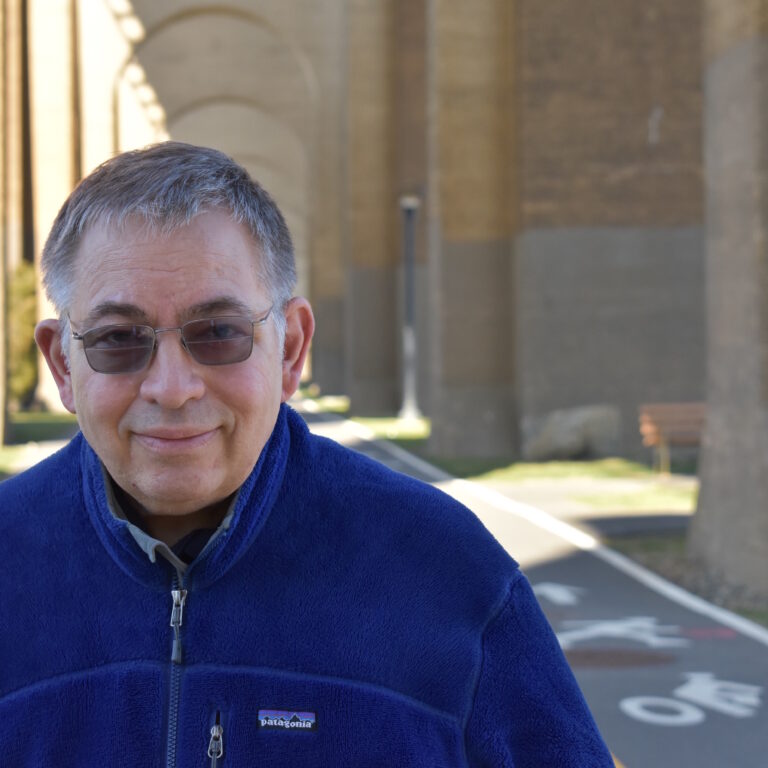
Bike Fit Unplugged
Saturday March 14th, 3:00 PM Seminar room: 109B (Ground Level – 12th & Arch Streets entrance) Presented by Happy Freedman, The Center for Bike Fit The science of bike fitting without a computer. Determining the proper positions on a bike through the use of gait evaluation, postural corrections, and exercise recommendations for a more stable, […]
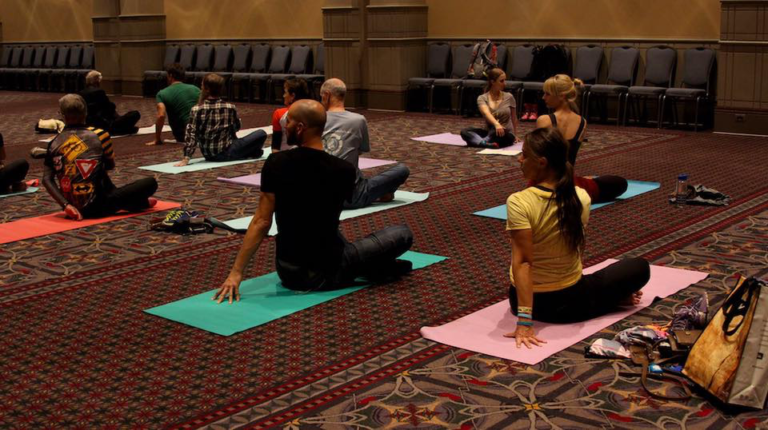
Yoga for Cyclists
Saturday March 14th, 12:00 PM Seminar room: 109A (Ground Level – 12th & Arch Streets entrance) Presented by Ruchama Bilenky, Certified Yoga Instructor and Therapist Bicycling utilizes parts of the body in ways that are different from standing, walking, running, or sitting. With today’s gas prices, more and more people are taking up cycling for […]
PBE 2025
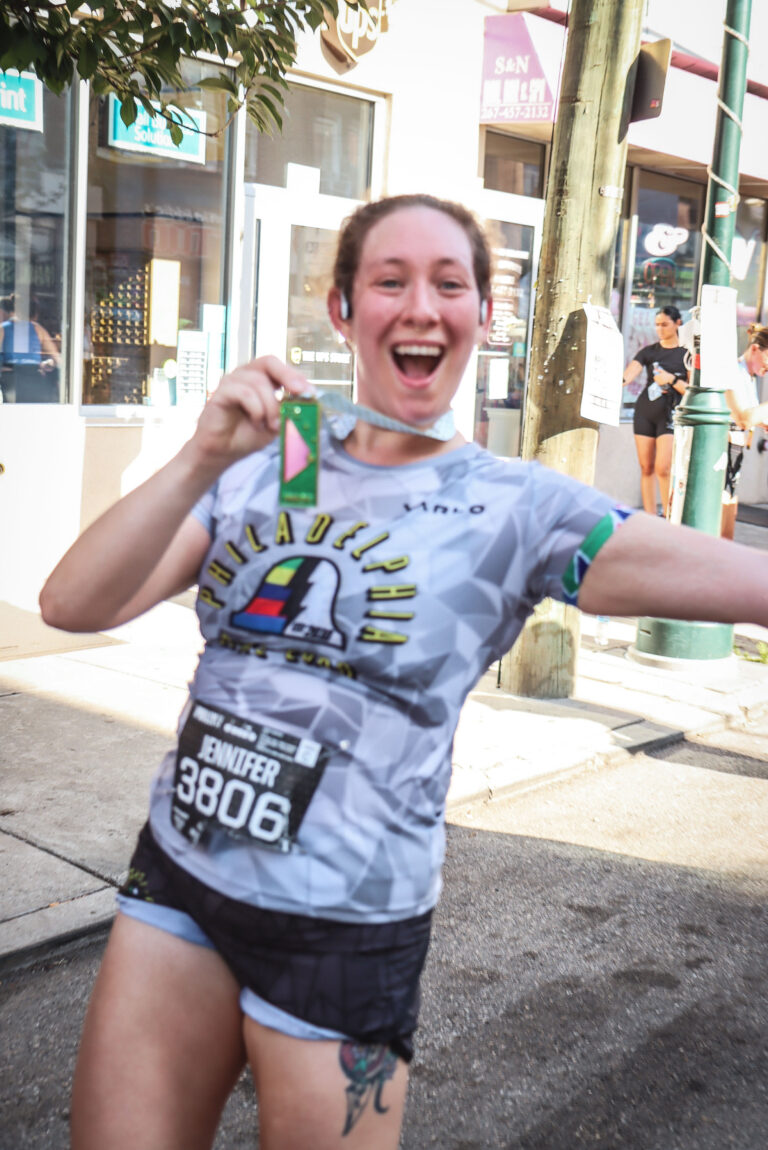
Varlo Running Apparel
Product Review by PBE Squad member, Jennifer Wright Finding the right configuration of running gear is always a gamble – does it chafe? Does it breathe? Does it stay in place? I’ve been running all season in Varlo’s running line and I have answers to all of these questions! A bit about me: – I run […]
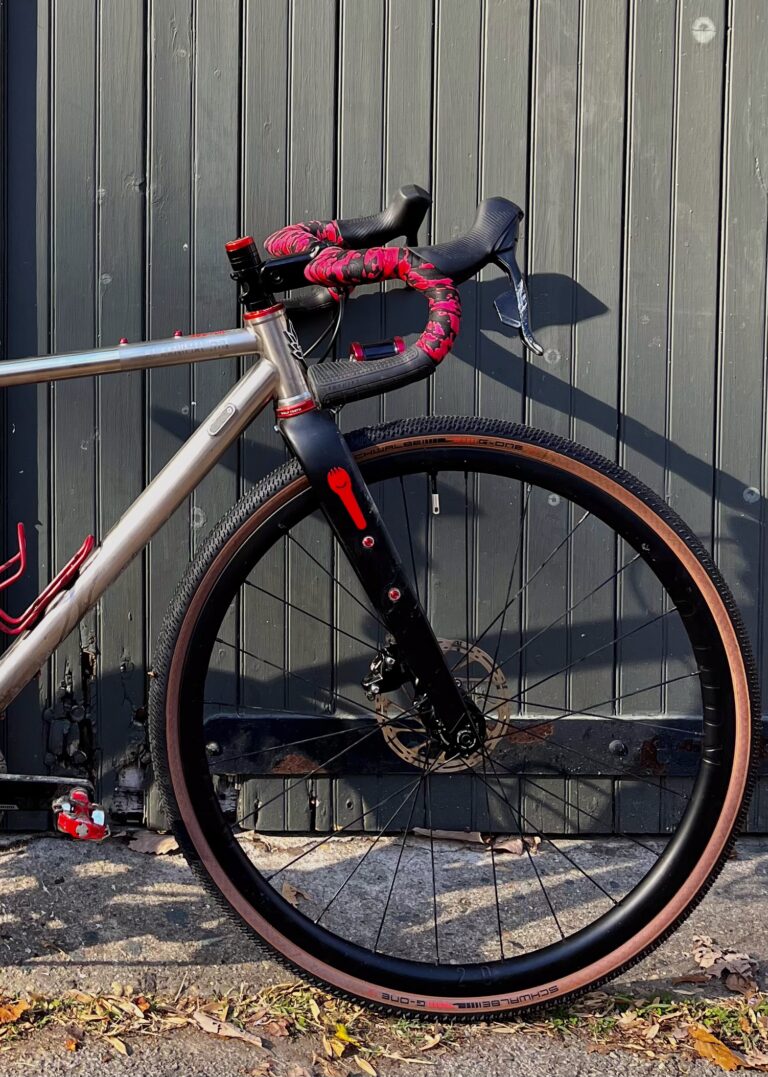
RedShift Sports ShockStop Suspension System
Product Review by PBE Squad member, Trong Nguyen As an avid cyclist who regularly tackles everything from gravel paths to limited mountain bike trails, and even rough city potholes (Philly residents would know this), I have always struggled to find the right balance between comfort and control on rough terrain. That is, until I tried the […]

Jamaica: Pedalling through Reggae Paradise
Saturday March 8th, 1:30 PM Seminar room: 125 (Atrium Level) Presented by the Jamaica Tourist Board and Coach Carlton Simmonds Whether it be mountain, paved road, gravel, triathlon, leisure or competitive… any kind of cycling in Jamaica is done with a reggae beat. Join the Jamaica Tourist Board team and Jamaica National Cycling coach Carlton […]

Strong Moms on Bikes: Pedaling Through Pregnancy & Postpartum
Sunday March 9th, 1:30 PM Seminar room: 125 (Atrium Level) Cycling doesn’t have to stop when motherhood begins! Whether you’re a pregnant rider looking to stay active or a postpartum cyclist eager to get back in the saddle, this session is designed to help you navigate the unique challenges of riding before, during and after […]
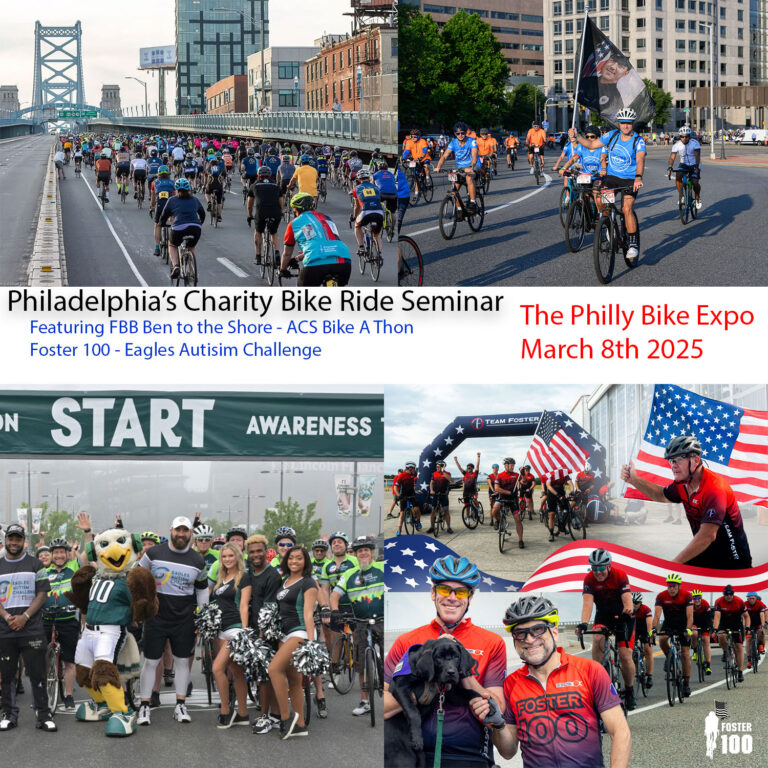
Philadelphia’s Charity Rides Seminar
Saturday March 8th, 10:30 AM Seminar Room, 124 Join us to hear about how The Foster 100, FBB Ben to the Shore, ACS Bike A Thon and the Eagles Autism Challenge are changing lives for the better everyday. We will go into what makes a charity bike ride special and how impactful it can be for […]
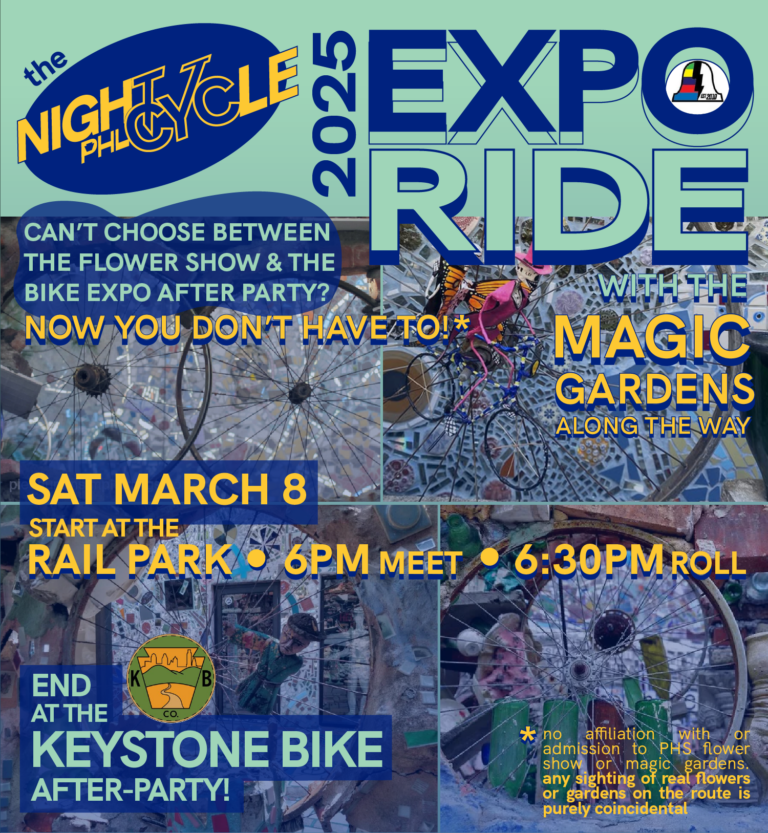
NightCycle PHL
Saturday March 8th, Meet at the Rail Park at 6:00pm, Roll at 6:30pm Led by Cycle Scene PHL Meet at the Rail Park: On Noble Street, between Broad St and 13th Street, half a mile from the Convention Center. Use the address 1309 Noble Street for GPS routing. Our destination: Keystone Bike’s Expo After-Party. Don’t […]
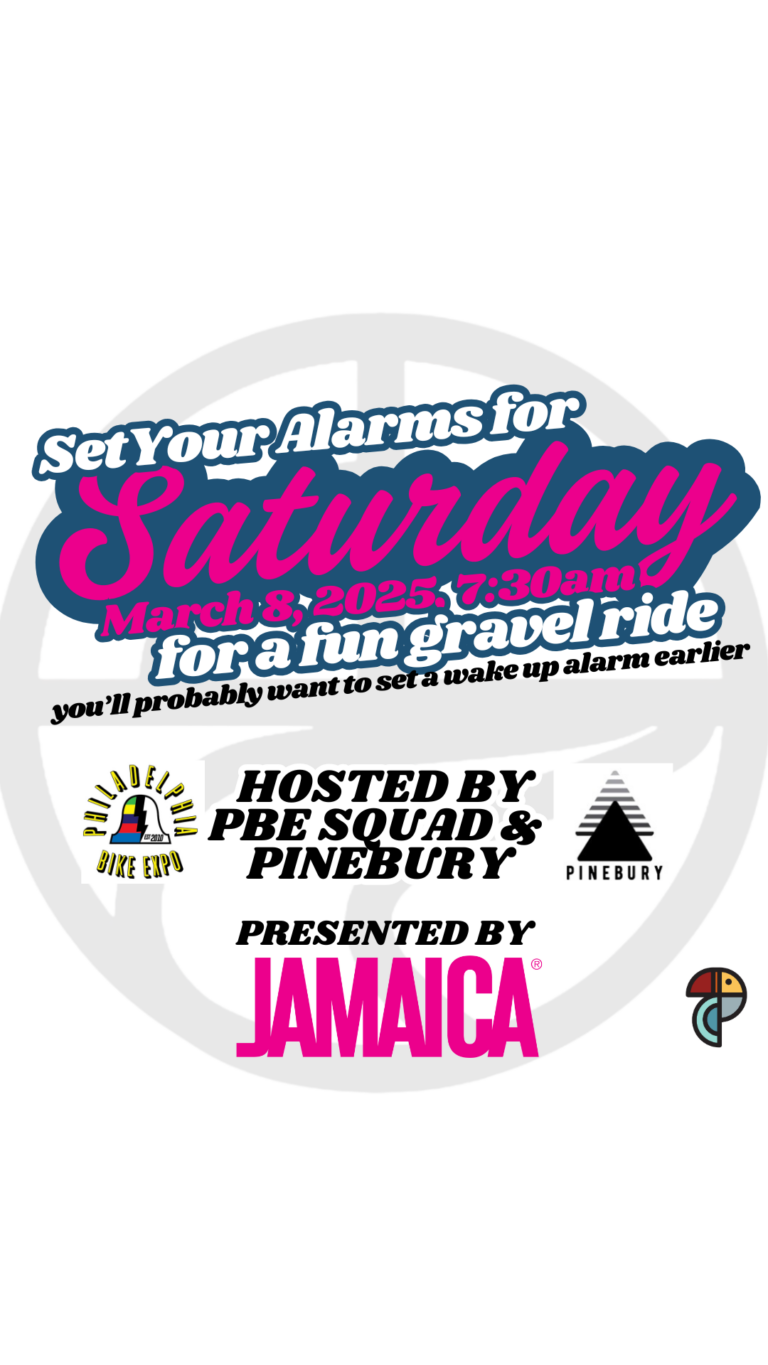
PBE x Pinebury Gravel Ride p/b Jamaica Tourist Board
Saturday March 8th, 7:15 AM 7:15 meetup 7:30 roll Meet at the Art Museum Steps
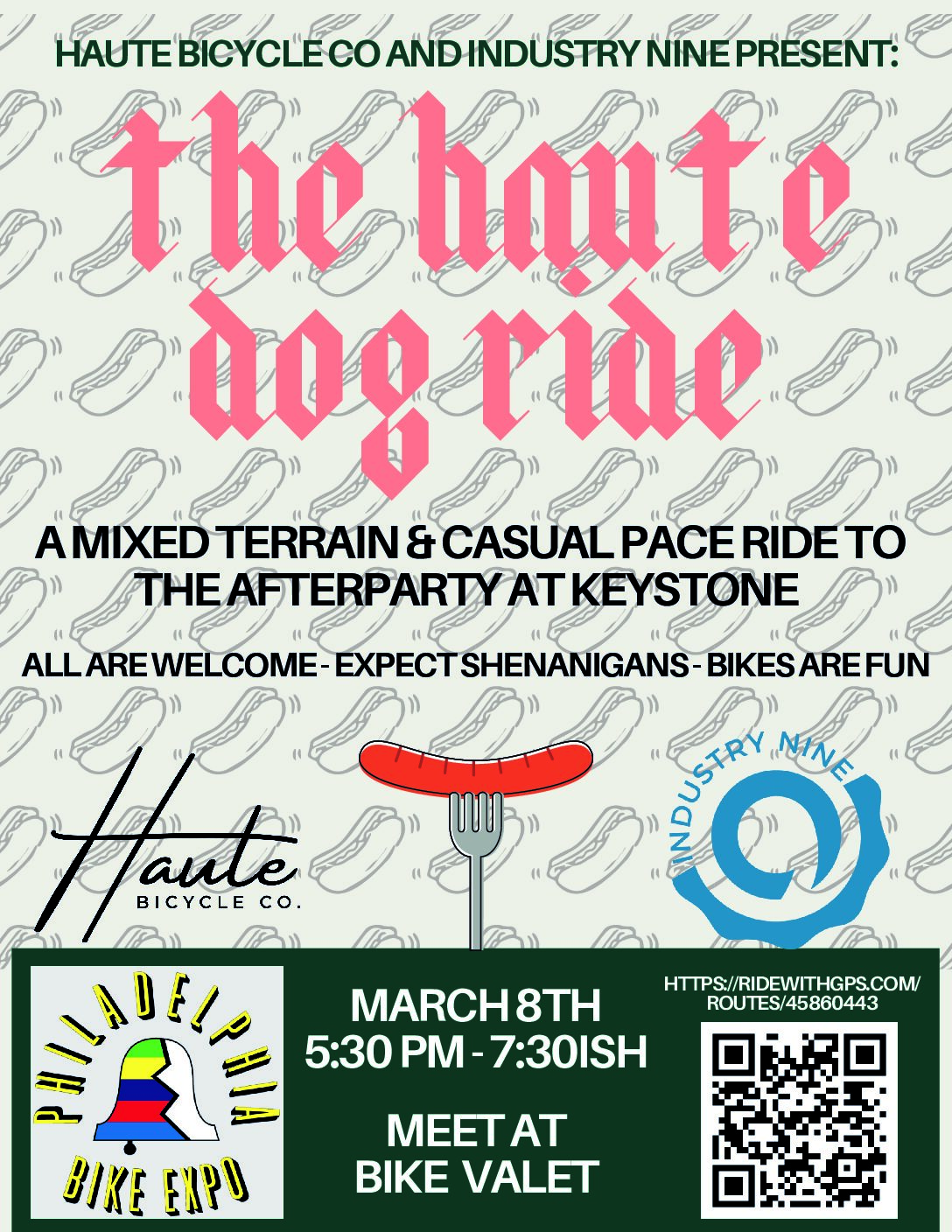
The Haute Dog Ride
Saturday March 8th, 5:30pm Meet at the Philly Bike Expo bike valet Hosted by Industry Nine + Haute.Bike Route: https://ridewithgps.com/routes/45860443
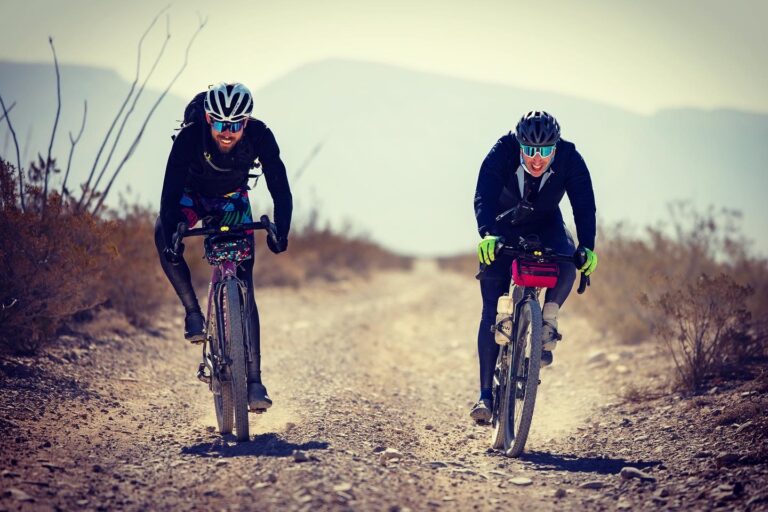
The Impossible Routes Q&A
Saturday March 8th, 4:30 PM Seminar room: 124 (Atrium Level) Join Jeremiah Bishop 3 time USA National Champion and founder of the Impossible Routes Documentary series on a brief talk about taking on the Impossible! Our limits in life are in many cases self imposed, how do we break thru and take on life’s biggest […]
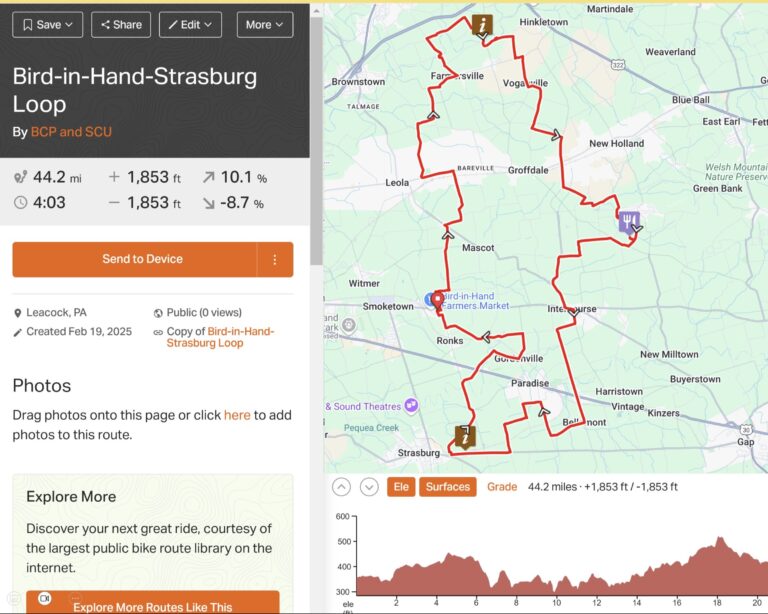
Planning a Bike Route using Ride with GPS
Sunday March 9th, 3:00 PM Seminar room: 125 (Atrium Level) Presented by Howie Wiener, Bicycle Club of Philadelphia What makes a good bike route? How can bike routes be created and shared with others? A group of experienced route planners from the Bicycle Club of Philadelphia will highlight some the basic considerations when planning a […]
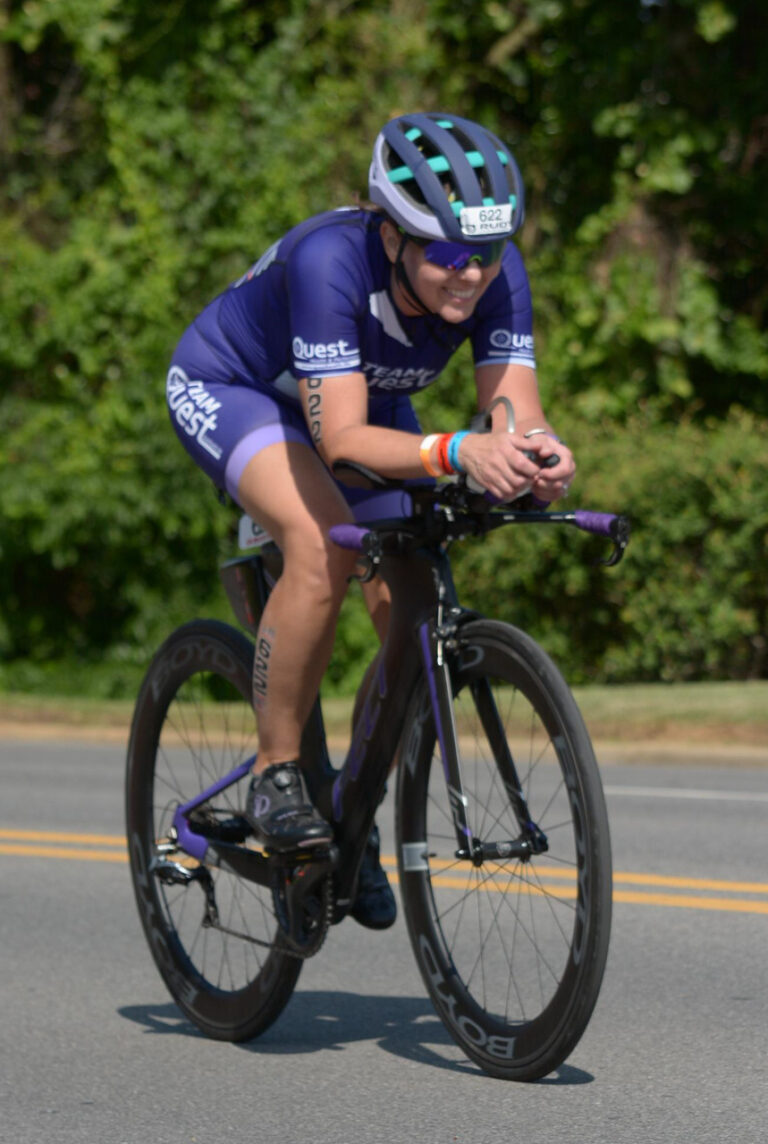
Bridging Body and Bike: Riding Further, Stronger, Better — Is it the body, the bike, or both?
Saturday March 8th, 4:30 PM Seminar room: 123 (Atrium Level) Presented by Dr. Jeanne Williams, PT, DPT, OCS In the world of cycling, performance and comfort are shaped by the harmony between the rider and the machine. When discomfort, inefficiency, or nagging injuries creep in, is the problem the bike, the body, or both? Unlike […]
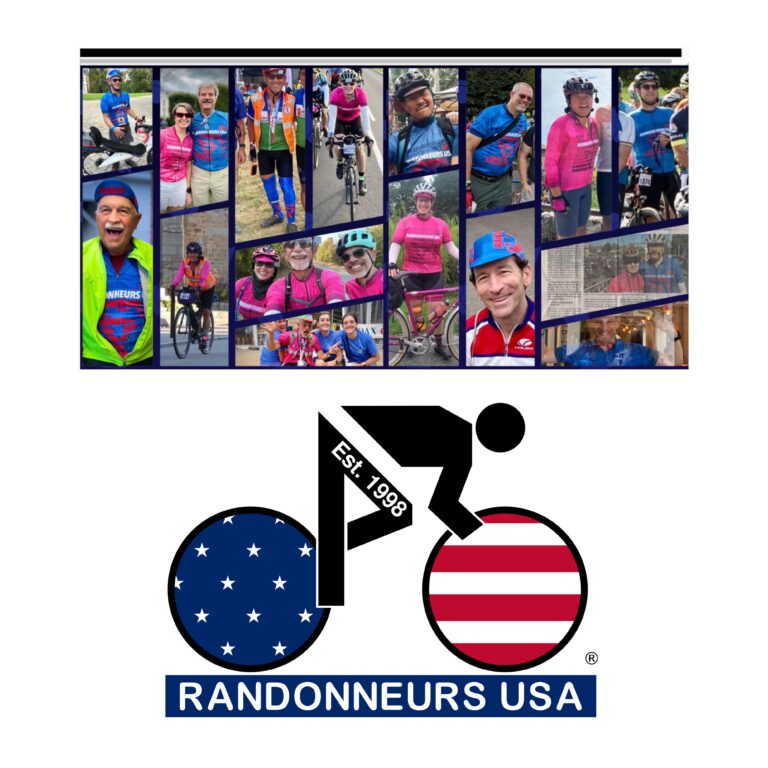
Randonneuring: The Art of Going Long
Saturday March 8th, 3:00 PM Seminar room: 125 (Atrium Level) Presented by Randonneurs USA Are you looking for a new challenge and aspire to explore and push your boundaries on the bike? Do you like long adventures on the bike? Would you like to join a welcoming, engaged, and adventurous community? Randonneuring is defined as […]
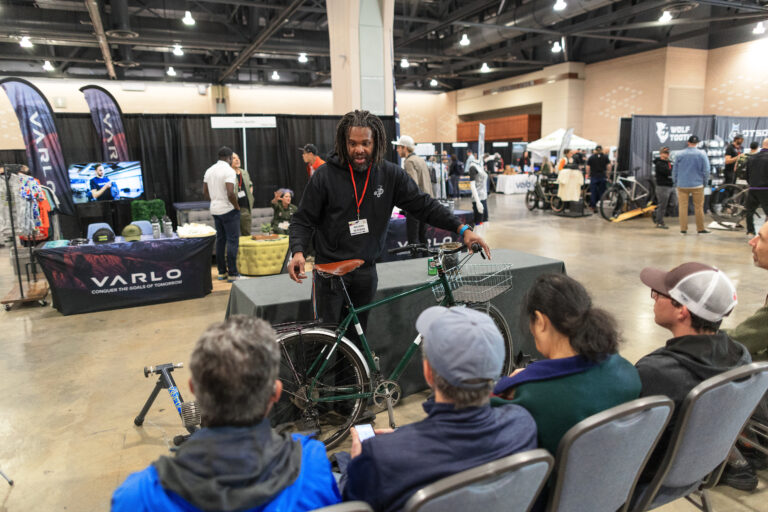
Basic Bike Maintenance
Saturday March 8th & Sunday March 9th, 10:30 AM Exhibit Hall E Demo Area, Booth #1900 Presented by VeloJawn
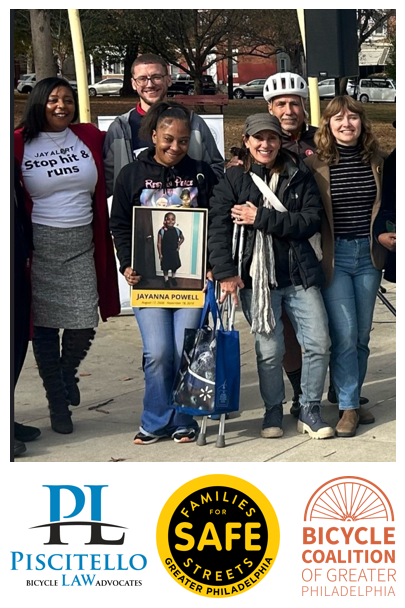
Laws we need to Make our Roads Safe
Saturday March 8th, 3:00 PM Seminar room: 124 (Atrium Level) Presented by: Joe Piscitello & Marissa Perrone, Piscitello Law Nicole Brunet, Bicycle Coalition of Greater Philadelphia Ayeshia Poole & Jasmine Hoffman: Jay Alert This Seminar focuses on four laws in play for 2025: Join this seminar to get the most current updates and learn how to […]
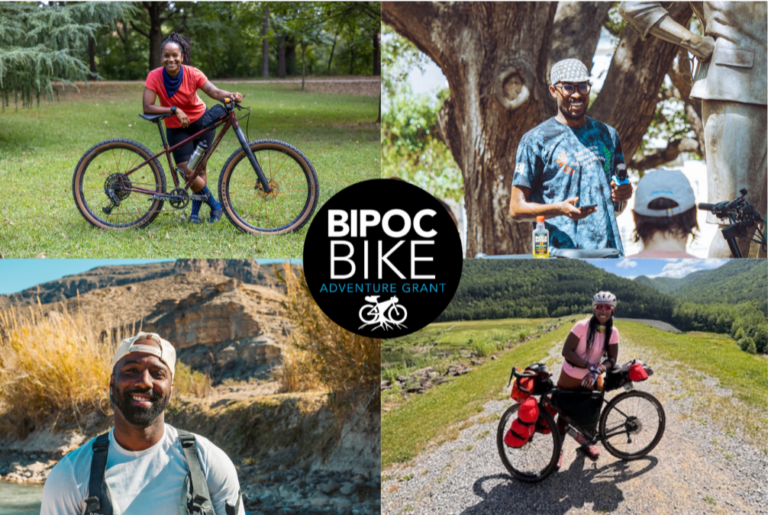
Bikepacking Roots Presents: Perspectives on Building Community in the Outdoors from BIPOC Leaders
Saturday March 8th, 12:00 PM Seminar room: 125 (Atrium Level) Overview: Join Devin Cowens, connector, community organizer, avid bikepacker and coordinator of the BPR BIPOC Bike Adventure Grant Program in conversation with CJ Goulding, Ariel Marlowe, and Tia Moore, three recent awardees from their previous grant cycle. Panelists will share the work they are doing in […]
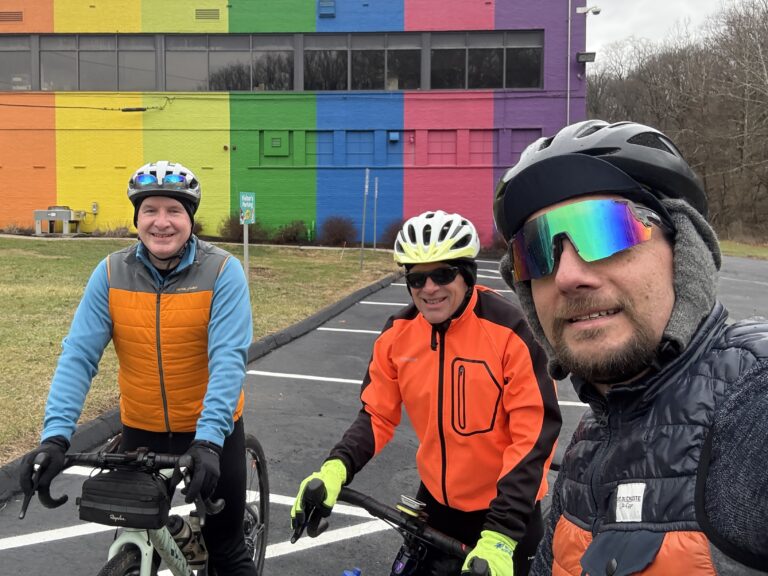
How to Bike the D&L Trail–140 Miles of Goodness in Your Backyard
Sunday March 9th, 3:00 PM Seminar room: 123 (Atrium Level) Presented by Robert Ostroy, Jonathan Gray, gravel biking enthusiast and Ed Eppler, marathoner and cycling enthusiast The D&L Trail is more than 140 miles long and begins just 20 miles from downtown Philly. This session will include resources and strategies for biking the trail and […]
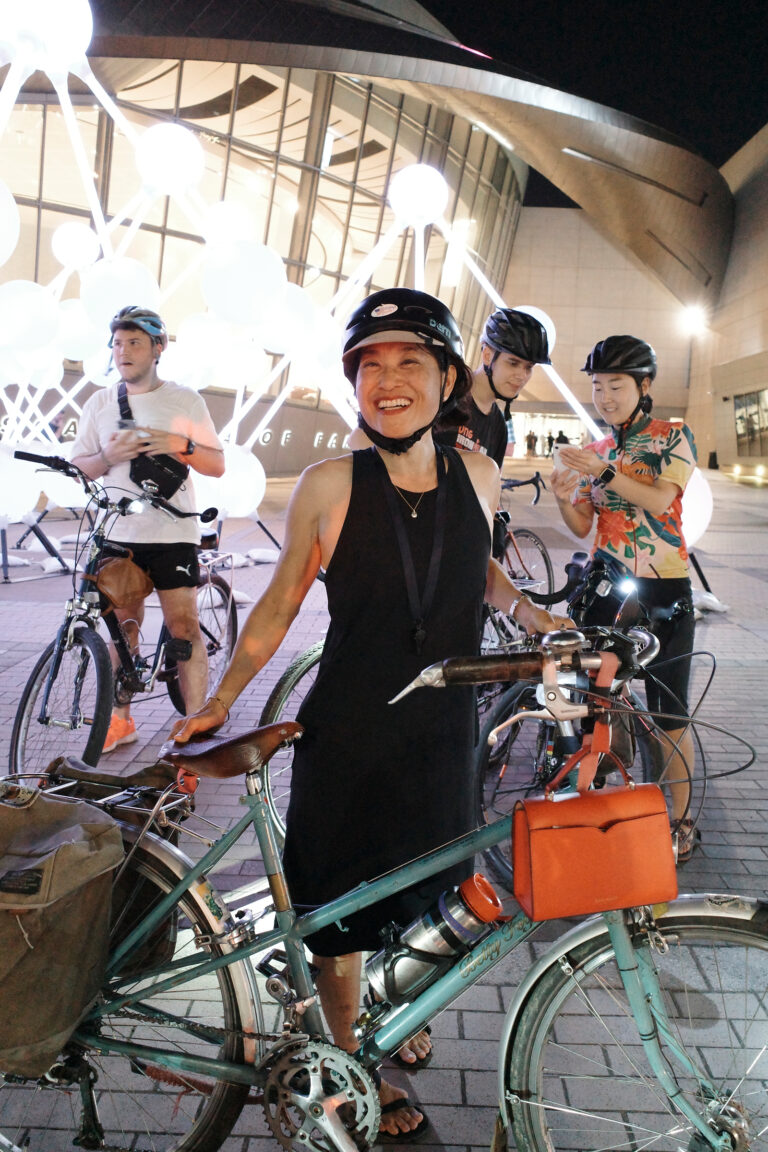
How to make your life into one big bike adventure – a workshop
Sunday March 9th, 10:30 AM Seminar room: 124 (Atrium Level) Presented by Pamela Murray Pam will share her experiences of how she has incorporated biking into her life. Every day is an adventure on bike. Whether you’re running errands or traveling by bike. And everything in between. Build the ride you want to ride. In […]
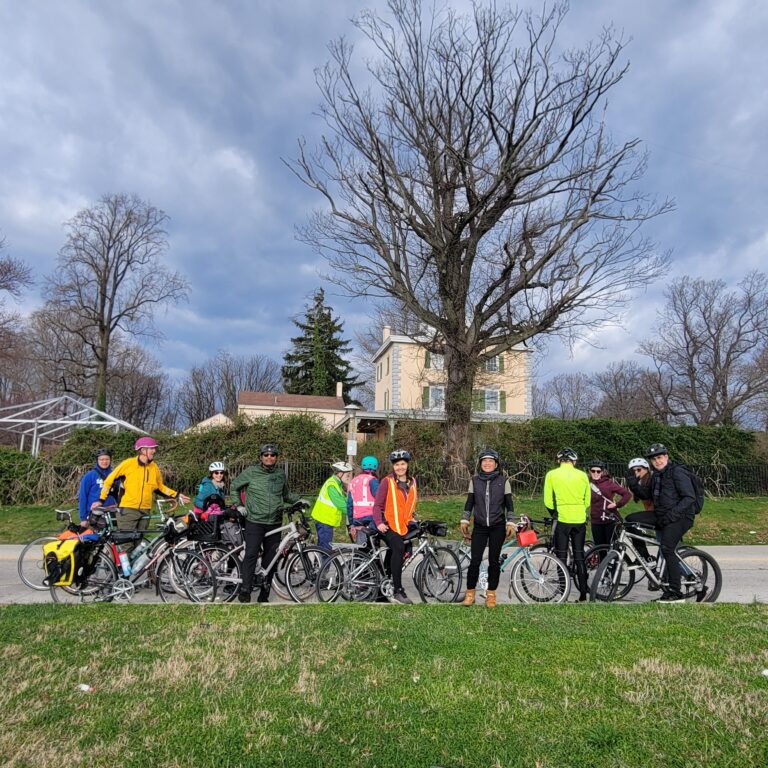
CyclingSavvy Ride to PBE
Sunday, March 9th Meet at 7:45 am at the Convention Center/Roll at 8:00 am (Broad and Cherry Streets entrance, across from the paintbrush) Come see the sights of Philly with CyclingSavvy Instructors demonstrating a few of our strategies and techniques. Part sightseeing, part CyclingSavvy demonstration ride. The same route can be ridden in different ways […]
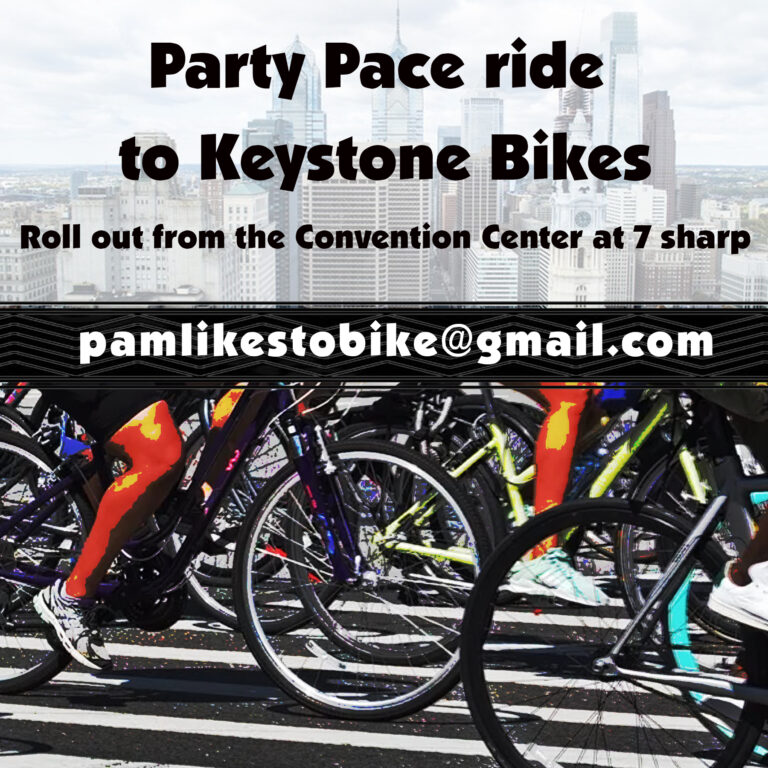
Party Pace ride to the Keystone Bike Party
Saturday March 8th, Meet at 6:45pm at the Convention Center, roll at 7pm sharp (Broad and Cherry Streets entrance, across from the paintbrush) Led by Pamela Murray, Pam Likes to Bike Join us for a Party Pace ride to the Bike Party at Keystone Bikes. All bikes welcome. Steel, vintage, Alt bar bikes encouraged. Helmet […]
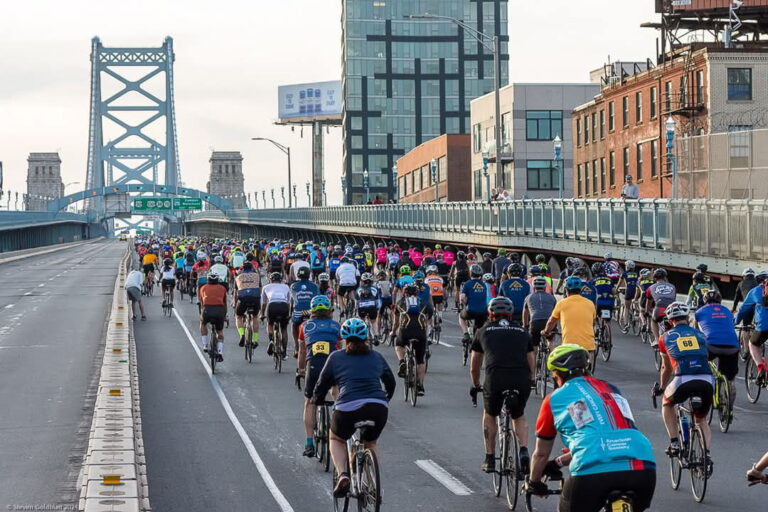
Ride with the Philly Charity Bike Rides
Saturday, March 8th Meeting at Broad and Race streets at 8:00 am we will be rolling out at 8:15 for a 15 ish mile ride showing off some beautiful and iconic scenes of Philadelphia. We will have multiple leaders and all paces are welcome. This is a road ride so all bikes and all abilities […]
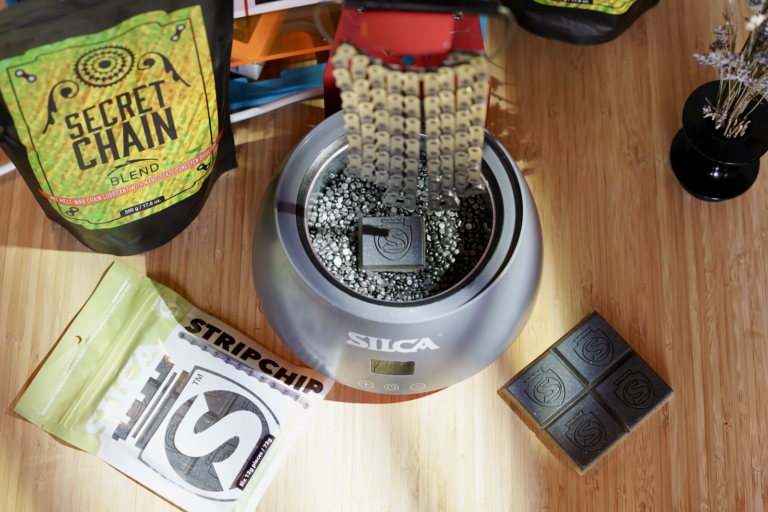
Chain Waxing for All Conditions
Saturday March 8th & Sunday March 9th, 1:30 PM Exhibit Hall Demo Area, Booth 1900 Presented by Travis Verhoff – Product Manager – SILCA. Learn how to optimize your chain wax to ensure optimal performance for any event. Chain waxing has so many benefits from drivetrain life, efficiency, and cleanliness that it makes it the […]
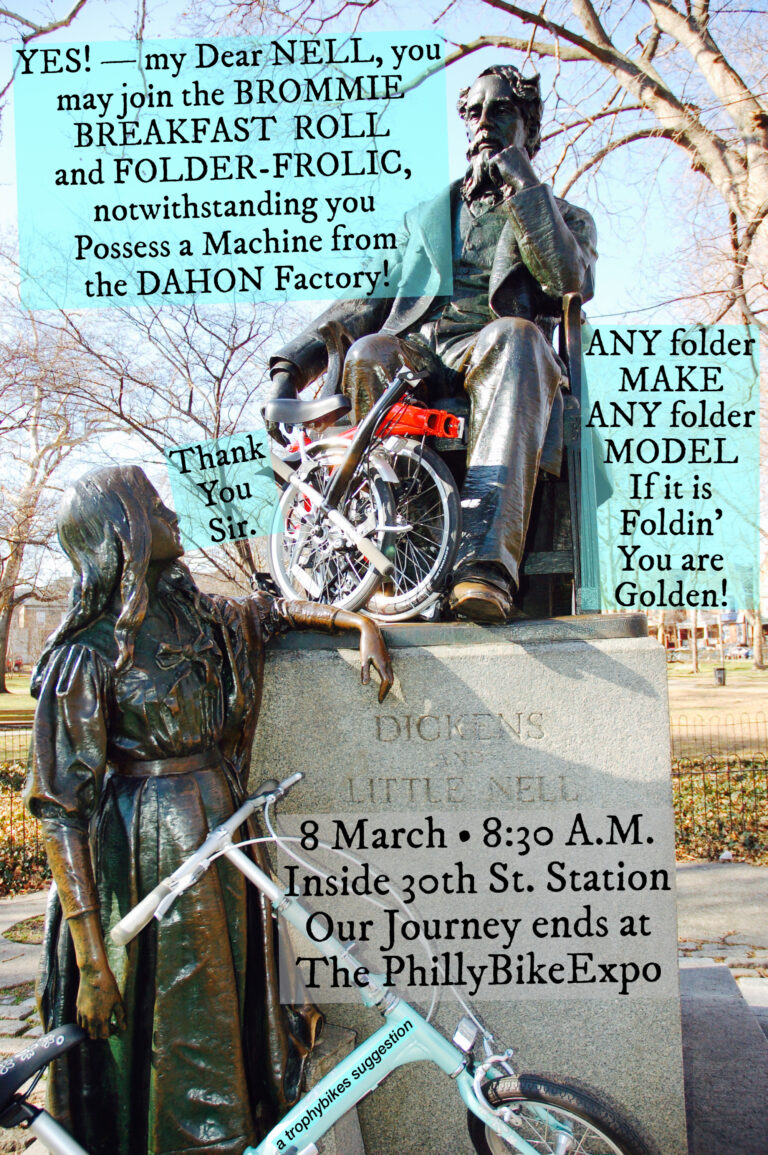
THE BROMMIE BREAKFAST ROLL
+ FOLDER FROLIC (A “Brompton + Beyond” Ride*) *ALL FOLDERS WELCOME • ANY MAKE, ANY MODEL “If it’s FOLDIN’, You’re GOLDEN.” SAT. March 8, 8:30 a.m. Center Info Booth inside 30th Street Station, 30th + Market St. (optional) RAMP CLIMB + (required) Group Fold Foto. ENDS at the Philly Bike Expo, just about opening time. […]
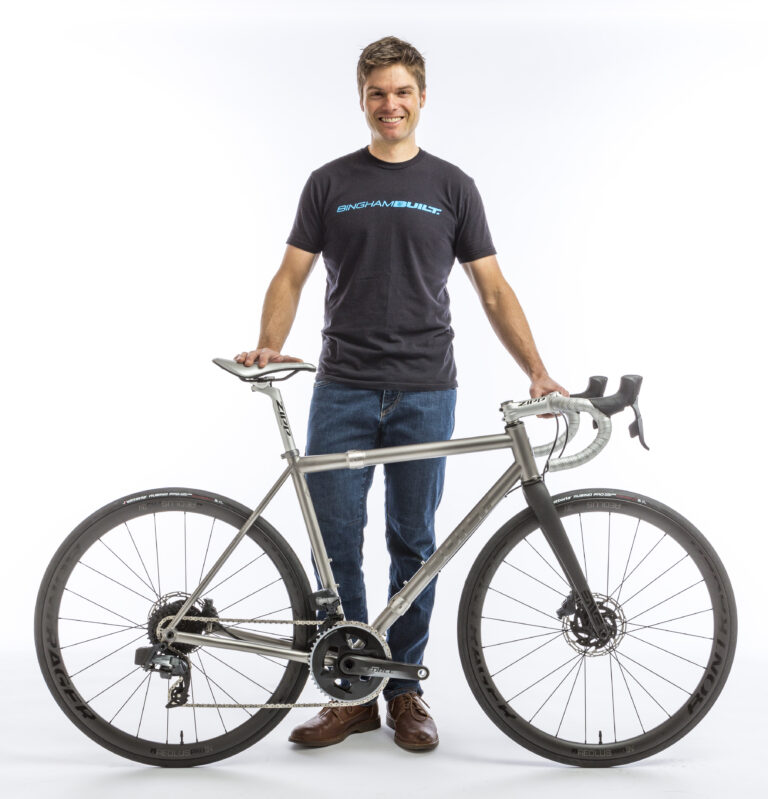
Titanium – A Deep Dive with BinghamBUILT
Saturday March 8th, 4:30 PM Seminar room: 125 (Atrium Level) Presented by Brad Bingham, BinghamBUILT A brief history of Titanium as a high tech material for many applications with an emphasis on bicycle frame construction followed up with alloy and process selections for bicycle frame construction including machining and welding.
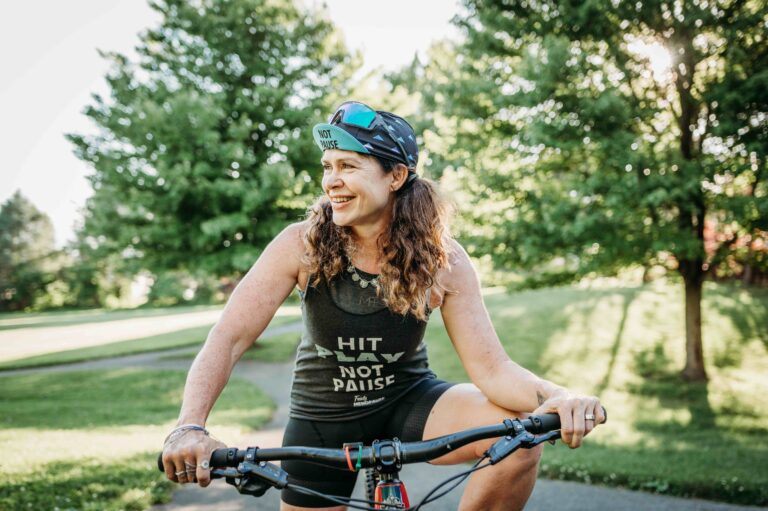
Training, Performance & the Menopause Transition: What Do Hormones Have to Do with It?
Sunday March 9th, 12:00 PM Seminar room: 125 (Atrium Level) Presented by Selene Yeager Perimenopause and menopause hit active women differently. We have a different lifestyle and different goals. And we know our bodies. Whether you race, ride for fun, bikepack, tour (or a little of everything!), you’ve had a way of eating and exercising […]
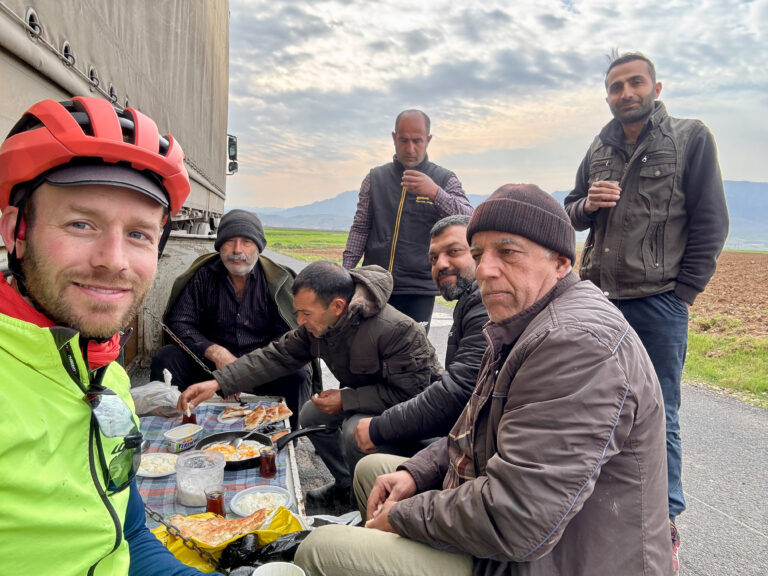
Pedaling Into Community: Engaging Locally on Bikepacking Journeys
Saturday March 8th, 3:00 PM Seminar room: 123 (Atrium Level) Presented by David Landis, V2V Trails Bikepacking isn’t just about ticking routes off a bucket list—it’s about connecting with the people, stories, and culture that make each place special. This session invites cyclists to go beyond the map, discovering how local communities shape the routes […]
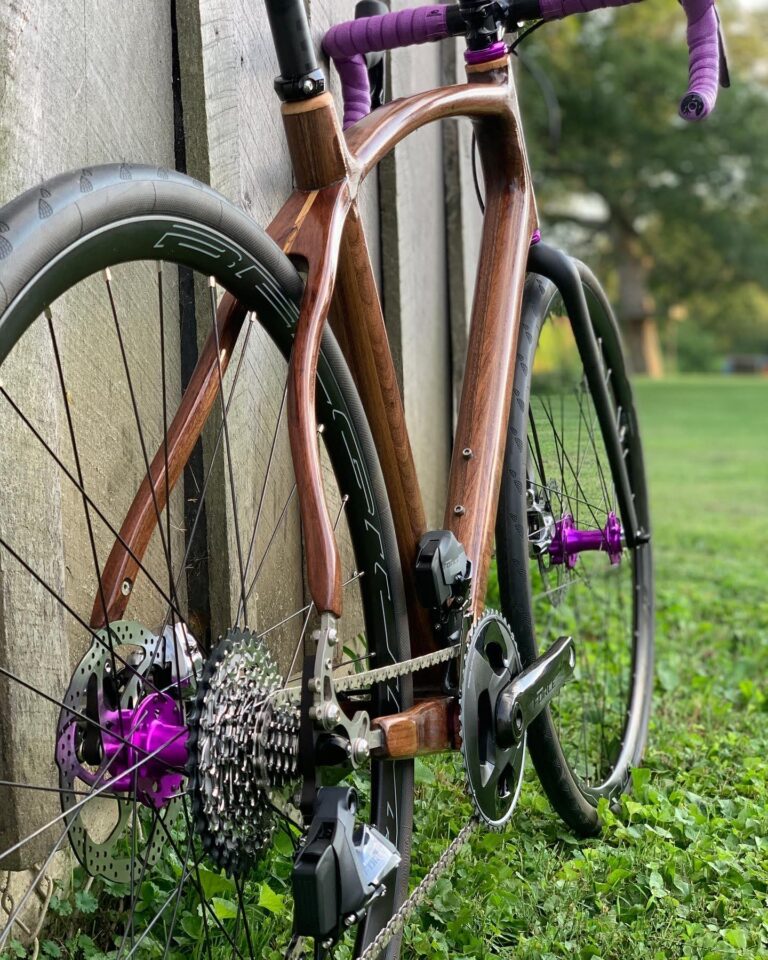
Trading Silver-Braze for Sawdust
Sunday March 9th, 10:30 AM Seminar room: 123 (Atrium Level) Presented by Jay Kinsinger, Sojourn Cyclery BMX was in its infancy in 1973. My friends and I were early adopters. I traded labor at a local bike shop for parts to convert my Schwinn Stingray into a BMX bike. I was eventually employed at the […]
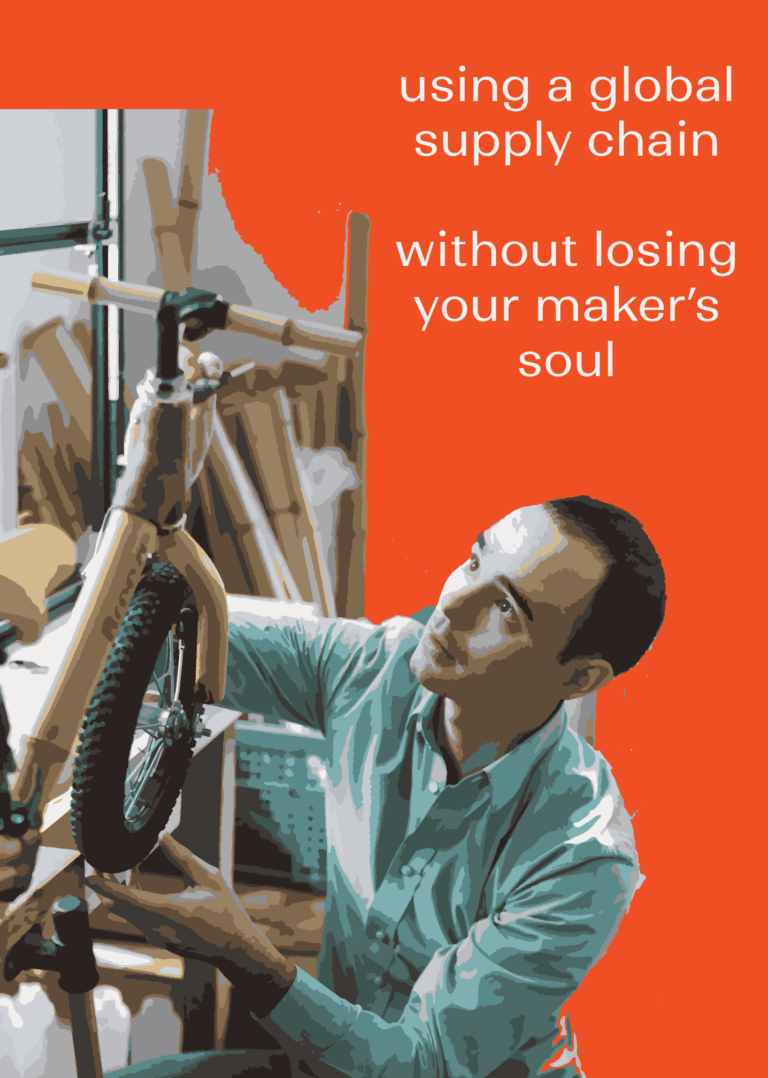
Micro Manufacturing: Taking Advantage of International Supply Chain without Losing your Soul
Sunday March 9th, 12:00 PM Seminar room: 124 (Atrium Level) Presented by David Wang, Brook & Breeze founder Over the past 10 years, David Wang has been designing and fabricating bikes and bike stuff using his hands, power tools, and desktop digital fabrication equipment (i.e. lasers and 3d printing). There’s A LOT of joy in […]

Grassroots Bicycle Advocacy in Philadelphia
Saturday March 8th, 10:30 AM Seminar Room, 125 Presented by Caleb Holtmeyer, Philly Bike Action This seminar is about grassroots advocacy for better bike infrastructure in the City of Philadelphia. We will discuss what good bike infrastructure looks like, how our organization works at the hyperlocal level to speed its implementation, and how you can […]

Advocacy Through Data: How Pittsburgh is using 311 data to improve bicycling safety
Saturday March 8th, 1:30 PM Seminar room: 123 (Atrium Level) Armin Samii, dashcam.bike Riders in Pittsburgh have reported thousands of bicycling hazards to 311, including cars parked in bike lanes, near-misses, close-calls, and dangerous road conditions. Riders record video footage of their entire commute using dashcam.bike, and when they’re safely at their destination, they can […]
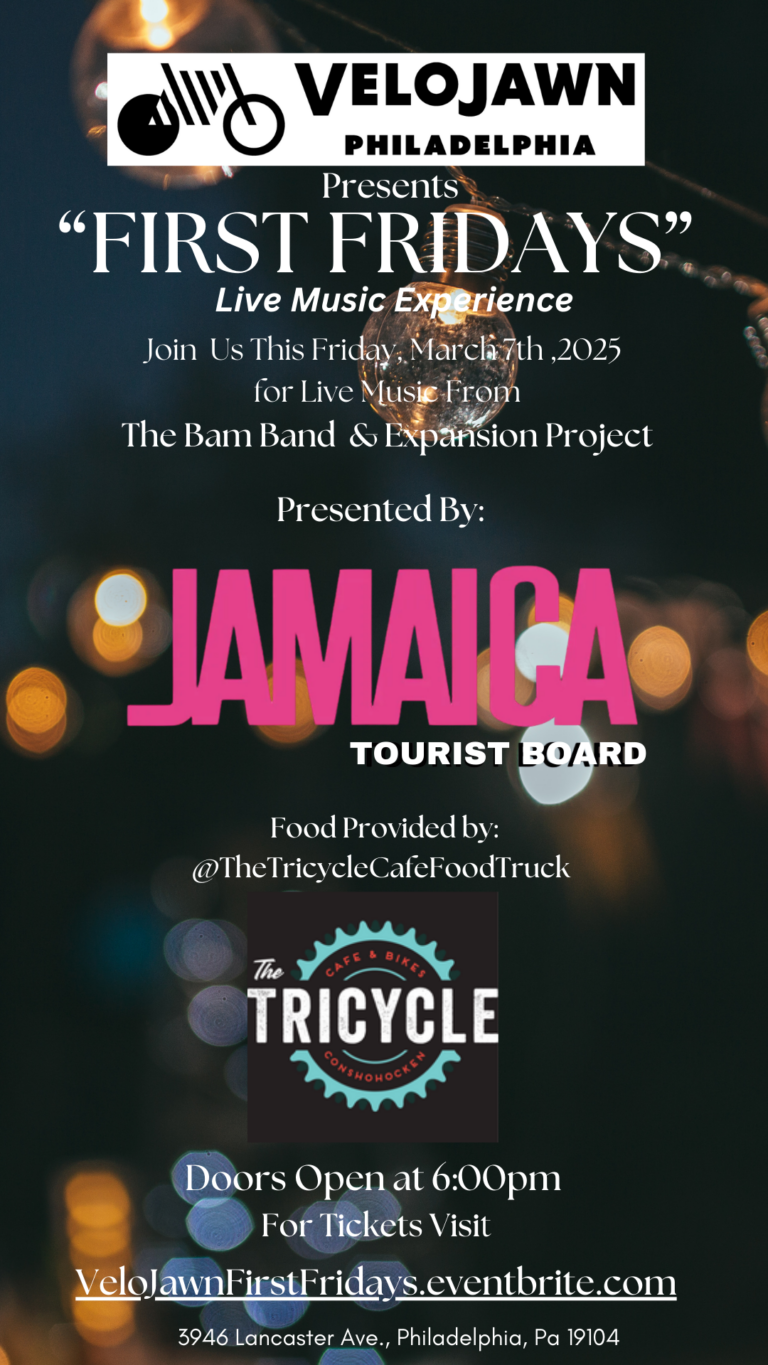
Vendor Bender at VeloJawn
Friday March 7th, 6:00 PM 3946 Lancaster Ave., Philadelphia, PA 19104 Doors open at 6:00pm Food & Beverage Available Vegan Options Available Happy Hour All Philly Bike Expo exhibitors & attendees are invited! Tickets available here.

How much of a cyclist’s power (Watts) is associated with frame flex while pedaling?
Sunday March 9th, 12:00 PM Seminar room: 123 (Atrium Level) Presented by Bob Rose Is there a meaningful ‘power penalty’ associated with a more flexible frame? After quantifying such power penalty (i.e., Watts of power loss) we will body slam “vertically compliant, laterally stiff” once and for all, then take a deep dive into frame […]
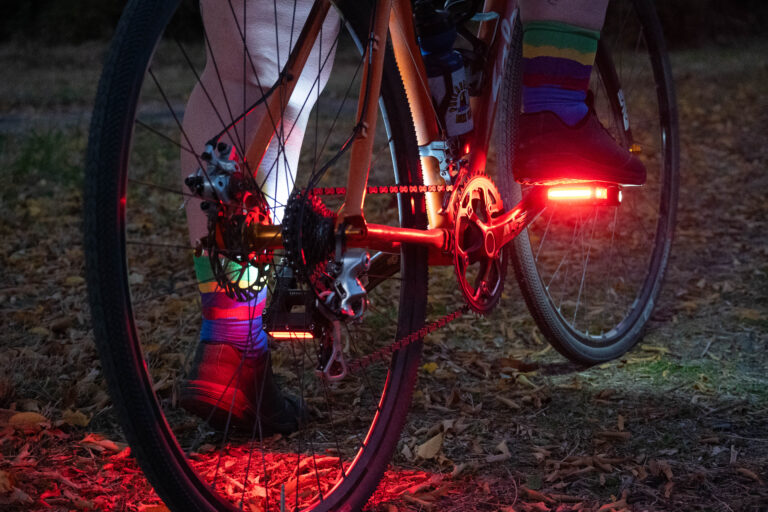
Safety First Cycling & Riding in Groups
Sunday March 9th, 1:30 PM Seminar room: 124 (Atrium Level) Presented by George Yarnell, Bicycle Club of Philadelphia Putting “Safety First!” when cycling should be a matter of habit for all cyclists. This seminar highlights some of the important and basic things we can each do to cycle more safely. Through presentations and demonstrations from […]
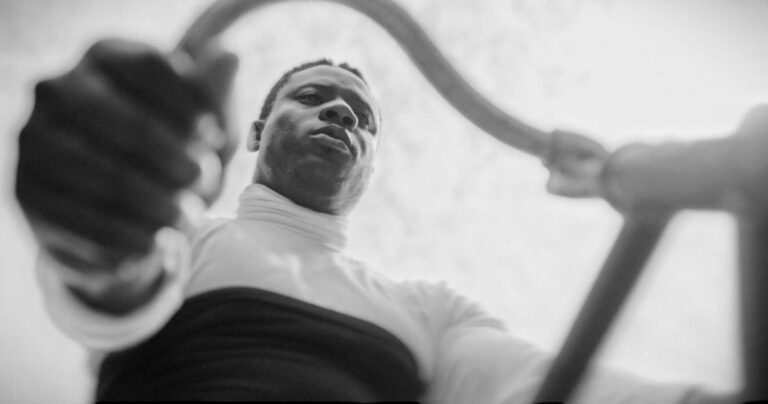
The Fastest Bicycle Rider in the World
Sunday March 9th, 10:30 AM Seminar room: 125 (Atrium Level) Presented by Cyrille Vincent More than a hundred years ago, when bicycle races drew crowds that filled Madison Square Garden, the biggest draw of all was Marshall W. Major Taylor. As a superstar athlete in the most popular sport of his era, 1899 world bicycling […]
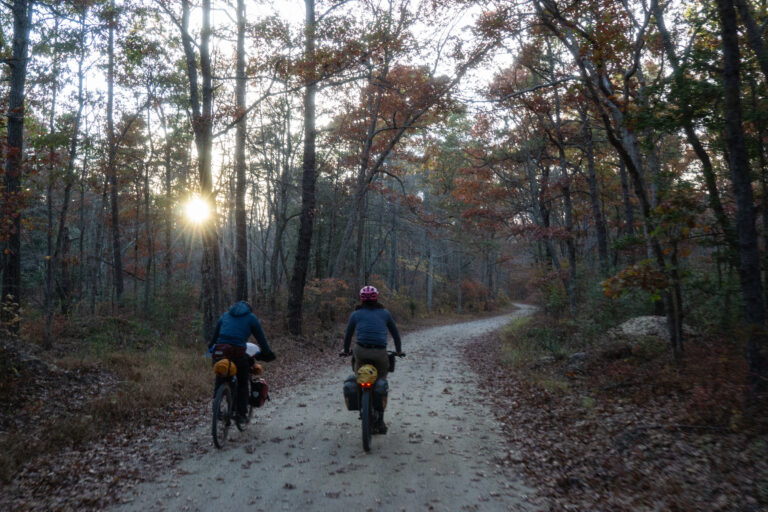
The Jersey Devil Hunt: Bikepacking in the New Jersey Pine Barrens
Saturday March 8th, 1:30 PM Seminar room: 124 (Atrium Level) Presented by Julian Bender The Pine Barrens is a sprawling wilderness right in Philadelphia’s back yard. Last year, I created the region’s first bikepacking route, the Jersey Devil Hunt. The route makes it easy to discover these vast woods, avoiding all the deep sand and […]

Hill Climbing Tips and Tricks
Saturday March 8th, 12:00 PM Seminar room: 124 (Atrium Level) Presented by Brian Williams, Major Taylor Techniques to help you ascend those dreaded hills properly, climb efficiently with minimum wasted effort and boost confidence.
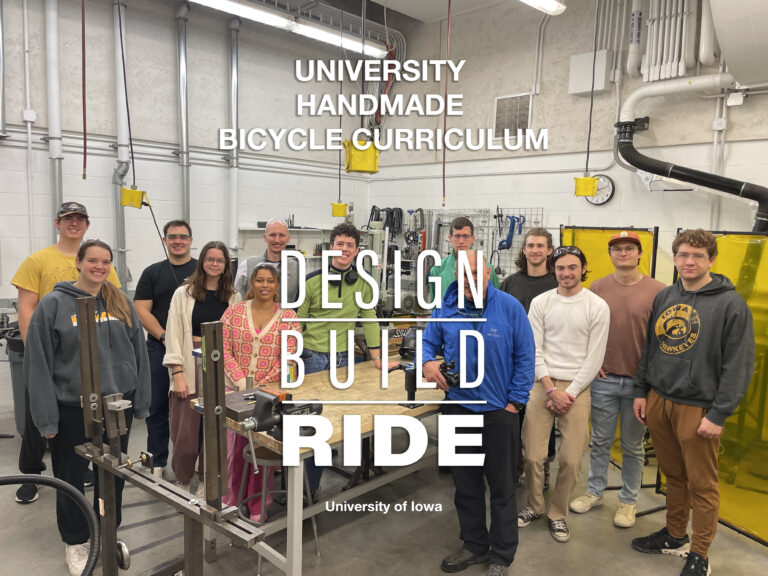
University Handmade Bicycle Curriculum
Saturday March 8th, 10:30 AM Seminar room: 123 (Atrium Level) Presented by Steve McGuire, Professor Over the last 13 years, the Design, Build, Ride curriculum – part of 3D Design and Jewelry and Metal Arts – in the School of Art, Art History & Design at the University of Iowa has become a top handmade […]
PBE 2024

Varlo Running Apparel
Product Review by PBE Squad member, Jennifer Wright Finding the right configuration of running gear is always a gamble – does it chafe? Does it breathe? Does it stay in place? I’ve been running all season in Varlo’s running line and I have answers to all of these questions! A bit about me: – I run […]

RedShift Sports ShockStop Suspension System
Product Review by PBE Squad member, Trong Nguyen As an avid cyclist who regularly tackles everything from gravel paths to limited mountain bike trails, and even rough city potholes (Philly residents would know this), I have always struggled to find the right balance between comfort and control on rough terrain. That is, until I tried the […]

Philly Expo Squad Built ATRB (All Terrain “Road” Bike)
Product Review by PBE Squad member, Shane Sellers As a new member of the Philly Bike Expo Squad, I wanted to build a bike that was a new direction for me. A bike that can do it all is never the answer and always the answer. My 2023 objective was to use specific parts on a bike […]

Varlo Gravel Bib
Product Review by PBE Squad member, Dave Kerwood Cycling is great because you can explore the sport how you wish – simply hopping on your bicycle and riding, or by utilizing the latest and greatest gear and tools to make your adventure-by-bike more comfortable, or even faster. I am a believer that technical clothing will […]
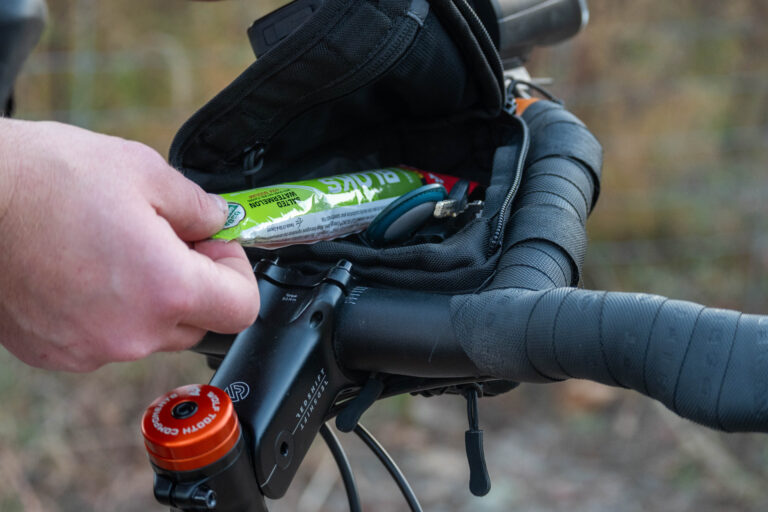
Redshift Sports Kitchen Sink Gravel Handlebar System
Product Review by PBE Squad member, Ross Perfetti I was new to the wide drop-bar trend for gravel bikes before I came across the kitchen sink gravel bars. While narrower bars for road bikes purport greater efficiency and speed, wider, flared drop bars can enhance handling on rougher terrain, from gravel to trail and single-track […]

Redshift Sports Arclight Pro Flat Pedals
Product Review by PBE Squad member, Katelyn Repash It can be tough to feel visible enough on the road or on the trails, which is why I really wanted to try out Redshift’s Arclight flat pedals this year. I’ve been testing out the Pro Flat pedals on road and gravel, in dark and lowlight conditions […]
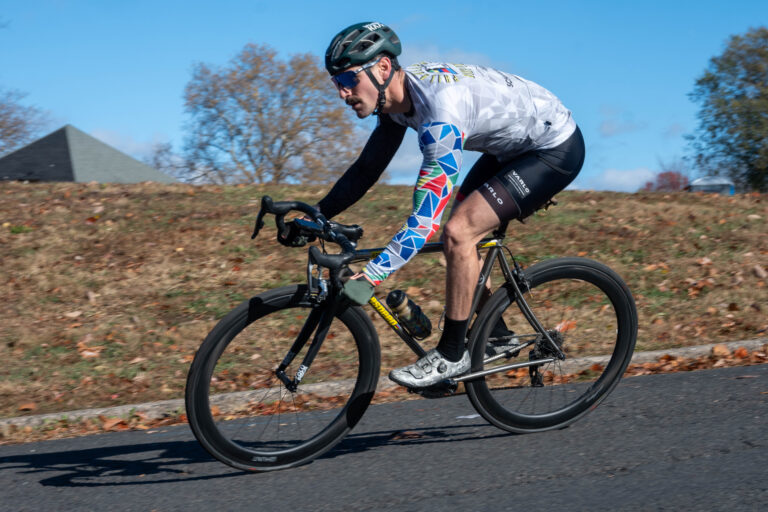
Schwalbe Pro One
Product Review by PBE Squad member, Gabe Markowitz Tires are the only contact point between your bike and the ground you’re rolling on. Why settle for anything less than great? Schwalbe continued to keep the Philly Bike Expo Squad rolling smooth for the 2025 season. I’ve been running the Pro One Tubeless (700x28c) on my […]
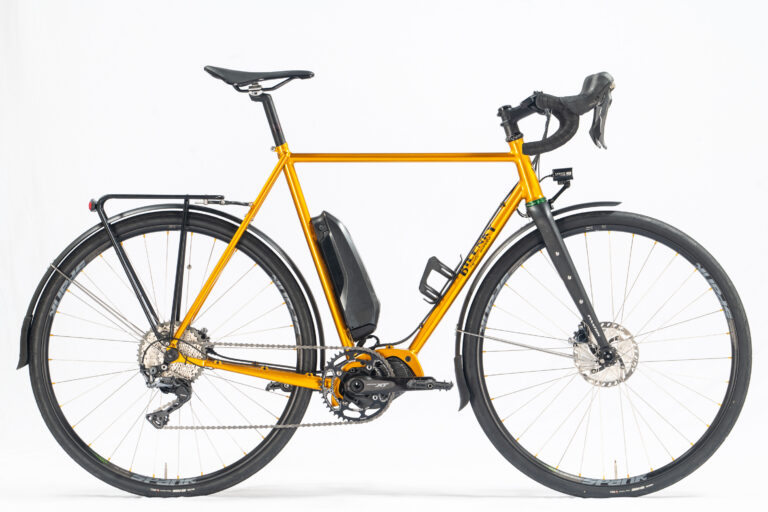
Extended Adventures: Bilenky Gravel eBike
Bilenky Cycle Works stands among the select few bespoke frame builders ready and willing to craft ebikes, a fact starkly evident at the Philly Bike Expo where Steve Bilenky’s enterprise stood as a beacon amidst a sea of – albeit excellent – custom built convention. The reticence of many frame artisans toward embracing ebike technology […]
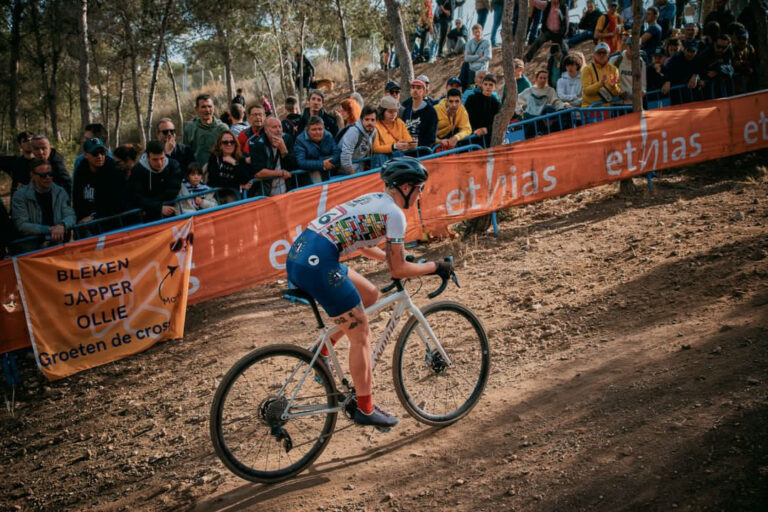
2016 -> Now: A history of Shrimpy’s racing career with the Philly Bike Expo
Hellloooo Philly Bike Expo Friends! If you have been around for a while, you likely watched this story unfold over the last handful of years. If you are new to the Philly Bike Expo family, I would love to share with you the story of how the Bilenky’s took me under their wing and helped […]
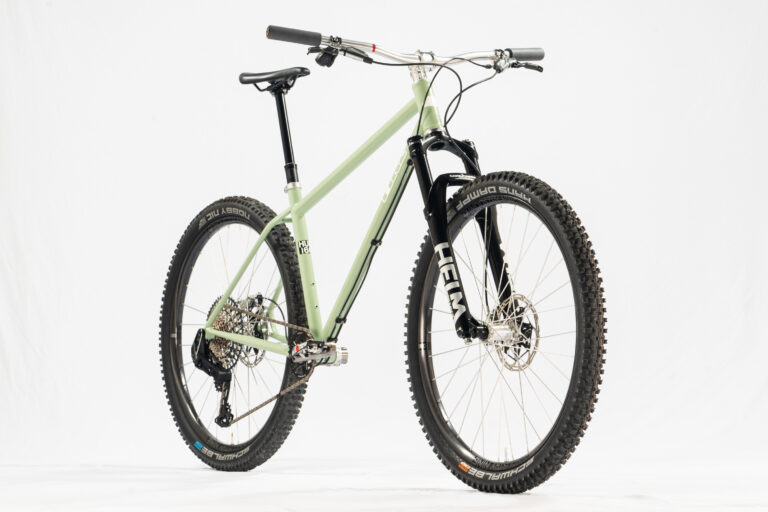
Fine Bikes, Fine Times
You move to a new city for work, you get swept up by the enthusiasm and excitement of the cycling community there, so you leave your job, start working in a bike shop and then become a frame builder. Happens all the time, right? Not! That’s what happened to Charles Thompson after moving to Raleigh, […]
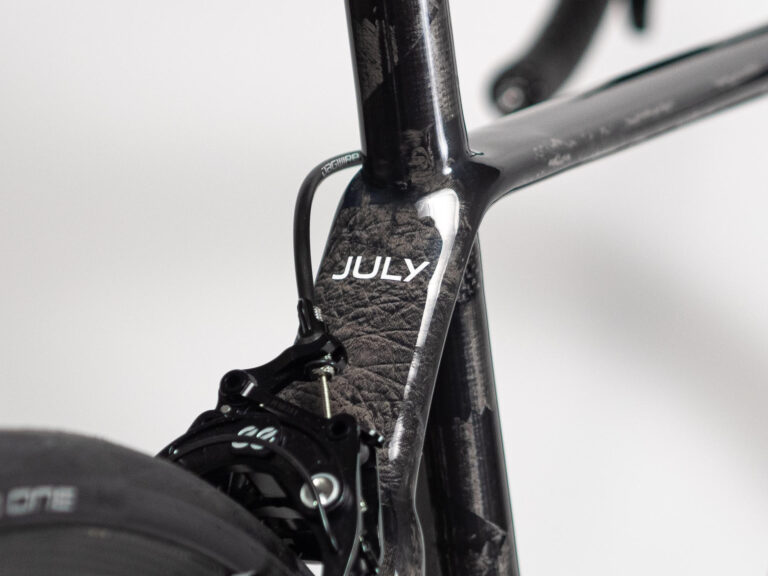
Deep Custom Carbon
What did you do during the Covid shutdown of 2020? For Ben Jurgensen, then a 33 year-old sculpture studio teacher at the Rhode Island School of Design, the conditions were suddenly right to set out on the path of bicycle frame building, “my sourdough,” as he describes it. Ben set himself the problem of finding […]
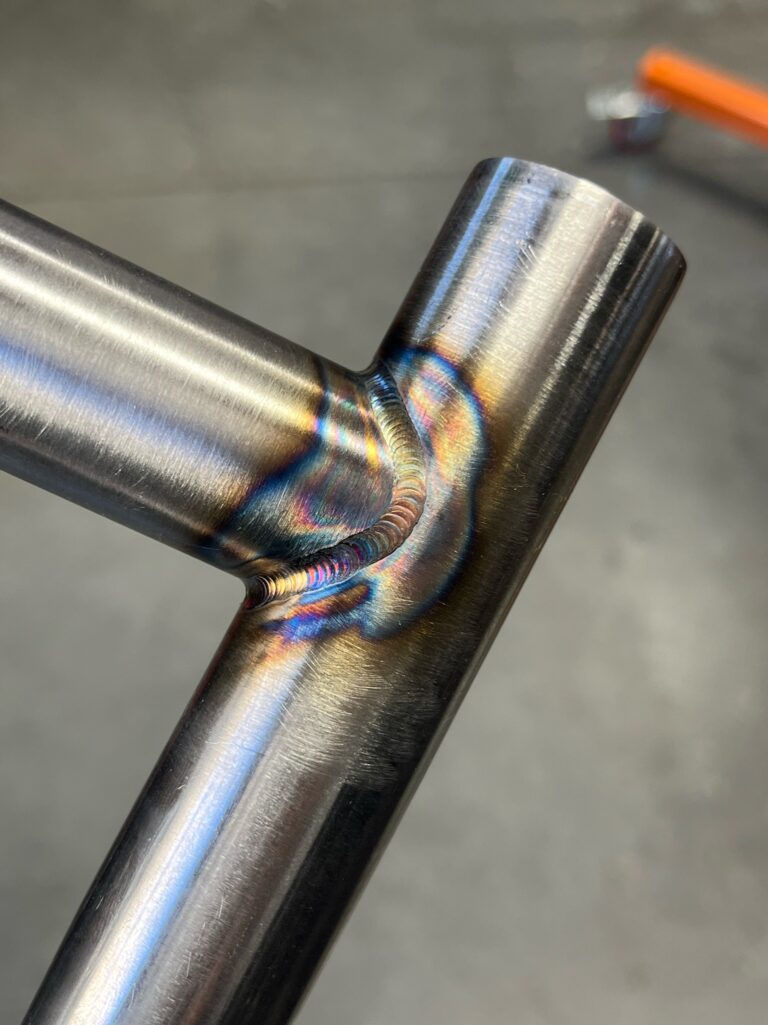
Zabrina Cycles: When Less is More
One of the great things about the frame builder industry is the steady inflow of energetic young, clever people that continues show up and set up for the long haul. Zach Weiss is all of the above, and he’s gone about it in a time-honored fashion, apprenticing under a highly respected frame builder, in this […]
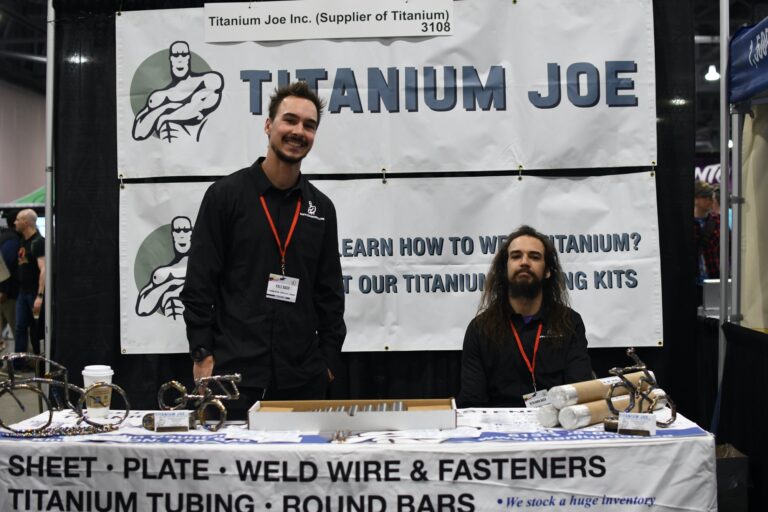
A New Line of Japanese Titanium
Frame tubes are among the least-known parts of a bicycle frame to many consumers, yet they greatly affect the way a bike feels and handles, how long it will last, and what it will do in a crash situation. Therefore, as an end-user, it’s always well worth stopping at tubing supplier booths at the Philly […]
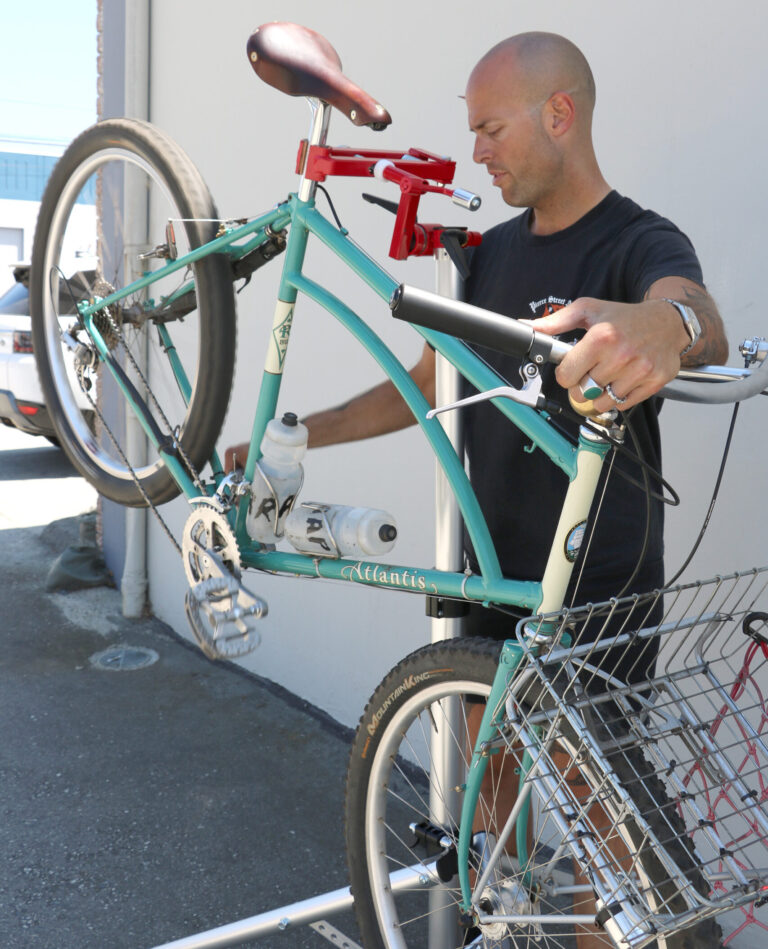
Tools U Like
What’s one mistake home mechanics make all too often? Neglecting to invest in a good work stand. So when Efficient Velo Tools, which is based in Washougal, Washington, announced they’d partnered with Japanese manufacturer Minoura on an expert-level workshop stand that’s easily adaptable to field work, we were excited that this would be on the […]
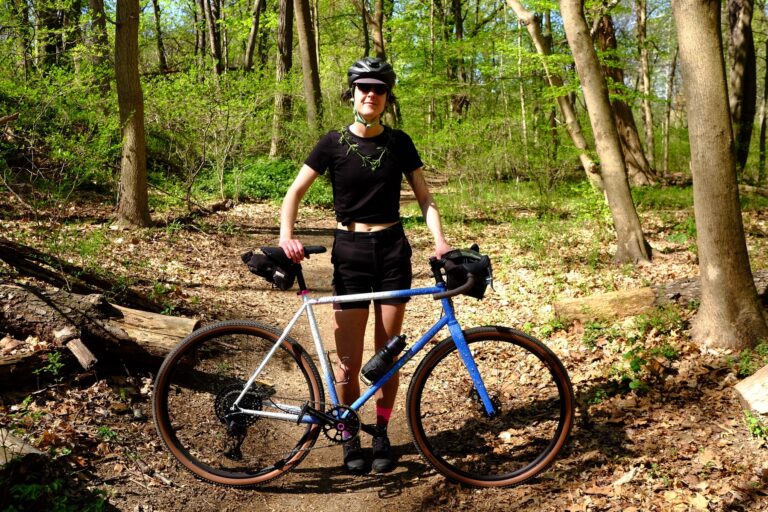
Bike Adventurers in the Keystone State
Located between Norris Square and Fishtown, and founded in 2020, the Keystone Bicycle Company (aka KBC) has had a booth in the Philly Bike Expo every year of its existence, and is recognized for pushing the spread of bike shops into North Philadelphia. With a mission to get more people on bikes through active engagement […]
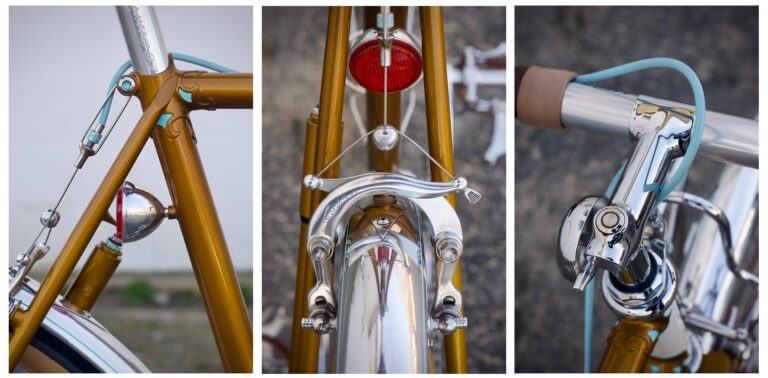
Chapman: Classic but not Retro
The Rhode Island frame builder is lauded for his classic-style frames, but he welcomes the expansive design approaches and passion of newer entrants to the industry, and the use of new tech in general. His bikes, within their classic overall looks, usually contain some of the latest tech amid an array of appealing design touches.
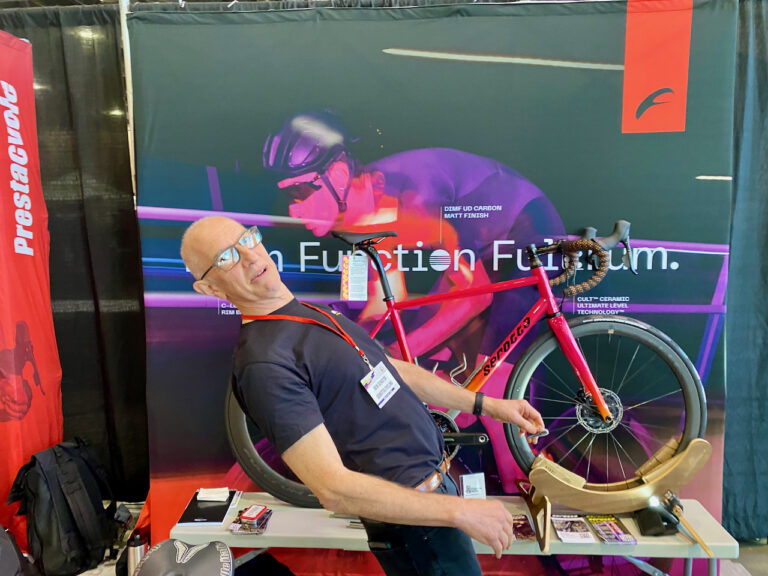
The Unstoppable Ben Serotta
Build, perfect, repeat and pass it on. That could be the company motto of the Serotta Design Studio. If imitation is the sincerest form of flattery, the legendary framebuilder Ben Serotta must surely feel profoundly flattered. Being imitated is a thing he came to know well as one of the largest and most innovative custom […]
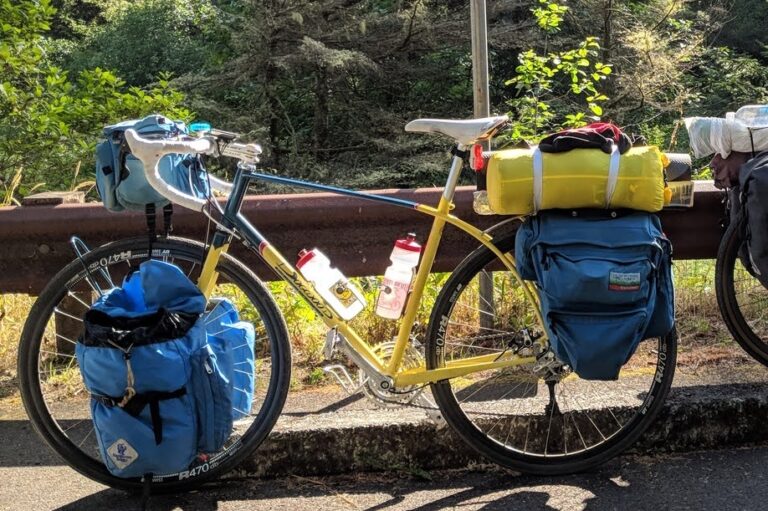
Dogwood Cycleworx: The Best Way to See the World
Ask David Johnson a simple question and you won’t receive a 30-second soundbite answer. What you will receive from the loquacious North Carolina native is a wide-ranging explanation filled with humorous anecdotes, intensive technical knowledge, and, in Johnson’s own words, experience borne from “forty years of pain and suffering.” For Johnson, proprietor and framebuilder at […]
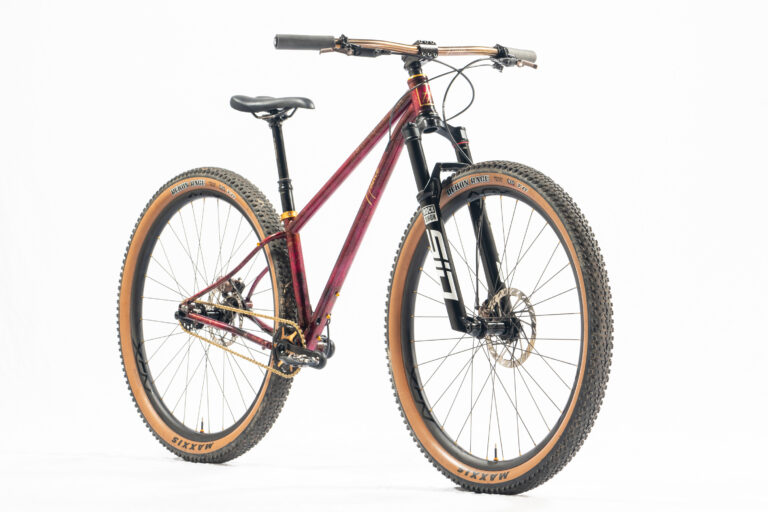
Haute Bicycles: Affordable Artistry
This new company from Richmond, Virginia has a wealth of experience in bikes as well as the bike biz, which shows not only in the quality and features of their bikes, but also in the way they present their offerings.
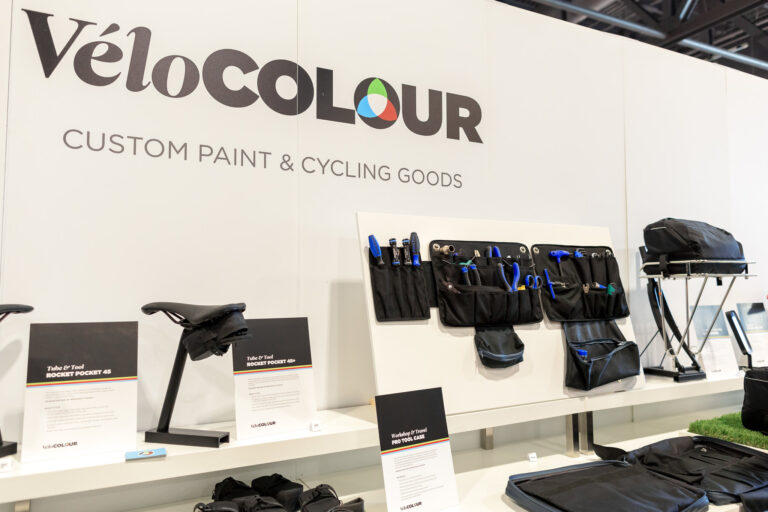
Making the Case for Pro Cycling Team Mechanics
Warning! Home mechanics may not want to read this article. And why not? Because if you’re like the PBE News Team, doing so may create a yearning satisfied only by the outlay of a pretty penny for something you can get for less money in other forms, but which won’t work nearly as well. If […]
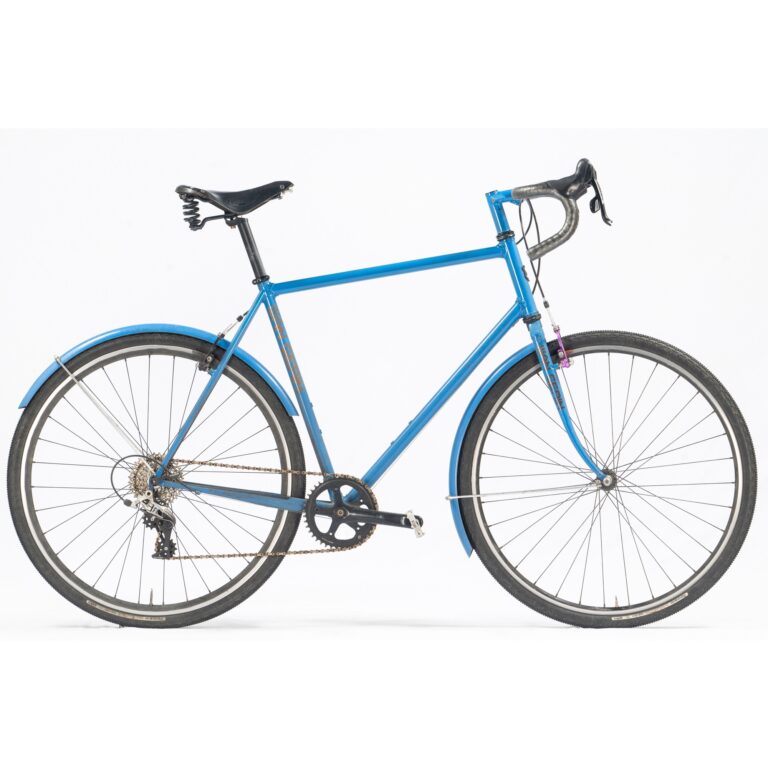
Wan Gerin: Form Follows Function
By day, Noah Wangerin teaches design at the University of Illinois, Chicago. At nights and on weekends, he plies his passion as a builder of custom bikes that include his eponymous trade name, but which reflect the needs and desires of his clients. Rather than offering specific models of Wan Gerin bikes, Noah identifies each […]
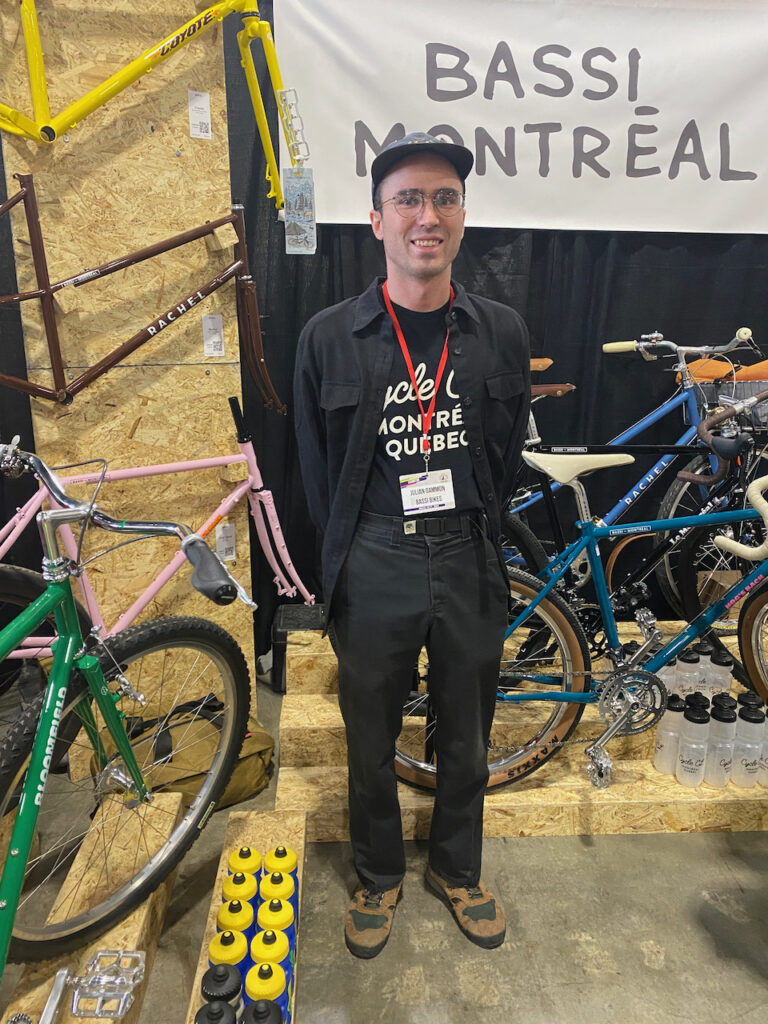
Bassi Bikes: Bridging Rome and Tokyo (via Montreal)
Julian Gammon is the Quebecois co-owner of Bassi Bicycles, run out of C&L Cycles bicycle shop in Montreal. A bicycle mechanic for “as long as I’ve been an adult,” Gammon’s lifelong passion for bicycles involves an interesting story that undergirds the choice of a brand name for his custom bikes. When questioned about the name’s […]
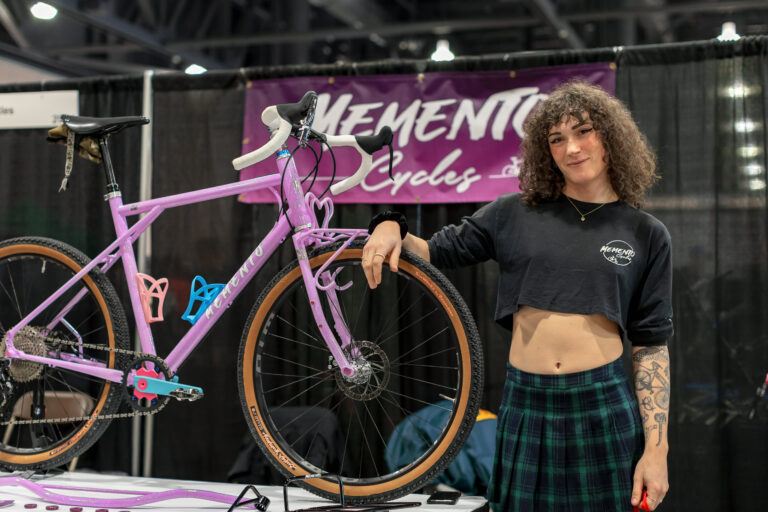
Memento’s Heart Bike: an Ode to Joy
The People’s Choice award winner is a bike that captures the imagination, according to PBE founder Stephen Bilenky. Visual appeal is a big part of that, but because everyone has this circle of qualities they’re looking for, like the kind of riding it’s for, so they’re thinking they want it to have, for example, medium stays, fit a particular tire spec… they have a laundry list of physical and aesthetic attributes. The bike that encapsulates the most of what people are looking for, that bike that will win the People’s Choice award.
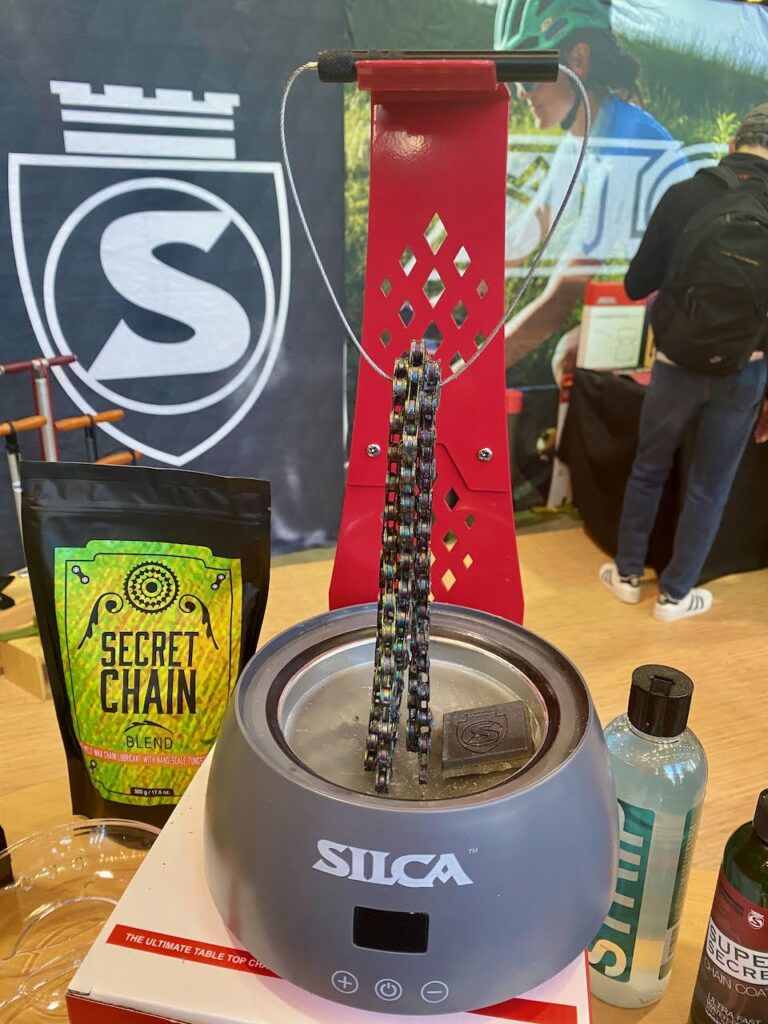
Silca, Where Worthy Tradition Meets Innovation
This storied Italian brand is now a US brand that’s starting to accumulate a few stories of its own, and a reputation for incorporating established cycling wisdom into new cycling tech.
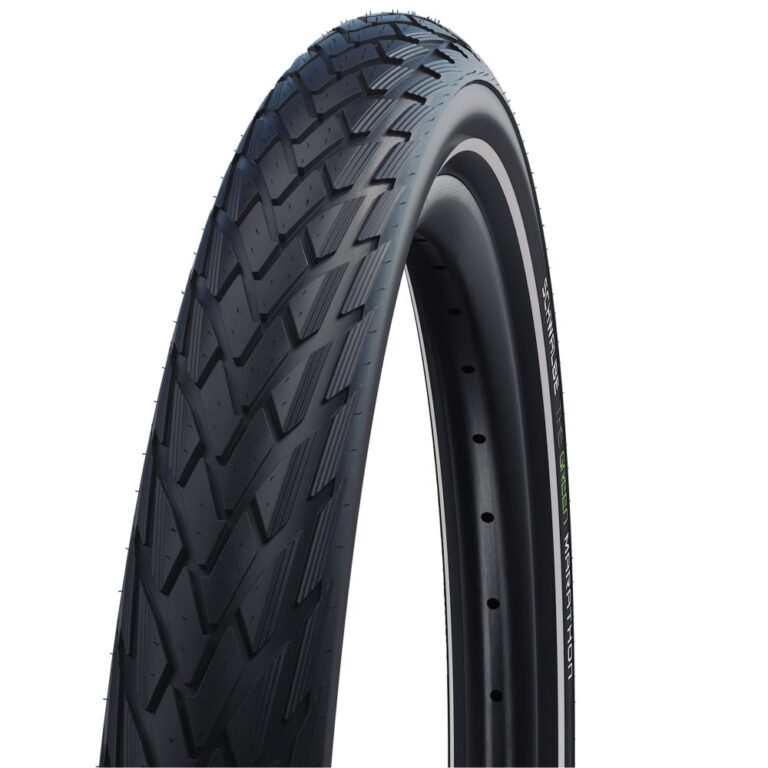
Schwalbe’s Green Marathon
Schwalbe may be the greenest tire manufacturer on the market. The German company is all-in with their cradle to cradle commitment to sustainability.
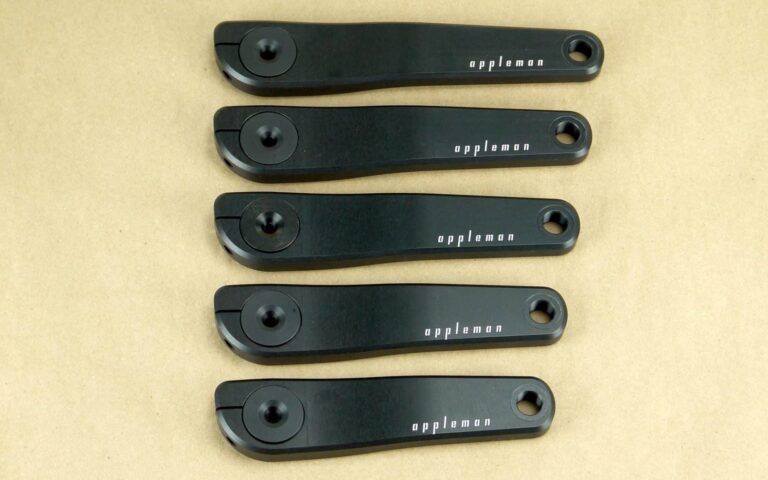
Are Your Crank Arms Too Long?
Minneapolis frame builder Matt Appleman has gone deep into the subject of crank length, and he’s just not sure, but he thinks there’s a fair chance the cranks on your bike are not the optimal length for your legs. He discusses this in Seminar Room 123 on Sunday March 17 at 1:30PM.
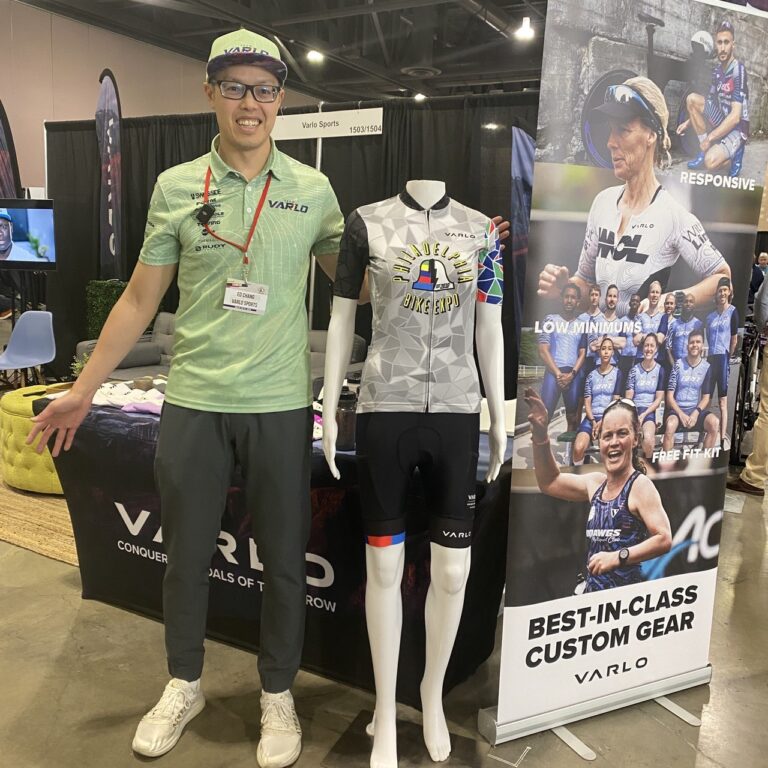
Varlo Sports 2024 Gravel Kit (Video)
Ed Chang of the PBE Squad clothing sponsor, Varlo Sports, gives us the low-down on Varlo’s thoughtfully-designed and sourced 2024 gravelwear kit, now available from Varlo direct, and REI stores nationwide.
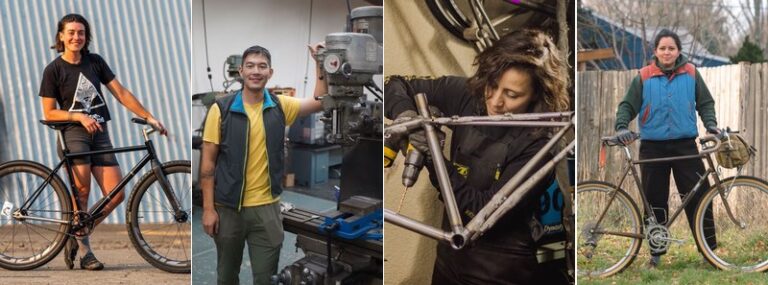
2024 PBExSRAMxIndustry Nine Inclusivity Scholarships
In case you missed them on our Instagram feed, meet this year’s PBE x SRAM x Industry Nine Inclusivity Scholars, whose work is on show at a special booth in the expo hall.
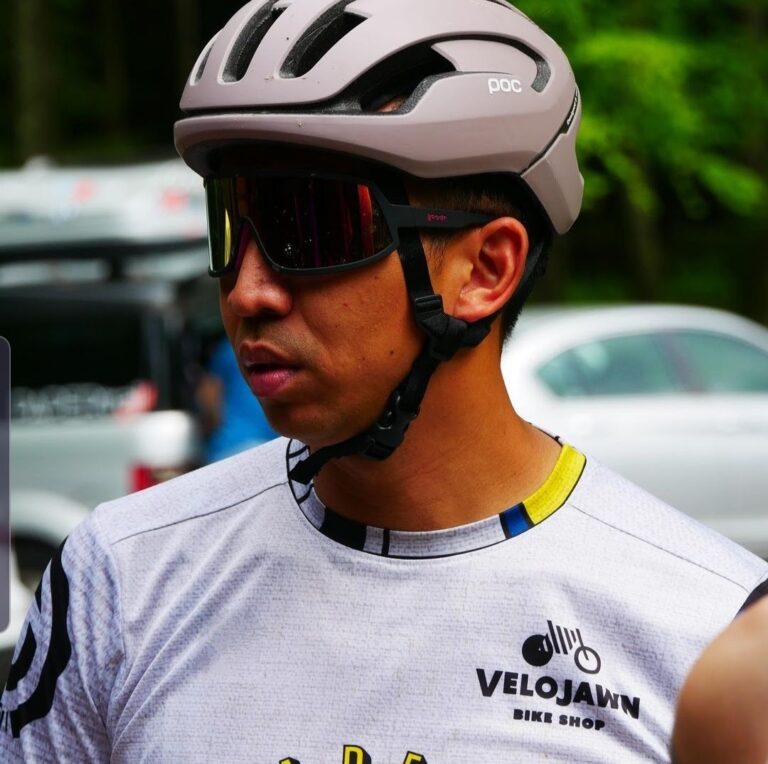
Velojawn
Shop Review by PBE Squad member, Miko Quisumbing As the New Year rolls on, now is a good time to get those bikes to Velojawn for some much needed TLC after a long season of riding. I recently stopped by Velojawn with some fellow PBE Squaddies and friends and experienced the newly revamped layout at […]
PBE 2021
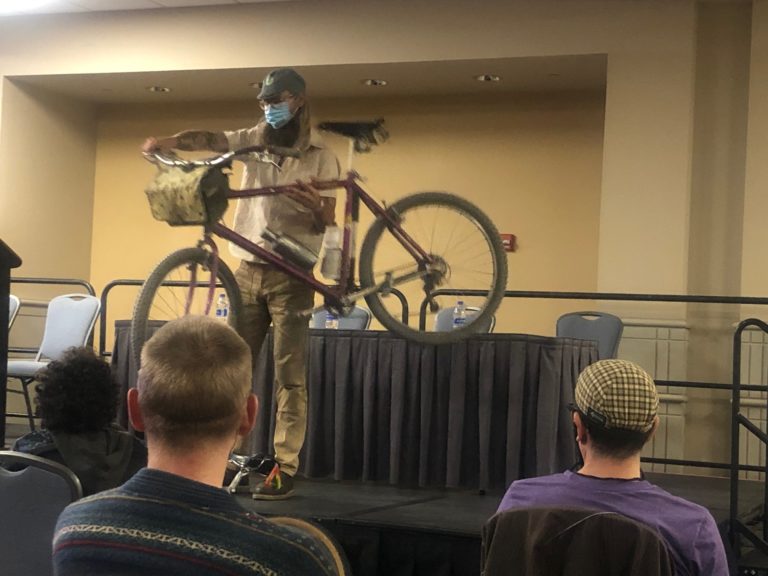
PBE Seminars offer different views on bicycle design
Every year, some of the top attractions of the Philly Bike Expo are its seminars that cover all aspects of the sport. Many of the seminars address unique or overlooked aspects of the industry, and this year’s line-up was no exception. Seminars such as “Women of the Bicycle Industry” and “Diversity and Equity in the […]
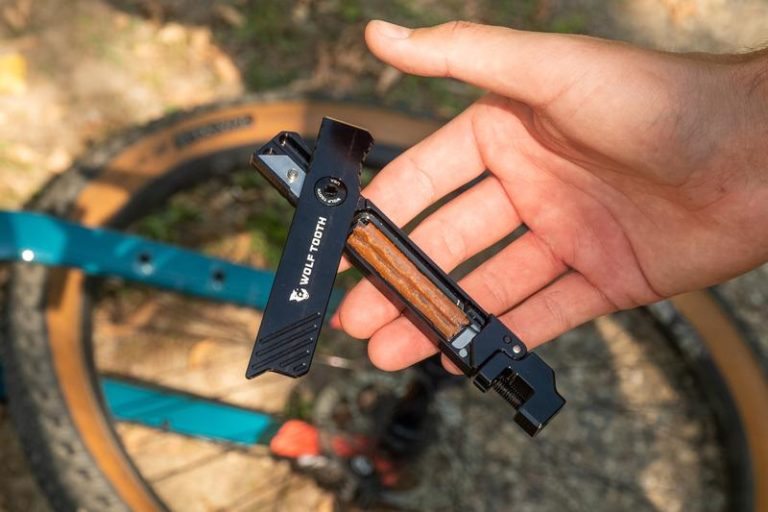
Otso Cycles/Wolf Tooth Components
Wolf Tooth and Otso Cycles are two different companies under the same ownership. Based in Minnesota, Otso offers six different bicycles, mostly all-road and gravel models made from carbon, stainless steel and titanium, along with one carbon hardtail mountain bike. Each bicycle model is also offered as a frameset, and there are options for customization. […]
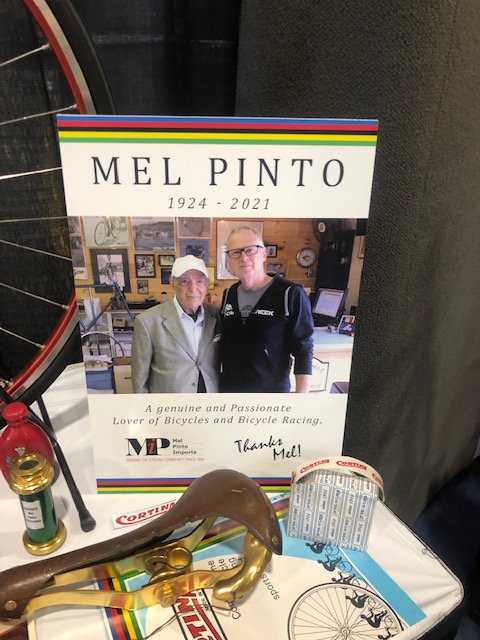
Wayne Bingham’s Mel Pinto tribute bike
The USA lost one of its chief proponents of bicycling with the passing earlier this year of Mel Pinto (1924-2021). Pinto was a Sephardic Jew whose family lived in North Africa and who spoke many different languages, including Spanish, French, Italian and English. During an encounter with American troops in Morocco during WWII while he […]

SKS/SQlab: Made in Germany
SKS and SQlab are two German companies imported to the U.S. by the same distributor, based in southern Illinois. SKS specializes in fenders and bags, while SQ Lab focuses on where the body meets the bike, namely saddles and grips/tape. Mark Burgener from SKS USA told us about the latest offerings from SKS, which recently […]

Paper Trail Bike Cafe
Bike shops that also offer baked goods, coffee or even craft beer are increasing in number these days, partly because bicycling burns so many calories and fuels demand for replenishment, but also because high-end bicycles and premium food and drink place similar demands on quality “ingredients” and attention to detail. Within this growing trend sits […]
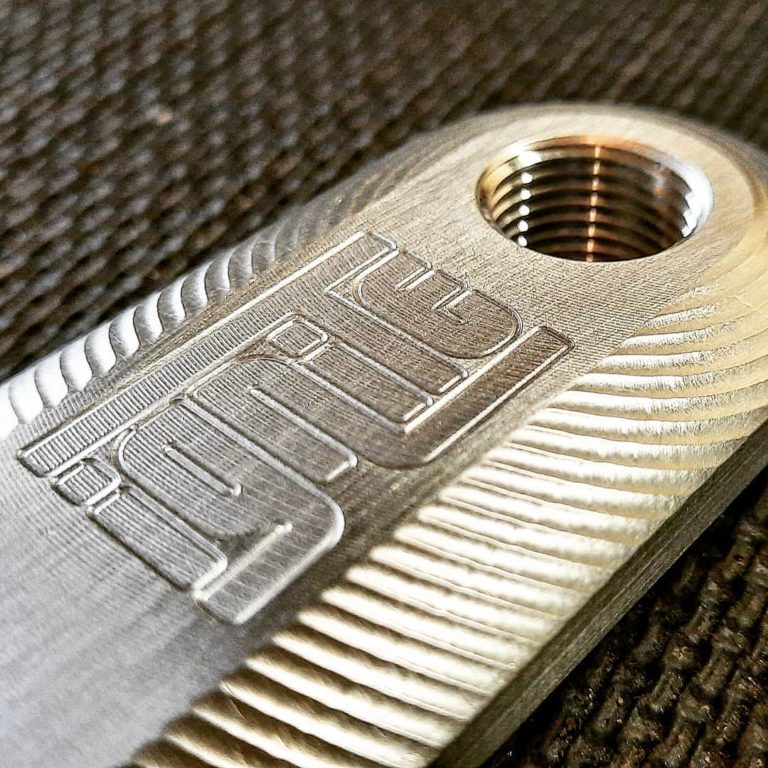
Ignite Components: Precision Engineering
Ian Colquhoun runs Ignite Components from his home base of Allamuchy in mountainous north west central New Jersey, less than an hour’s drive from New York City but seemingly a world away. The area offers an extensive network of trails for Colquhoun to conduct some product testing on. “The Allamuchy area has hundreds of miles […]

Iozzio Cycles: special tools
Jessie Troy Iozzio makes specialized bike components for the 420-minded among us from his native Brooklyn. His mainstay product is the Shotgun, an herb chamber and spring loaded ceramic pipe intended for use in 1-1/8 steerer tubes.that offers a unique twist on the typical headset top cap ( the “Ultimate headset adjuster” his website calls […]
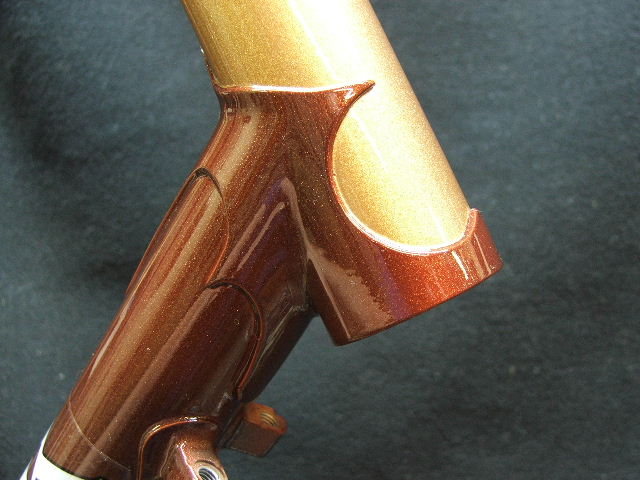
Tamarack Cycles: Canadian custom steel
Winters are long in Nova Scotia, Canada, but the short summers are sweet – a cyclist’s paradise with cool, crisp weather and quiet roads through lush northern countryside. Tamarack Cycles have been handbuilt in Halifax, Nova Scotia by Mark Beaver since 1990. Beaver is a 40-year veteran of the bike industry, having owned a bike […]

Tanglefoot Cycles: From the sugar shack to you
Tanglefoot is based in an off the grid sugar shack in East Poultney, Vermont. The three person operation began in 2017 and encompasses three different product lines: Tanglefoot, who produce bikes for MTB, Gravel/CX and Touring/Rando uses, Discord, who produce various components including stems and top caps from aluminum and steel, and Fifth Season, who […]

Swood Cycles: Made in Virginia
For the record, Swood Cycles are in fact made from steel, not wood. The name comes from a combination of owner Stephen Wood’s first and last names. He explains, “When I worked at a bike shop I signed all my work orders as S.Wood and eventually everyone just started calling me Swood.” Wood began operations […]

2020/2021 PBE x SRAM Inclusivity Scholarship for Framebuilders: Beth Morford
2021 PBE x SRAM Inclusivity Scholarship for Framebuilders: Meet Beth Morford. Beth is a former Olympic Sports Massage Therapist turned bike shop owner and is now adding frame builder to her resume. In 2017, she completed the Yamaguchi Frame Building School training program. She apprenticed under Julie Pedalino, and continues to turn to her for mentorship and […]
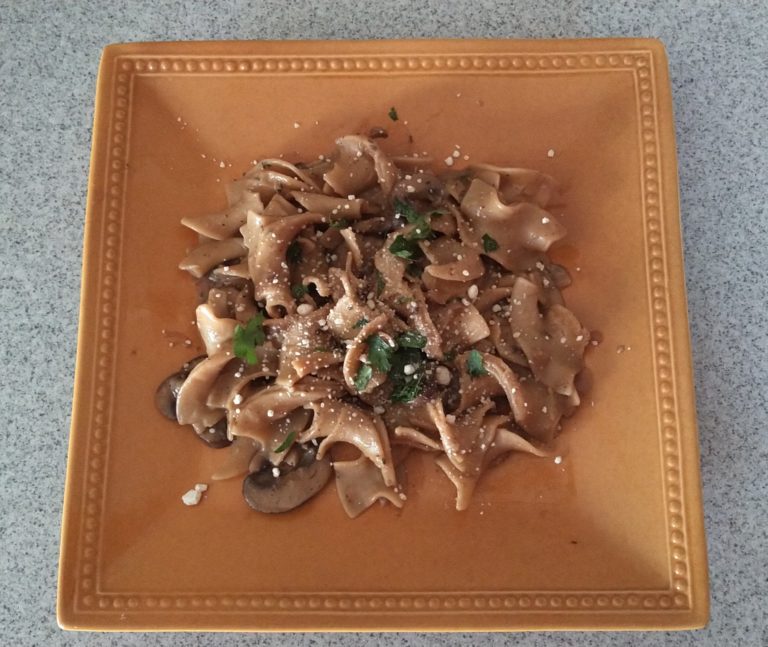
PBE Recipes: Mushroom Stroganoff (Vegan Option)
By Kathleen “Taffy” Medley Category: Anytime nourishment! Ingredients: 2 tablespoons grape seed oil, divided 1 large yellow onion 1 lb mushrooms 3 cloves of garlic, minced 2 teaspoons fresh thyme, picked 3 tablespoons flour 3 1/2 cups vegetable stock** 7 oz/200g dry egg noodles*** 1/2 cup plain almond milk Salt and pepper For garnish: Parsley […]

PBE Recipes: Morning after, (and before!)
by Rachael Sage Category: Anytime nourishment! Thoughts: I like to cook according to my refrigerator to keep things simple. Winter in Michigan requires many calories! And I like to maximize them with what I have access to. Here, I found farm fresh eggs and shaved ham from my sisters farm! Brussels sprouts and potatoes I […]

PBE Recipes: PB Energy Jawns!
by Miko Quisumbing Category: On the bike snack Thoughts: I love this recipe because it’s NO BAKE, which means more time to ride! I’m always trying to find little shortcuts that let me balance out Bike and Dad Life, and this is one of them!.I typically enjoy these between late fall to early spring since the […]

PBE Recipes: Sweet Potato Waffles
by Vanessa Romano Category: On the bike nutrition or post ride meal! Ingredients: Directions:

PBE Recipes: Mango kale Luxuroothie
by Taylor Kuyk-White Category: Anytime nourishment Ingredients:
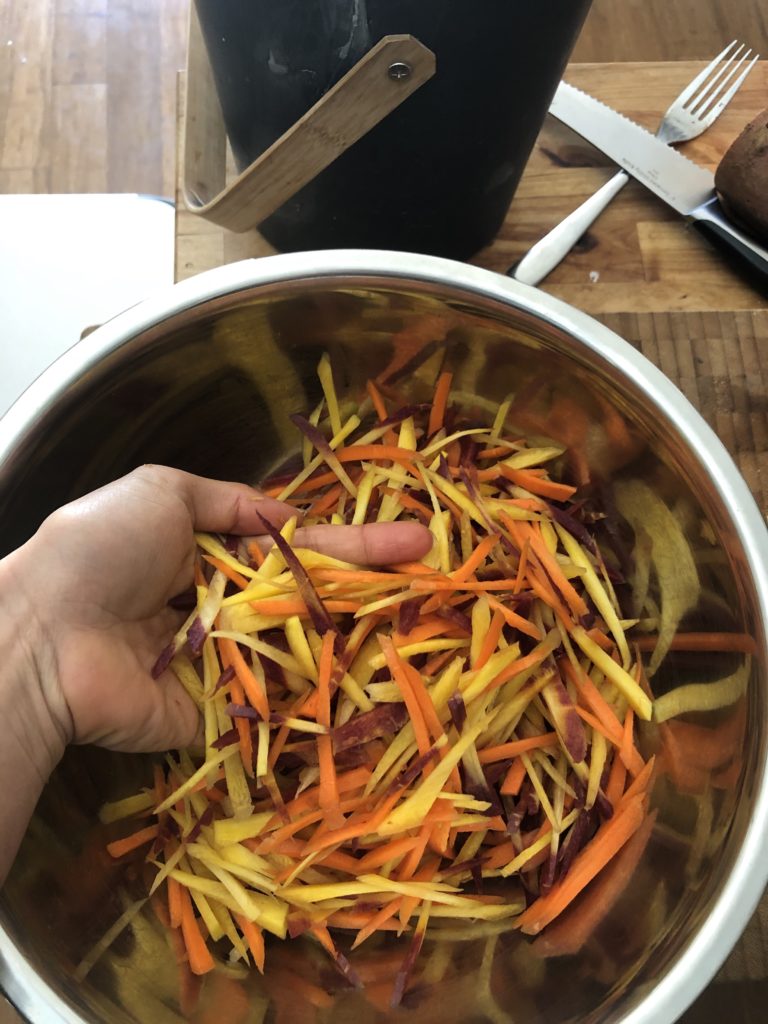
PBE Recipes: Bright and Crunchy Carrot Slaw
by Stephanie Halamek Category: Anytime nourishment Thoughts: March is typically the toughest time of year for fresh produce- we’re nearing the end of winter vegetable season, but haven’t quite gotten to the first harvests of spring. I often find myself bored and tired of a lot of the soft, warm foods that I’ve been eating […]
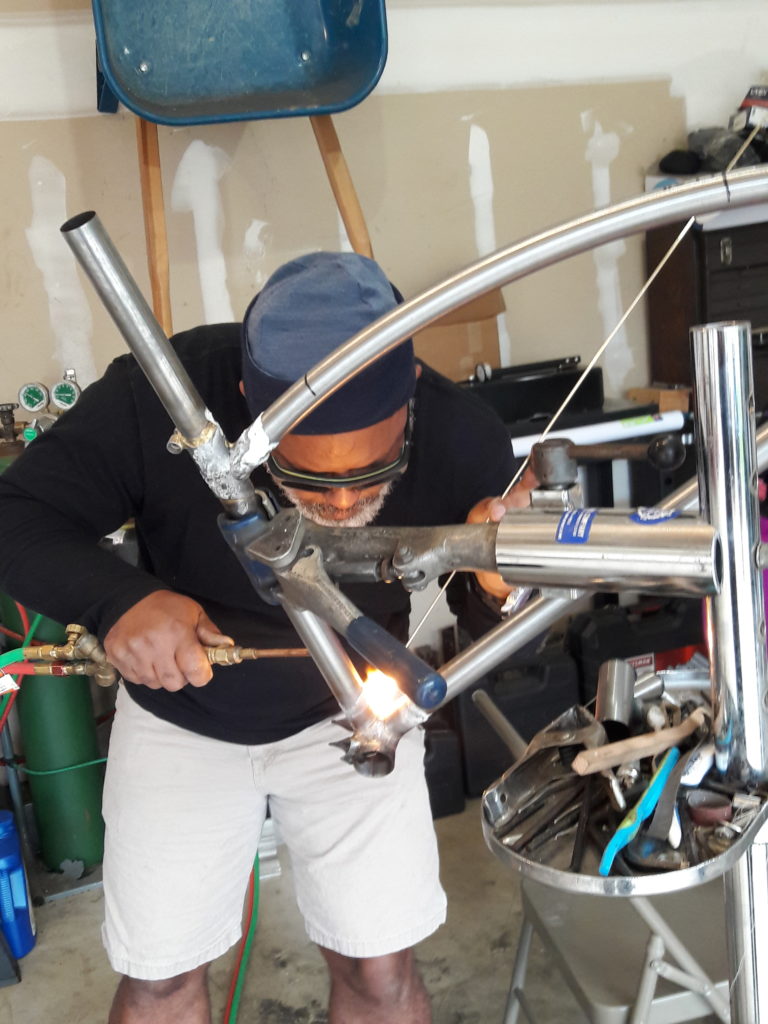
2020/2021 PBE x SRAM Inclusivity Scholarship for Framebuilders: Guy Stone
This week we will be re-announcing the winners of the 2020 PBE x SRAM Inclusivity Scholarship for Framebuilders! They are the now the 2021 recipients as it has rolled over to 2021 due to there not being an event in 2020. We will be awarding the scholarship to 4 builders and will announce one at […]
PBE 2020

2020/2021 PBE x SRAM Inclusivity Scholarship for Framebuilders: Beth Morford
2021 PBE x SRAM Inclusivity Scholarship for Framebuilders: Meet Beth Morford.
Beth is a former Olympic Sports Massage Therapist turned bike shop owner and is now adding frame builder to her resume. In 2017, she completed the Yamaguchi Frame Building School training program. She apprenticed under Julie Pedalino, and continues to turn to her for mentorship and guidance. Beth leads urban WTF rides in her Eudora KS community, and hosts open shop nights at her bike shop free of charge for anyone who wants to tinker on their bikes.
“We adhere to the @wtfbikexplorers Industry Pledge at my shop and just in life in general,” says Morford. “I have the deepest passion for serving any and all womxn, adults and youth!”

We asked her what she believes receiving a PBE x SRAM Scholarship would mean to her.
“Short-term, it will help take the financial pressure off of me for my PBE build. Framebuilding is not a cheap hobby or career to have, as all builders understand. I already own a brick and mortar bike shop, which is difficult enough to keep open on its own,” she says. “Long-term, this scholarship will help me develop newer and stronger relationships within the industry that I may not have developed otherwise, which is invaluable in and of itself.”
Congratulations Beth! Looking forward to seeing you in Philly! #phillybikeexpo #pbe2020 #pbexsraminclusivityscholarship

Save the Rim Brake! A Reactor Dream Build
Every now and again we get a chance to work on a bike that perfectly aligns a rider’s vision and our own, and this very special Reactor for No. 22 dealer Larry Marcus is our latest example of that alignment.
Starting with our aggressive Reactor frame with custom geometry, the goal was a responsive, enduring build highlighting that in many ways rim brakes are still on the very cutting edge of road race performance.
The Reactor platform was the perfect start for this project. It’s not the lightest frame available, but the extra grams budget in the frame allow for outstanding responsiveness, ride quality and durability. The Reactor’s enormous chainstays and large, aggressively butted main tubes give it a rock solid ride under hard efforts, with careful tuning keeping just enough of titanium’s legendary ride quality to make the bike a welcome companion on long rides.
Marcus’ goal was to focus on ride quality for the frame, and aggressively trim grams everywhere else. To that end, the build is dripping with exotic parts aimed at shedding grams and saving watts. Lightweight’s Meilenstein Obermayer wheels feature a deep profile and an otherworldly weight of just 935g for the pair. THM’s Clavicula cranks, Ulna handlebars and Fibula brakes trim substantial weight compared to more “pedestrian” parts, with the complete set of Fibula brakes weighing less than a single Dura-Ace caliper.

Eager to sweat the details, Marcus’ build left no stone unturned in the quest for light weight and sharp performance. Berk’s Lupina saddle features carbon layup work suitable for a museum piece and the full carbon construction comes in at just 79g. In the drivetrain, Shimano’s faultless Dura Ace Di2 components are helped with a complement of CeramicSpeed parts, including bottom bracket, headset and most notably CeramicSpeed’s ultralight and ultra-efficient 3D printed titanium derailleur pulley wheels. PYC’s lightweight SP1101 chain looks great in black and sheds additional grams.
All of the lightweight componentry added up to an as-pictured weight of just 12.78lbs (5.8kg) for this Reactor.
Wrapping the entire package together is a one-of-a-kind finish that mixes our in-house anodizing with Cerakote done by Black Magic of Portland, OR. Cerakote is a finish that we are particularly excited to use. It is a unique ceramic coating that is both extremely durable and impossibly thin, which complements our similarly thin anodized finish beautifully while offering a range of colours and tones not achievable by anodizing. The end result is a finish that shows off the beauty and lustre of titanium while maintaining the material’s legendary durability.
For Marcus, the sum of all of these details is a razor sharp build that shows that rim brakes are still deserving of recognition at the very sharpest end of the road bike spectrum.


2020/2021 PBE x SRAM Inclusivity Scholarship for Framebuilders: Guy Stone
This week we will be re-announcing the winners of the 2020 PBE x SRAM Inclusivity Scholarship for Framebuilders! They are the now the 2021 recipients as it has rolled over to 2021 due to there not being an event in 2020. We will be awarding the scholarship to 4 builders and will announce one at a time so you can get to know them and so they receive the recognition they deserve! Meet Guy Stone, 2021 Awardee of the Philly Bike Expo Framebuilder Scholarship. After attending a BREW Racing frames TIG class in May 2015, and then a brazing class from Joe Bringheli in 2016, Guy began building frames in his home shop. For the past four years he has averaged about ten brazed steel frames per year. They range from rando and road to mountain, fat, tandem and youth bikes.
Guy Stone is very involved in his local Cincinnati, OH mountain biking community, providing volunteer accounting services to the board of the Cincinnati Off Road Association (CORA) including filing the organization’s tax returns, consulting and audit support. Guy and his wife also started a small private foundation, Relstone Charitable Trust. Through the foundation, the Stones have made donations directly to local trail stewards in order to support trail maintenance and expansion in the CORA system.
“I have a lifelong passion for cycling,” says Stone “I (also) have the deepest passion for serving veterans and those that have suffered traumatic injury. Two-wheeled therapy is a positive outlet to promote healing and coping with injuries (mental, spiritual & physical).” Stone looks to the future in which he can build a complete bike every year free of charge for a veteran or other individual who has suffered from a traumatic injury.
Stone tells us that his short-term career plan is offering awesome custom bicycles to the relatively small Cincinnati, OH market.

“I don’t fear failing,” says Stone. “I actually embrace it. I learn for my mistakes and move on to learn from new mistakes. With each project I try something new to keep the learning curve high.”
His long-term career goal is to acquire a larger shop with machine tools. Similar to his mentor Joe Bringheli, Stone would like to offer frame building tools and supplies in addition to bicycles.
“I hope that seeing an African American male participate in the Philly Bike Expo will inspire other people of color.”

Congratulations, Guy! Looking forward to seeing you in Philly!
In 2019, the Philly Bike Expo announced a new framebuilder scholarship program, sponsored by SRAM. The PBE Inclusivity Scholarship supports women, trans, and POC framebuilders who have been underrepresented at bike shows and in the industry at large. .Scholarship recipients will receive co-operative booth space at the 2020 Philly Bike Expo, travel, accommodations and shipping for the Expo as well as a complete SRAM build for their show bike! #phillybikeexpo #pbe2021 #pbexsraminclusivityscholarship

“Missing” Events
Witten by Alex Felmeister
Photos by Jason Giordano
Being on the Philly Bike Expo Squad this year, I fully expected to step up my participation in cycling events in 2020. Like everyone else, I am pretty disappointed my regular events, clubs rides, and planned new adventures have been postponed or canceled. One particular event, extra close to my heart, is the Eagles Autism Challenge. This event is a new event only its third year and includes 50, 30, and 15 mile rides, a 5k race and a sensory walk. No matter how you participate, you end your ride, run, or walk at a huge finish line party on the field of Lincoln Financial Stadium. It’s not just a great 50 mile ride for me, but it is a magical event that is uniquely Philadelphia; when you see this diverse city come together for one cause in a beautiful way around our beloved Eagles. I selfishly anticipate the reveal of the cycling jersey for the ride. If you pledge and raise enough money, you get one of three special limited-edition jerseys based on your fundraising goals from Primal, a Philly Bike Expo exhibitor! This year I blew away my fundraising goal raising over $5,000, so I was really looking forward to this year’s ride to represent this accomplishment in an All-Pro Plus Jersey from the Eagles. Riding and running for charity is a great way to engage in your sport and feel like you are making a difference. I personally like events that have local impact, so this one has become one of my favorites. Philanthropy is one of the only ways to make a substantial impact and raise awareness for complex issues like autism.

I ride for Team CHOP. The Children’s Hospital of Philadelphia (fondly known locally as CHOP) cares for more than 10,000 patients with autism each year in almost every clinical area, and teams from CHOP’s Center for Autism Research and Autism Integrated Care Program include rehabilitation therapists, developmental pediatricians, neurologists, psychologists, geneticists, psychiatrists, advance practice nurses, social workers and many others. These folks have led breakthroughs for children and families, from making earlier diagnosis possible to improving therapies and access to services. It is an honor to ride for them and raise money for them.
In 2019, the Eagles Autism Challenge funded competitive research at The Children’s Hospital of Philadelphia (CHOP), The University of Pennsylvania, and Thomas Jefferson University. They have also awarded two post doctoral fellowships; one at CHOP and one at Temple University, and this means that two new scientists are getting their research funded here in Philadelphia at their respective institutions. This type of direct impact on the local research community means access to opportunity for new researchers and for much needed attention brought to this issue that affects so many local families. The Eagles Autism Foundation has also funded programs through community grants that directly impact Philadelphia communities. This organization has also engaged participants and fundraisers in generous ways. I had the opportunity last year to attend the recent Eagles/Dallas game and see first-hand the generosity of fans and prominence of this foundation throughout the game thanks to tickets I won at the Philly Bike Expo last year!
Yesterday, Saturday May 16th, would have been the ride. I put on my Primal jersey and hit the roads in honor of cycling and the cause this event supports.
Go Team CHOP! Go Birds!
PS: A special heart-felt shout out to families at home taking care of their kids and loved ones affected by autism during this time of isolation. I ride and raise money for you.


Riding Solo: Mental Toughness and Incremental Landmarks
By Mark Yanagisawa
During these times of uncertainty around the world, one thing has been my rock through it all – still being able and allowed to ride for exercise – of course while staying socially distant. As my work has moved from the office to my living room, the normal routine is not so “normal”. I have to make the mental switch from work to “not-work” at the end of the day. Also with most events and rides cancelled for the foreseeable future, motivation to train towards a goal might be hard.
I’ve found my motivation in riding to exploring new places, discovering new bakeries, re-visiting favorite roads and pedaling familiar routes. All of this, solo; alone; self-supported; me and my thoughts; me and my machine.
Riding solo can be a daunting task, but the more and more that I do it, the more I enjoy my time on the saddle. I find peace and joy in it. While it might appear that I jumped straight into the deep-end taking-on centuries, its quite the opposite. I started out riding 20 miles solo, then 40, then 70 and more. I had to build my mental (and physical) strength to be on the bike for more than 2 hours at a time, working my way up to 5 hour plus rides. I rode familiar routes that I did on group rides before using Strava and Garmin to map out longer adventures.
Whether its your first ride or 100th solo ride, here are some tips to prepare and ride solo.
1. Be Seen.
Safety is my number one priority and staying visible is the most important! Wear a bright kit and helmet with reflective bits. Run a blinking tail light and a low beam headlight.

2. Route.
Keep it close – for your first solo ride, stick to a route that you know and are familiar with – like a weekly group ride route – the one you know like the back of your hand. This is a great way to keep your mind stimulated on reaching the next landmark. For example, “the next turn is at the CVS, then up the winding hill, around the bend, back down to the trail, then take the trail home!” With this mental trick, you’re breaking down the route into small, manageable goals, check-points, and incremental landmarks. This helps clear the “miles” and “hours” from your head.
As you become more confident – start your route on roads you normally take, then venture beyond the turn-around point. Plan a new destination and ride! This can be an extra 5 miles beyond. On the return trip, connect to the same roads that you are familiar with. With this mindset, when I come into the river trail – 12 miles from the city- I am mentally thinking, “I am close to home”.
If you’re still following along – I’ll be the first to agree that the same roads might get boring, BUT that is a good sign because this is all to build your mental toughness for riding solo. When my mind switched from “miles left” to “land-markers” that’s when the beauty started.

Venture in a new direction – Pick a new direction or destination to travel to – plan a ride to a bakery, brewery or bike shop that is along the route to get yourself looking forward to that croissant, beer or snack! If possible, incorporate familiar roads into the route on the return trip – again in the theme of looking forward to landmarks. Start small and then increase your mileage as appropriate!
The world is your oyster – once you get the mental and physical toughness to ride solo, whatever distance, take to the road and explore the world from your doorstep!
3. Route Planning
I use Garmin Connect and Strava Routes to plan most of my routes. To my limited understanding, they use heat mapping to create routes and I have not been disappointed in their algorithms to route me on safe roads, bike paths, or trails. As the miles increase, I make it priority to find “rest-stops” to fill water and re-supply if needed – I typically plan for a stop every 30 miles. Garmin and Strava routes both interface nicely with my Garmin head unit.
4. GPS Unit.
A GPS unit, like Garmin, Wahoo, or Hammerhead can be very useful tool to plan and navigate routes, track metrics (HR, power, cadence, speed, elevation, mileage, time). I also have the Garmin Livetrack and Strava Beacon for my family to track me when I am riding to make sure my dot is moving and for safety (see #1). I personally love my Garmin Edge 530 and the functionality it provides me.
5. Dressing for the Weather
When riding solo, look up the weather forecast and make sure that you’re prepared for the weather. Layering is key. Clothing with zippers is a plus so you can zip and unzip, layers for perfect temperature regulation. For example, during climbs your blood will be pumping and body will warm up, so unzip the layers and let your body breathe; and on the downhills protect yourself from the breeze and drag and zip all of your layers. From the base layers, arm & leg warmers, bibs, jersey, vests, and thermal long sleeves – there can be many combinations that will get you suited to be prepared and cozy for the weather.

6. Drink and Nutrition
Make sure that you have enough (or more than enough) liquids and nutrition with you when you are riding – and more so when you are riding solo because you don’t have buddy to share water with (see CDC on sharing and social distancing). Water with Skratch or Nuun helps replenish what you sweat, and nutrition like Honey-stinger Gels or Cliff Bars provide much needed fuel to keep you moving. I like to drink every 5 miles and eat 100-200 calories every 15 miles – your mileage may vary, but make sure you are doing this and are prepared. Also, bring money so you’re ready for a rest stop fill up.
7. Spares
When riding solo, you should be prepared for most situations you’ll encounter. This was the most daunting part to me but being prepared helped ease my anxieties! A tube, patch kit, tire lever, pump or C02, and tool are essential for riding solo. If you’re planning a longer ride, a charger, additional tube and spares might be useful. Real story, on a 160 mile trip (Philly to Lancaster), I flatted twice – I was prepared with two spare tubes and a hand pump, so it did not halt my ride.
8. Other accessories to keep you rolling
While not essential to riding solo, I have found a few accessories to help me go further, more confident and comfortable on my bike…
Hunt Superdura Dynamo (SON 28) Wheelset – I generate my own power. Hunt’s pre-configured wheelset makes the plunge into dynamo EASY – they spec a high quality SON 28 hub, laced to their asymmetric rim and are able to be configured to tubeless/tubed and rear cassette hub.
Sinewave Beacon – This takes the power I create and makes it into USABLE electricity! It simplifies the electronics to a single unit that is a light and charger all in one. I can confidently ride without worrying if my light is charged. I have used it to also charge my Garmin, phone and portable battery.
WTB Exposure 34’s – With plenty of rubber and volume beneath me, I can take on paved and unpaved roads confidently and equally, all while maintaining comfort. The Exposure line-up has a smooth center tread for fast pavement section and small side knobs to grip dirt or gravel, providing me confidence for traction.

Lupine Rotlicht – “Isn’t just a tail light?” No, its not just a normal light. It is a super bright (>160 lumens), long lasting (>30 hrs), compact light with a built in sensor that goes solid when braking (like a normal car would).
The key takeaways are to be safe, be seen and be prepared. And with some metal preparedness, you can build some mental resilience to endure riding solo.
Rubber Down. Head Up.
Mark

2020 PBE x SRAM Inclusivity Scholarship for Framebuilders
*Applications are now open!*
In 2019, the Philly Bike Expo announced a new framebuilder scholarship program, sponsored by SRAM. The PBE Inclusivity Scholarship supports women, trans, and POC framebuilders who have been underrepresented at bike shows and in the industry at large.
Scholarship recipients will receive co-operative booth space at the 2020 Philly Bike Expo, travel, accommodations and shipping for the Expo as well as a complete SRAM build for their show bike!
We are now accepting applications for the 2020 Philly Bike Expo Inclusivity Scholarship. 4 recipients will be selected. Application deadline is April 30th and recipients announced on May 28th. Apply here: (You will need to sign in to google to apply due to file upload required.) #phillybikeexpo #pbe2020 #pbexsraminclusivityscholarship

Titanium Finishing Co: Pretty Parts
Titanium alloy is an important metal for the bicycle industry. If you aren’t riding a frame made from it, you probably have some titanium bits somewhere on your bicycle. But there are few companies who can survive producing titanium parts for the cycling industry alone. Luckily, there are a number of other industries – aerospace and medical among them – that use titanium components, so with a diversified clientele, titanium finishing becomes a profitable industry.

Melinda Cunningham is Vice President of Titanium Finishing Company, who apply finishes to titanium components for a number of industries. The company was started in 1970 by her grandfather, Melvin Faul, and is located in East Greenville, Penn., just south of Allentown. As an avid cyclist, she joined the family business with her husband, Eddie, also a cyclist, who works as a Senior Metal Finisher at the 15-employee company. So, it was only natural that custom bicycle parts and finishes would be added to Titanium Finishing’s list of specialties.

Melinda explains: “Titanium Finishing Company specializes in anodizing titanium, hard anodize of aluminum, and application of Cerakote products. With a combination of these finishes, or even on their own, they’re great for customizing bike frames and components. TFC also offers in house graphic design services, so the options for customization are almost limitless within the capabilities of coatings we offer.”
Before officially joining the family business after a stint at Penn State, Melinda grew up around titanium finishing, so she knew the ins and outs of the process. But husband Eddie came to the business from a different background. For over ten years he was a tattoo artist. The couple’s penchant for creativity finds an outlet at TFC.


“Both of us enjoy exercising our creative side, especially on bike themed projects because it gives us a chance to mix business with our passion for riding! We love having the chance to interact with like-minded individuals who want to customize their frames and components,” says Melinda.

While for some, the raw beauty of unfinished or lightly brushed titanium, resistant to rust and corrosion, is desirable, Titanium Finishing Company allows bike fans to get creative and even wild with their finish concepts (think of intricate tattoo designs). The in-house graphics team and Eddie on the production side of things will turn your dreams into bespoke beauty!
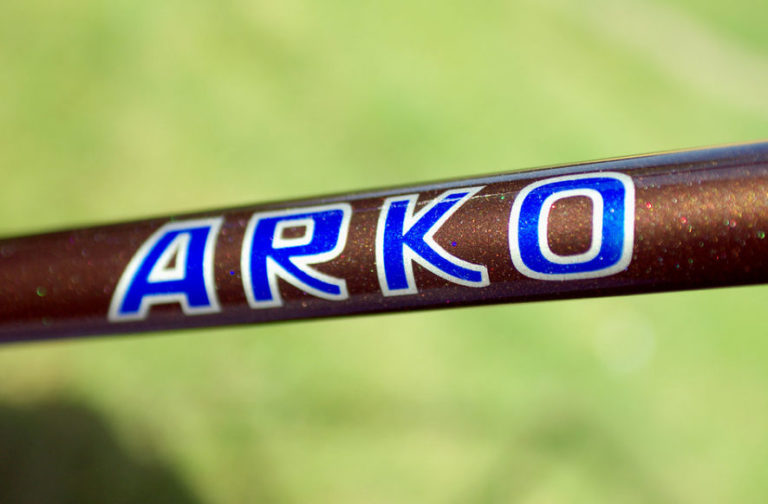
Arko Bici: Beautiful Process
The nation of Slovakia in central Europe may not come up often in general conversation this side of the Atlantic, but if you inhabit the cycling world, you’re likely to know something about three-time World Road Race Champion Peter Sagan, who hails from Slovakia. The eastern half of the former Czechoslovakia, sandwiched between Poland to the north, and Hungary to the south, is experiencing a cycling boom, thanks in part to Sagan.
Slovakia also doesn’t usually cross the mind when thinking of custom framebuilders, but Marek Parajka of Arko Bici might lift the profile of bicycle fabrication in Slovakia the same way Peter Sagan lifted it for cycling in general. The one man operation produces attention-getting custom steel frames and stems with exquisite detail and beauty. Parajka is coming to the Philly Bike Expo in November to introduce himself to the U.S. scene. It’s likely that he’ll make a big and favorable impression.
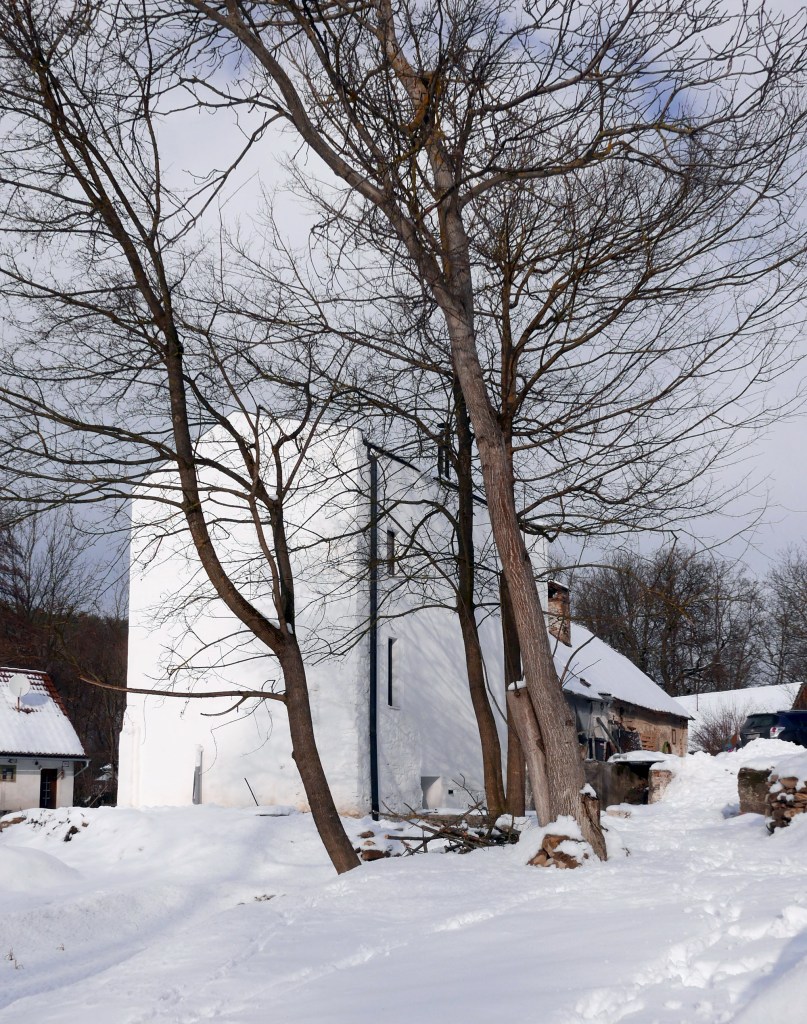
Parajka is a certified welder and metalwork technologist who together with his wife bought an old mill – water wheel and all – in the village of Hradiste pod Vratnom in western Slovakia. It serves as both their home and frame workshop. The name of the brand, Arko Bici, comes from Parajka’s dog, Arko, and Bici, the Italian word for bicycle. Parajka began operations in 2009.
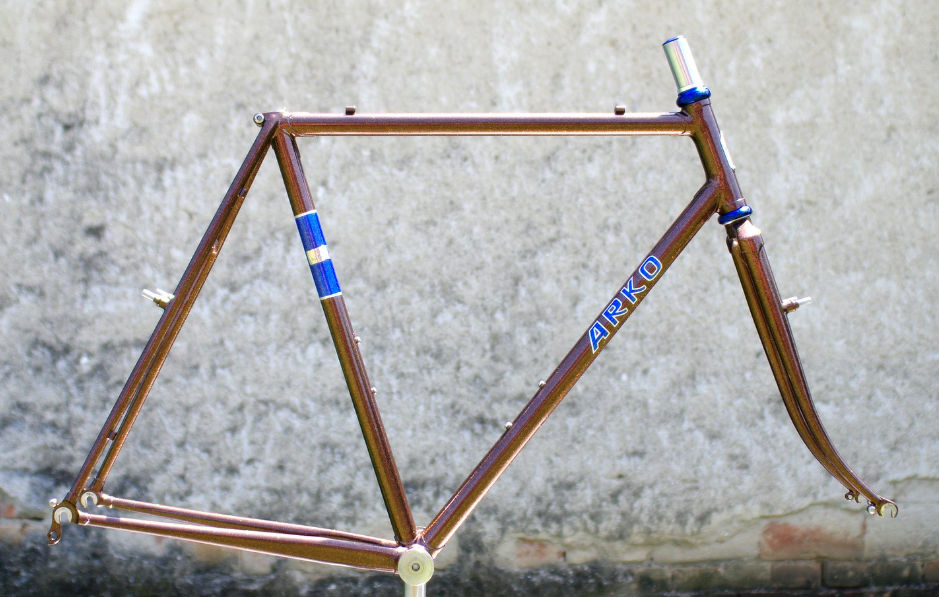
Every Arko Bici frame is handcrafted using steel tubes of the client’s choice, and frames can be lugged or fillet brazed. Parajka builds frames for road, randonneur and cyclocross/gravel uses. He does all of his own painting as well, and eschews the powder coat trend – wet paint only for every Arko Bici.

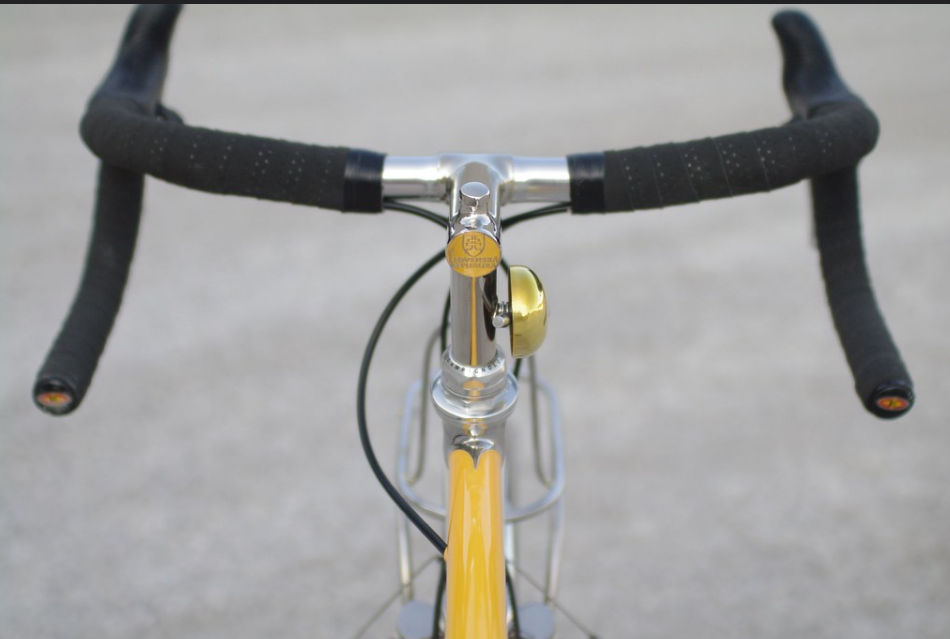
Asked about his favorite part of his work as a framebuilder, Parajka said that he enjoys the three “B”s of framebuilding: brazing, brushing, and buffing, but he also really enjoys taking quality photos of his finished frames and bikes, which can be seen at his Flickr account. All frames are built to order for his customers, who come from all over Europe and soon, he hopes, from the U.S. as well.
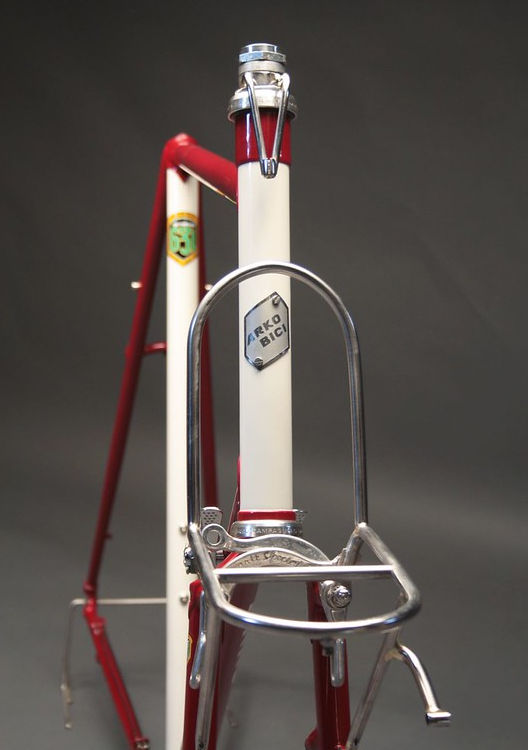
Parajka clearly sees framebuilding as an art form – a craft in which his customers also play a role. “Framebuilding is a lifelong craft,” he says. “It’s a beautiful process and the client himself is a big part of it. He brings his ideas and perhaps dreams of what the bike is going to be like, and I bring them to life.”
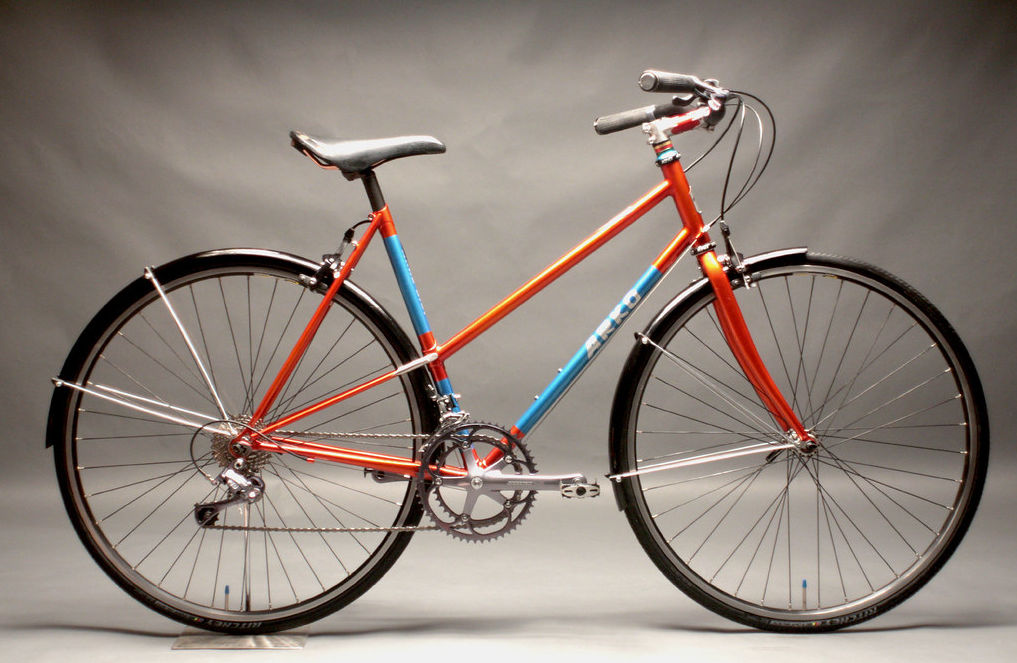
As cosmopolitan as his customer base may be, Parajka has a strong commitment to sourcing local supply chains and lifting the local economy of western Slovakia. “When you consider hand made steel frames, you don’t pay only for this unique piece, but you also support the local supply chain. Tubes come from Italy or UK. Welding material, gasses, brazing rods, tools, paints, and energy I pay for. It all comes from local or EU suppliers.”

Jersey Bents: Recumbent by Choice
The prevailing narrative is that recumbent bicycle riders are a breed apart, never having ridden regular diamond-framed bikes, and only able to see things from their viewpoint – lower to the ground as it is.
Larry Hobbs, owner of Jersey Bents bike shop in Hamilton Square, New Jersey, rewrote this script. As with many things in life, happenstance brought him from being an avid rider of a regular bicycle to owning a recumbent-only bike shop.

Hobbs writes at the Jersey Bents website: “I have ridden a diamond frame for more than half of my life. Rides as short as a few loops around the neighborhood or 100 miles. I was “forced” into the recumbent community after a fall left me with a lingering elbow injury. BEST THING to ever happen to me!”
Five years after his recumbent conversion, Hobbs had the opportunity to purchase an existing bike shop (not specializing in recumbents), and he realized his dreams of opening his own business. The rest, as they say, is history.

Hobbs’ son Matt is co-owner, head mechanic, bike builder and caretaker of the shop dog, Bacon. Unlike his father, Matt wasn’t forced into a recumbent, but a fascination with his father’s recumbent bike led to a lifelong interest in the mechanical side of recumbents.
“My dad’s first recumbent, a long wheel base Gold Rush, intrigued me like nothing has since I first saw a snowboard! When he brought that bike home, I was fascinated by it. I learned to ride the recumbent and it opened my eyes to a whole new world!” he says.

Jersey Bents has the largest selection of recumbent bikes and trikes for sale in the tri-state region. They serve as a clearinghouse for information and support for all things recumbent, and offer free test rides and bike fitting.

Recumbent bikes from Alinker, Azub, Bacchetta, Catrike, Cruzbike, Day 6, ICE, Lightning Cycle Dynamics, TerraTrike, and Trident Trikes line the racks in the shop, and they offer a wide range of accessories and expert repairs to get you on the road on a recumbent and keep you pedaling.

Jersey Bents is open three days a week, but are available other times by appointment. Larry and Matt advise that it’s best for customers to call ahead to the shop in any case, so that they can prepare appropriate bikes for test rides. They also encourage customers to come wearing appropriate cycling attire and shoes, to get the best performance out of the test rides.
Although Jersey Bents helps a lot of cyclists who are forced into riding recumbents because of injury, there are a growing number of cyclists who choose to ride recumbents for the pain free miles that they promise. Whatever your reasons for riding a recumbent, they hope to serve your needs soon.

Iride Italian Bicycles: Classico!
Let’s set the record straight: Italian builder Iride Italian Bicycles didn’t enter the U.S. market ten years ago with a cute, media friendly name (as in “I ride”) to help people remember them. But if this particular mnemonic works for you, that’s ok too.
“Iride” (pronounced EAR-ee-day) is the Italian word for “iris”, and it also refers to the colors of the rainbow, the visible spectrum, so it’s even more of an appropriate name for a bicycle brand in this context. Cicli Iride was established in 1919 by Umberto Gemmati in the Veneto region of northeastern Italy. Today, Umberto’s grandson Carlo holds down the fort at the House of Gemmati.

Classic handbuilt construction with Columbus Niobium SL steel tubing brazed to investment-cast lugs reflects the focus on tradition at Iride. Even the classic-but-compulsory Ferrari red paint scheme on every Iride model – an Italian version of Henry Ford’s famous “any color you want as long as it’s black” directive – sings che bello.
Iride has a racing pedigree on both the track and the road, and they offer the Nucleo road racing model, and the Pista Fixed for the velodrome. But it’s with a couple of different models that Iride really stands out from the sea of Italian builders (even those still building with steel tubes).

The Il Mercante has a 20-speed drivetrain and is intended for urban cycling. It offers an upright yet still aerodynamic position for the rider courtesy of Gipiemme Piega Sport Torino “pull back” handlebars. Keeping with Iride’s neo-retro vibe, the Mercante offers an antipasto platter of components from various Italian manufacturers, similar to how manufacturers sourced parts from many different companies during the 1970s and 80s, before the proprietary groupset began to rule the roost.
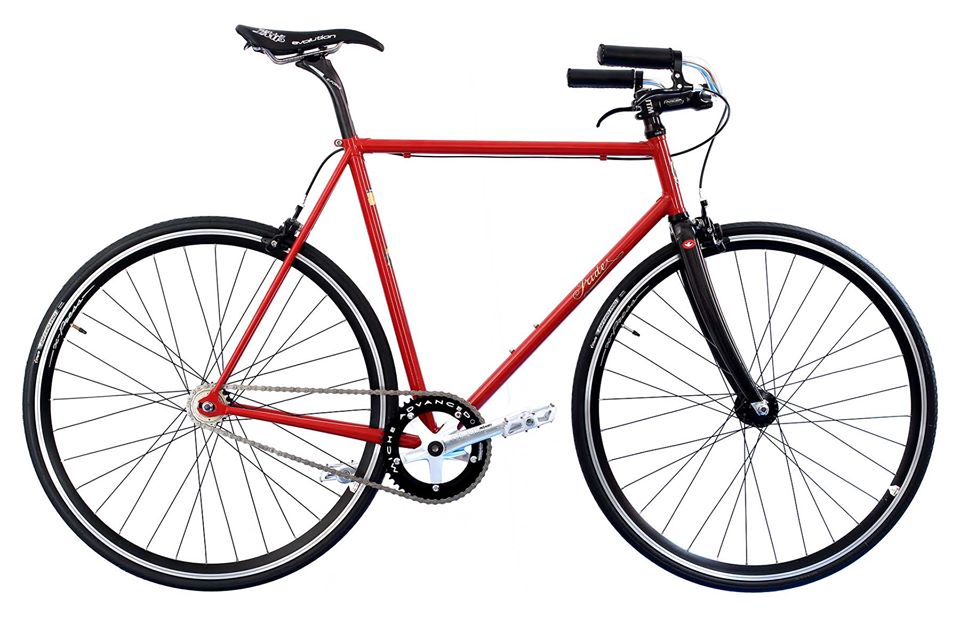
The Monello is the single speed version of Il Mercante, and the Mixte offers step-through geometry with the same single speed drivetrain. All of Iride’s models offer a full-range of custom options, including frame geometry, the use of oversize steel tubing (on some models) for a stiffer ride, chrome lugs and trim, water bottle mounts, saddle and seatpost choices. Forks come in three options: a full carbon Columbus Minimal fork (which Iride recommends), a carbon fork with steel steerer, or a full steel fork made of Columbus tubing. You can also choose your wheelset, upgrade to a Chris King headset, and have your name hand painted under the clearcoat.

Iride offers these options on a full bike build that still comes in at a lesser price point than going full custom. While all of the options are subject to upcharges, there really is no limit to how much you can customize your dream bike.
As long as you love red.

Knight Composites: Fast Company
Boulder-based Knight Composites makes wheelsets for the road, the trail and the cyclocross/gravel circuit. Knight wants you to ride long, ride hard and ride fast, and their carefully engineered and crafted wheels will enable this for you.
Knight makes carbon and alloy wheels in 700c, 27.5” and 29” sizes for road, triathlon, MTB and cyclocross/gravel uses. The rims come in five different depth profiles (25 – alloy only, 35, 50, 65 and 95 mm), plus a full carbon disc wheel, and they are made in versions for clincher, tubeless clincher and tubular tires. The wheelsets also come in both rim brake and disc brake iterations. Adding further to the choices available are either proprietary Knight hubs, or versions from Chris King or DT Swiss, and with cassette compatibility for Shimano/SRAM, SRAM XD or Campagnolo.

With all these choices for the consumer, Knight is clearly committed to meeting the full needs of the marketplace, but they see their advantages focused in three areas critical for cycling performance: speed, compliance (comfort), and durability. For each of these salient factors, Knight has engineered unique solutions that benefit the rider.
Speed is enabled through the use of Computational Fluid Dynamics (CFD) to develop Knight’s proprietary Trailing Edge Aerodynamic Manipulation (T.E.A.M.) rim profiles. The T.E.A.M. technology maximizes airflow around the rim, tire and downtube, minimizing drag-inducing losses and actually providing power-saving lift.
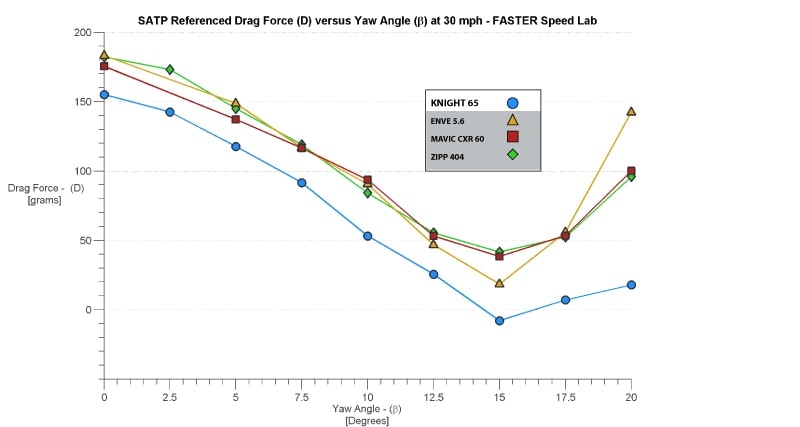
For compliance or comfort, Knight uses an EPS manufacturing process to control uniformity and compaction in the carbon rim layup. This avoids the need to overbuild the rim, which can cause a harsh, overly stiff ride. The result is a balanced, laterally stiff, yet vertically compliant ride that is as comfortable as it is efficient.
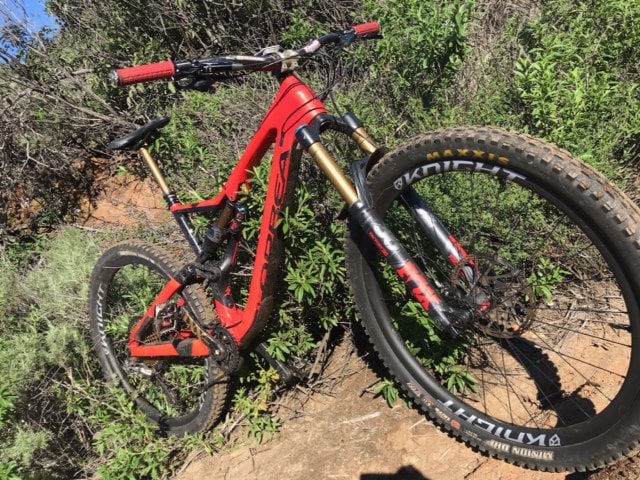
All these advantages of speed and comfort mean nothing if your wheels fail on you, so for durability, Knight also relies on the carefully-engineered EPS carbon layup process. The precision of EPS molding allows Knight to reduce “carbon drift” and “voids” associated with bladder-only molding, which can cause weak spots. Tests have proven Knight’s wheelsets to be 30% more impact resistant than their competitors.

Knight Composites’ speed, comfort and durability advantages make their wheels an excellent choice for racers in a number of different disciplines. Add to the list a lifetime crash replacement policy and lifetime warranty, and Knight fully suits the needs of those who prowl the racing circuit, or for any cyclist who values performance and durability.
Product Manager Brad Swaim hinted that the company will expand their product offerings beyond wheels, but was non-committal before we went to press. Watch this space for more news, or better yet, come visit Knight Composites’ booth at the Expo this November to see their 2020 introductions!

Frontier Bikes: Very Sassy!
Frontier Bikes is a woman-owned cycling emporium that offers handmade steel bikes, a full-service bike shop featuring expert repairs, and a spin studio all under one roof in Eudora, Kansas, 30 minutes west of Kansas City. Located in the heart of Kansas gravel country, Frontier supports group gravel and MTB rides, as well as local Eudora High School’s Cardinals Cycling Club.
All of this craft, service and advocacy comes with a good bit of irreverence and humor, sassy customer service, and Frontier’s trademark “100K Mansplain Fee”.
Before following her passion for all things two-wheeled, Frontier owner Beth Morford ran a successful sports massage practice. “I traveled with Division 1 universities and Team USA. My biggest career achievement with that was being selected to be on the 2016 Summer Olympics medical staff in Rio de Janeiro,” she says.

Morford honed her bicycle skills by working as a shop mechanic for three years, and then by enrolling at Japanese-American framebuilder Koichi Yamaguchi’s School of Framebuilding in Colorado, which she graduated from in 2017.

You can have a bespoke steel frameset (specializing in smaller riders) built for you by Morford, but Frontier also offers custom wheel builds, expert repairs and a variety of bicycles and accessories from brands like Marin, All-City, Surly and many others.

Frontier is the kind of place you can hang out before or after your ride over some of Kansas’ best gravel roads. Morford says,“We have loads of gravel roads and loads of gravel races in Kansas! We’re sort of the mecca, actually!” And just 3 hours’ drive away is the trail network of Bentonville, Arkansas, which Morford rates as her favorite cycling destination.

If you’re wondering about the name, well yes, “Frontier” evokes the spirit of the American west, but it also reflects Morford’s love of all things Star Trek (space…the final frontier). “I’m sort of a Trekkie at heart,” she admits. The shop jersey also embodies this star-dappled theme.
More than anything else, Frontier Bikes wants to sell you on the love of cycling, and there’s nothing sweeter for Morford than spending hours working on a new build, taking it from concept to finished product and then having it really come to life under the legs of its new owner.
“I love seeing the finished product, getting to ride it, or seeing someone else take it home and love it!,” she says.
PBE 2019
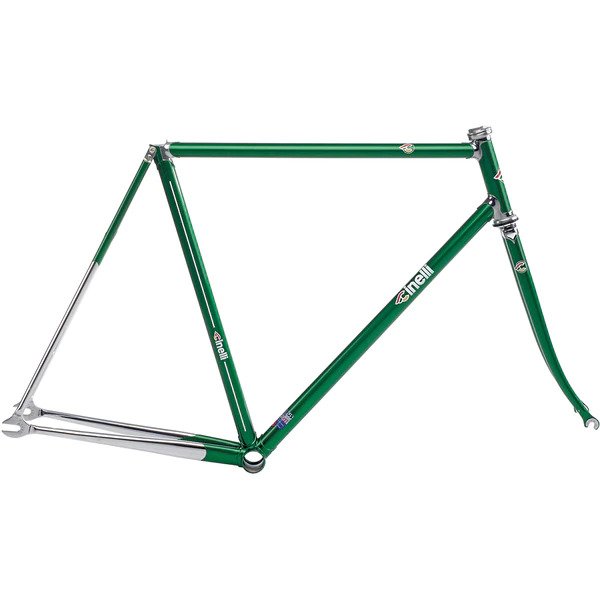
Cinelli USA: Tradition Reinvented
If you’ve been around cycling for 30 plus years like me, then you know the Cinelli brand as one of the stalwarts of the industry. Back in the 1980s when I cut my teeth as a junior racer, Cinelli handlebars and stems, with their proprietary 26.4mm clamp diameter, were standard equipment for racing cyclists. Cinelli Supercorsa framesets, in striking cobalt blue and Ferrari red paint schemes accented with chrome lugs, were coveted for their high aesthetics and performance, and to this day they command premium resale prices.
Traditionalists will rejoice at the news that you can still purchase the venerable Cinelli 1A stem at the Cinelli USA website, along with the Model 64 shallow drop handlebars and the old Model 65 “criterium” bars, mine and Roger De Vlaeminck’s personal favorites. But beyond these legacy components, the Cinelli line has expanded greatly in scope and depth, all of it for the better.
First, a quick history of the brand. Cino Cinelli was an Italian road racer active during the WWII era. He won the Giro di Lombardia in 1938 and Milan-San Remo in 1943. After suffering numerous mechanical breakdowns in races, Cino started producing bars and stems with his brother Giotto in Florence in 1948. Eventually the brothers moved the company to the heart of Italian industry, art and fashion, Milan. In 1978, Antonio Colombo of the Columbus tubing company, became president of Cinelli, and the company was eventually folded into the parent company, Gruppo S.r.l., in 1997. Like many Italian companies, it’s still run like a family business.

Also like many Italian companies, production of some entry-level products has moved to Asia, but characteristic Cinelli artistic flair and performance-minded design still infuse the product line. Case in point is the Vigorelli steel track frameset, a lower-priced cousin of the well-heeled and Italian-built Supercorsa Pista frameset, named after Milan’s iconic Vigorelli velodrome and constructed from Columbus Thron tubing. A working-man’s track frameset, the Vigorelli performs well on banked turns as well as Red Hook-style fixed-gear criteriums, thanks to design input from Team Cinelli Chrome, 2015 Red Hook series champions.

Cinelli also offers complete bikes for road, track and the increasingly popular adventure bike category. The Zydeco “full-color” is a disc-brake equipped gravel/adventure bike with an aluminum frame made of Columbus Zonal and striking, multi-color graphics and paint. The Zydeco comes with a mix of SRAM Apex, FSA and Tektro parts with, of course, a Cinelli cockpit.

The aforementioned classic handlebars and 1A stem are accompanied by newer offerings made of both aluminum and carbon fiber with modern 31.8mm clamp diameters. For the ultimate in strength, stiffness and control, the Cinelli Ram 3 carbon fiber integrated bar/stem combo comes with ergonomic design that includes the “Thumb Zone” – a surface recess for resting thumbs. The cable routing is integrated into a cycle computer holder bridge, The Manta Deck, that significantly improves braking and shifting. Progressive Parabolic Action (PPA) shaping allows a perfect hand grip anywhere on the bars.
Any discussion of Cinelli wouldn’t be complete without mentioning the classic finishing touches the company is famous for, including the well-regarded cork ribbon handlebar tape which, upon its release in the 1980s, has launched a thousand imitators. Classic cork handlebar tape is still available in its stalwart hues (including natural cork), but has been joined in the lineup by Volee ribbon, which is synthetic and similar to tennis racquet grip tape, and colored in edgy patterns and hues.
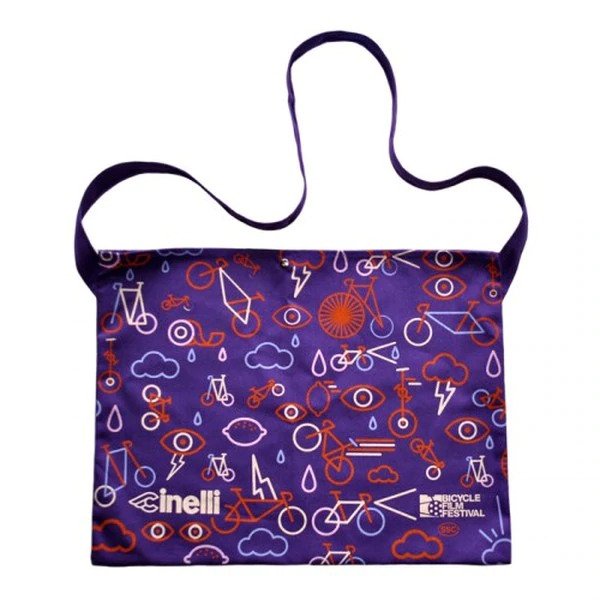
Contributing to Cinelli’s place as a stylistic leader of cycling fashion are any number of lifestyle accessories, including bags, helmets, clothing, scarves and even shop aprons and magnets that keep the famous Cinelli “winged C” logo at the forefront of the collective cycling ethos.
By taking well-established traditions and reinventing its brand in different ways, Cinelli has secured its place in the pantheon of renowned cycling brands for generations to come.

Rodeo Labs: Focus on Adventure
Rodeo Adventure Labs wants you to have fun on your bike, with each ride offering new adventures and new discoveries. Rodeo’s “laboratory” is not the domain of scientists in white coats, but the great outdoors – open, wild and raw in its beauty.
Rodeo offers bikes, wheelsets and accessories for the adventure cycling lifestyle. Rodeo builds bikes that are to be ridden, not to be painstakingly color-matched with contrasting bar tape, bottle cages and saddle and then hung on the wall to look at. Rodeo’s bikes are at their best spattered in mud or caked with dust after a horizon-broadening ride.

There are two basic platforms for bikes that can be customized with component build packages that suit a rider’s individual needs and tastes. The Flaanimal 4.1 is Rodeo’s steel bike frameset, built from Reynolds 725 tubing for either geared drivetrain or Gates belt drive single speed (with a seatstay that can be separated for installation). The buyer can build the frameset up herself, or choose from a variety of build packages that include Shimano’s GRX gravel-specific groupset (in 1x or 2x configurations), SRAM Rival or Force (in mechanical and eTap) and the aforementioned Gates belt drive single-speed. The Flaanimal can be used with either 650b or 700c wheels, and as with all of Rodeo’s offerings, the parts package can be individually customized to meet a customer’s physique and intended uses. Notably, this ability to build a unique ride comes at a very affordable entry price point: just $1,100 for frame and fork.

Carbon fiber provides the composite backbone for Rodeo’s other platform, the Traildonkey, which comes in two versions, the new-for-2019 3.0, and the older 2.1, which is on sale currently. Built to tackle the rigors of adventure riding and racing, the Traildonkey is a reliable and trusted companion and workhorse, but clearly not a recalcitrant jackass. As with all of Rodeo’s offerings, the Traildonkey can be custom-built to individual specs, and it can also be painted to taste for an upcharge. For those who prefer the raw, workhorse (donkey-like?) look, the Traildonkey comes in a “naked” version of the 3k carbon weave with a gloss clear coat and no decals or graphics.

Once you’ve dispatched your personalized steed, Rodeo will keep you rolling with their carbon wheelsets, available to “family” members (those who purchased a frameset) for a $300 discount. Rodeo’s carbon wheels are built for adventure (read “rugged”) use, with disc brake compatibility and a wide, stable internal rim width of 21.5mm, meant to pair with wide-section tires. The wheels come in both 700c and 650b versions, and have been “lab-tested” in the harshest conditions, including the Dirty Kanza and Crusher in the Tushar gravel races, and the cobbles of Paris-Roubaix and the Tour of Flanders.

So this off-season, invest in a personalized ride from Rodeo Adventure Labs, ditch the white coat, hit the trails and fire roads and come back with great stories backed up by the grime on your rig. The “scientists” at Rodeo Labs will be able to measure the smile on your face.

Soma Fabrications: Bikes for all days
Soma Fabrications builds bikes for the “everyday cyclist,” but this term comes with a qualification. Soma doesn’t mean “everyday” in the sense of being ordinary or run-of-the-mill. A more literal interpretation of the term is required: Soma builds bikes for cyclists who ride every day.
In these days of “horses for courses,” riding every day can require a fleet of bikes in your personal quiver, and Soma has you covered there, with frames and forks for cyclo-cross (and by extension, gravel riding/racing), loaded touring, mountain, road, track, and, uniquely, mixte-style frames.

Mixte frames were sometimes mistakenly referred to in the past as “ladies-style” frames, but that’s really a misappropriation of the mixte name. “Mixte” means, unsurprisingly, “mixed” or “unisex” in French. A mixte frame is a type of step-through bike frame, which is easier to ride if you’re wearing a dress, skirt or kilt, but it’s also convenient if you’re making frequent deliveries and getting on and off your bike a lot. In a mixte frame, two parallel smaller diameter tubes emerge from the head tube and align diagonally to an intersection with the rear dropouts along with the chain and seat stays. This makes for a firm ride and strong design that many riders of all genders prefer.
Soma began in San Francisco, which remains their home, and durability, comfort and smart design are their hallmarks. Frames and forks are all handbuilt from high-quality Tange Prestige steel tubing in Taiwan, which has become rightfully renowned for quality fabrication. Although Soma is a production company that doesn’t offer custom options, production numbers are fairly low (about 200-300 frames per model per year) and they stand by their products with a 3-year limited warranty for frames. Soma also strives to keep prices for its high-quality products reasonable and affordable.

While Soma’s cyclo-cross/gravel and mountain frames have gone full disc-brake, rim brake options remain for road frames, mixte frames and loaded touring models.
One of the standout models in Soma’s line-up is the Gran Randonneur frameset, designed with the help of Mike Kone of Rene Herse/Boulder Bicycles. It has all the hallmarks of a classic rando bike, designed for 650b wheels, with cantilever brake studs, mounts for three water bottles, rear rack and fender eyelets, and standard diameter Tange Prestige steel tubes.

The Gran Randonneur also features low trail geometry, which means it handles better with a front load – like the handlebar bags and headlights required by true randonneur events like Paris-Brest-Paris – than many other dedicated touring bikes.
Whichever frame style suits your fancy, Soma has a wide selection of parts available to build up your bike. And while you can order direct from Soma (at full retail price and no discount on shipping charges), they recommend that you order through their dealer network, or from your favorite local bike shop, who can do a special order with Soma.
Whether you’re toeing the line at Paris-Brest-Paris or hauling a load of laundry five blocks down the street, Soma Fabrications has a quality frame that will provide a strong base for many years of daily rides in your cycling discipline of choice.

Rivendell Bicycle Works: Bucking trends since 1994
There’s a famous adage in the bicycle industry, confirmed by a good dose of reality: if you want to make a million dollars, start out with 2 million.
Conventional wisdom holds that to maintain profits, you must meet the specific demands of the marketplace, be flexible with these shifting demands and, if possible, do it for lower cost than your competitors. Or, put another way, you must chase trends.
Rivendell Bicycle Works proprietor Grant Petersen began his enterprise in 1994 with $89,000 in capital: a mix of retirement money, savings and funds raised from stock sales to friends.
Today, Rivendell’s annual sales are 2.8 million, and their ten person staff works from a 6,000 square foot facility in Walnut Creek, California, close to some of the best cycling in the country.
While it’s safe to say that Petersen’s annual compensation is far south of one million dollars, and the threat of losses looms close (“cash flow is our own personal wolf-at-the-door,” he writes), Rivendell has been profitable 10 of its 25 years of existence.
The paradigm of industry insolvency is just one of many trends that Petersen and Rivendell choose not to follow. Their bicycles and gear are iconoclastic examples of timeless products, meant to be cherished and ridden into the ground, and then passed on to the next generation to do the same.
Racing bikes and gear are by nature trendy, and Rivendell rejects the “racing-centric” orientation of the bicycle industry. You’re not likely to see a Rivendell bicycle on the start line of a race, but you might see one leaning against a wooden fence, or at the door of an old-time general store, icons of the timeless and pleasurable experience that a day of leisurely cycling in the countryside provides.

Classic and traditional (read timeless) lines define the look of Rivendell’s bikes. Case in point is the A. Homer Hilsen, what Rivendell calls a “country bike”, meaning it can handle a variety of road surfaces that one might encounter during a pastoral jaunt. The A. Homer Hilsen is available as a frameset, or as a complete bike with an “a la carte” build. Besides its stately good looks, what’s particularly smart about the Hilsen is the use of 650b wheels on frame sizes 58cm and smaller, and larger, 700c wheels on the rangy 61.5 and 64cm sizes. Rivendell has not made the switch to disc brakes, so you can’t switch out wheel sizes, but as with all Rivendell’s products, design has been thought out very well, and the wheel size choice makes perfect sense out on the road or trail.

As you might expect, Rivendell rejects the categorization of bicycles these days (in particular the gravel bike trend), preferring to see their bikes as each having individual personalities (this is reflected in the proper names many of their models have). For marketing purposes, however, they have created three categories for their bikes, all of which are made of steel: The Road bikes (Roadini and Roadeo), the Country bikes (A. Homer Hilsen, Sam Hillborne, Cheviot) and the Hill bikes, which are something like mountain bikes and/or loaded touring bikes (Gus Boots-Willsen, Susie W. Longbolts, Clem Smith Jr.) All of Rivendell’s bikes start as bare framesets, which the buyer can then outfit with a custom parts selection from the many compatible components Rivendell stocks.

Supporting the pleasure cycling lifestyle are a whole range of products Rivendell offers at its website, everything from bandannas to bells. Rivendell even sells the venerable kickstand, de rigeur for bikes during my 1970s youth, but often eschewed these days by “serious” cyclists.

Being serious about aerodynamics or light weight is not part of Rivendell’s approach to cycling. Petersen is famous for his well-written catalogues from the 1980s and early 90s when he was at the helm of Bridgestone USA, and his light-hearted approach and self-deprecation infuses the Rivendell website and blog, which is well worth the visit.
If you’re looking to rediscover your love for cycling, visit Rivendell’s website or, better yet, swing your leg over one of their bicycles and truly enjoy your ride.

Mars Cycles’ Smokin’ Sale
SALE ON FULL CUSTOM BIKES!! That’s a headline that you’d be forgiven for thinking is ironic, and somewhat akin to “Hell Freezes Over,” but it’s true. Mars Cycles owner Casey Sussman is currently running a sale.
You might consider a seasonally-appropriate steed like the fat bike Sussman brought to the Philly Bike Expo, perfect for exploring the New England countryside that is sure to become snowbound fairly soon. It features wide-range 1x gearing and a space-black paint scheme brightened by the random application of the “m” from Mars Cycles’ logo over all the tubes.

The bike also features a custom-machined top-cap with an ingenious solution for storing your contraband away from prying eyes or fingers. You know what they say: Smoke ‘em if you’ve got ‘em.

As his website states it, Casey Sussman is Mars Cycles, which is based in beautiful Moss Beach, California, south of San Francisco along Highway 1. Although his bikes are a bit iconoclastic, with funky paint jobs and often featuring 420-friendly themes (Mars Cycles showed a bike at the 2016 NAHBS with a fully-stainless steel integrated smoking device), Sussman got his chops as a builder in the traditional homeland of handbuilt bicycles, England. He studied the art of fillet-brazing at The Bicycle Academy in Frome, England, and remains the only American to have attended the school.

Mars builds bikes for road, mountain, cyclocross/gravel and track. Sussman made his debut at NAHBS in 2014 with a track bike, and the next year he won the People’s Choice award with a striking cyclocross bike.
You can get more details on Mars Cycles’ sale by contacting Sussman directly through his website.
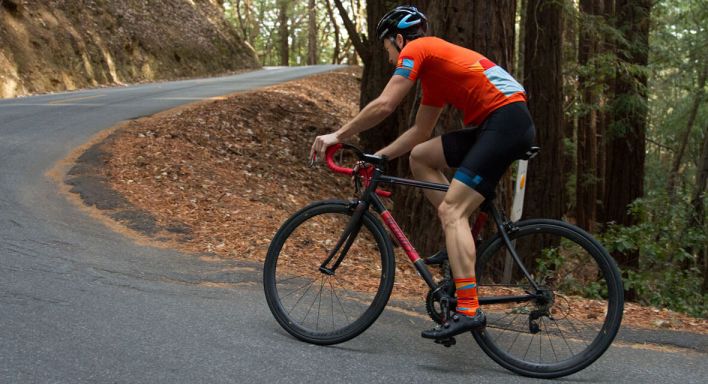
Ritchey Design: Pure Logic
Ritchey Design has been at the forefront of innovation and intelligent design for over 45 years. Company namesake Tom Ritchey started building frames as a teenager in the basement of his parents’ home in Menlo Park, California, and began quickly outproducing his mentors and peers such as Albert Eisentraut and Peter Johnson.
Ritchey, who was at this year’s Philly Bike Expo taking part in a seminar about American frame builders during the 1970s, was something of a prodigy, and having built an international brand over the past 40 years, he shows no signs of slowing down. In fact, with his work ethic and penchant for adopting the best new ideas, he can rightly be compared with another American wizard who worked out of his own lab in a different Menlo Park in New Jersey, Thomas Edison
Ritchey’s website heralds the “Ritchey Difference,” and describes it as “ a passion for cycling and creating products that enhance the cycling experience.” This is an important distinction: Ritchey is a cyclist’s bike designer, and his ideas are borne from time in the saddle and close consultation with other avid cyclists. One of those key influencers was the late distance cyclist, mechanical engineer and Bay Area legend, Jobst Brandt. Brandt counseled Ritchey to adopt the 650b wheel for his early mountain bikes, and while industry standard early on became the 26 inch wheel, twenty years later larger-size mountain bike wheels came into vogue again, and for the same reasons that Ritchey and his peers recognized before anyone else.
It’s safe to say that Ritchey adopts new ideas, but with a strong basis in R&D and sound engineering principles in place. They’ve adopted a uniquely appropriate branding moniker, Ritchey Logic, to describe their thoughtful approach to innovation. The company does not chase trends, but rather sets them.
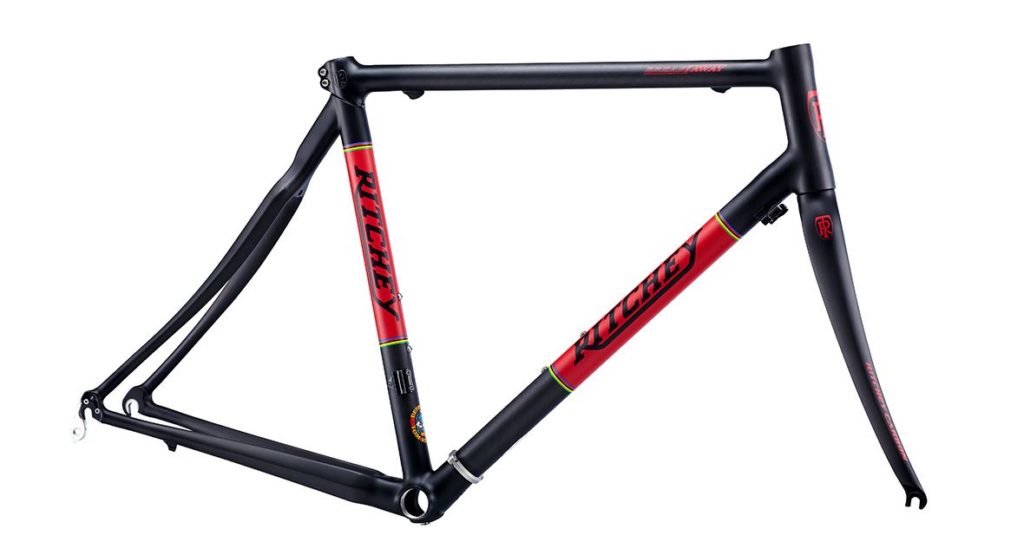
One of those “logical” ideas thirty or so years ago was the Ritchey Break-Away frameset, built to be taken apart and stowed in a smaller case meant to circumvent oversize baggage fees on airlines. For the cyclist who travels a lot, it’s a wise investment, as baggage fees quickly add up, and ease of reassembly is also key. Ritchey Design offers Break-Away frames in both carbon and steel iterations.
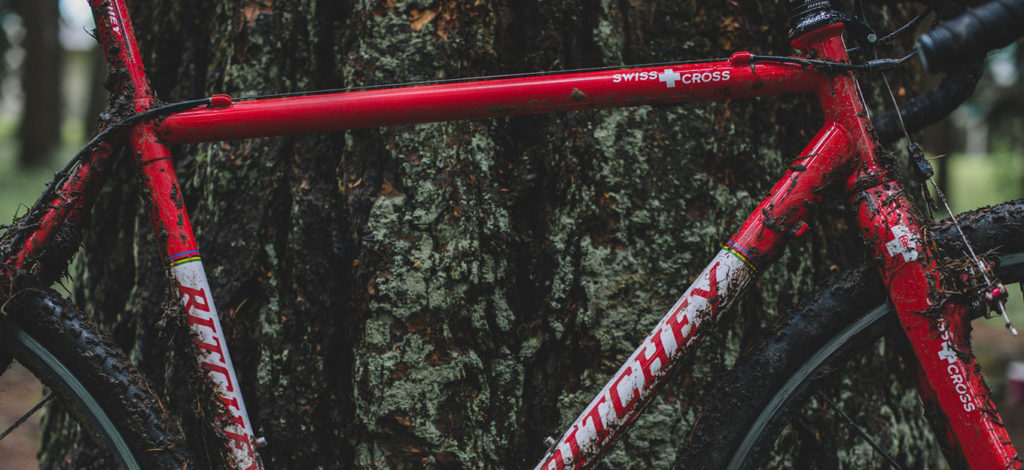
Another early idea that has become an industry standard of sorts is the Ritchey Swiss Cross frameset. It was first built in the late 1980s for a young Thomas Frischknecht, the Swiss junior cyclocross World Champion and mountain bike phenomenon who followed Tom Ritchey to the United States and became Mountain Bike World Champion and an international star. The Swiss Cross has been updated with the latest geometry and lighter and stronger Ritchey Logic steel tubing, but it’s the same bike at its core. It comes in canti and disc brake versions, and most importantly, still in the iconic Swiss red paint scheme.
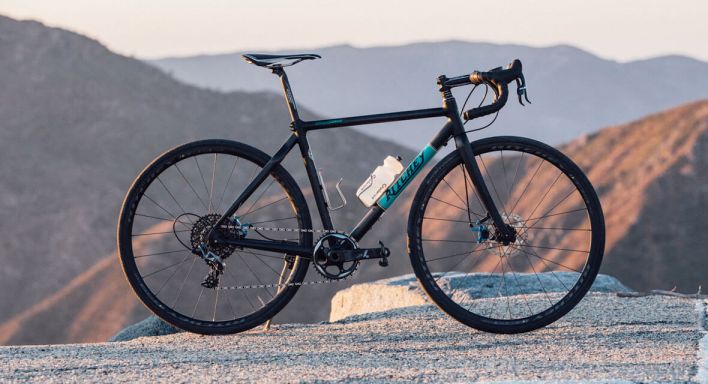
Both Jobst Brandt and Tom Ritchey were doing epic gravel rides on northern California’s scenic fire roads long before gravel riding was a “thing” and these early experiences led to the development of the Ritchey Outback gravel steel frameset, built for disc brakes, 700c wheels, up to 40c wide tires and ready to tackle any surface. For all its innovation, the Outback retains some common-sense design standards Ritchey is famous for, such as the 27.2 diameter seatpost spec and straight steerer to retain comfort and compliance and not overbuild for stiffness that’s not really needed for this application.

Innovation tempered with design prudence influenced by science, common sense and many miles in the saddle is the formula that Ritchey Design has used to set trends that the rest of the industry will eventually adopt. See the Ritchey Difference for yourself at their website, www.ritcheylogic.com.

Engin Cycles: Precisely Beautiful
Engin Cycles builds custom bicycles in mountain, road, all road and city/road iterations exclusively from titanium. Designer and builder Drew Guldalian has an extensive machine shop that serves as Engin’s framebuilding HQ attached to the rear of his bicycle shop, Wissahickon Cyclery, in Philadelphia’s stately Chestnut Hill neighborhood.
Engin’s website gives all four meanings of the standard Webster’s definition of “engine” at its homepage. Sitting at number four is perhaps the most applicable to Philadelphia: a railway locomotive. The city once served as the headquarters of the Pennsylvania Railroad, the largest in the U.S., and with a local supply of high quality steel and a workforce of machinists, the Baldwin Locomotive Works built fleets of steam locomotives at its massive facility in Eddystone, just south of Philadelphia.
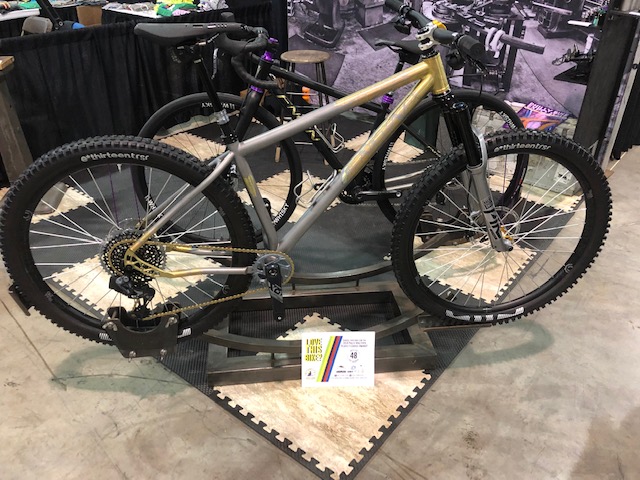
Heavy industry in Philly has ridden the waves of boom, bust and obsolescence, but Engin carries on the city’s proud tradition of quality machining. They may not be heavy steel rivets to hold a locomotive boiler together, but Guldalian makes his own titanium fittings – things like rear dropouts – with specialty machines. His focus on precision, along with the pristine environment that titanium welding demands, makes his workshop seem like something between a factory and an operating room.

Whatever the precise demands of the titanium production process are, the result for the Engin owner is a work of beauty. At its best, the bicycle is a beautiful tool, meant to rule the road or trail with both style and efficiency.
Engin buys into this duality of the bicycle completely, as Guldalian writes at their website: “Our mission is to build titanium bicycles that appeal to people both as a work of craft and as a machine that can be ridden and ridden often.”

Titanium bicycles, perhaps more than other bicycles made from different materials, embody this ideal design ethic of performance and beauty. One of the best things about owning titanium bicycles, apart from the superior ride unlike just about every other material, is the lack of worry about marring or chipping paint and therefore inviting surface rust. While Engin can paint, or partially paint your titanium frame, each of their bikes is treated with a special media that creates a satin finish easily touched up with steel wool and furniture polish.
Easy care, winning performance and elegant beauty are the hallmarks of every Engin bicycle. Learn more about this home-grown Philly institution at www.engincycles.com.

Sunday seminar wrap-up
The Philly Bike Expo celebrated its 10th anniversary with its largest number of exhibitors, more show attendees than ever before, and arguably its best-ever schedule of seminars.
There were so many seminars that we couldn’t get to them all. Many of the ones that we have not addressed here were captured on video, and we’ll post up full videos and/or highlights shortly.
Two significant themes of the Philly Bike Expo this year were diversity and inclusivity. These are topics that are long overdue for the bicycle industry to address in a meaningful way, and by the end of the show, problems had not been solved, but at least a productive dialogue was begun.
This year’s PBE, perhaps more than any previous edition, was Janus-faced. Like the Roman deity Janus, who had two faces fore and aft, the show looked back on the rich history of cycling, and looked forward to a better, more inclusive future.
PBE looked back on the past with seminars featuring a focus on the 1970s, a salient decade for the bike business in America. A seminar on Saturday addressed the establishment of some big framebuilder names in the industry, Chris Chance, Tom Ritchey, Mark Nobilette and Richard Schwinn, and another covered the U.S. based Raleigh team’s participation in the 1973 Tour of Ireland, one of the first big European stage races contested by American riders.

The seventies were addressed again on Sunday with a seminar led by Mike Kone of Boulder Bicycle that covered the re-emergence of the 1970s road bike as an ideal steed for today’s gravel and randonneur rides. Long before gravel races became a thing, bikes of the 1970s were gravel bikes by default, made to handle different road surfaces with wider tires, adjustable rear dropouts and powerful centerpull brakes. The reemergence of these elements on custom gravel bikes today is a testament to their suitability for gravel riding. It also means that deals on long-forgotten garage dwellers can be had, for those not yet able to invest in a custom bike. Kone showed some examples of these neo-retro hybrids.
While these seminars looked on cycling’s past, another set of seminars looked toward a better future. The elephant in the room, diversity, was addressed through the establishment of the SRAM/PBE Inclusivity Scholarship, an initiative meant to promote the contributions of women, trans and POC frame builders, groups traditionally under-represented in the bicycle industry. Conceived by journalist and industry stalwart Anna Schwinn and PBE Director Bina Bilenky, the scholarship came about through the generous support of SRAM. This year’s scholarship recipients were Julie Ann Pedalino of Pedalino Bicycles, Jackie Mautner of Untitled Cycles, Megan Dean of Moth Attack, and Danielle Schon of Schon Studio.
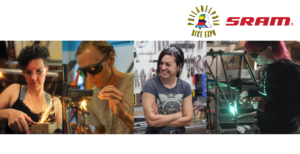
“While the bicycle brings great freedom, the bike industry itself is not always the most welcoming place,” said SRAM Road Brand Manager Kate Powlison. “At SRAM, we aim to support the people, groups, and events working to change that. The energy that small builders bring is super inspiring. We want to recognize them and help shine a spotlight on these four amazing builders who come from underrepresented groups in the industry.”
While companies like SRAM are putting their resources behind diversity and inclusivity in the bicycle industry, others have a checkered past trying to portray and promote a diverse marketplace.

Ayesha McGowan is on the fast track to become the first African-American female road professional cyclist. In her seminar titled “Representation Matters,” McGowan related her own struggles with proper representation of minority communities in the bicycle industry. As companies use media to portray the idea that people who ride bicycles come from all backgrounds, McGowan stressed the need to avoid “tokenization” of underrepresented communities.
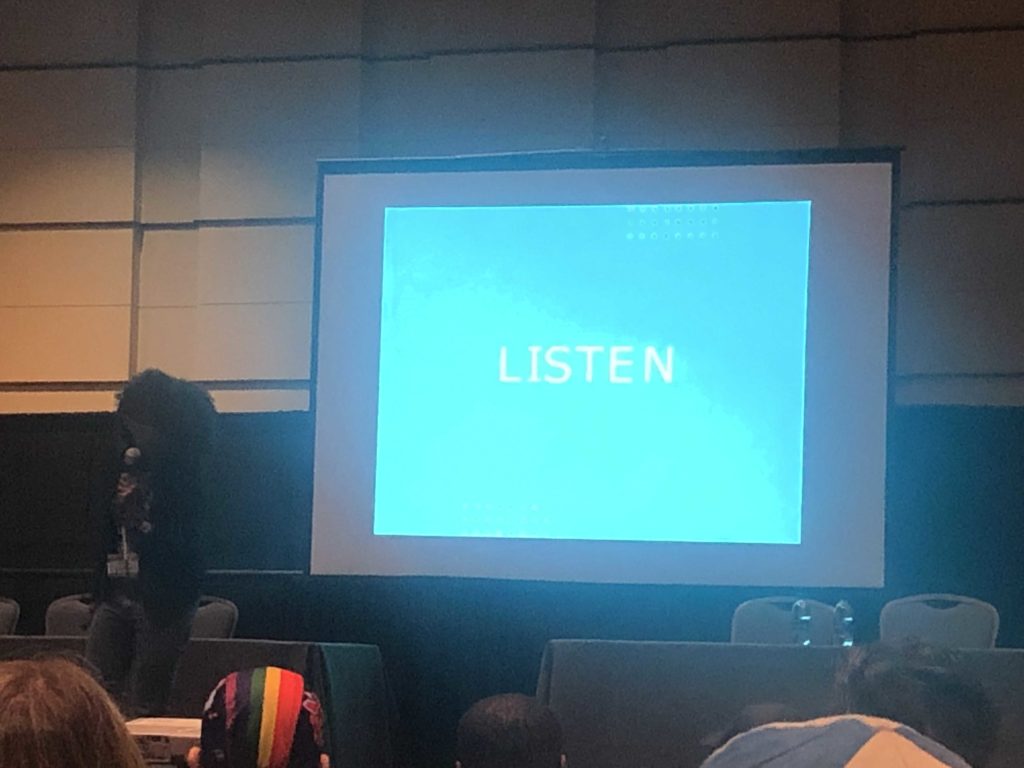
McGowan outlined an action plan for encouraging companies to promote inclusivity. The key to making lasting and meaningful changes, she said, is to educate and never to compel representation. McGowan said that perhaps the most useful tool was an open dialogue with industry leaders that involves listening and understanding different perspectives more than shouting or preaching. As Indira Gandhi once famously put it, “a closed fist shakes no hands.” You can read more about McGowan at her website, www.aquickbrownfox.com.
With several other seminars devoted to bicycle advocacy, this year’s PBE seminar schedule addressed the full canvas of the bicycle industry in the U.S.. While it celebrated cycling’s history, it didn’t gloss over the shortcomings of its past. With responsible companies like SRAM and intelligent, well-spoken agents for change like Ayesha McGowan, the future of cycling in the U.S. looks better, more diverse and more equitable indeed.

Lupine: Personal Lighting Systems
Lupine has been producing lights for over 25 years in the heart of Germany (their website heralds “Deutsche Qualitat“). Lupine produces lights for both daytime and night use for a variety of sports.
William Gentile of Lupine North America says that what sets Lupine apart from the pack is its commitment to producing personal lighting systems as opposed to bicycle lights. What’s the difference? Well, for nighttime use specifically, the need for lighting doesn’t stop when your bike does or your helmet comes off. Lupine produces lights that can move from your bike to your helmet to your hat in mere seconds.
Gentile also highlights three main virtues of Lupine lighting systems: innovation, compatibility and longevity. Let’s begin with innovation.
“Lupine prides itself on innovation,” says Gentile, and small details can make big differences, as shown by Lupine’s use of copper in their PC boards, which makes them extra conductive and efficient. Lupine has also embraced the new XML-3 LED technology, which produces brighter light with greater efficiency.

Another small technical detail with big performance dividends is Lupine’s use of a spherical lens, which for headlights produces a specific zone of illumination similar to a car’s headlight. Gentile said that these headlights were good for drop bar use, in particular.
Daytime running lights have long been standard on cars, and many people are outfitting their bicycles with lights front and rear for daytime use, for their safety advantages. Lupine has produced lights for daytime use that can run all day with very little power, and tail lights that have a built-in accelerator that slows down and eventually stays solidly lit when the rider comes to a stop. It’s the closest thing to a bicycle brake light out there.
With many cyclists adopting daytime light use and running GPS or Google Maps on their cell phones (or simply needing it to call your spouse to tell them you’ll be another 30 minutes late!), power needs have gone up significantly. While Lupine’s technical advances have reduced the power needs for their lights, they’ve made it possible to share the wealth of their battery systems through USB1 ports that can charge any USB device, and splitters that allow you to power lights and charge your cell phone simultaneously. No need to hang out at the coffee shop while your phone powers back up (unless you want to).

All of this innovation comes with compatibility and interchangeability. With small investments in compatible mounts, Lupine lights can move from your bike to your helmet, to your hat or headlamp mount in seconds. And while Gentile, who runs a podcast called “The Gretna Bill Show,” said that Lupine lights may cost a bit more than their competitors, their longevity and performance more than make up for it. A final consideration not to be overlooked is that Lupine North America services and repairs any lights that may have been damaged in a crash (for one example) right in their Pennsylvania facility.
See all the ways that Lupine sheds light on innovation and quality at www. lupinenorthamerica.com.
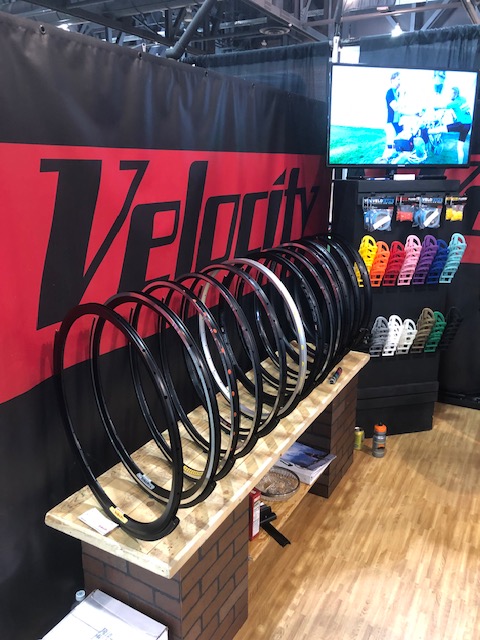
Velocity wheels: Aussie roots
Velocity USA has been building wheels for 30 years. Starting out in Brisbane, Australia in 1989, the company quickly built a reputation for products with exceptional strength, reliability and durability. These qualities were valued by a growing base of customers in the U.S., and after many generations of high end, fully customizable wheelsets, Velocity opened a production facility in Grand Rapids, Michigan in 2011, eventually shutting down production in Australia and moving all operations to Grand Rapids in 2016.
Velocity builds wheels for all cycling applications, including road, mountain, cyclocross/gravel, track, tandems, touring, fat/plus and recumbents.
Pervading the Velocity line up is an ethic of strength and reliability over glitzy but esoteric technology for technology’s sake. Case in point is the Blunt line of mountain wheelsets, with completely compatible technology with all three major component manufacturers and the ability to convert from quick release to thru-axle mounting.
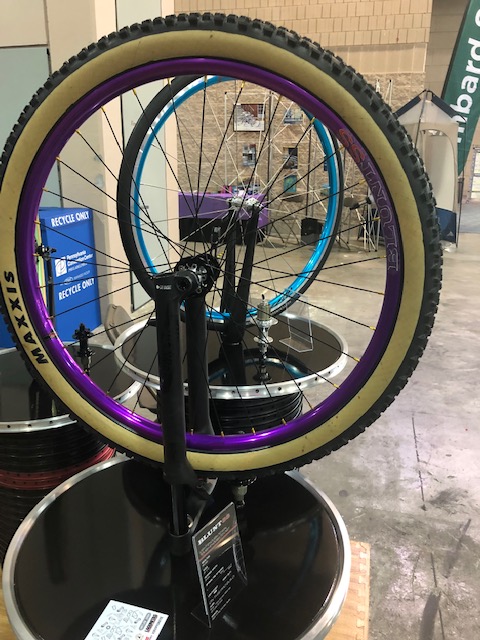
The Blunt SS features shorter and thicker sidewalls for incredible durability when paired with low pressure, tubeless tires, and an I-beam bead hook maximizes internal width for optimum tire performance.
The advanced spoke bed design allows for high tension (strong!) wheels, while keeping overall rim weight low.
An example of Velocity’s commitment to real-world applications is the
Clydesdale line of wheelsets for those of us of a certain weight. Two disc brake and one rim brake model of wheels are offered in spoke counts of 32, 36 and 40 for riders at various ranges between 200-300 lbs. No other wheel manufacturer focuses so specifically on providing reliable and strong wheels for this market segment.

All Velocity wheels are built and tensioned by hand, and they stand behind their products with excellent customer support.
Visit Velocity online at www.velocityusa.com.
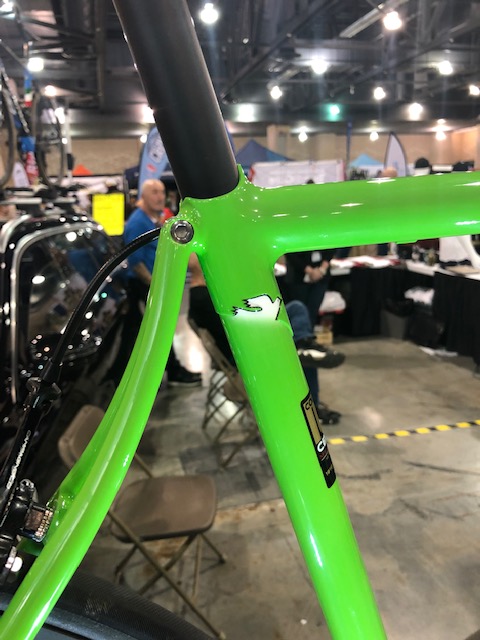
Columbus tubing and Savile Road introduce anniversary bicycle
Celebrating the 100 year anniversary of Columbus tubing, Savile Road put together a team of two legendary Italian brands and U.S framebuilder David Kirk of Kirk Frameworks to produce a tribute bicycle.
Steven Le Boyer of Savile Road explains, “We do custom bikes, and I’ve always had great respect for the Columbus brand. So I went to David Kirk to create a bicycle that celebrates both tradition and innovation, two qualities that Columbus embraces.”

Kirk designed a frame made from Columbus Cento steel tubing, their special edition that marks 100 years in bicycle tubing production. The frame sports innovations like a custom shaped headtube and Kirk’s signature curved seatstays, but pays homage to tradition with artistic flourishes like the Columbus dove cameos on the seat cluster.
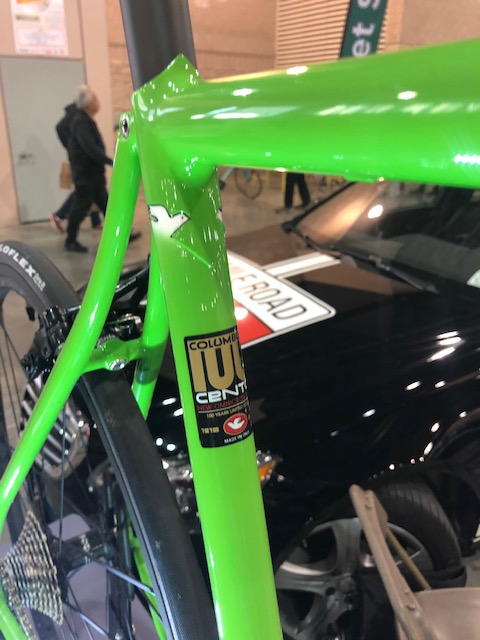
Navigating the fine balance between innovation and tradition that he sought for this project, Le Boyer chose paint in a striking signal green color used by Porsche, rather than the more cliched Ferrari red.
For a bike that celebrates Italian heritage, there could be only one choice for components, and Campagnolo provided a rim brake Super Record gruppo.
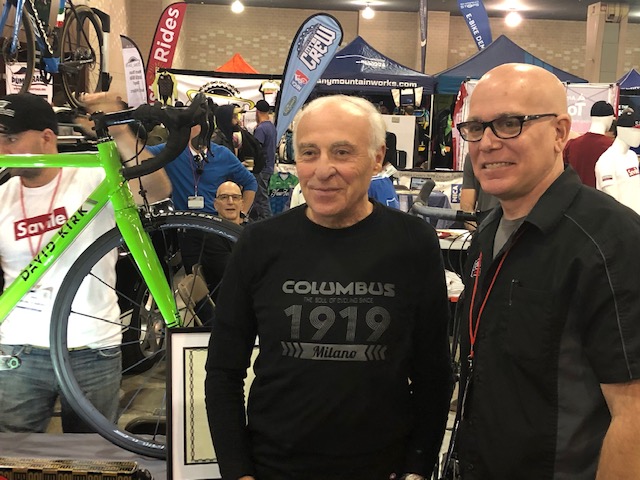
Angelo Caccia of Columbus joined Le Boyer for a special ceremony to mark the collaboration.
Le Boyer said that Kirk may produce other framesets from Columbus Cento tubing, but a very limited number, perhaps 5 at the most.

Speedsleev: Fast storage
Speedsleev sounds like something you might wear on your arms for a time trial race, but they actually make bags for under your saddle and the top tube that won’t slow you down.
You can’t fit everything you need for a training ride in your back pockets or capture it all in apps for your cell phone, but most of us also don’t need heavy, cumbersome handlebar or saddle bags. This is where Speedsleev’s products come into play.

The Speedsleev Ranger is their stalwart under-the-saddle bag and it meets all the company design ethics of efficient use of available space, light weight, secure attachment and yes, aerodynamics. There’s no real reason why a bag should slow you down or defile the smooth airflow that your bike and position have so carefully been arranged to maximize.
Top tube cases made of hard plastic inhabit the unused space behind the stem and atop the top tube, but they don’t stick out to create drag or catch your knees as you pedal.
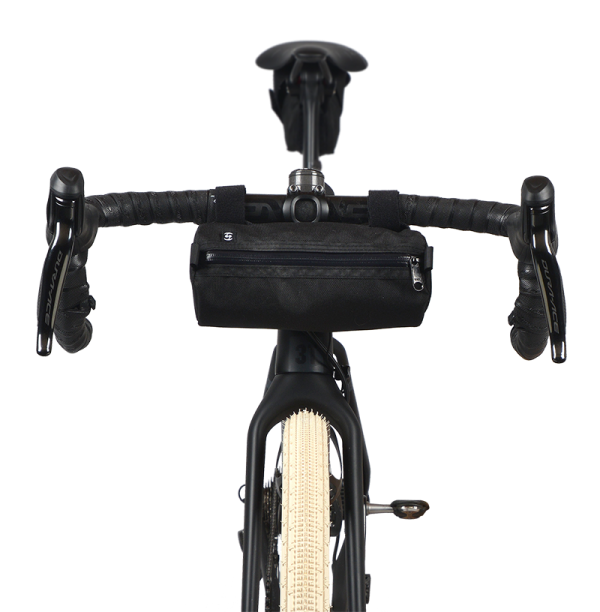
If you do need something with larger capacity, perhaps for a randonneur ride or a gravel race in rainy weather, then the Diego handlebar bag, in both small and large sizes, may be the ticket for you. It provides extra space while still minimizing aerodynamic disruption.
Check out the full line of Speedsleev storage solutions at www.speedsleev.com.

Saturday Seminar Report
Every year, the Philly Bike Show has presented an extensive series of seminars on a variety of topics germane to bicycles and the cycling lifestyle. For its tenth anniversary edition, this year’s PBE is serving up perhaps its most compelling offering of seminars.
There are so many of them that it’s impossible for our small media staff to cover each one. Many of the ones we haven’t summarized in this report were captured in video files, and we’ll post those full videos, or clips from them, in the coming days.

James Madison University Professor of Sociology Ben Brewer presented his preliminary findings from a survey and study of the U.S. independent framebuilder scene that he’s been working on for a number of years. While the study has revealed some hard truths (it’s still a hard way to make a living and the number of business failures exceeds the number of runaway successes), the bright spots include a large number of people still willing to enter the trade, and a few high revenue builders outperforming those with equivalent product quality. Brewer postulated that this might indicate that special training in marketing and other business aspects of the trade available to more independent builders may help lift the fortunes of talented builders still struggling with profitability. Brewer plans to publish his study of the industry and is working on a history of the U.S. custom framebuilding business.

Former elite-level U.S. cyclist Bill Humphries related a very entertaining story about the Raleigh-sponsored U.S. team that entered the 1973 Tour of Ireland, and which featured Humphries and U.S. legends John Howard and John Allis, among others. Raleigh produced a video of the race, complete with commentary by a young Phil Liggett (waxing poetic about the “fresh chippings on the road”) and a cheesy 1970s synthesized music soundtrack (Humphries used to prank call Howard in the wee hours and play the soundtrack). A recent reunion of the cyclists in the race saw Humphries, Howard and many others reenacting pivotal moments.
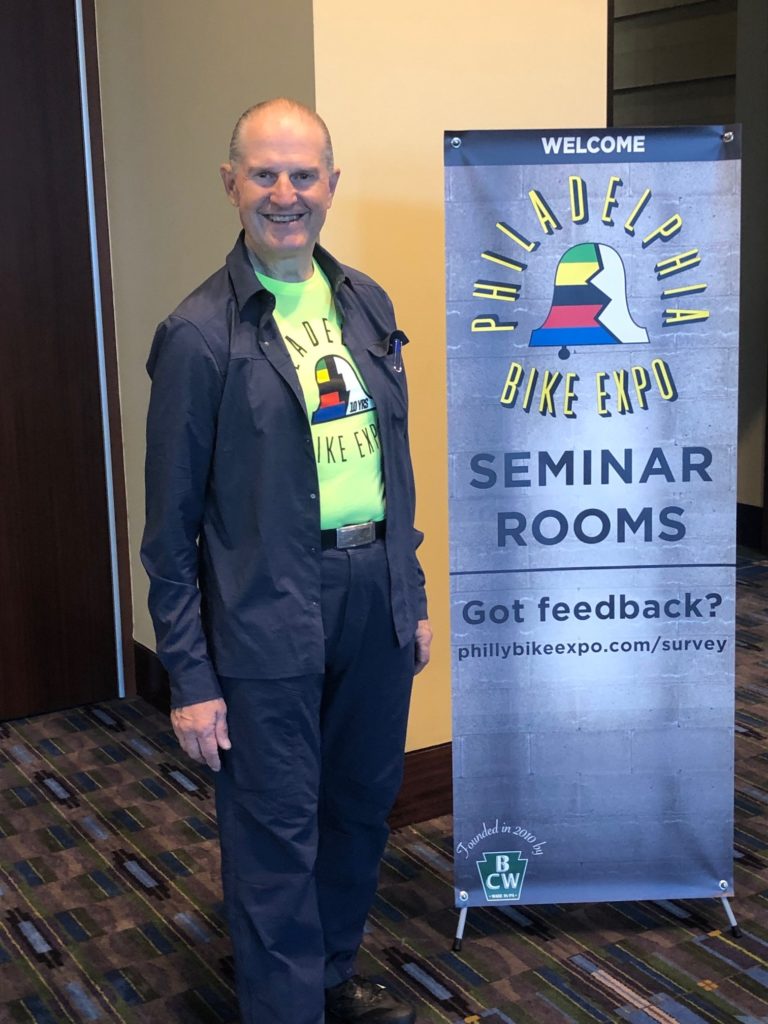
Author and translator JT Hine presented a seminar on working from the road, and specifically while travelling by bicycle, as a “digital nomad.” Hine has worked as an Italian translator while riding his bike through Europe and the U.S. He provided some practical tips on how to navigate bureaucratic red tape (like obtaining 6 month tourist visas instead of 3 month ones) and technology recommendations (such as finding a laptop computer that properly fits in panniers). Hine is releasing his first novel, Emily and Hilda, which features a racing phenom and her friend on their own bicycle journey. Read more at www.jthine.com.

One of the most widely attended seminars featured four legends of the bicycle business: Chris Chance, Tom Ritchey, Mark Nobilette and Richard Schwinn. They spoke about the explosion of the U.S. framebuilding scene during the bike boom of the early 1970s. Schwinn related some little known facts, like the popularity of U.S. six-day racing in the 1930s (Six-day stars were paid more than baseball legends like Ty Cobb and Lou Gehrig) and its subsequent collapse during and after World War II. During the 1970s bike boom, there wasn’t enough domestic production of bicycles to meet demand, and so European builders like Whitcomb from the U.K. and Masi of Italy established frame shops in the U.S. that trained many of the legends at the table who went on to create a thriving U.S. bicycle business marketplace.
We’ll present a similar synopsis of Sunday’s seminars. Stay tuned!

VAAST: Big Future
With all the hype about carbon bikes, it’s easy to forget that advances in metal technology have been occurring during the same time carbon has developed.
One of these metals is magnesium, which is super light, but earlier attempts to work with the metal, such as the Kirk Precision frames of the early 1990s, resulted in frames that were too malleable and prone to damage.

New alloy advances have solved that issue. VAAST, a sister company to aluminum tubing maker Allite, has produced Super Magnesium alloy bikes that weigh 33% less than aluminum and 50% less than titanium by volume, and are significantly stronger than both. All of this strength and light weight comes at no expense to shock absorption and comfort.
In fact, only carbon fiber itself can rival the weight of VAAST’s magnesium frames. Joey Burke of VAAST told us that the new brand, which just launched this September at Eurobike, produces its Super Magnesium tubing in Chinese factories, where the frames are also made. Final prep and full assembly of the bikes takes place in Taiwan.
With a frame weight of just 1200 grams, the A/1 all-road model comes in at a svelte 19 lbs. for the complete bike. These weight savings are not reserved exclusively for the road, however, as VAAST also offers mountain, urban and youth models.

VAAST takes its commitment to providing lightweight, high-performance bikes for everybody seriously, along with environmentally-friendly production practices.
Visit the VAAST booth at the Expo, or visit them online at www.vaastbikes.com.
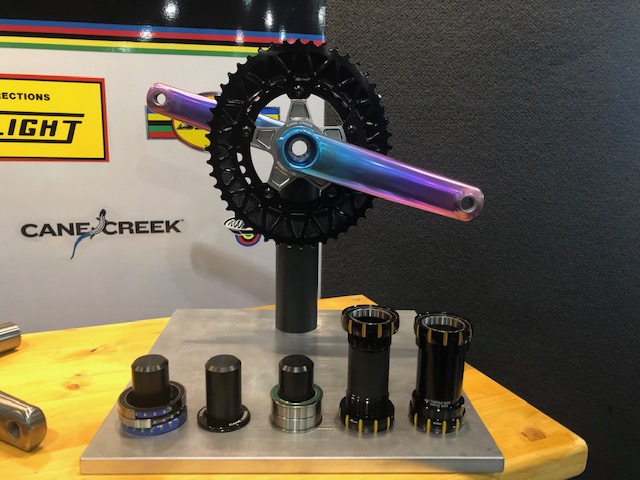
Cane Creek gets cranky
Peter Gilbert of Cane Creek showed us some of the latest goodies from the Asheville, NC-based component manufacturer perhaps best known for headsets and brakes.
The eeWings cranks have been on the market for a little over a year, but cranksets and bottom brackets are a relatively new pursuit for the company. The “ee” moniker stems from Cane Creek’s collaboration with famed component designer Craig Edwards, who is known for finding just the right balance between light weight, stiffness and strength.
Case in point are the eeWings cranks, which are made of welded and formed titanium. This produces cranks that are light, stiffer than carbon, and perhaps most critically, very strong. This makes them ideal for a variety of applications.

“The eeWings cranks are great for all cycling disciplines: road and mountain, but especially for gravel riding and cyclocross,” said Gilbert.
The eeWings cranks come in 170, 172.5 and 175mm lengths. Gilbert said this range may expand with new length offerings in the future. For those seeking a unique look, Cane Creek showed a pair of eeWings with a “Ti-Dye” finish.

Gilbert also showed another of Edwards’ designs, the eeBrake, made of 100% CNC-machined parts and boasting a weight of just 76g per caliper. Now the sole brake offering from the company, the eeBrake offers the same blend of strength, stiffness and light weight that characterize all of the “ee” line.
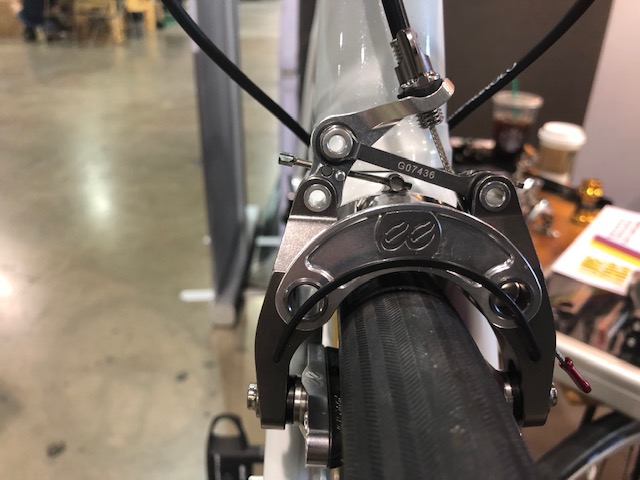
Bearings might not be the sexiest of bike components, but surely they are among the most critical ones, and smooth bearings can save many watts of energy output. Gilbert showed a metal matrix SKF bottom bracket bearing using a very specific bearing technology that greatly reduces friction but is also extremely resistant to parts washing. This makes them an ideal application for cyclocross, where in muddy conditions mechanics often power wash bikes several times over the course of a single race.

See all the light, strong and stiff products at Cane Creek’s booth or online at www.canecreek.com.

Astral Cycling: Star-crossed Spokes
If you’re a cyclist of – ahem – a certain age, like me, you remember learning to build your own wheels. You sourced your own rims, hubs, spokes and rim tape, and you’d set about the half-craft, half-science of creating your own rimmed masterpieces, spoke nipples perched in your mouth between beer sips and one hand threading spokes while the other one was holding open Jobst Brandt’s Bible of wheelbuilding, The Bicycle Wheel.
Astral Cycling, the new premium brand from Rolf Prima, is bringing back the custom built wheelset. Only their in-house artisans are the craftsmen, so you can get back to more important things, like finishing that beer without swallowing spoke nipples.
Astral builds wheels for adventure/gravel riding, road, mountain and tandem applications right in their home base of Eugene, Oregon. A little background on Astral’s parent company, Rolf Prima: after appropriating and purchasing the rights to the Rolf name and paired spoke technology from its original German developer, Rolf Prima began producing wheelsets, by hand, in Oregon.
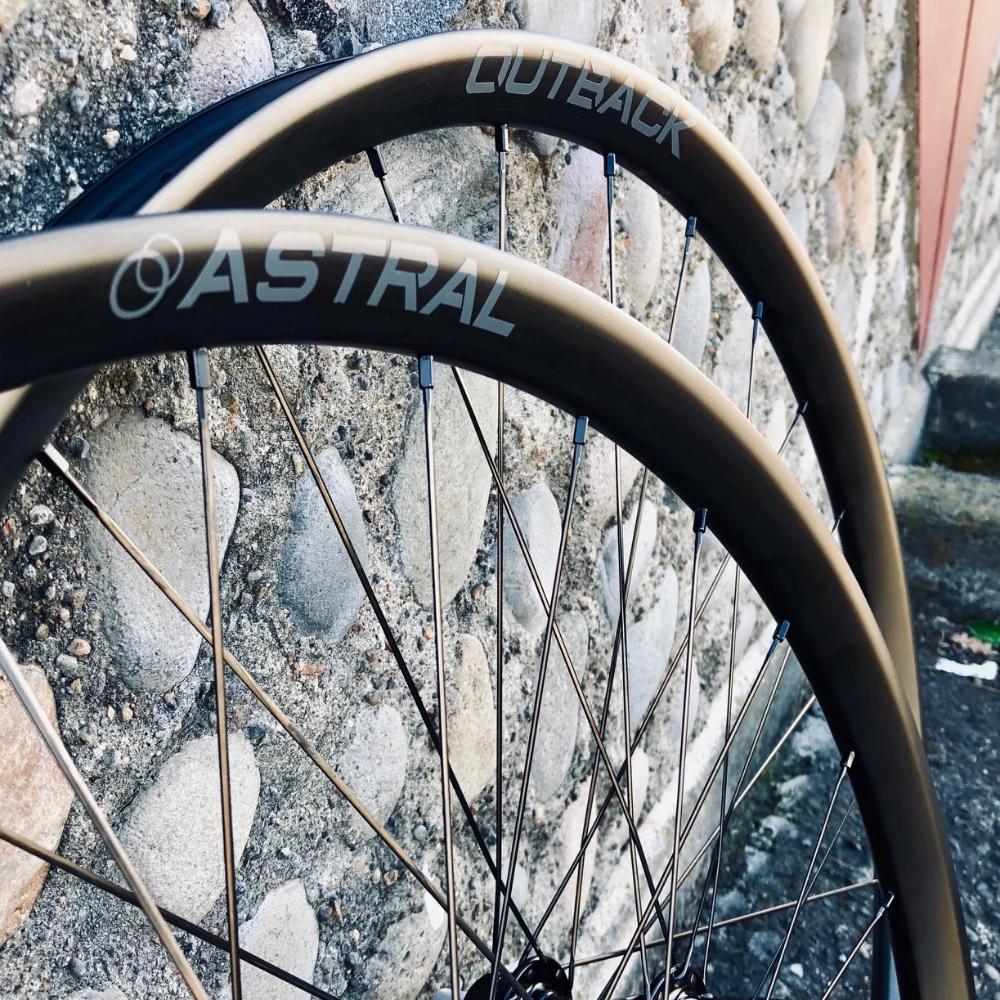
Astral takes the handbuilt wheelset a bit further with customizable options so you can create the blueprint for your own bespoke spoked masterpiece. An example is the mid price-range Outback wheelset, built for adventure/gravel riding (hence its name). The wheels are built with Astral’s 25mm internal rim, and matched with your choice of three hub options. Astral uses an asymmetric (ASYM) rim design than improves spoke tension balance by up to 30%. This translates to balanced handling and precision steering you can rely on in even the most demanding conditions.
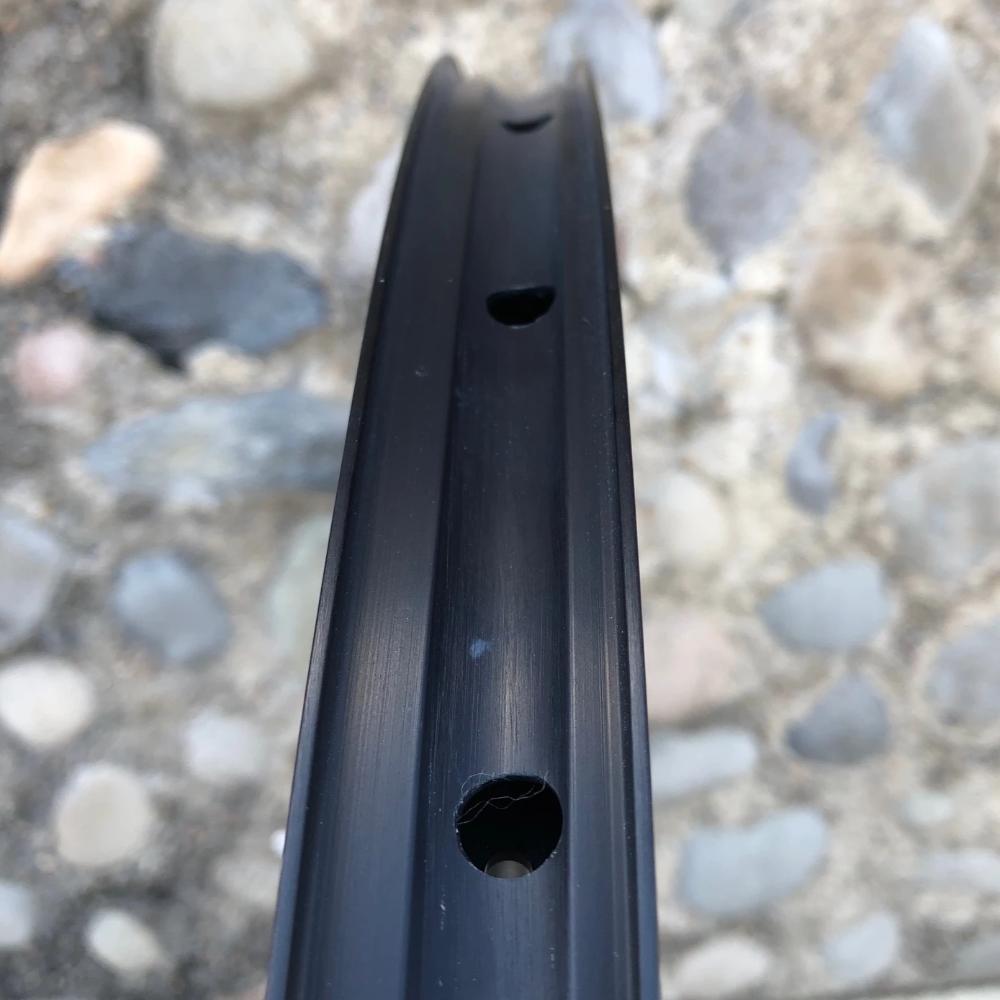
Built for the wider 32-35mm tires that now predominate, the Outback is designed for disc brakes and is available in both 700c/29” and 650b/27.5” options, with Tubeless Easy rims you can easily set up at home.

Check out Astral’s booth at this year’s PBE, or their website anytime at www.astralcycling.com.
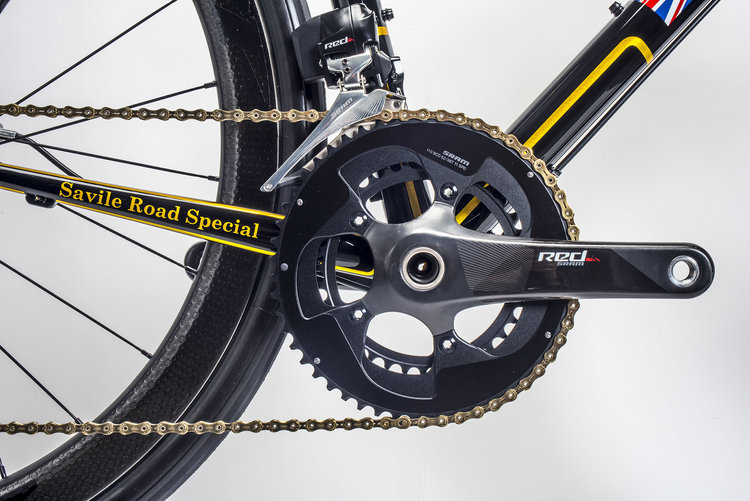
Savile Road: Tailored Bikes
Before “business casual” became “business everyday” it used to be a rite of passage for men entering the workforce or starting at a new job to visit a men’s clothier to be measured for a bespoke business suit made from the finest cloth.
That ritual may be fading, but a renewed interest in the custom, handbuilt bicycle industry means that a tailored bicycle – built and specced to suit the rider’s individual needs – has become de rigeur for cyclists.
And why not? A proper fit ranks among the most important qualities that cyclists seek in a bicycle. It only makes sense to invest in this attribute, just as you might spend to save weight on a pair of wheels. And it’s something that can’t be done online either.
Savile Road was started with the premise that a properly fitted bicycle is the start of a long and productive relationship between bike and rider. They believe that your bicycle should be built to your specifications: fit, riding style, and aesthetics. “The bicycle is about you. Just you,” states their website.
From their shop in Delmar, New York, just outside the state capital of Albany, Savile Road offers a professional fit service. Their master fitter, certified in biomechanics, will use a protocol refined from thousands of fittings over the years. First, an extensive interview of the rider yields an inventory of her needs, desires, medical history and cycling preferences. Next, a flexibility and range of motion assessment will highlight her strengths, fit challenges and determine what sets her apart from other riders. Finally, motion capture software while she rides a size cycle will, combined with the other data, yield a set of measurements for her ideal bicycle.

Measurements in hand, the rider can either apply them to their current bicycle or, more often, they can work with Savile Road to source a custom bicycle from builders like Mosaic, K. Bedford, Enigma Bicycle Works and Holland Cycles, or they can custom spec components on a production frame from builders like Colnago and Cervelo to produce a complete bicycle with the perfect, tailored fit.

Once ordered, produced and built up by Savile Road’s master mechanics – fluent in the three main languages of bicycle components: Campagnolo, Shimano and SRAM – Savile Road’s personal Concierge Service is available to serve you at home or office, setting up trainers for Zwift or Peloton stationary bikes, repairing your bike on site, or even accompanying you with a support vehicle and licensed massage therapist to rides, gran fondos or races.

You might say that Savile Road is the cycling equivalent of British author P.G. Wodehouse’s famous butler Jeeves, and that’s their purpose: to provide the perfect service that enables their clients to realize their cycling dreams.

44 Bikes x PBE Collab Build
Q&A with Mark Yanagisawa, PBE ambassador and rider of the sweet 44 Bikes Huntsman pictured above and Kristofer Henry of 44 Bikes.
MY: Tell us a little bit about 44 Bikes, where it all began and how you got into building bikes:
KH: I’m an industrial designer by trade and training. In a previous life I was a goldsmith and silversmith. My Mothers Father was a Union Welder and his specialty later in his career was TIG welding. Although I did not know him very well (he passed away when I was pretty young), somehow his skills and attention to detail were passed along through the wind. So my interest in metals as a material must have been infused at an early age while poking around his shop and admiring his tools. It was then a natural progression to combine the attention to detail that goldsmithing demands with the unique ways of problem solving and human factors that Industrial Design brings to the table, my love of mountain biking along with all the machining, TIG welding and associated fabrication skills that I had honed over the years into one path: 44 Bikes.
MY: How many years have you been coming to the PBE and what do you love most about the show?
KH: This will be my 4th show in Philly. One of my aunts was a chef in Philadelphia for many years when I was a kid, so my older sister and I would often come down for long weekends and stay with her. We’d take trips down to the art museum and visit her haunts. There’s something warm and inviting about the city mixed in with a certain grit. I have fond memories in Philadelphia and I love that the Expo is there to forge new memories.
MY: As it was announced this summer, 44 Bikes and PBE collaborated on a bike for me to ride at various gravel events in the Fall, you were energized at the idea, what are you most excited about?
KH: I was most excited to be able to put you on a bike that would carry you to and beyond your known horizon. That’s what makes building bikes for clients so amazing: knowing deep down that the bike you build will take that rider past the known horizon. Where ever that may lead, I may not physically be there, but a little piece of something I’ve built will be and that’s exciting.
MY: The Huntsman frameset seems perfect for gravel rides, what sets it apart from others?
KH: What sets it apart is the simple fact that it was born out of pure necessity. When we first moved to NH 15 years ago, one of the check boxes on our list was the house needed to be a bit off the beaten path, which meant there would inevitably be lots of dirt roads. We really lucked out in that regard when we found our home here in Lyndeborough and that first road ride out the back door made me realize I needed something quite different than the skinny tire road bike I was riding. The vast dirt road network served as a perfect launch pad for the design that eventually became the Huntsman.
MY: What other parts/companies did you choose to build the rest of the bike out?
KH: The build is a solid one with a Sram Rival 1 drivetrain, shifters and hydro brakes, Cane Creek 110 headset, Thomson stem, seat post and collar, ENVE bars and fork and an Enduro bottom bracket round out the build.
MY: For longer and rides on rough roads and gravel, I personally love riding the Kinekt Seatpost which isolates me from road vibrations and impacts, paired with the Selle Anatomica X2 which is a benchmark for leather saddle comfort. The pair was an easy choice for the build because the combination works well to provide maximum comfort during the gravel rides. What highlight features does the Huntsman have that help reduce road vibration and impacts?
KH: This particular Huntsman, being constructed from steel, enjoys that snappy resiliency for which steel is known to possess. But I also design and build the Huntsman to be light and stiff where you need it but resilient and vertically compliant where you want it. “Tell me what you want, and I’ll build you what you need” rings true with each and every Huntsman. This bike also carries the ability to run up to 45mm tires so when the going gets rough, the rider can really fine tune the comfort, traction and ride quality that larger volume tires provide. For future prospective clients, I can build bikes from both steel or titanium and both have their own unique merits and have distinct ride characteristics.
MY: What area do you most love riding in or where would you recommend a Philly native to explore and ride?
KH: Being a mountain biker at heart, the next town over from us (Greenfield, NH) is sort of a hidden gem. The local trail association (Greenfield Trails Assoc. aka GTA) has been building and maintaining a vast network of mountain bike trails which span public land but a good majority of it is through generous land owner permissions on private and easement protect land tracts. So I’m a bit spoiled as the first trailhead is only 3.5 miles from the shop doors all via dirt roads… Not to mention there is over 10,000 miles of maintained gravel roads. Anyone looking to ride gravel in New England and have not explored NH’s dirt road network is seriously missing out. I help organize a gravel road ride (The Rose Mountain Rumble) each August to help raise money for local conservation efforts, so that is a great way to get your feet wet. North Conway has been developing an amazing mountain bike trail network as well and if you like free ride oriented park’s there’s Highland Mountain Bike Park. Then there’s all the trails and dirt roads in Vermont and Massachussetts. There’s kind of too much to mention! Put New England on your next mountain bike or gravel vacation.
MY: With the PBE just a few days away, what are you looking forward to the most?
KH: It’s Philadelphia: The food! (I am my grandfather’s grandson and Poppy loved to eat…) Post show, I head out and explore the local “pastures”. Too much to choose from but there’s one indian food restaurant I always make sure I attend. I’m also looking forward to a nice big bowl of noodles in Chinatown. All that talking, hand shaking and tall tales at the show typically works up a mean appetite.
MY: Anything else you’d like to add?
KH: Thanks for this opportunity Bina and Mark and the rest of the crew at the Philly Bike Expo. It’s the best show hands down and that’s because the PBE team does an exceptional job of delivering. I’m excited for this year, next year and how the show progresses into the future.
Thanks to you and the other companies in supporting me and the PBE gravel bike collaboration bike for this season. I am looking forward to grinding some gravel this season at D2R2, UnPaved PA, and Keystone Gravel to name a few. See you in November!

Vespertine’s Reflective Wear Wants To Help You Stand Out, And Be Seen
For years, Sarah Canner could not find the courage to ride a bicycle in her home city of Paris. It all seemed too dangerous. It wasn’t until a Vélib’ station, the Parisian bike-share system, appeared outside her apartment that she decided to overcome her fears and explore the city on two wheels. She absolutely loved it.
Though, that’s not to say her fears weren’t completely unfounded. One dark November night, Canner decided to change her riding attire from a “loud printed jacket” to a simple black coat. Her lack of visibility, she believes, is what resulted in a close call with a bus. The experience imprinted a powerful lesson: as long as drivers can see you, they’ll treat you as just part of the traffic. Visibility is safety.
Canner wanted something visible to wear over her regular clothes — you can’t wear a loud, printed jacket every day — but the only option she could find was an awkward crossing-guard’s vest. Knowing how that feeling of safety is so important to getting more people on bicycles, and spotting an opportunity for safety wear that’s not only functional, but stylish, Canner founded Vespertine, producing high-quality, stylish, reflective apparel.
Nothing embodies Vespertine’s lineup of Haute Réflecture more than the VESPERT ECO vest. Made from 100% recyclable Eco-circle® material, the brightest 3M Scotchlite reflective tape and featuring a unique, flattering cut, the VESPERT ECO is designed to not only turn heads, but also make yourself visible to cars from at least 2000 feet away. The lightweight, breathable vest is designed to work with any outfit — from breezy summer looks to warm, layered ensembles — and packs up into a nice, stowable pouch.
In addition to the VESPERT, Vespertine has also released stylish and reflective blouses, dresses, blazers, coats and shell jackets. Canner has also partnered with a recycled knitwear icon on a micro-collection of sweaters and skirts, as well as folding bicycle leader Brompton Cycles with a line of Merino wool hats and headbands.
For Canner, her work with Vespertine is just not safety, it’s empowerment. If more folks feel good wearing high-visibility clothing, that means more folks feeling safe on the road, and ultimately more folks riding bikes or otherwise getting around without the help of a car.

Alizeti: Cycling made easier
The e-bike revolution has made cycling easier, particularly for commuting cyclists in urban settings. This is a great new movement that will get reluctant riders off the fence and onto saddles.
Now, Alizeti has made e-cycling itself easier by introducing an electric motor retrofit kit that converts any standard road bike into a powered steed. Montreal-based Alizeti offers their Power Drive System that provides all the benefits of an e-bike with an integrated functionality that delivers a seamless, integrated user experience.
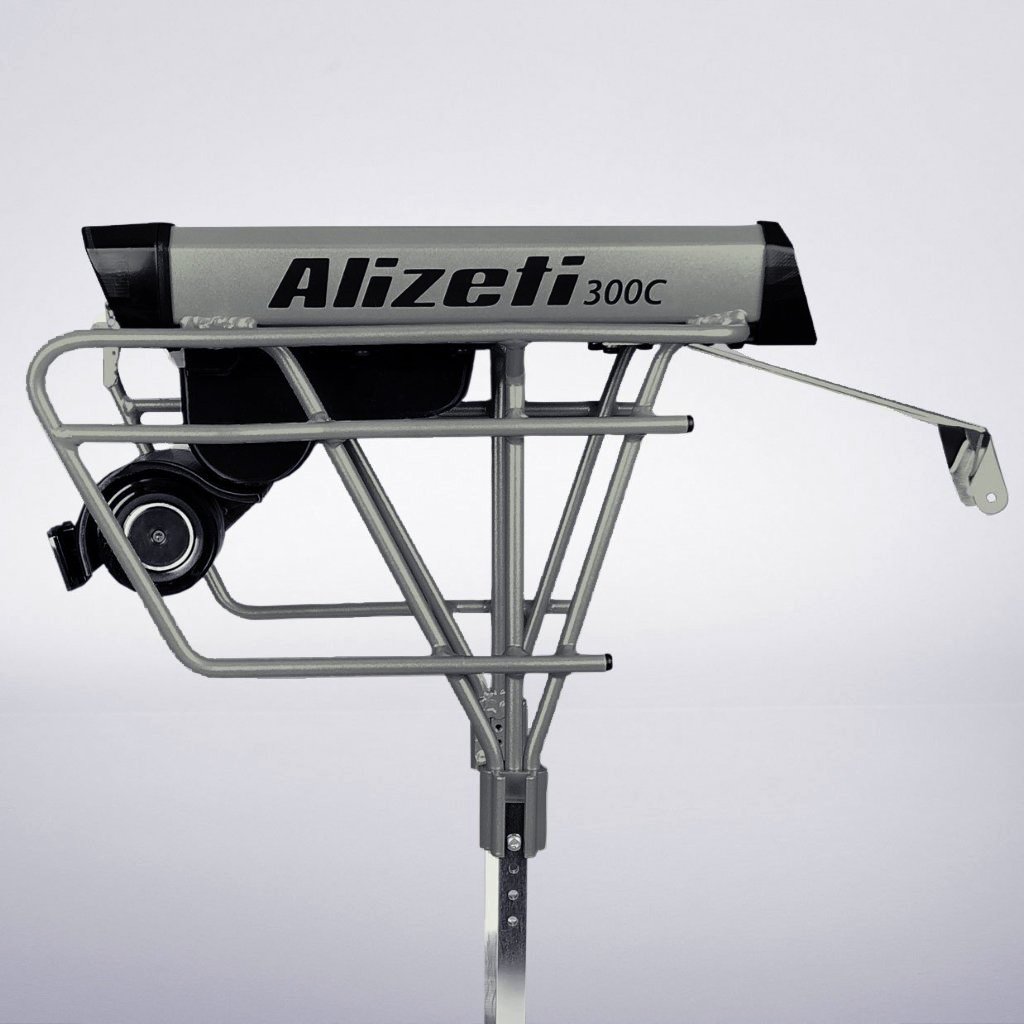
This augmented ride is courtesy of a drive system that mounts to your bike via an integrated rear rack. The Alizeti 300C Conversion Kit weighs only 11 lbs. and is currently the lightest e-bike conversion kit on the market. The unit, built of aluminum in Canada and impervious to the elements, transmits an extra 500 watts to the bicycle through a roller unit on the rear tire. A top speed of 20 mph is possible.
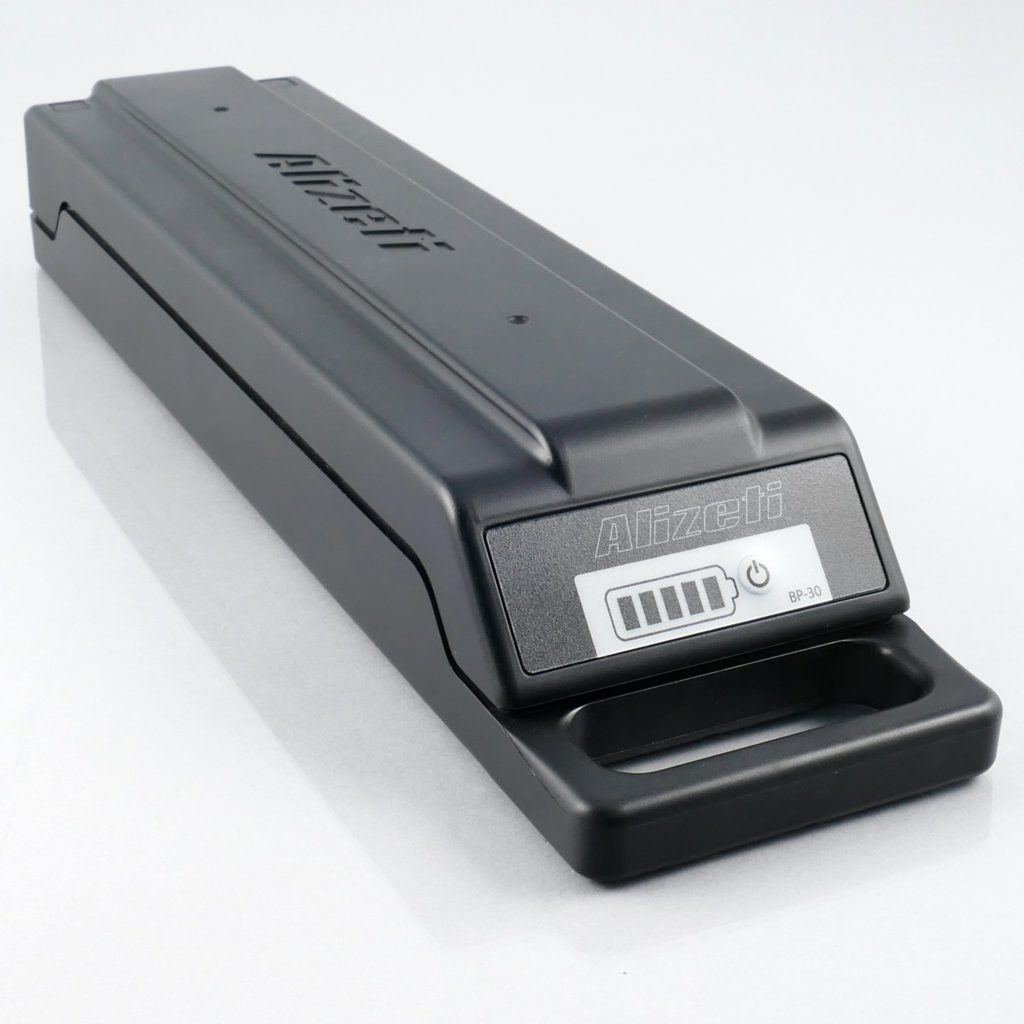
The 300C has two slots for 24 volt lithium-ion batteries. Alizeti calls this their Dual Flex Power battery system, and it allows a lighter load for shorter trips with a single battery that yields a 20 mile (32 km) range. Insert an optional second battery and that range doubles to 40 miles (64 km).
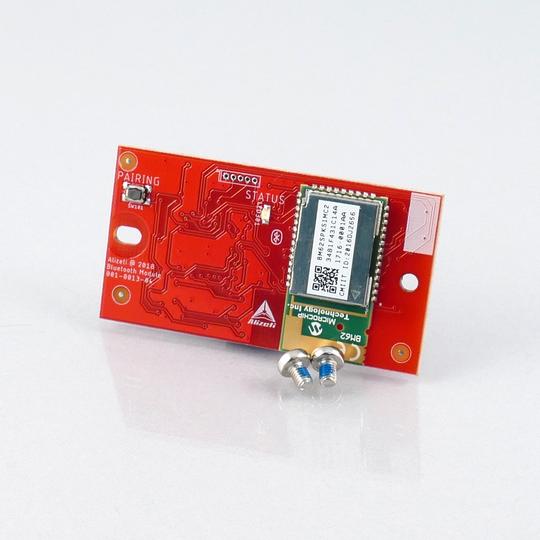
Optional features for the 300C are a Bluetooth module for music and data streaming and most importantly for performing software updates to the system via the FREE Alizeti app available for both Android and Apple mobile phones. Other options are the extra battery pack to enable the longer, 40-mile range, and dropout mount brackets to fit the rack to wider and narrower frames.

An upgraded model, the 300T (for “Touring”) comes standard with two battery packs, and also some notable safety features. Two rear signal lights and a flashing forward-facing beacon provide extra visibility on the road. For anti-theft protection (something also important for commuters), the 300T comes with an alarm system, and a loud, distinctive horn provides extra presence in higher traffic situations.
Alizeti’s affordable e-bike upgrade package not only makes cycling easier, but is itself easy to install to your bike. A detailed user guide and installation manual can be downloaded at Alizeti’s website, separately available in the two languages of Alizeti’s home nation (English and French). Alizeti claims that its customers can go from unpowered bike to e-bike bliss in 40 minutes or less.
With its range, power, and versatility, Alizeti claims that its e-bike Power Drive System is the “new paradigm in urban transportation and commuting,” and that’s hard to dispute. Check out this new PBE exhibitor and their innovative, game-changing products in-person at the show at booth number 3001-2 or visit the company website at www.alizetibikes.com for more information. To purchase Alizeti products anytime 24/7, visit their online store.

Reanimator Threadworks: Custom Bags That Give New Life To Forgotten Garbage
Enoch Cincotta was living in Miami Beach when they suddenly started to notice the trash. Not in a particularly bad way, mind you. At the time, Cincotta had just started Reanimator Threadworks, making bags for themselves and friends, and after a few months of that they couldn’t help but notice the garbage.
“While I was exploring the city I saw all sorts of discarded materials, inflatable pools, sun shades, bicycle tubes — these materials were eerily similar to the products I was spending a small fortune on” said Cincotta. “Suddenly everything clicked. I realized that I wasn’t paying attention to how much waste was being generated by my artistic process, and how I take sourcing materials for granted.”
You see, while making bags by hand can be a sustainable process, it’s not immune to the general cycles of waste we’re all kind of stuck in, Cincotta explains. “I realized that I wasn’t paying attention to how much waste was being generated by my artistic process, and how I take sourcing materials for granted,” they said. “Find the material online, purchase, and get it in the mail two days later. It doesn’t make sense to me anymore.”
And so, Cinocotta started making their bags from the discarded materials from local businesses. Old signage, unused bags, tubes and so on. If it’s durable, can be sewn into something, then Cincotta wants to figure out some way to transform it into a bag. “The idea is that we have everything we already need, we just need to be creative with it — I want to promote that in my work,” they said. “Now, instead of just mindlessly buying new materials I think to myself: What is the purpose of the gear I’m making? What physical characteristics does it need to be usable and efficient? What materials do I already have that I can utilize?”
Part of what Cincotta wants to accomplish with Reanimator Threadworks is not only showing others what a little creativity and ingenuity can accomplish with stuff that’s otherwise considered “garbage,” but also using their own knowledge and resources to help others do the same. “30% of profits from sales are invested into facilitating free community sewing workshops — boosting the local economy by creating a skilled labor force and promoting self sufficiency,” said Cincotta. “By advocating for a renewed appreciation for garbage, and providing a public opportunity to learn practical skills, Reanimator Threadworks is intent on building a stronger and more resilient community one stitch at a time.”
Now based in Harrisburg, Pennsylvania, Cincotta plans to make the trip from their shop to the Philadelphia Bike Expo solely on their bike. With a custom-made trailer carrying their Sailrite sewing machine, Cincotta wants to source materials on the way, and make a run of custom bags made from waste collected at the Expo.
“It involves me getting creative in sourcing my materials, and ultimately creating a symbiotic relationship with the venue and artisans to transform waste into something useful,” they said. “There are a lot of unknown variables in this project, but I’m excited to be showing everyone what a sewing machine and creativity can do!”

Messenger 841 Project: Honoring NYC Messenger Culture With Books And Bags
The year was 1990, and Kurt Boone, then a 30-year-old writer and entrepreneur, decided to become a messenger.
Growing up in Queens and going to school in Manhattan’s Washington Heights — where he was something of a track star — Boone and his brother always tried to find new and interesting ways to make the 2-hour journey home. And although he told the New York Times in 2009 that messenger work was never really a career — Boone’s speed and intimate knowledge of the city’s street and subway lines made him one of the city’s fastest “metros” or foot couriers.
“At my peak, I could ride 22 subway lines a week easily. I could go seven or eight subway lines a day and walk maybe 7, 8, 10 miles a day,” he told the Times. “It’s not running, but it’s a fast kind of walk that messengers do that pedestrians don’t generally see.”
In his nearly two decades of messenger work, Boone has published collections of poems, memoir and photography of the streets, subways and people of New York City. Most recently, Boone launched the Messenger 841 Project: a streetwear design group that’s inspired by New York City messenger culture and draws from Boone’s own messenger ID number, 841.
With the Messenger 841 Project, Boone has released shirts, caps, bags, shoes and watches all paying homage to the city and the people who make a living off navigating it as quickly and efficiently as possible. What’s more, Boone just released “The Culture of Messenger Bags,” an incredible look into one how a simple piece of gear crucial to the job of being a courier has become a powerful canvas for personal identity and expression.
At this year’s Philly Bike Expo, Boone will be selling “The Culture of Messenger Bags,” as well as other pieces of his work on urban cycling culture. While being a messenger is a job Boone knows inside and out, he is, above all, a storyteller. So swing by his booth this year, check out his work, and maybe you’ll get to hear a story or two from Boone.

Erra Creations: Repurposing Bicycle Parts For The Mind, Body and Soul
The bicycle is, no doubt, one of the most sustainable forms of transportation on the planet. And although it gets us where we need to go, and puts a smile on our face with almost little impact — the bicycle does produce some amount of waste. Think of all the chains, cassettes, and cables one goes through over the years. It’s not a lot, sure, but it’s also not nothing. Entropy and all that.
In 2011, Nicole Bloch was rummaging around when she found her grandmother’s old costume jewelry. She began messing around with it, altering it, playing with shapes and function. Her best friend saw this and issued her a dare: Try and make some jewelry from used bicycle parts. Bloch accepted, and started Erra Creations.
She started simple, making bracelets, cufflinks and pendants from bicycle chains. But over the years, she started incorporating more componentry into her designs — necklaces made from cassettes, earrings from 11-tooth cogs, even pendants made from dozens of chain pins. If you can find it on a bike, there’s likely some way that Bloch can turn it into something worth wearing.
But Erra Creations is not just jewelry. Bloch also produces small-batch natural body products like soaps, balms and salves — all of them handmade by Bloch herself right in her hometown of Pittsburgh.
Like the changing seasons, Bloch’s offerings change with what’s available to her, so be sure to swing by her booth at this year’s expo to see what she’s working on now.

Cycle Of Life Adventures Wants You To Explore The US On Your Bike
It’s often said that the best way to get to know a place is on a bicycle. Pedaling the roads that make up cities, towns and states forces you to become familiar with the lay of the land in ways that driving a car with Google Maps open does not. The fact that you must pedal for every inch of where you want to go brings with it an intimate familiarity with the very ground your traversing. Every little climb, dip and turn offers an understanding of the land in ways that even walking cannot replicate.
It’s this familiarity with the land that Cycle of Life Adventures founder Elli Sias wants everyone to feel on her bike tours across the United States. From an epic 40-day long tour across America starting in San Diego and ending in St. Augustine, Florida, to short covered-bridge treks through Vermont to leaf peep — COLA likely has a boutique cycling trip that’ll match what you can do, and more importantly, would like to see on a bicycle.
For over four decades, Sias worked in the customer service and hospitality industry. In 2014, at age 58, she decided that it was time for a change — to finally get out of the office life and get back on the road. Cycle of Life Adventures combines her love of cycling and the roads of the US and combines it with her hard-won knowledge of how to serve people’s needs and bring them new experiences.
Each and every one of COLA’s guided tours features at least two experienced guides, well-rounded meals to refuel after big days in the saddle, top-notch accommodations to relax in after a day on the bike, as well as featuring the best local restaurants wherever it is you’re staying — you are on vacation after all!
Based out of the North Carolina’s High Country in Blowing Rock, Cycle of Life Adventures wants to show you the beauty that not only the Blue Ridge mountains have to offer, but all over the United States. Because, again, the best way to get to know a place, is on a bike.
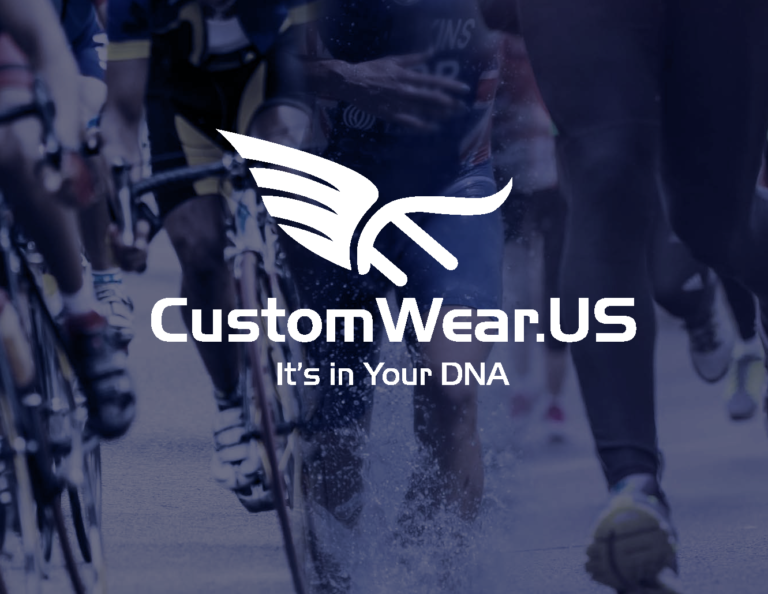
Life Behind Bars Cycling Really Wants To Help You Create Some Custom Cycling Kit
For nearly a decade, you’ve likely seen kit produced by this Illinois-based company, but you probably haven’t heard of them. They’ve produced OEM apparel for top manufacturers, even custom kit for a number of well-known teams across the US. Founder Dennis Mariasis has spent years scouring the world for a wide range of high-performance fabrics that can meet a variety of performance needs and price points.
Now, after seeing such a positive response from clients, Mariasis believes that it’s finally time to “give back to the community and come out of the shadows to help.” And so custom-kit supplier Life Behind Bars Cycling and Customwear.us was born.
Mariasis prides himself on his ability to produce high-quality custom kit at a reasonable price — and in turn, meet just about anyone’s needs when it comes to cycling apparel. To do this, not only does Mariasis source high-tech fabrics from all over the world, he’s also done his research. According to Mariasis, he’s closely studied the work of other popular manufacturers — going through their product stitch-by-stitch in order to understand what truly goes into high-quality kit.
“This knowledge now allows us to create apparel at any price point and provide fabrics you would not be exposed to when making your own apparel,” says Mariasis.
What Life Behind Bars Cycling and Customwear.us tout isn’t so much a specific manufacturing process or feature, but rather their ability to meet the needs and goals of their clients. They’ve provided kit for large charity rides like the Ride For Life Chicago, as well as numerous local cycling clubs.
If you have an idea for some custom cycling kit, you better believe that Mariasis wants to hear from you. So come say hello at this year’s Philly Bike Expo.

Cleverhood Returns To The Philly Bike Expo With Smart Rain Gear
There’s nothing more dismaying in life than waking up one morning, excited to go for a bike ride, only to have your plans dashed by the rain. Cleverhood, a rainwear company based in rainy Providence, Rhode Island, wants to change the relationship we have with inclement weather with a lineup of cleverly-designed ponchos, capes and jackets.
Founded in 2011 by graphic designer Susan Mocarski, Cleverhood started with a single product: a high-performance rain poncho. The idea being that if people only just had the right piece of outerwear, they wouldn’t need to resort to using their cars or even just staying home in order to stay dry. Cleverhood’s poncho, ideally, would open the world back up to people even when it rains.
And while it started with a single poncho, Cleverhood’s expansion into rain capes, wool capes, beach capes and even a rain jacket — they all embody the single idea that going outside in the elements doesn’t have to be miserable as long as you have the right piece of outerwear. Like how people find a sense of community after a snowstorm has blanketed their neighborhood, Cleverhood believes the same can be found in a rainstorm. There’s just something a little different, something that makes you want to open up to the person next to you like standing in the rain. There are few better conversation starters with a stranger than just saying something like “Wow, it is really coming down out here, isn’t it?”
By producing some unique, and smartly-designed pieces, Cleverhood want to encourage people to get outside and be a part of their neighborhood, rain or shine. A Cleverhood product will make riding around town, or a walk around the block a more pleasant experience, but hopefully it’ll help you feel more connected to your surroundings. To that end, Cleverhood sources a majority of its materials and manufacturing right here in the US — partnering with suppliers across the country, from New York to Los Angeles, Massachusetts to Georgia.
2019 will mark Cleverhood’s ninth year exhibiting at the Philly Bike Expo. So if you’re looking for someone to talk about the weather with, or more accurately, how to stay out of the weather while still being in it, stop on by their booth.

Tub O’ Towels Heavy Duty Cycling Wipes Is The One Towel To Rule Them All
The bicycle might be the world’s most sustainable form of transit, providing clean, good and affordable fun to the masses, but it also gets dirty. Whether that’s playing in the muck of your local cyclocross race or just commuting around town day-in and day-out, the dirt and grime eventually finds its way onto your bike.
Now, you could have a stable of cleaners, degreasers and brushes on hand to give your bike a bolt-by-bolt and link-by-link scrubbing, but what if you don’t have access to those kind of supplies or the time to rinse, degrease, clean, and rinse again? Well, that’s where Tub O’ Towels new Heavy Duty Cycling Wipes come in.
Each 12×10 inch quilted wipe comes saturated with Tub O’ Towels Bond Buster™ cleaning technology — which instantly breaks the molecular bond between the grime and the surface material of your bike. The end result means less scrubbing and more cleaning.
What’s more, Tub O’ Towels Heavy Duty Cycling Wipes come individually packaged. Meaning you can stash one in a jersey pocket or saddle bag for convenient, quick, roadside cleaning. We’ve all been there, spending a day out riding your nice clean bike only to get caught in a flash rainstorm, undoing all that hard cleaning work. With a Heavy Duty Cycling Wipe on hand, you could just give your bike a quick wipe-down once the sun is back out, preserving the pristine state of your bicycle.
And while most cleaners and degreasers will leave your hands in need of their own cleaning, Tub O’ Towels Heavy Duty cycling wipes contain a combination of Lanolin, Aloe Vera, Vitamin E and fresh citrus scent, which will leave your hands (and your bike) feeling and smelling fresh.
Once your bike is clean, you can also check out Tub O’ Towels line of other bike-focused products, like the Lube-It All Lubricating Oil, the Tub O’ Scrub Hand Cleaner and the Free All Deep Penetrating Oil.
So come check out the whole Tub O’ Towels cycling product lineup for the first time at this year’s 2019 Philly Bike Expo. Because as we all know, a clean bike is a happy bike.

Crust Bikes: For the Cycling Life
New Jersey-based Crust Bikes started in 2014, and offers framesets built from steel. As you might have guessed, owner Matt Whitehead is a fan of pizza (and who isn’t?).
Just as the crust is the foundation for any good pizza, a good quality frameset is the foundation of any great bike, and this is what Whitehead focuses his energies on.
“The frames are pretty special, I think, as they are a mix of past and present ideas and materials from the bicycle world,” he says.
We’ve all heard bicycles being dismissed, tongue-in-cheek, as a “bunch of pipes.” Well, that’s not really a false statement at its core, and Whitehead’s former career as a plumber taught him the basics of welding pipes together. But for the knowledge and art of turning tubes (let’s call them that) into frames, Whitehead drew from his love for cycling.
Crust’s framesets are the base for bikes that can venture off the beaten path, or stay on the road as the need arises. As Whitehead alludes to, there are some anachronistic elements on Crust’s road frames like pump pegs and bosses for three water bottles – de rigeur for touring bikes of the 1980s but rarer now. And then there is the modern use of disc brakes and thru-axles, both of which make sense for a loaded touring or randonneur bike so that either 650b or 700c wheels can be used.

Case in point is the Romanceur, a go-anywhere frameset that in many ways looks like a Raleigh from the early 1970s. It has lugged joints, a cream-colored headtube with fancy headbadge,and a curved hook pump peg for the back of the seat tube, but without the patina and with disc brakes instead of Mafac centerpulls.

Crust’s website, which like the Romanceur itself really needs to be seen to be appreciated, describes the frame as “a swashbuckling tender heart of a fantasy warrior, who not only seduces its rider, but acts as a psychedelic aphrodisiac on the psyche.” Show me an old Raleigh catalog with that kind of prose!
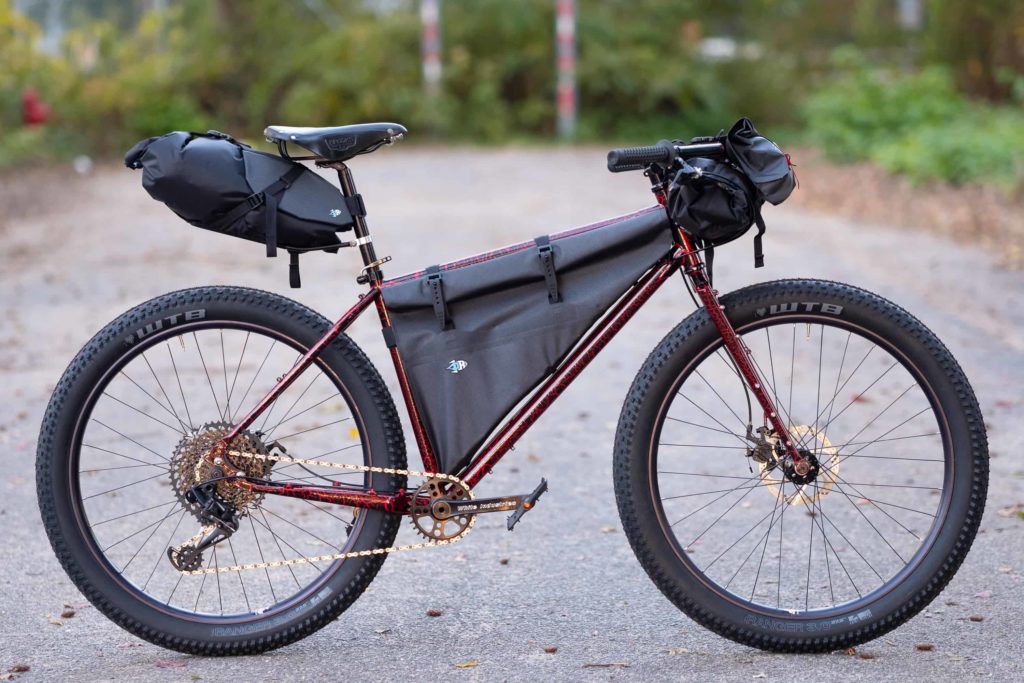
On the trail side of things, there’s the Scapegoat, a loaded off-road touring (or bikepacking) frame with just about every conceivable braze-on the off-road adventurer needs added to it. As its name suggests, the Scapegoat is ready to handle all the abuse of the bikepacking lifestyle, but as with many of Crust’s offerings, traditional elements like a threaded bottom bracket shell and a fully-rigid frame coexist with the modern, like rocker dropouts, so you can run single speed if desired.
In the end, Crust Bikes’ approach to cycling is a little irreverent, a little traditional, and 100% committed to supporting the adventure cycling lifestyle. Some bikes need to be not only ridden, but lived with to be fully appreciated, and a true partner for the cycling life is what awaits a Crust owner.
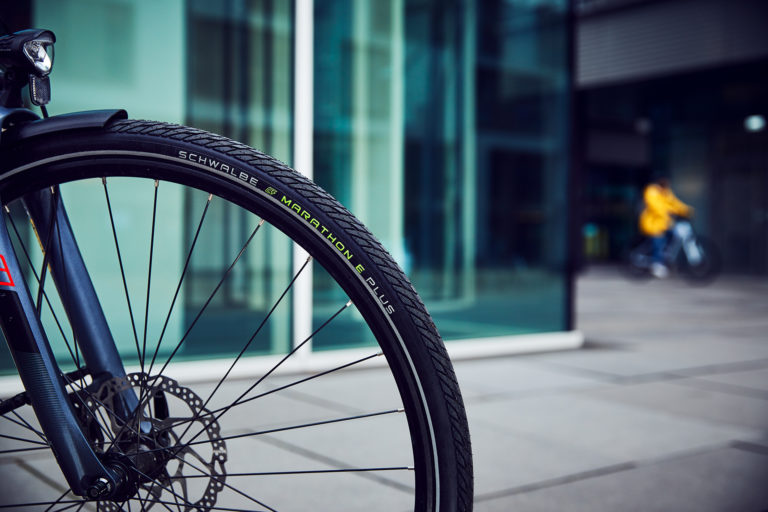
Schwalbe Showing Off New Rubber At The 2019 Philly Bike Expo
Just two months after announcing brand-new road, mountain and gravel tire offerings at Eurobike 2019, Germany-based manufacturer Schwalbe will be displaying their new rubber lineups for the first time in the United States at the 2019 Philly Bike Expo.
Coming in 2020, Schwalbe is completely revamping their road tire line, debuting eight new models in 56 variants. At the top is the redesigned Pro One, featuring brand new Souplesse carcass technology, Addix race compound and Schwalbe’s Tubeless Easy technology. The end result is a tubeless road tire that is grippy, supple and easy to set up. It is, as they put it, “the best road bike tire Schwalbe has ever developed.”
Of course, it doesn’t just end with the road. Schwalbe will also be adding one more addition to it’s G-One gravel tire lineup with the G-One Ultrabite. Featuring more aggressive knobs that its G-One Bite, Allround and Speed counterparts, the G-One Ultrabite gives gravel riders the confidence-inspiring off-road traction that will have riders mixing in bits of singletrack into their gravel rides. The Ultrabite is so robust that Schwalbe says that it can offer up grip, “even in challenging conditions.”
In addition to some brand new offerings for 2020, Schwalbe will also be showing off some new tan-walled versions of their popular Magic Mary, Hans Dampf, Racing Ralph and Racing Ray mountain tires in select sizes. Because who doesn’t love that classic two-toned look even on the most modern downhill and cross-country bikes? The Eddy Current, the world’s first tire designed specifically for e-MTBs will also be coming in a slightly-narrower 2.60-inch widths.
And it wouldn’t be a true Schwalbe showing if the Marathon also didn’t get some attention. The company’s mega-popular touring tire is getting an update in 2020 with the Marathon E-Plus, an updated version of the Marathon Plus specifically made for e-bikes. The E-plus will feature the Marathon’s renowned puncture resistance and durability, paired with Schwalbe’s Addix E compound and is rated for speeds up to 30 MPH.
There’s a lot to check out from Schwalbe this year, and the Philly Bike Expo is excited to be one of the first places you can check out all this new rubber here in the US.

Giordana Cycling: Italian Connection
Giordana Cycling has been putting high quality, performance clothing on cyclists since before racing and gran fondos were a “thing” in this country. Their experience and connection to the motherland of cycling, Italy, serves as a beacon in a sea of other custom clothing manufacturers.
Giordana’s history in cycling would fill up an entire article, so here’s the short(er) version. In 1971, Giorgio Andretta, an elite-level cyclist from Italy, moved to the U.S. and established Gita Sporting Goods to serve as the North American distributor for several Italian brands. Thanks to Gita’s efforts, such brands as Pinarello, De Rosa and Diadora are now beloved and trusted among cyclists – and the general public – in the U.S.
As Andretta was promoting Italian quality and style stateside, he noticed a lack of domestic manufacturers or distributors of quality cycling apparel. Giordana Sport – Gita’s clothing business – was named after Andretta’s young daughter and served to fill a need in the growing U.S. market.

Designed and developed for cyclists of all kinds, Giordana quickly found an international following at the top levels of professional racing. Over the years, Giordana has sponsored athletes at all levels including World Tour teams, an Olympic gold medalist, and has been the official clothing supplier of the Tour de France.
According to Kem Newman, Sales Manager for Giordana, one of Andretta’s boldest moves came in 1986 when he opened a dedicated Giordana manufacturing facility in Italy. This pushed Giordana further to the forefront of the cycling apparel industry. The company embraced the new technologies available in the textile industry to become a leader in sublimation printing. Giordana was also at the vanguard of developing and testing new materials and cycling garments for the market and providing custom professional level clothing to local and regional clubs.
An avid cyclist to this day, Andretta is still the driving force behind product development. With a new facility in Italy, Giordana is creating more synergies for all phases of production.This has contributed to streamlining the manufacturing process even further to create the most advanced apparel in the company’s history. Giordana’s dedicated teams in Charlotte, NC, and in Vicenza, Italy, consist of adventurous and unique individuals who share a passion for the outdoors, quality products, and a little friendly competition.

Family is important to Giordana and that’s one reason why they’ve resisted the temptation to move production to Asian factories. But Giordana customers retain the benefits of Italian quality while sacrificing nothing in terms of quick and easy ordering and fulfillment. The company offers unlimited colors, no design fees, low minimums, a kit builder order platform, size sample kits are available, and orders can be produced in as little as 4 weeks with free ground shipping to your doorstep.
In addition to the lower, 5-piece minimums and shorter production time, Giordana has recently introduced a new triathlon apparel line, an accessories “bundle” for easier ordering of individual items, and new mesh caps.

Importantly for the eco-conscious among us, Giordana’s Italian facility exceeds the EU’s requirements for green practices. Excess fabric cuttings and printing paper are recycled, and skylights provide light to reduce electric consumption.
“No expense is spared in doing things the right way– both for our customers and our planet,” says Newman.
For Giordana, the calculus is pretty simple: employees, customers, the cycling community and the entire planet comprise one big family. Why would you do something to harm any member of it?
Speaking of his “families” in both Italy and the U.S., Andretta comments: “Here you have people who have done this all of their lives. They know what they are doing. They care about what they are doing, and they care about the product they put out. That’s what makes this place so special.”
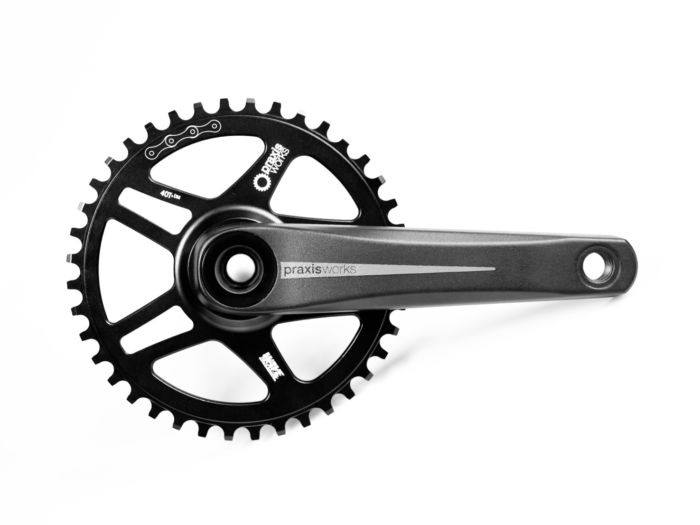
Praxis Works: Heart of the Bicycle
Praxis Works builds all those parts of the bicycle that propel you forward: cranksets and bottom brackets, chainrings, cassettes and wheels. Founded in 2010 and located in laid-back and bicycle-mad Santa Cruz, Calif., Praxis Works is quickly becoming a high-quality aftermarket manufacturer of these components which, in concert, form the beating heart of the bicycle.
Industry veteran David Earle founded Praxis after working in R&D for the original Bontrager Cycles, as Senior Design Engineer for Specialized, for Santa Cruz Cycles, and for other individual ventures. Earle fancies himself Praxis Works’ “Chief Mad Scientist,” and science in the form of product engineering and relentless testing is perhaps the key to Praxis’ success.
“Praxis’ sole purpose is to provide customers of all types with exceptionally designed drivetrain components that offer great performance and value. Our innovative manufacturing methods, combined with the in-house engineering team and testing facilities, make Praxis Works a new force in the cycling industry,” says Eric Highlander, Praxis Works’ Event Coordinator.

Road cranks come in three models, built from solid aluminum, hollow aluminum or carbon fiber. The carbon cranks are available with or without an integrated 4iiii power meter, and all road cranks are available in a wide variety of chainring pairings, including 48/32, 50/34, 52/36 and the standard 53/39. Praxis has also embraced the shorter crank movement, with crankarm lengths that start at 160mm and max out at 175mm.

Carbon fiber dominates the line-up for the mountain cranks, which come in six different models. Three of them are made from carbon, two from solid aluminum and one from hollow aluminum. All offer direct mount rings from 30-36 teeth and utilize the M30 bottom bracket. The top of the line carbon Lyft model also comes with an HD (Heavy Duty) option that features a more robust carbon layup and a thicker M30 bottom bracket for heavier and stronger riders.
Praxis also makes carbon and alloy cranks for e-bikes, and chainrings for bikes of all persuasions. A single, wide-range cassette for mountain bike use is offered, for 10-speed Shimano and SRAM systems with one or two chainrings, with an 11-40 tooth range.
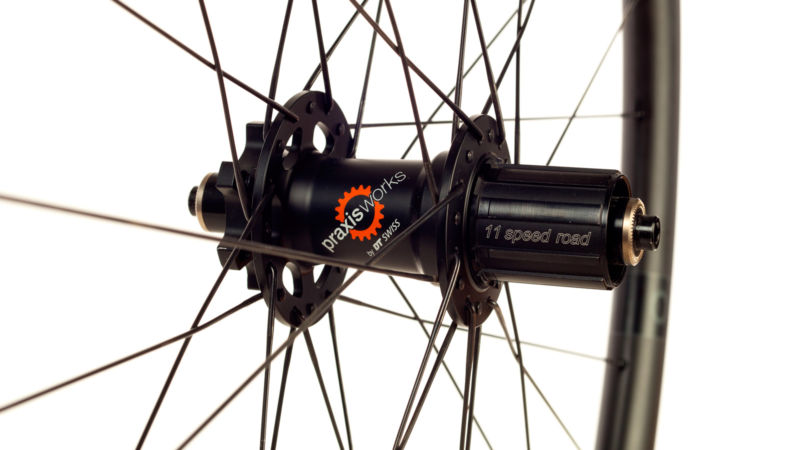
For wheelsets, Praxis has teamed up with a trusted name in the industry, DT Swiss, who manufacture the hubs and spokes. There are two mountain wheelsets offered in carbon and aluminum rim options, a road wheelset with carbon rims, and a special wheelset, the AL24, designed for gravel riding and racing that features wide-section aluminum rims, and which comes in 27.5 in and 700c options. Stand-alone carbon and aluminum rims are also offered.
Whether it’s cranks, chainrings, wheelsets or other components on Praxis’ menu, you can rest assured that their products have undergone rigorous in-house and on-the-road testing courtesy of the TIBCO/SVB pro women’s team, an elite men’s team and several individually-sponsored athletes.
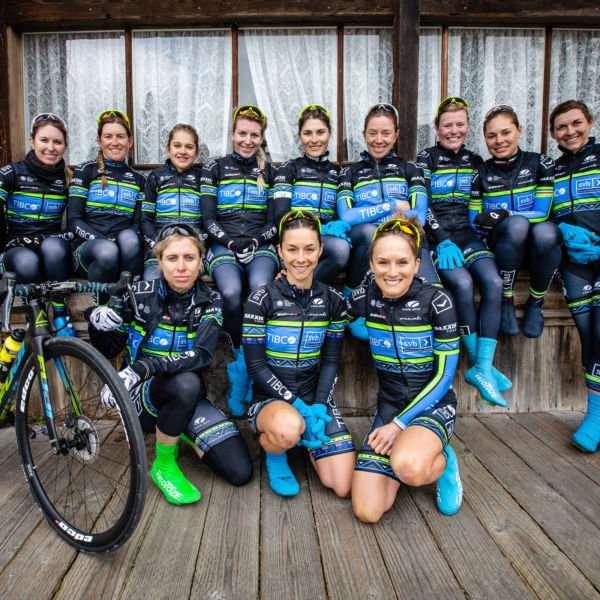
Top notch product design and engineering is paired with excellent customer service, including live support at the Praxis Works website, to keep you on the road, the singletrack trail or the gravel fire road, moving forward.

Weis Manufacturing: Built to Rip
The first three bikes listed on Weis Manufacturing’s line-up are fixed-gear track bikes. That’s a fitting introduction to their focus on pure speed.
Weis set up shop in the heart of Brooklyn in 2008. The company name comes from a wagon manufacturing business that co-owner Cole Bennett’s great great grandfather established. Bennett is therefore following a family tradition of wheeled transportation.
New York City was once home to several velodromes, in Harlem and at Coney Island, and from 1899-1961 Madison Square Garden hosted 73 editions of the New York Six Day races, whose competitors were household names.
Nowadays, only much-maligned Kissena Velodrome on the outskirts of Queens remains in the city. So track racers, even in a mega-city like New York, are a small population, but Weis counts competitors in alleycat races, fixed-gear criteriums like Brooklyn’s own Red Hook Criterium, and a thriving messenger community among their clientele. Quickly delivering packages and important documents matters in a city that never sleeps.
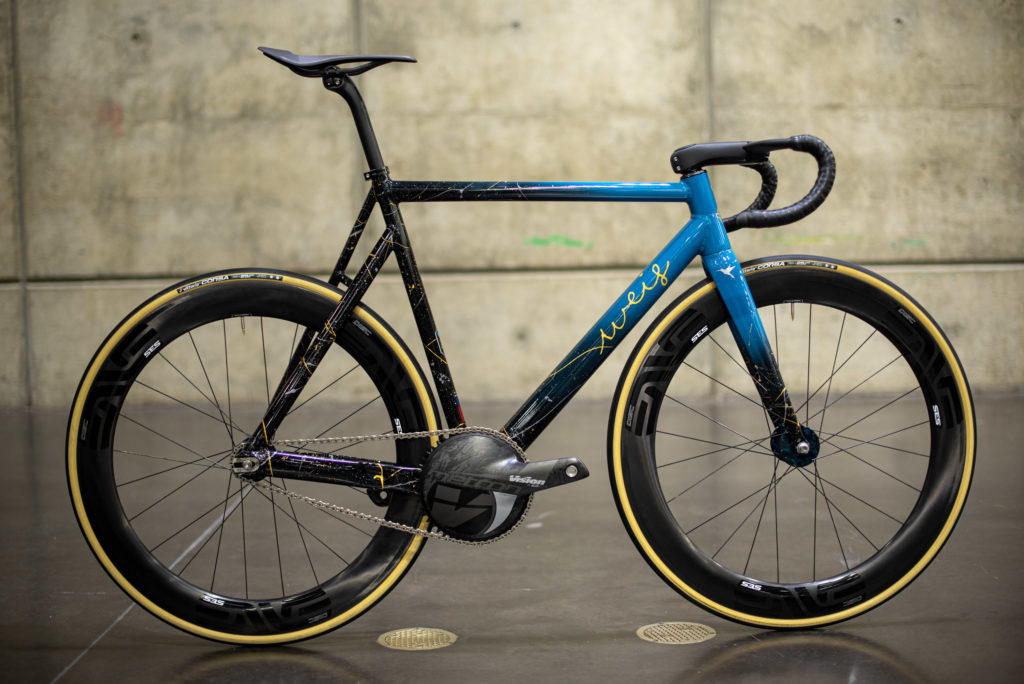
Weis’ focus on speed stems from a meeting between Bennett and his business partner Rob Bezrutczyk while both were Industrial Design students. Bennett’s experience as a bike messenger got in his blood, to the point where today he still cites the streets of Manhattan as his favorite place to ride a bike.
Form follows function at Weis. No intricately carved lugs or pinstriping adorn their frames, but a devotion to getting power to the pavement guides their design and manufacturing efforts. Frames are TIG-welded from aluminum or steel, and feature Weis’ signature asymmetric seat stays. All tubes are ovalized, oversized and beefed up in those areas critical to transferring pedal power into forward motion.
At this year’s NAHBS in Sacramento, Weis displayed a prototype Hammer track bike built from Super Magnesium tubing, a high-strength alloy that is lighter than aluminum, titanium and steel, and less expensive than carbon fiber. Plans to offer these frames to the public are still being developed.
It’s not all about fixed gears at Weis. The Hammer Road model is constructed from super-strong 7005 aluminum with aero tubes and a tapered head tube all designed to propel you forward – fast. Should you need to stop, that’s a quick proposition as well, with integrated flat mounts for disc brakes and thru-axles front and rear.

Weis is so committed to keeping you moving forward on two wheels that they strive to offer all of this hand built excellence at affordable prices. And while they offer full build kits, they don’t push customers to buy a complete bike, so you can build your dream machine part-by-part or use your existing gruppo.
With Weis Manufacturing, there are no barriers to speed.

da Vinci Tandems: Technical Masterpieces
If you take the name of a famous Italian Renaissance artist and armchair engineer/visionary way ahead of his time for your bicycle company, you’d better be able to back up your own technical wizardry and product aesthetics. Da Vinci Tandems hits the mark on both counts.
Da Vinci focuses solely on tandem bicycles and their claim to innovation is their patented Independent Coasting System. The ICS lets a rider coast independently of their partner, which is a huge advantage for tandem cycling. Just as it’s rare to have two riders of the same size (particularly husband and wife teams), it’s even rarer to have both tandem partners at the same fitness level. The ICS, exclusive to da Vinci tandems, allows for these inevitable differences in cycling ability.

Speaking of differences in cycling fitness, e-bikes have taken the industry by storm, and they provide a more pleasurable cycling experience for older cyclists or for those recovering from injuries. Love them or loathe them, e-bikes are here to stay, and da Vinci has entered the marketplace with their Tailwind tandems, available in road or mountain iterations. The Tailwind e-bikes use the Shimano Steps E8000 motor, powerful enough to level any mountain, but still light at only 6.2 pounds. And as with all da Vinci tandems, the Tailwind uses the ICS.

While the accommodation to different riders’ fitness levels and styles is the chief advantage of da Vinci’s ICS, there are several other significant mechanical dividends. The ICS uses an intermediate driveshaft placed six inches in front of the rear bottom bracket. Because both stoker and pilot are adding energy to this driveshaft, chainrings that are about half the normal size are used. This means faster, easier front shifting and with four chainrings and eight rear sprockets, an amazing gear range from 18 to 140 gear-inches is available. Other bonuses are higher ground clearance, stronger and lighter chainrings, and less chain wear from shifting.
Da Vinci offers tandems for road, mountain and gravel cycling. Mountain versions are available with front or full suspension, and da Vinci uses a full palette of frame materials to construct their two wheeled masterpieces: tandems are available in steel, aluminum, titanium and carbon fiber. All frame materials except aluminum can incorporate S&S couplers, which make traveling with a tandem much easier, and in many cases, even possible.
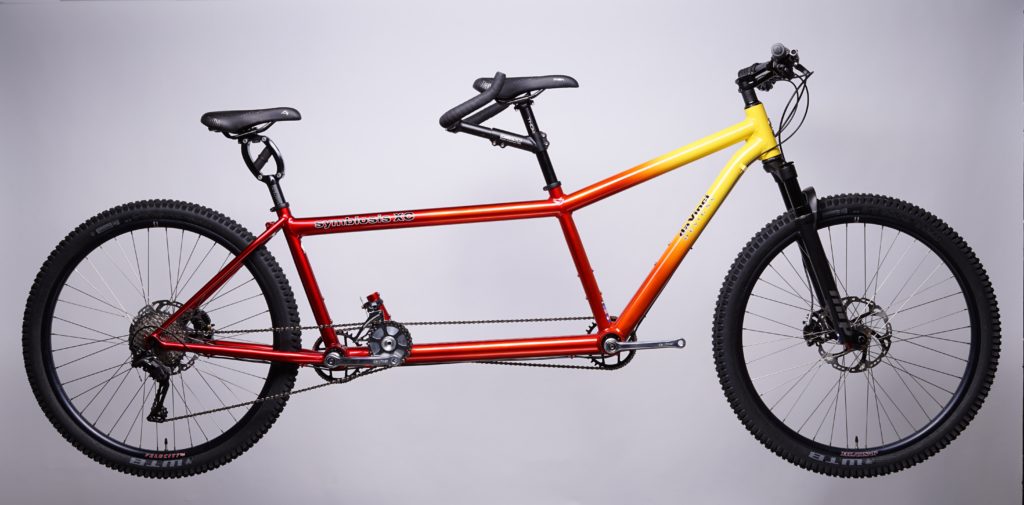
And just as the brand’s namesake Leonardo da Vinci painted many of his masterpieces on commission from patrons, you can commission your own custom tandem from the Denver-based builder. Whether selected from the line-up of standard offerings or uniquely conceived as a custom, all da Vinci tandems are handbuilt.

Quiver Fabrications Takes Titanium To New Heights
In a sense, all outdoor gear is, in some way, designed to help you relax. And while that gear might use space-age materials and modern engineering to meet ever-increasing demands for reliability and performance, it’s all in the service of helping you relax. Quiver Fabrications, a titanium smoking accessories company based out of Denver, wants to bring a level of design and engineering into something that’s always been part of outdoor recreation, but often overlooked.
For a number of years, titanium alloys have been on the bleeding edge of performance and reliability for things like bikes, camping gear and climbing equipment. It makes sense: it’s light, corrosion-proof and resilient. And if titanium is good enough for the spork you’re packing, the folks at Quiver Fabrications believe it’s good enough for any pipes you’re bringing along as well.
“We are outdoor enthusiasts that enjoy the send. We decided to mix our love for the outdoors with our passion for fine flowers and herbs,” says Kelly Rossberg owner of Quiver Fabrications. “We took our manufacturing experience and applied that towards making a high end product that was durable enough for our lifestyle!”
Quiver’s premier offering is the The Summit, the first-ever full-titanium water pipe that’s “adventure ready and quite the ripper.” Quiver Fabrications promises that it’s classic flask design offers “clean, flavorful hits.” Offset drill holes in the downstem ensure simple filtration and a smooth interior means the smoke clears perfectly every time and never tastes stale. The included heatband also makes it easy to secure it to just about anything with your favorite carabiner — whether that’s on pack for more involved adventures or just to the back of your saddle for day trips.
“For us the work Quiver represents the collection of gear each piece for a specific purpose or circumstance. Like a Quiver of arrows,” says Rossberg. “This has become standard verbiage in the outdoor industry when describing a piece of gear’s place and purpose — and for us, it was a perfect fit.”
In addition to the The Summit, Quiver also offers the aptly-named Safety Meeting pipe, as well as number of bowls and concentrate nails to compliment The Summit. All of Quiver Fabrication’s products are made from Grade 1 titanium — the purest commercially-available form of titanium, touting the highest corrosion and impact resistance. Because of this, all of Quiver’s products come with a limited lifetime warranty. All you have to do, is relax.

Van Dessel Celebrates 20 Years Of “Ride Inspired” Bicycles At The Philly Bike Expo
If there has been one constant in Edwin Bull’s life, it’s been the bicycle. Bull, the founder of New Jersey-based bicycle manufacturer Van Dessel, spent his childhood moving between Belgium, West Africa, and Massachusetts, and every step of the way — whether that was riding, racing or just ripping around — there was a bicycle. By the time Bull was just barely old enough to drive, he had already built a few frames of his own.
That passion for bicycles saw Bull seriously consider a future riding in the pro peloton. After racing at some of the highest levels of the sport for a few years, Bull landed in Parsippany, New Jersey and decided that it was time to shift his passion for bicycles into a more creative direction. And thus, in 1999: Van Dessel was born.
Carrying the maiden name of Bull’s mother, Van Dessel began with what he calls “functionally unique” commuters — partly inspired by Bull’s own time away from racing, and partly inspired by just wanting to try something new and exciting.

Shortly after, though, he found himself wanting to design, build and tinker with high-end race bikes. It made a lot of sense. What better way to support and grow the sport he loves so much than to provide its athletes with the best equipment possible?
“I’ve always really loved the equipment and mechanics of the bike. That’s what I concentrate on most,” he said in an interview in 2015. “I feel as long as I put the best possible product out there, that the rest will fall into place.”
If you’ve been to a cross race or a criterium, you’ve likely seen the fruits of Bull’s labor. Race-tuned aluminum bikes like the Hellafaster and the Aloominator have proven just how capable alloy is on the road and between the tape. Modern carbon-fiber machines like the Full Tilt Boogie regularly see themselves at the front of UCI cyclocross fields and the Motivus Maximus nearly out-sprinted a three-time world champion. And maybe you’ve even seen Bull himself, Hawaiian shirt flowing through the wind as he rips through a local cyclocross race on his single-speed Country Road Bob.
And it doesn’t just end with the bikes. For over a decade, Van Dessel ran one of the country’s most-respected cyclocross teams. A program that will hopefully return in the coming years, and its impact made manifest through the Floyd’s Pro Cycling team.
In their fifth year exhibiting at the Philly Bike Expo, Bull is proud to show off his ever-expanding line of “Ride Inspired” bikes. The race machines like the Full Tilt Boogie and Motivus Maximus will be there, but so will “man’s best friend on a bicycle” the Whiskey Tango Foxtrot, as well as the brand new Day Ripper — a drop-post-equipped, do-it-all gravel, well, ripper.
Most of all, Edwin Bull will be there. Come say hello. There’s nothing he loves more than talking to people about bikes.
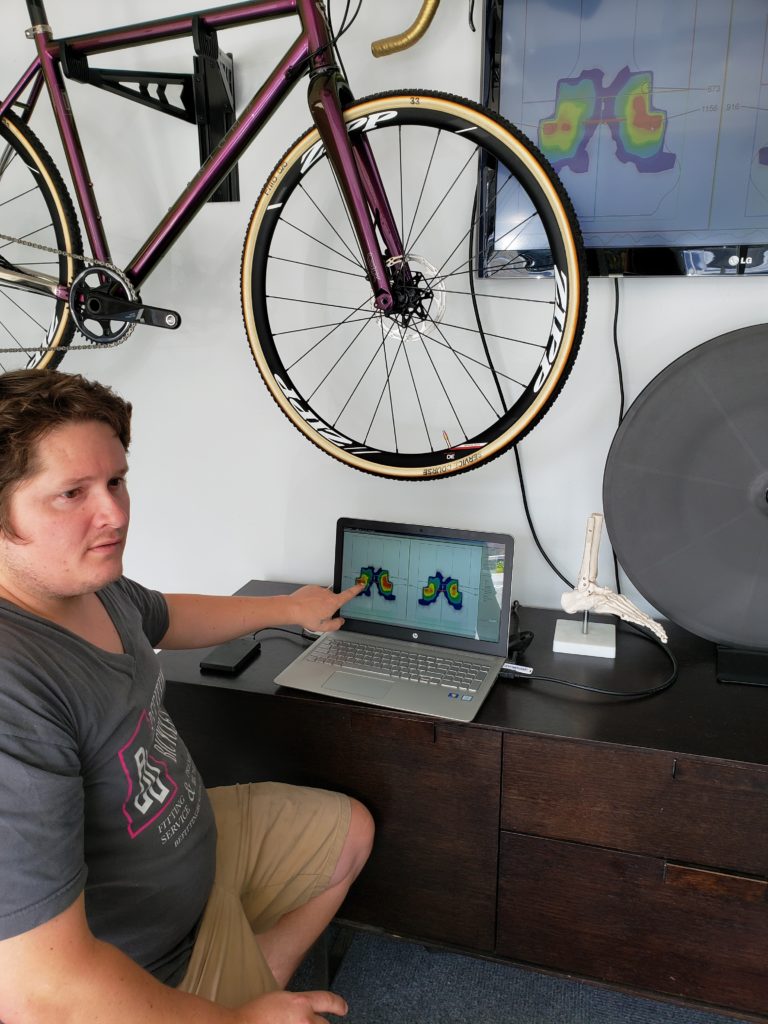
Befitting Bicycles Fits The Bike To Your Body (Not The Other Way Around)
About a decade ago, Isaac Denham had a realization.
After spending a few years wrenching at a local bike shop, Denham started doing “light” bike fits on the showroom floor. You know the type. Customer gets on a bike, employee eyeballs the fit, and makes a few small adjustments until it passes the “Yeah, that looks about right” test. But what caught Denham is something that most of us take for granted: riding a bicycle should be a harmony of human anatomy and machined geometry. The bicycle, Denham realized, should work to fit the rider, not the other way around.
With a newfound interest in how our bodies work, Denham attended Specialized Body Geometry fit program, where he fell in love with bike fitting. “It came down to using the anatomy to determine bike fit position,” says Denham. “To delve deeper into our understanding of how the body works and apply it to the bike was really intriguing.”
And then about a year ago, Denham had another realization: He should start his own shop. And so Befitting Bicycles in Wayne, Pennsylvania was born.
Unlike other shops, and as the name suggests, Befitting Bicycles specializes in bike fits. With nearly a decade of experience under his belt, Denham has combined his understanding of human anatomy with the modern technology of multiple fit systems like Retul, Trek’s Precision Fit and Specialized Body Geometry, into a craft of its own right.
A full 3-hour fit with Denham involves a pre-fit consultation to discuss a rider’s goals and current fit issues, a full anatomical assessment of that rider’s body off the bike, and then a comprehensive fit session that uses real-time position data, rider feedback and Denham’s own knowledge to provide a wholly custom bike fit. Denham also offers saddle pressure mapping, custom Retul footbeds as well as in-home fits for spin or Peloton stationary bikes.
While bike fits might seem like something only professionals gets, Denham believes that the people who stand to benefit most from professional fit are your everyday cyclist. “The pros might be trying to capture that extra 1% with a fit,” he says. “But with the average person there’s way more room to benefit with a solid fit.”
Denham’s fitting philosophy isn’t so much to use the bike fit to make you faster — though that’s certainly a nice side-effect — but rather to help people ride the bikes that they love without pain.
A lot of that is done by just undoing the complications of trying to fit the rider to the bike. A popular example that Denham points out is people trying to emulate “pro” fits. Slamming your stem might look cool, but if your body doesn’t need a slammed stem on the bike you’re riding, well, that’s when you start to run into issues. The bike should fit the rider, not the other way around.
“One thing I hear a lot from people is that they’re not good enough for a bike fit,” he says. “Or that somehow their fitness level isn’t at a place where they feel ready.” As Denham sees it, bike fits are a lot like planting trees or buying Amazon stock. The best time to do it was 6 months ago, the second best time is now. Because if you get off your bike, and you’re not in pain, well, that’s just going to make it that much easier to get back on tomorrow.
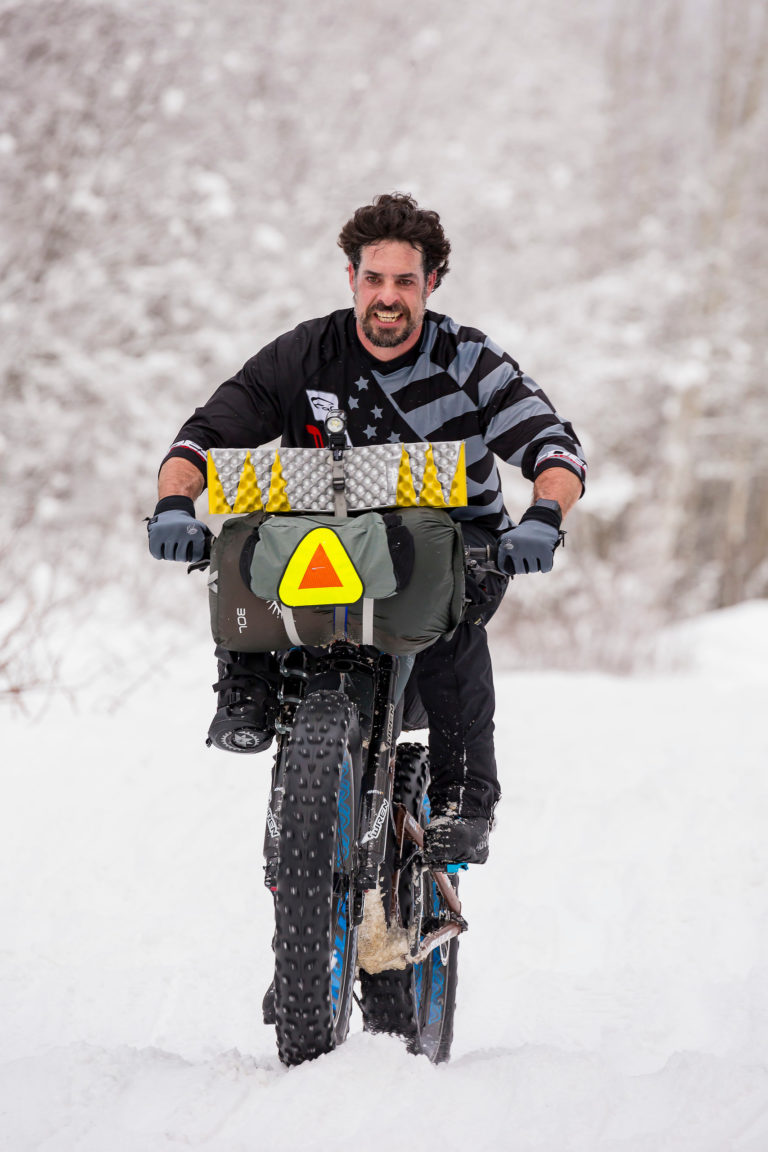
Wren Sports: Making all rides great rides
Wren Sports aims to make your ride the best it can be, and they know that great rides start with great components for your bike. Wren Sports’ background in successful product development means that you know that their components are the best they can be.
Wren Sports’ namesake is co-owner Kevin Wren, who worked in product development for Shimano, Cannondale, Bell Sports and others. Among his successes are iconic components like the CODA Magic Motorcycle cranks and Union Ti-Dye spokes.
Wren’s business partner is Russ Johnson, who hails from New Jersey. The two worked together at Shimano USA in southern California, where Johnson was Director of Communications for 13 years. After leaving Shimano to start Wren Sports, Johnson moved back east to be near his large extended family in New Jersey. Today Kevin Wren handles west coast operations, and Johnson covers the east.
Johnson explains why they chose his partner’s last name to be their brand name. “I wanted Wren from the start because it is unique and describes a small, nimble yet aggressive and tenacious animal. I liked the analogy to the company we hoped to form. Kevin was against it, but I convinced him.”
Johnson’s extensive background in marketing and advertising sealed the deal. “I also liked the short length and had a logo in mind,” he says.
Wren Sports are bringing some buzzworthy products to the Philly Bike Expo. Among them are their Inverted Suspension Forks for mountain and fat bikes. Johnson explains their advantages:
“The Inverted fork design simply works better. By inverting the fork so that the lighter stanchions are on the bottom, we reduce the mass of the moving part of the fork so that it will react quicker and easier to the trail. Inverting also anchors the stanchions into the stronger, larger upper tubes and crown making the overall chassis much stronger and stiffer. It also lowers the fulcrum point where the uppers join the stanchions compared to other fork designs decreasing the leverage factor. Inverting also positions the seals downward so that all kinds of bad stuff doesn’t sit on them and get pulled into your fork on every compression stroke.”
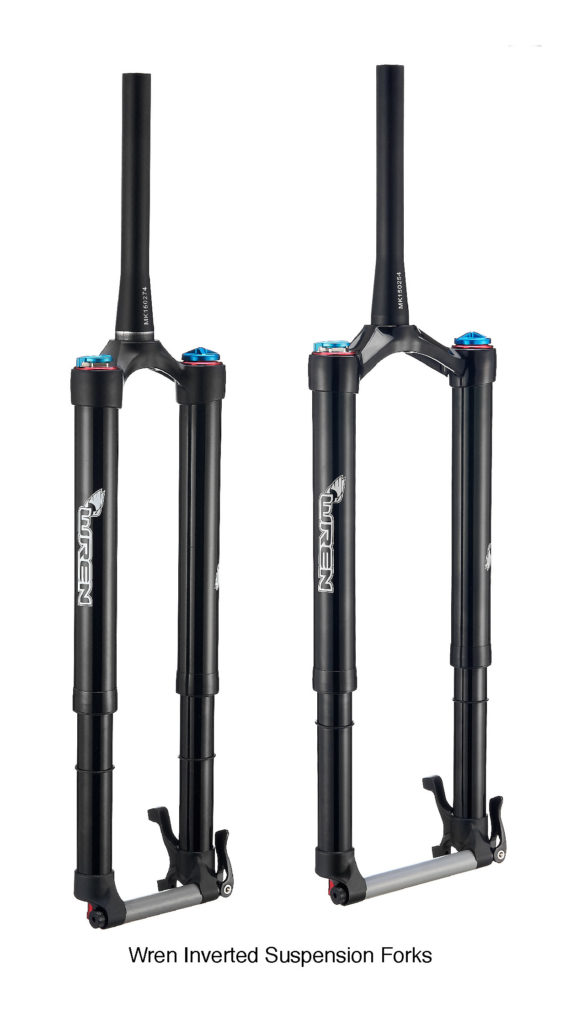
The Wren TwinAir System is designed to fine tune the ride of the fork using only your air pump. No disassembly of the fork is required. The TwinAir system is considered a single positive air chamber and is located at the bottom of the air side stanchion. Wren uses a floating piston to divide the area in half. There are individual air valves for the top and bottom chambers. By dividing the one large volume into two smaller volumes, the forces necessary to move the air are reduced, allowing the fork to begin moving easier and faster.
Johnson explains, “Because the piston floats, air pressure will equalize on either side of the piston as you add or release air, but the volumes of each chamber will change. More air in the top chamber will increase its volume relative to the bottom chamber and the fork will exhibit a more plush ride. If the bottom chamber volume is larger relative to the top, the fork will exhibit a stiffer, more progressive ride.”
Wren Inverted Suspension Forks are available in hub widths 100, 110, 135 or 150 mm. All hub widths available in either 110 or 150 mm of travel.

Wren Sports will also be displaying their Crazy Lightweight Alloy Stems for MTB and Road, which are the lightest stems on the market. They are 3D forged from AL7050 aluminum, superior to AL6061 for strength, hardness and rigidity. 3D forging is superior to CNC, and it strengthens the material and allows for better grain structure. A four bolt clamp distributes clamping force over a wider area. The stems are available in 6 degree or 17 degree versions, 31.8 mm clamp diameter, in a wide variety of lengths.
With a history of successful products and decades of bicycle industry experience, the folks at Wren Sports are dedicated to making all of your rides great ones.

VeloJawn is the Jawn for Your Jawn
Interview with Wanya Cave and Jerry Jacobs
by Taylor Kuyk-White
Through my day job with the Bicycle Coalition Youth Cycling (BCYC) program, I’ve worked closely with VeloJawn founders and owners Wanya Cave and Jerry Jacobs. Their dedication to Philadelphia’s cycling community, especially as expressed through their coaching the BCYC race team, is unparalleled. With an underlying motivation to forge job opportunities for BCYC youth and alum, and a core value of community coming to life as the BCYC race team uses the shop as its home base, Wanya and Jerry’s move to establish a bike shop in Philadelphia can be seen as an act of service.
It has been an absolute thrill to watch Wanya, Jerry, and the VeloJawn team go- in under a year- from hatching the idea of opening a shop to opening the doors of the hands-down most beautiful bike shop I’ve ever seen. Being able to join them for the ride through a sponsorship of the Philly Bike Expo Women’s Team – is the cherry on top. Here is their incredible story!
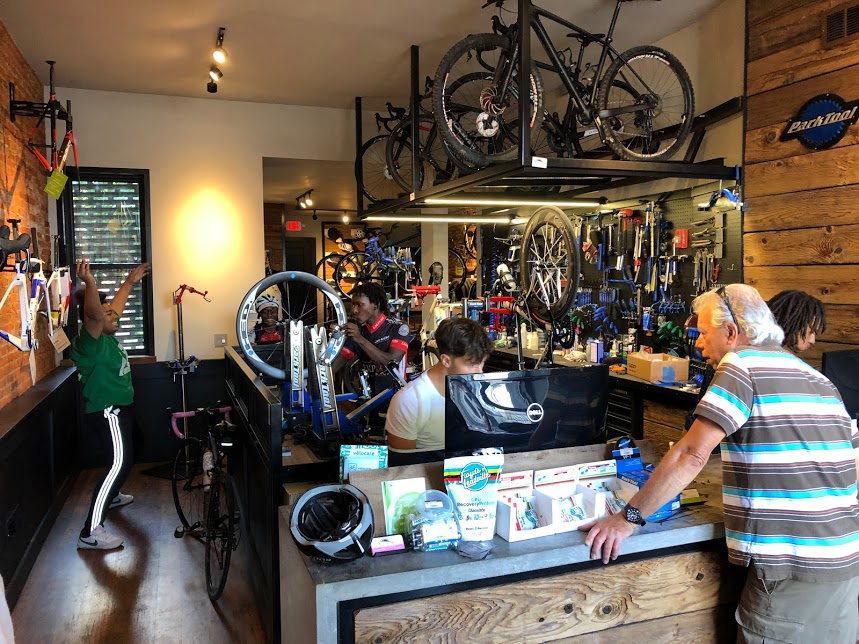
TKW: Wanya, tell us about yourself!
WC: I turned 25 at the Pottstown Bike Race! I grew up in various neighborhoods in Philadelphia: West Philly, Olney, North Philly, Southwest Philly. I discovered my passion for cycling at an early age. I started at Neighborhood Bike Works (across the street from our shop) by fixing and building bikes and learning how to be a mechanic. That led to mechanic’s position at some of the best shops in the area and working with some of the best people in the business.
I have dedicated myself to learning as much as I can and becoming the best mechanic that I can be. That means getting the best certifications and also staying as up-to-date as possible with online training modules.
TKW: What is your vision for the shop in 5 or even 10 years?
JJ: We want to be in the business for a long time and to build a world-class, but community- oriented shop. That begins with operating our existing, beautiful space in the best way that we can by making a lot of customers happy with great service and customized advice. We do have plans to expand our service and product offerings and also our physical space in the future. However, we want to do a great job with what we have first.
We believe that our customers and the marketplace will direct us as to how and when to expand. It is all about listening carefully to what our customers want, and what makes them happy. We are open and flexible. We will try a lot of things out, such as coaching offerings, group rides, demo days and other ways to connect with our customers and to provide value.
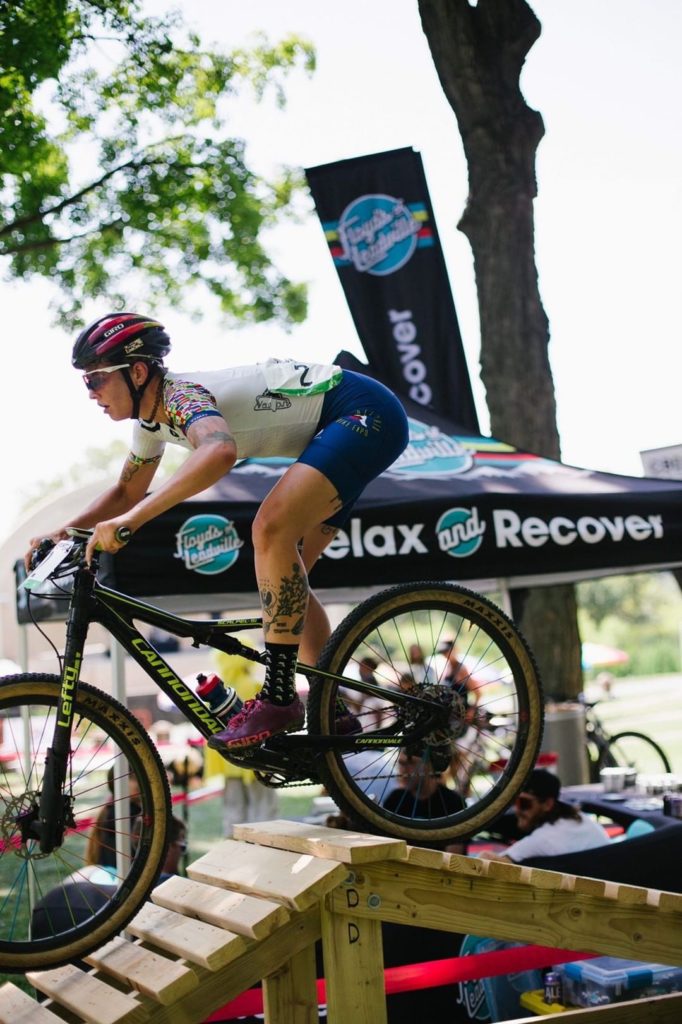
TKW: How did VeloJawn got started?
JJ: Wanya and I were traveling to a bike race in March 2018, as we had become good friends through our coaching together of the BCYC Youth Elite Race Team. He mentioned that he had “always dreamed of opening a bike shop”. I suggested that I might have the capital if we could come up with a sound business plan. We did a lot of research in the months that followed, about what the shop would be and how we would position ourselves.
We bought a great building in September, after a few months of not finding attractive space to lease. That actually turned into a blessing, as we were able to do a complete demolition and rebuild of the space the way we wanted it. We decided to go “all in” on the buildout, as we expect to be here for a long time and to be successful.
TKW: Tell us about the shop!
JJ: We start with our three pillars: advice, service and community.
Advice. We strive to be consultative and unbiased. That includes helping the customer find the very best product or service at the best price for their particular goals and budget. We do not “upsell” (sell a more expensive product when a more reasonably-priced product will meet customer needs).
Service. We provide fast turnarounds and top-tier service by top-tier, highly-trained mechanics. We help customers get the best value by explaining everything we do, and even how they can save money by doing a few things themselves in maintaining their jawn. That is why our mechanics area is in the middle of the shop whereby our customers can see what is going on and interact with our mechanics.
Community. We are deeply involved in our community. We are the official Race Team Headquarters, Coaches and sag support for the Bicycle Coalition Youth Cycling Team (BCYC). We stage at our shop for rides so that our athletes are ready to ride and that their equipment is properly maintained. We also support professional women’s racing by sponsoring the Philly Bike Expo Team. That includes financial support and providing world class equipment (Wilier Pro Bikes) so that our pros can focus on winning races and being the best that they can be.
We believe this positioning and focus is very different from a traditional bike shop that is seeking to sell what is on the floor and not necessarily what is best for the customer.

TKW: Now that you’ve overcome your biggest hurdles in getting the shop open, whats next?
JJ: In the near term, we are really focused on making customers happy and promoting our unique brand. It’s all about basic blocking and tackling. That is, getting customers to come in and see our beautiful shop and experience top-quality service and unbiased advice.
We are offering some fantastic deals such as a 50% off service special for first-time customers and promotional pricing on world-class bikes. We are highly confident that customers will like us once they experience what we can offer.
TKW: From the concrete-pour service counter to the reclaimed wood, the space is incredibly artistic! What inspired the interior design?
JJ: We are very fortunate to be deeply involved with the Philadelphia cycling community and to have a lot of talented friends. The contractors, led by Brian Kelh (Kelh Design), are all cyclists. They were able to take our concept of a welcoming, cool, open space and make it a reality.
Everyone is blown away with how beautiful and comfortable our space is when they first come in. We really achieved our design goals of making it beautiful, artistic but also a comfortable place where our customers, youth athletes and friends love to hang out. Even though we have recently opened, our shop is bursting with energy and activity every day.
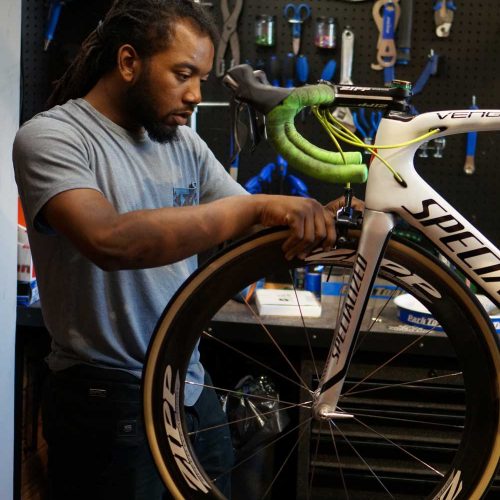
TKW: What is the shop’s relationship to the Bicycle Coalition Youth Cycling Program?
JJ: We are deeply involved with the BCYC Youth Program in many ways. First, we are dedicated coaches and life mentors for our athletes. Wanya Cave is the Head Coach and I’m the Head Masters Coach of the Race Team. Many other shop employees also assist in coaching duties. Secondly, we stage at our shop for team rides. That allows our amazing athletes to focus on training and racing. We want to take away the hurdles as they are properly hydrated, fed and have maintained equipment so we are ready to train. Finally, we provide a large amount of financial support for the race program and scholarship fund.
TKW: Why did VeloJawn choose to partner with the Philly Bike Expo?
JJ: We also wanted to support local professional racing. That goal became reality as we had an opportunity to sponsor and support the professional women’s team from the Philadelphia Bike Expo. We met the Wilier brand representatives at the Expo. That resulted in a great partnership whereby we could sell their amazing lineup of bikes in the shop, and also provide some of the best equipment in the world to lead riders, you (Taylor Kuyk-White) and Samantha Fox. You’re winning races on your beautiful and super fast Wilier Cento Pro 10’s, and also getting a lot of attention. We could not be happier with the partnership.

Doing Fine with i9
Taylor Kuyk-White and Sam Fox of the Philly Bike Expo Elite Women’s Team sat down for a chat with the folks from Asheville, NC-based component manufacturer Industry Nine. Freddie Kapel (East Coast Sales) and Clint Spiegel (Owner, aka El Jefe, Commander in Chief, the Don Dada) answered questions about the company’s history and vision, latest news and their sponsorship of the Expo and the Team.
Taylor: Can you tell me a bit about how i9 was born?
Clint: My first exposure to the bike world started in the early 90’s by making components for RockShox when they were being assembled in Asheville. After Rockshox moved to California, Cane Creek asked me to design a new type of fast engagement hub. I spent a couple years trying to pull that off, but failed in the mid 90’s. I was not a cyclist at the time, so after that attempt, I was pretty much out of any business related to the cycling world. Then, about 10 years later, I started cycling passionately, and every ride led me to think of new ways to create a fast engagement hub. I started experimenting and prototyping, and when I finally came up with a good idea that worked great, I decided to launch the company.
Taylor: Whoa! The idea rattled around in there for 10 years before first coming to the market? That’s impressive. While the gajillion points of engagement hydra hubs, wheel builds that make me feel like I’m surfing over rock gardens, and spoke patterns that look like candy rainbows are worthy of the hype – one of the things I really love about your company most is the commitment to manufacturing in the USA. Can you tell me more about this?
Clint: My father Harvey started the contract machining business when I was born. He built it up as a successful company through the early 90’s and then work turned to Asia and business was tough. I was involved in the company the whole time, but when I was full-time and out of college, the outsourcing to Asia was in full swing. We had about 50 employees that we considered family. We saw dozens of manufacturing facilities we did business with shut down and move production to Asia. We had personal relationships with all of these people as well, and we had a front row seat to see that devastation, how their lives were upended and reduced in quality. We of course lost the contract machining business from these factories that shut down and my father and I both worried about our future. One solution would have been to join the outsourcing craze. The future livelihood of us and our company would be protected, but many others would lose their jobs. Ultimately, all we could say was, “F*ck that.” We were going to stay in the business we knew, we loved making stuff, and we were good at it. Somehow, some way we were going to develop the methods and the businesses that would allow us to continue to manufacture in the states with the people we cared about. It was more than just our employees. The vision of a nation with a few well-off people and most with low-end jobs and less money, did not sound like a good idea. Our community and city would be less vibrant. Crime could increase. There is a social contract, there always has been, and we wanted to do what we could to make our local community better, because we live there. It seems obvious. Now, there is no benefit in carrying on such a belief system if it only leads to your ultimate failure. I clearly understand why so many companies need to produce with lower-cost overseas labor, but we were able to develop a product and were able to develop production methods that allowed us to thrive. Not everyone has that kind of product and not everyone has the vast manufacturing experience so many of us at i9 possess. We dug deep, got lucky, and made it work.
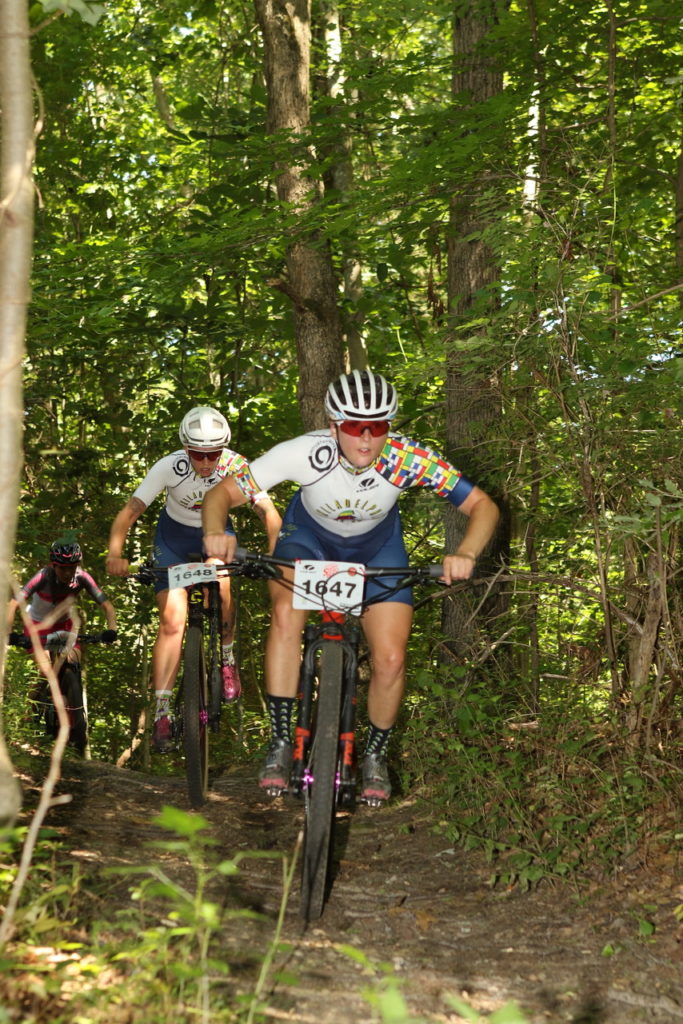
Taylor: How long have you been coming to the Philly Bike Expo, and what inspired you to take the leap to Sponsor this year?
Freddie: I believe this will be i9’s 3rd year, and it will be my 2nd! The leap to sponsorship this year happened pretty naturally. I had a wonderful time last year at the Expo, which was filled with a ton of great conversations with all types of cyclists. This is what moved me about the Philly bike scene. We have so many types of people in our industry and we will often run into people living in their worlds of “I’m not a mountain biker” or the “I’m not a roadie,” which is fine – you do you. However, not in Philly (I know it exists elsewhere) the vibe in Philly was “I LOVE BIKES – ALL THE BIKES!” During the event we had the opportunity to talk about mountain bikes, dirt jumpers, road, cross, gravel, touring, randonneuring, and commuting. This made me so happy and this energy was vibrating through the event.
I saw a post on Instagram about the opportunity to sponsor the Philly Bike Expo Women’s cycling team — another very important part of the industry we all agree needs more attention. I reached out expressing my interest and the interest of Industry Nine, letting them know that I believe we have similar goals and we could work well together to help bring attention to women’s cycling and our respective organizations. It just made sense to me. I would say it has been pretty clear that Sam and Taylor are badass at riding all the bikes and loving it. You all are awesome!
Taylor: Any highlights from our partnership this year?
Freddie: I have had a blast watching the team on social media. I can think of one photo of Taylor at Rasputitisa, which I heard was a brutal, cold, wet, and super tough race, and then there’s this amazing shot of Taylor grinning ear to ear, covered in what I can only think of as freezing cold mud- so good! Another one was the Tulsa Tough. I appreciated this event for a few reasons. The Philly crew did a great job of bringing attention to the sport, providing links and reminders about times and where to watch. My understanding was that this was a big race for you all, taking you a bit more out of your comfort zone and really laying it out there and going for it. It was very inspiring, and I believe this attitude helps encourage others. I also enjoy seeing Sam hop into the Mtn bike races and killing it! You all appear to have such a wonderful support group. There are certainly more, especially hilarious IG posts.

Taylor: What are you excited about at i9 right now?
Freddie: Right now I am very excited about our growth. Things are truly exciting right now, and I feel very lucky to be a part of such an incredible group of people during this moment in i9’s development. We have had a steady flow of new releases. Last year we released our new aero road line which has had great feedback. New TRA gravel wheels are super popular and our stem orders are flying in. Then our new HYDRA drive mechanism we released this year! Now i9 has a hub with only .52° of engagement! The phones were blowing up – things got crazy and very exciting – people wanted to know more. There is always something brewing around here, new product ideas, new events, new ways to interact with our customers. While we are growing it’s nice that we can all have a say and knowing that our feedback is being heard. All of those things to me, make for exciting times.
Sam: What is your favorite annual riding event (race/fondo/etc.) and which wheels do you choose to ride at that event?
Freddie: Aside from some local cross races, in the past I generally haven’t signed up for a ton of events. That’s starting to change; this year I signed up for the Asheville Gran Fondo and the Dirt Diggler. I can certainly keep you posted on how they go:) For the fondo, I will be riding the i9.45 carbon Aero Disc wheels. For the Dirt Diggler, I will be riding my cross bike that will be equipped with our ULCX 240 carbon.
Sam: What color combo do you have on your personal i9s?
Freddie: Well, like so many of us, I have lots of bikes and, working for i9, I am spoiled and have the privilege of equipping each of those bikes with our wheels. Currently the bikes getting the most attention are the mtn SS, road, cross and full suspension mtn.
My favorite set are the Trail 270 24H on my SS. They have pink hubs and rainbow spokes – they are beautiful and always make people smile!!! The cross bike has Pillar ULCX- purple hubs, purple nipples. My road bike is running i9.45 with purple hubs, and my adventure bike/hauler is running BC360 with blue hubs and blue spokes. My full suspension mtn has Enduro 310 24H with black hubs and orange spokes.
Taylor: Thank you so much Freddie and Clint! We can’t wait to see and ride with you at the Philly Bike Expo!
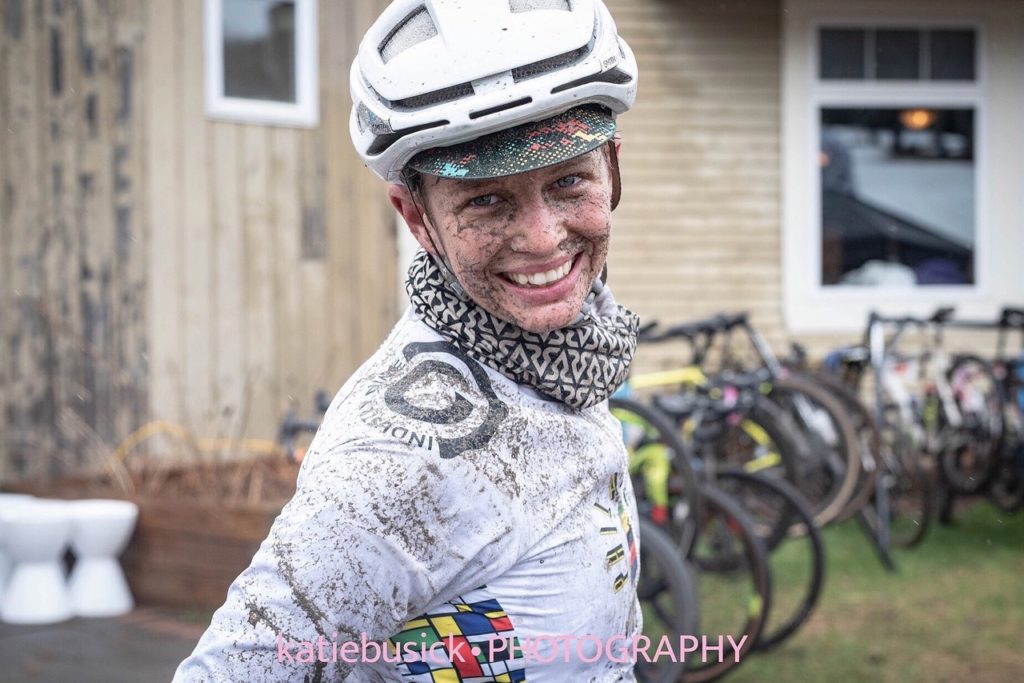
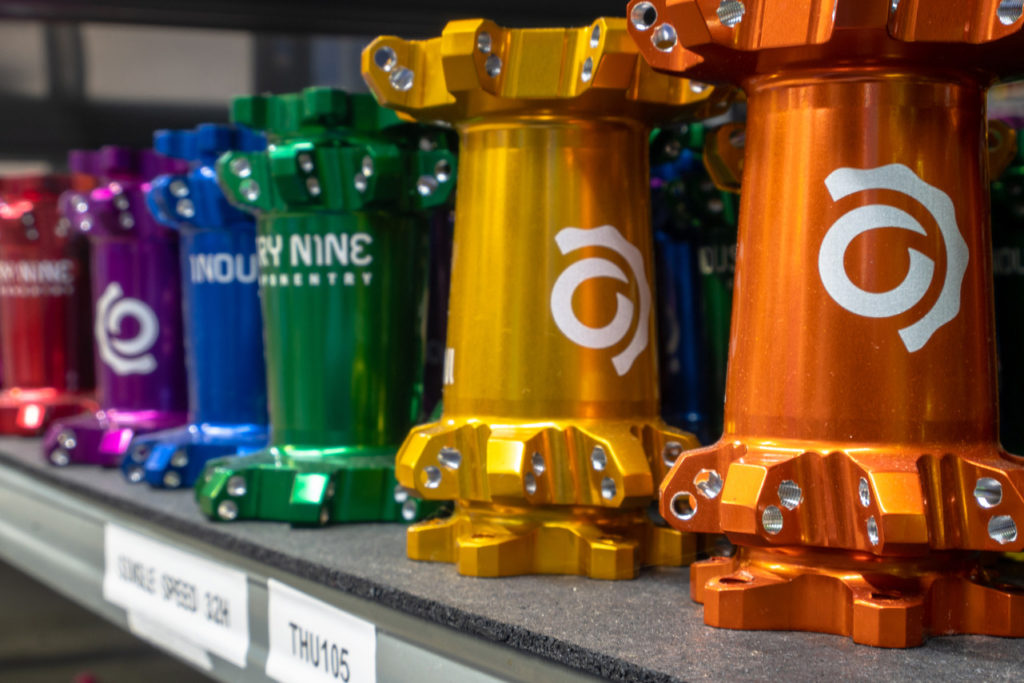

Rivet Cycle Works: Pressure Points
To be “on the rivet” is an old cycling term meaning giving it full exertion, almost to the point of breaking. It derives from the days when riders used riveted leather saddles, and with intense effort, the hips slide forward, leaving the cyclist’s posterior straddling the front rivet of the saddle.
Rivet Cycle Works produces saddles from leather and traditional metal rivets. They want you to ride hard – on the rivet, even – but remain comfortable in those sensitive areas. In fact, the company’s genesis has more to do with long days in the saddle and summiting storied mountain passes than it does with eyes-crossed intense efforts.
Debra Banks started Rivet in 2010 after a career in public education and a love for long distance cycling. Both experiences have been influential to Rivet’s development. From riding long distances, Banks came to appreciate the comfort of traditional leather saddles, with a few modern touches that relieve pressure. From her days helping students and teachers in public schools came an appreciation for the human touch.
“My education has helped me immensely with customers and production,“ says Banks, and she knows that saddles are a personal thing that no two people may find equally suitable.
“Helping people find the right saddle is my favorite part of this job,” she says. “It’s an individual experience for everyone and when it works, they’re on their bike longer and more often. That’s a win for them and good for the planet!”
There are six different Rivet saddles, each of them named after high mountain passes in Colorado and California that Banks has ridden over (she’s also a veteran of three Paris-Brest-Paris randonneuse races). The model names are: The Imogene, The Loveland, The Pearl, The Independence, The Diablo and The Sonora.
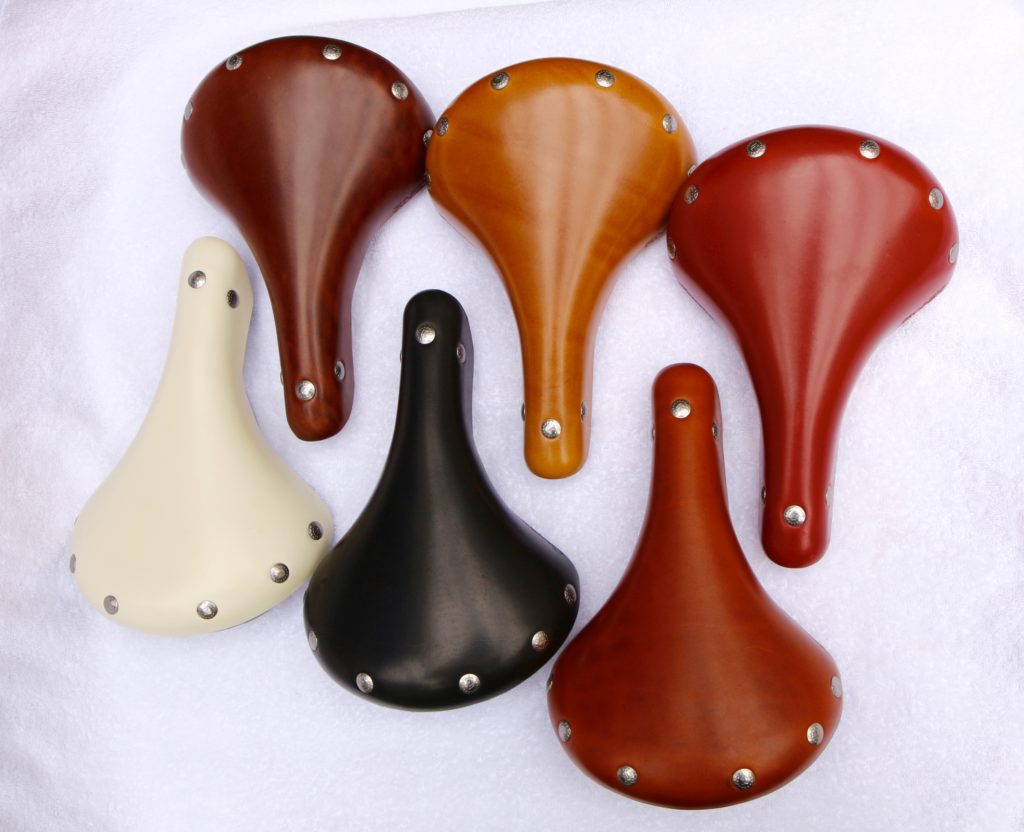
All of the models have the same traditional, classic look in various shades of brown, tan and black, but there are differences in width, shape and cut-out options. Rivet’s website offers a thorough guide to choosing the right model for your gender, body size and riding style/preferences.

Leather has applications for other cycling accessories as well, and Rivet offers high-quality leather grips and two models of handcrafted leather saddlebags. Reflecting Banks’ love of randonneuring, there are also some non-leather accessories offered for the long-distance cyclist, such as dyno hubs, bells, lights and leather waterproofing cream.
One thing is for certain: high-quality leather saddles will make long days in the saddle more comfortable, but it still won’t be an afternoon on the sofa. Nor should it be. Rivet finds that sweet spot of saddle bliss, where comfort and performance converge as in a Venn diagram.
“Firm but forgiving, our saddles will take you where you want to go, whether it’s around the block or around the world,” says Banks.

Ellis Cycles: Miles of Smiles
It’s tempting to call Ellis Cycles’ proprietor “Dave Ellis”, but then you’d only be 67% correct. His full name is David Ellis Wages, and his brand name comes from his middle name that was also his great grandmother’s maiden name.
Wages, who like many independent framebuilders wears many different hats, describes himself as an “owner, framebuilder, salesman and bookkeeper” of his one-man operation. He opened Ellis Cycles in 2008 after stints as a framebuilder for two of America’s most renowned and beloved frame shops: Serotta Cycles and Waterford Cycles. After moving to southeastern Wisconsin to work for Waterford, Wages stayed on in the area to open his own shop, located in the city of Franklin, a southern suburb of Milwaukee.
Maybe it was the idyllic, gently rolling countryside of Wisconsin that inspired Wages to plant roots there. He’s still an active rider who takes part in gravel grinders, and last summer he and his better half, Deborah, took a two-month bike journey to ride the Sierra Cascades from Mexico to Canada.
“It was by far the most amazing ride I’ve ever done,” says Wages.
Those miles in the saddle may take him away from his production routine, but for Wages the payoff in knowledge about his creations is well worth it.
“Riding my own bikes, and getting feedback from clients on their riding experiences makes me a better builder. I put so much thought in every detail of every frame, and that’s from riding lots of miles!” says Wages.
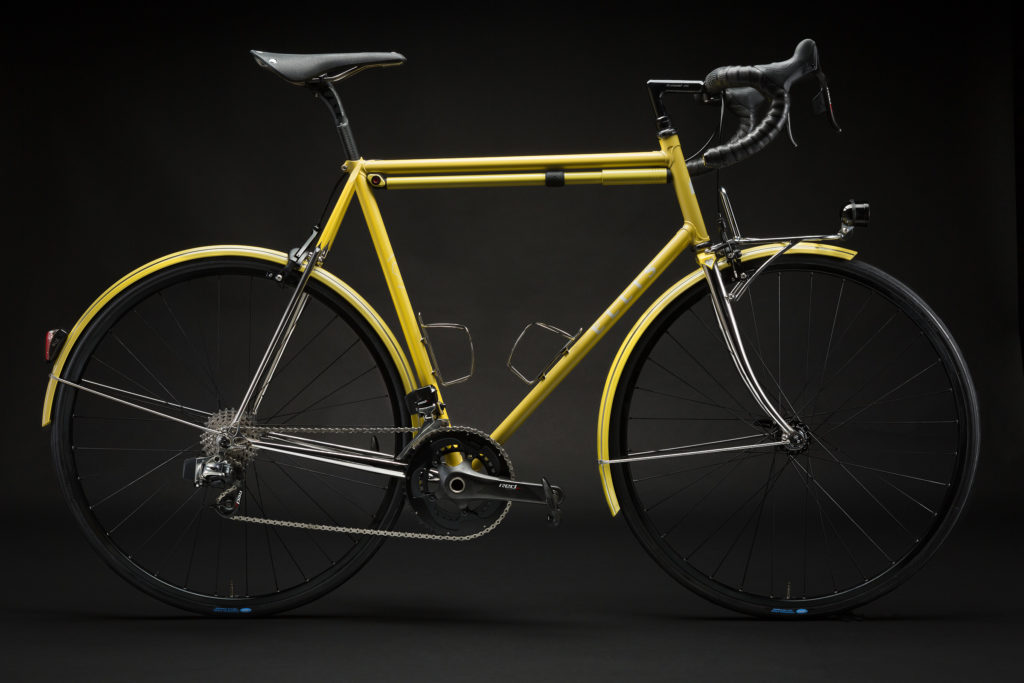
Those bicycles that Wages invests his heart, mind and experience into strike a finely tuned balance between traditional styling and modern, cutting-edge materials. The Modern Classic model blends the finest modern materials with classic styling for a finished product that is both stylish and functional.
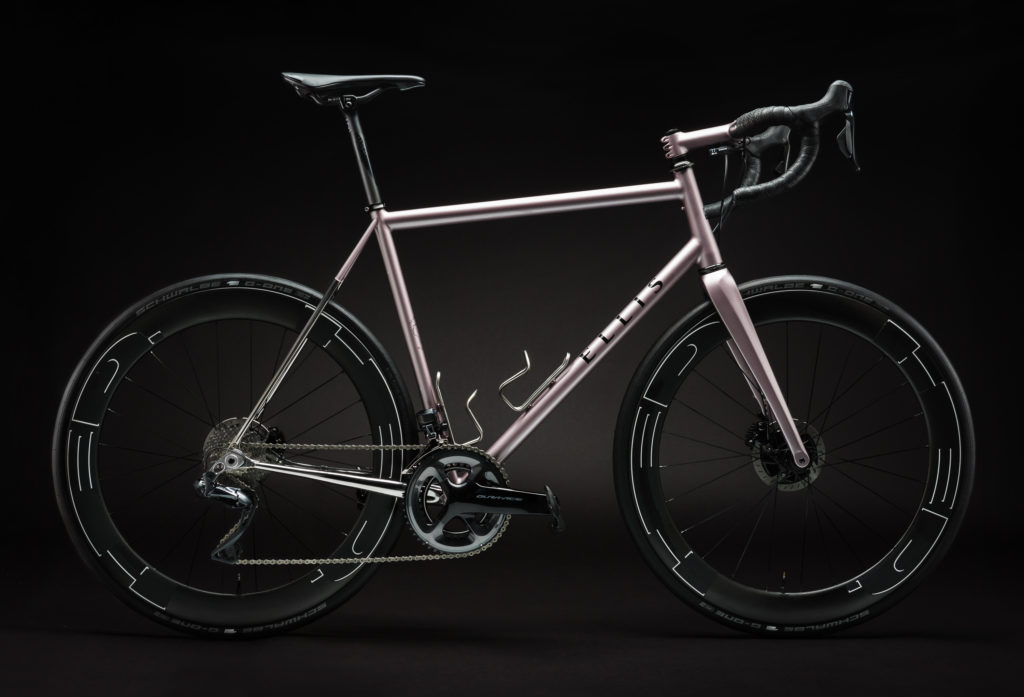
Wages’ penchant for gravel roads less traveled has inspired his Strada Fango gravel/adventure bike. It’s been constantly tweaked and updated since it was introduced at NAHBS in 2013.
2019 will mark Wages’ second visit to the Philly Bike Expo. His attention to details and commitment to quality evoke the same characteristics employed by the 1960s French school of framebuilders like Rene Herse and Alex Singer known as Les Constructeurs, whom Wages cites as major influencers of his craft.
But Wages doesn’t try to dictate his ideas and design concepts to his customers. The secret to the tall, soft-spoken builder’s success may be that he listens more than he talks.
“Each Ellis Cycle begins with a conversation between myself and the rider,” he says. “I don’t start cutting tubes or brazing until both of us are happy.”

Normal Bicycles: Buffalo Built
Buffalo, New York sits at the northeastern corner of Lake Erie, where the Niagara River begins its journey downstream to the famous falls, and is best-known for chicken wings, football and massive winter snowfalls. Like many Great Lakes cities, the heavy industries that built Buffalo struggled and left during the 1980s, leaving the city to redefine itself, which it largely has done over the past few decades.
Adding to the cliched urban renaissance tales of craft breweries and downtown arts districts is Normal Bicycles, which opened in 2018 in Buffalo’s Foundry District. Normal is an ironic brand name for a company that handcrafts bicycles from locally-sourced hard maple wood. It’s a material that helps Normal stand apart from the crowd of carbon fiber and metallic bikes that emanate from Asian factories.

Jess Vreeswijk Kudla started Normal Bicycles with her husband Chris, and they combined separate backgrounds in project management (Jess) and mechanical engineering (Chris) with a mutual love of bicycles and cycling to create a winning brand.

A husband and wife bicycle building team? That’s a bit unusual too. So what explains the run-of-the-mill brand name?
“The company is named after the street that we lived on when Chris first started working on designing the bikes, Normal Ave. It’s also a bit of a joke since wood is not normal at all,” says Jess.
Wood has many desirable qualities for bicycle construction – among them stiffness, light weight, and compliance (otherwise known as comfort). These attributes of wood have been incorporated in the construction of bicycle rims, and for the first five decades of the 20th century, shellacked wooden rims with handmade tubular tires glued to them were de rigueur for track racers that entertained large crowds at Six-Day races in major American cities, among them Buffalo.

But before you start believing that wooden bicycles are a trip down nostalgia lane, consider the high-tech, cutting-edge approach that Normal Bicycles takes to constructing bikes from this traditional material.
Hard maple wood makes up the majority of Normal’s frames, but some high-tech bits put this new company squarely in the 21st century. A thin sheet of carbon fiber lines the insides of the hollow wooden tubes, and the connection points for the components are made of aerospace grade aluminum alloy with titanium fasteners, for good measure.
Chris’ background as an engineer in the aerospace and automotive industries means that the latest technologies are in his design wheelhouse, and CNC cutting machines combine with a craftsman’s intuition to produce bicycles that bridge the gap between traditional and novel approaches to construction.
Normal offers complete bicycles, framesets only, and fully custom bicycles in their portfolio. Unusual for a small, new company, they can produce your frame or complete bike in as little as two weeks. After a deposit is received, the customer can watch their bike being produced at several waypoints in the process: photos are taken and posted at an individual portfolio for each new order.
What’s truly novel (and very cool!) is that once the bike is delivered to the customer, a QR code on the bottom bracket allows the customer to access this portfolio – essentially an online photo album of your newborn bike, preserved for (electronic) eternity.

The complete bikes are centered around the Urban Scout frameset, built to tackle the concrete jungle and available in single-speed or geared iterations. There are also adventure bike offerings, and the full-custom option allows you to design a bike that suits your specific needs and body measurements.
One thing that all Normal Bicycles include is a design ethic of rugged durability and a protective marine coating to keep out the elements – important considerations for use in a city that sees more than its fair share of snow, sleet and freezing rain.
As the Normal Bicycles website puts it, the bikes are born in Buffalo, after all.

Rotor America: Q for Quality
Rotor America is the U.S. outpost and distributor for Rotor Bicycle Components, a Spanish company in operation since 1919.
One of Rotor’s signature products is the Q-Ring, an oval chainring that has been widely adopted by the Euro pro peloton, and which comes in both 130 and 110 BCD and in aluminum and “Qarbon” iterations.

Rotor America’s website gives an evidence-based argument for the efficacy of oval chainrings as agents of increased power and efficiency, but also hints that the “Q” moniker may have an alternate meaning.
To paraphrase the website, Rotor knows that increased profits can be realized by switching to Asian production, but by keeping both production and R&D at their state-of-the-art facility outside Madrid, a complete commitment to quality is maintained.
That focus on quality is seen in not only the Q-Rings and InPower meters (direct force power meters integrated into crankarms), but also in the new 1×13 “Adventure Group” that offers a wide range of gearing options with the simplicity of a single front chainring.

“We’ve made the first 13-speed drivetrain on the market, with a derailleur that operates with a clutch system to swap back and forth from twelve to thirteen speed cassettes, and it can be used on mountain, road, and CX bikes alike,” says Martina Platte, Rotor America’s Market Support Specialist.
It’s not only quality in Rotor’s wheelhouse. Another focus on technological innovation led Rotor to offer the new 1×13 Ultimate Performance group that includes hydraulic-activated shifting and disc braking.

All of this innovation comes without a weight penalty, with a total groupset weight of just 1,785 grams for a group that includes a crankarm-integrated InPower meter. Standard setup is a 38-54t single front chainring with a choice of four rear 13-speed cogsets that range from 10-36 to 10-52.
2019 will mark Rotor America’s third visit to the Philly Bike Expo. Their six U.S.-based employees, all active cyclists, work from an office in Salt Lake City.
For more information about the full-range of high-quality, innovative, Spanish-made Rotor components, visit Rotor America’s website at www.rotoramerica.com.

Skin Deep
Master Soapmaker and Teacher Eryn Hughes returns for the second time to the Philly Bike Expo with her Apothecary Muse line of Pennsylvania-made adventure skincare made for your skin, your sport and your weather. Utilizing resources in exercise physiology to formulate increasing levels of care through the entire product line, you can have a semi-custom experience without burdening yourself with single use plastic or ingredients with questionable origins.
Founded in 2013, Apothecary Muse Adventure Skincare products are carefully formulated by an industry veteran and former professional cycling coach, with special focus on seasonal exposure, body chemistry and types of outdoor sports. All products are 100% vegan and packaged in compostable or reusable containers with eco-friendly ink, these products are safe for the environment and safe for your skin
PBE: What did you do before starting Apothecary Muse?
EH: In thebike industry, I’ve been a coach, buyer, mechanic, done sales, marketing, been a manager. In the health food business – I’ve done marketing and education.
PBE: Do you have any particular education/training/experience that prepared you for where you are now?
EH: I have certifications inSports Nutrition, Coaching, Wilderness First Aid, and Soapmaking
PBE: How did you choose your location or did it choose you?
EH: My family brought me to Pittsburgh.
PBE: What’s the derivation of your company name?
EH: Formerly DJ Muse, then founder of women’s mountain bike organization, VeloMuse, then Apothecary Muse; I’m always learning, musing.
PBE: What’s your favorite part of your work?
EH: The multi-sensory experience.
PBE: What’s your favorite ride/route/destination?
EH: Currently, I really like the afternoon rides that I can sneak in between errands to the bank or local deliveries.

Pratt Report
Established in 2017, returning exhibitor pratt Frameworks is a Rhode Island based bicycle company created by designer / maker Max Pratt. pratt Frameworks specializes in high performance steel bicycles for fixed-crit / velodrome racing, as well as cyclocross and road racing. Max Pratt is a framebuilder, metal fabricator, and furniture designer who studied at the Rhode Island School of Design. He designs furniture and bicycles with the same values in mind; simplicity, function, and elegance are at the heart of every pratt frame. pratt Frameworks designs each bike to be simple, elegant, and functional. Says Max, “We shed all unnecessary elements, to reveal a beautiful form and high performance bicycle hiding below. Our new line, including the basic track, basic road, and basic CX framesets, is an effort to simplify not only the design of a bicycle, but the process of having a custom fit. We believe that ordering a custom bike should be fun, simple, and fast. Each frame is made for its rider, and will last them for lifetimes to come.”
PBE What did you do before starting pratt Frameworks?
MP I make custom and contract furniture and woodwork, as well as contract and custom metal fabrication. A degree in furniture design from the Rhode Island School of Design gave me the skills, eye, and mind to get where I am today.
PBE How did you choose your location- or did it choose you?
MP I grew up in New England, but after school, Providence seemed like the place to be for me. With Brian Chapman nearby and a strong cycling community, the neighborhood my shop is in has a great history and a wealth of resources and good people.
PBE What’s the derivation of your company name?
MP My last name, Pratt, is the origin of our name. My family used to be under the name Rapaport, but my grandparents changed that name after coming to the US.
PBE What’s your favorite part of your work?
MP My favorite part of making bicycles is the look on someone’s face when they get their new frame. As far as the process, definitely pressing headsets.
PBE What’s your favorite ride/route/destination?
MP My shop is around the corner from India Point Park in Providence, which is the start of the East Bay Bike Path. This takes a rider from downtown Providence to the southern coast of Rhode Island and Newport. It is a coastal bike path and is really a wonderful ride.

Loyal/Royal
Medford MA, framebuilder Bryan Hollingsworth has been faithfully exhibiting at the Philly Bike Expo since the beginning. Founded in 2008, Royal H Cycles was at the very first Philly Bike Expo in 2010. It’s like we grew up together! Bryan has this to say about bikes, framebuilding, and his brand: “Royal H Cycles is about connecting people to their love of cycling. The bike is a means to that end. Anyone who has commissioned a bicycle knows this undeniable truth- that a custom bike is more fun to ride! The goal as a framebuilder is to offer a truly unique experience, not just the bike. Royal H Cycles is about inspiring people to be better riders and putting a larger smile on their face every time they ride. A custom bike is about creating a relationship between rider and builder that helps bring their vision for the perfect bike into focus. This vision is what is put into the tubes and lugs that are going to become their bicycle. Royal H Cycles is about the big picture as much as it is about the fine details.” Bryan goes on to say, “I have built track bikes that are shockingly fast, and touring bikes that are incredibly functional; road bikes that can handle a double century, and courier bikes for short sprints through city traffic; tri bikes for the amateur enthusiast, and racing bikes for seasoned athletes. Each frame as unique as its owner, and built with the same exacting levels of craftsmanship. If you love to ride, you will love a Royal H.”
PBE: What’s innovative, or distinctive, or otherwise special about a Royal H bike?
BH: The focus of Royal H Cycles is on custom steel frames and forks- the fit is a huge part of it, but so are the custom details. No two frames are ever the same. I now have a new line of Hollingsworth frames that feature unique, hand cut lugs that take this customization to a whole new level.
PBE: What did you do before becoming a framebuilder?
BH: Mechanical Engineer
PBE: Do you have any particular education/training/experience that prepared you for where you are now?
BH: My relevant framebuilding experience was learned at the United Bicycle Institute in 2006, with lots of training picked up during the subsequent years as a finsher/carbon framebuilder at Seven Cycles.
PBE: How did you choose your location or did it choose you?
BH: I certainly didn’t choose it based on low rent! There is a rich history of framebuilding in the Boston area, stemming from older companies like Merlin, Independent Fabrications, Seven, etc. Many small builders came out of those shops, and the community was really supportive and amazing when I started building, and it was impossible to leave!
PBE: What’s the derivation of your company name?
BH: The “H” in Royal H Cycles is from my last name, Hollingsworth. The royal is a little tongue and cheek, but it plays into the Latin on the original head badge- “disce ferenda pati.” Meaning, more or less, “learn to suffer.” Perfect for riding and building!
PBE: What’s your favorite part of your work?
BH: The brazing is pretty fun, involving fire and all, but the final assembly is pretty satisfying (especially when all of your parts are in stock and ready for you to build up!).

Adapt and Overcome
Disabled Sports USA was established in 1967 to improve the lives of veterans and the differently-abled of all ages through sports and recreation. In addition to cycling, over 50 different sports are offered, including alpine and Nordic skiing, snowboarding, biathlon, kayaking, water skiing, sailing, scuba, surfing, rafting, outrigger canoeing, fishing, hiking, golf, athletics, archery, running/wheeling, rock climbing, equestrian and others.
Disabled Sports USA
serves those with visual impairments, amputations, spinal cord injury, multiple sclerosis, head injury, cerebral palsy, other neuromuscular/orthopedic conditions, autism and related intellectual disabilities.
The sports opportunities that Disabled Sports USA provides are transformational for participants, highlighting the human potential embodied in the organization’s motto: “If I can do this, I can do anything!”
Headquartered on historic Boat House Row, The Pennsylvania Center for Adapted Sports is the local to Philly chapter of Disabled Sports USA, and Jeff McGinnis is the Executive Director. I asked him a few questions to learn more.
PBE What did you do before this?
JM I’ve been involved in sports for people with disabilities for over 30 years, and have founded a few programs.
PBE Did you have any particular education/training/experience that prepared you for your current position at PA Center for Adapted Sports?
JM Prior to becoming the Executive Director, I was a furniture maker and owned a small visual and product design company. But my parallel track was volunteering as a coach or trainer in sports for people with disabilities.
My initial experience was in college, working with some kids in a swim program. After graduation, I continued staying involved through volunteer work. I began coaching in adaptive rowing, then in skiing. When Fairmount Park closed MLK to car traffic on weekends, we (PA Center for Adapted Sports) were able to start our cycling program. The cycling program has expanded to three locations. By the way, we are always looking for volunteers to share their love of cycling with people with disabilities!
PBE What’s your favorite part of your job?
JMA couple of things. Our amazing volunteers, our incredible participants, and athletes who refuse to take no for an answer. Generally, people who refuse to go with the status quo. There would be no adapted sports for people if someone hadn’t refused to accept the conventional wisdom about what people with a disability could or should do. It still happens, but that’s what gets me inspired, breaking down the barriers to participation in our community.
PBE What inspires you?
JM Seeing someone learn to ride with us, and then progress to riding independently.
PBE What’s your favorite ride/route/destination?
I commute by bike almost daily. I love my commute, it uses part of the Schuylkill trail.

Kids Today
The National Interscholastic Cycling Association (NICA) was started in 2001 in CA with the mission of building strong minds, bodies, character, and communities through cycling. There are now 25 leagues across the country, and many clubs within each state’s league. The Camden County Mountain Bike Crew is one on the growing list of clubs in the NJ league. Joe Brescia is Team Director of the Camden County MTB Crew. He also teaches Engineering Robotics at Eastern Regional High School in Voorhees, NJ.
PBE Did you have any particular education/training/experience that prepared you for your involvement with the CC MTB Crew?
JB As far as training goes, I am a certified Level 2 coach by NICA and also teach grades 9-12 on a daily basis. These will both kind of prepare you, but it also comes with just having riding knowledge and being involved with the right group of people to recruit really good coaches to help work with the students.
PBE How many riders are on the team?
JB We have 14 riders this year
PBE What’s their age range?
JB 11 – 18 years old Female/Male
PBE What’s your favorite part of your work?
JB I love seeing students having fun challenging themselves in this sport. They just see it as getting dirty and riding bikes with other kids. They don’t see the possible future and other benefits that come from riding and racing. You see students struggle with some trail section or a certain technique and then one day the light bulb goes off and they’re able to nail it. For a few students, it was just having the strength and endurance to finally finish a race. Oh, and the races are amazing. Talk about a professional setup with a super inclusive atmosphere. It’s pretty amazing.
PBE What are some of the challenging aspects of a youth cycling team?
JB There are many challenges. We have students of all different riding backgrounds, abilities, home lives, financial obligations, transportation, etc. It’s all about doing whatever it takes to get the students out on bikes. Funding the program takes a lot of effort in order to keep bikes maintained and having everything needed to run the team, but we make it work as a group.
PBE What inspires you?
JB We have a saying, “I wish this was around when I was in school.” That drives us to give this opportunity to any student that wants it. A bunch of us know how riding has benefitted our lives and that would’ve been amazing if it were around 20 or 30 years ago.
PBE What’s your favorite ride/route/destination?
JB I like riding to someplace new and exploring. Whenever there can be an adventure, there’s fun not too far behind.
PBE 2018

Adapt and Overcome
Disabled Sports USA was established in 1967 to improve the lives of veterans and the differently-abled of all ages through sports and recreation. In addition to cycling, over 50 different sports are offered, including alpine and Nordic skiing, snowboarding, biathlon, kayaking, water skiing, sailing, scuba, surfing, rafting, outrigger canoeing, fishing, hiking, golf, athletics, archery, running/wheeling, rock climbing, equestrian and others.
Disabled Sports USA
serves those with visual impairments, amputations, spinal cord injury, multiple sclerosis, head injury, cerebral palsy, other neuromuscular/orthopedic conditions, autism and related intellectual disabilities.
The sports opportunities that Disabled Sports USA provides are transformational for participants, highlighting the human potential embodied in the organization’s motto: “If I can do this, I can do anything!”
Headquartered on historic Boat House Row, The Pennsylvania Center for Adapted Sports is the local to Philly chapter of Disabled Sports USA, and Jeff McGinnis is the Executive Director. I asked him a few questions to learn more.
PBE What did you do before this?
JM I’ve been involved in sports for people with disabilities for over 30 years, and have founded a few programs.
PBE Did you have any particular education/training/experience that prepared you for your current position at PA Center for Adapted Sports?
JM Prior to becoming the Executive Director, I was a furniture maker and owned a small visual and product design company. But my parallel track was volunteering as a coach or trainer in sports for people with disabilities.
My initial experience was in college, working with some kids in a swim program. After graduation, I continued staying involved through volunteer work. I began coaching in adaptive rowing, then in skiing. When Fairmount Park closed MLK to car traffic on weekends, we (PA Center for Adapted Sports) were able to start our cycling program. The cycling program has expanded to three locations. By the way, we are always looking for volunteers to share their love of cycling with people with disabilities!
PBE What’s your favorite part of your job?
JMA couple of things. Our amazing volunteers, our incredible participants, and athletes who refuse to take no for an answer. Generally, people who refuse to go with the status quo. There would be no adapted sports for people if someone hadn’t refused to accept the conventional wisdom about what people with a disability could or should do. It still happens, but that’s what gets me inspired, breaking down the barriers to participation in our community.
PBE What inspires you?
JM Seeing someone learn to ride with us, and then progress to riding independently.
PBE What’s your favorite ride/route/destination?
I commute by bike almost daily. I love my commute, it uses part of the Schuylkill trail.

Kids Today
The National Interscholastic Cycling Association (NICA) was started in 2001 in CA with the mission of building strong minds, bodies, character, and communities through cycling. There are now 25 leagues across the country, and many clubs within each state’s league. The Camden County Mountain Bike Crew is one on the growing list of clubs in the NJ league. Joe Brescia is Team Director of the Camden County MTB Crew. He also teaches Engineering Robotics at Eastern Regional High School in Voorhees, NJ.
PBE Did you have any particular education/training/experience that prepared you for your involvement with the CC MTB Crew?
JB As far as training goes, I am a certified Level 2 coach by NICA and also teach grades 9-12 on a daily basis. These will both kind of prepare you, but it also comes with just having riding knowledge and being involved with the right group of people to recruit really good coaches to help work with the students.
PBE How many riders are on the team?
JB We have 14 riders this year
PBE What’s their age range?
JB 11 – 18 years old Female/Male
PBE What’s your favorite part of your work?
JB I love seeing students having fun challenging themselves in this sport. They just see it as getting dirty and riding bikes with other kids. They don’t see the possible future and other benefits that come from riding and racing. You see students struggle with some trail section or a certain technique and then one day the light bulb goes off and they’re able to nail it. For a few students, it was just having the strength and endurance to finally finish a race. Oh, and the races are amazing. Talk about a professional setup with a super inclusive atmosphere. It’s pretty amazing.
PBE What are some of the challenging aspects of a youth cycling team?
JB There are many challenges. We have students of all different riding backgrounds, abilities, home lives, financial obligations, transportation, etc. It’s all about doing whatever it takes to get the students out on bikes. Funding the program takes a lot of effort in order to keep bikes maintained and having everything needed to run the team, but we make it work as a group.
PBE What inspires you?
JB We have a saying, “I wish this was around when I was in school.” That drives us to give this opportunity to any student that wants it. A bunch of us know how riding has benefitted our lives and that would’ve been amazing if it were around 20 or 30 years ago.
PBE What’s your favorite ride/route/destination?
JB I like riding to someplace new and exploring. Whenever there can be an adventure, there’s fun not too far behind.

Vicious Cycles: Built to be ridden
Every bike should find its true calling on the road, the single-track trail, the boards of the velodrome or any surface in between. Even a master craftsman builder like Richard Sachs has long held the opinion that a bicycle is a tool – an object that offers the rider both pleasure and pain, frustration and victory – and not a precious item too delicate to soil with road grime, and which finds its purpose hanging on a living room wall or inside the glass case of a museum.

Vicious Cycles’ proprietor Carl Schlemowitz, who builds from his studio in New Paltz, New York, in the beautiful Hudson River valley, also subscribes to this philosophy. So when we write that his bikes aren’t too pretty to spatter with mud from a springtime trail ride, it’s not a knock at any lack of form or aesthetics, but an affirmation of any bicycle’s true purpose: to deliver the rider to the end of her ride or race with a smile on her face, a rush of adrenaline, and maybe even her arms lifted in victory.
Schlemowitz will build you a bike for the trail, the road or the cyclocross course, but unlike many other builders who make “catch-all” all-road bikes, Vicious offers 12 different models to suit your specific needs. Mountain bikes predominate the offerings, with 29-er, full-suspension, and women-specific geometries available. But in addition to the aforementioned road and cyclocross models, the Jeepster 29-inch wheeled tandem and the Casual Agent fully-loaded touring bike keep the line-up interesting and unique. Vicious will build frames from Reynolds 853 steel tubing, and for some models, 3/2.5 titanium tubing is an option.

Photo: Brad Quartuccio
Unusually for many builders these days, paint is handled in-house, and for a frame shop with a name like Vicious Cycles, you can believe the paint job offerings are unique and eye-catching. There are a number of stock paint options in stately and more reserved hues, but for an upcharge, the Vicious Cycles team encourage you to design your own scheme, and however outrageous your tastes run, they can likely match your desires.

With his company offering custom paint, it might seem odd that Schlemowitz brought an unpainted, titanium model mountain bike with him to this year’s Philly Bike Expo, but Vicious is part of a relatively small fraternity of builders who work with titanium. Like all Vicious Cycles models, this bike’s head tube was adorned with the company logo based upon Schlemowitz’s dog Shayla.

Also like any Vicious Cycles bike, this one was made to ride, searching for the lucky owner to liberate it from the confines of the show floor and allowing its tires to meet the dirt of the trail, its natural and native habitat.

All Roads Lead to Homes
Founded in 2003, Bike & Build takes volunteers ages 18-28 on cross-country service-oriented cycling trips. Along the way, rider teams stop about every fifth day to offer hands-on help at an affordable housing build site. Bike & Build’s mission is to raise awareness about (and funds for) the cause of affordable housing. Through education, training, and experiential learning, Bike and Build empowers young people to be advocates in their communities. I corresponded with Director of Outreach and Alumni Relations Lily Goldberg, (and an alumna of Bike and Build herself) to learn more:
PBE How does Bike & Build find volunteers? Is it mostly by word-of-mouth?
LG Our number one recruiter is word of mouth. People find out about Bike & Build through friends, family, acquaintances, people that they have been friends with on FB for forever. Beyond that, we do outreach to affordable housing organizations, schools, cycling groups, and many other organizations.
PBE How many applicants does Bike & Build generally receive? How many make the cut?
LG It depends on the year – just about everyone that applies will be enrolled as long as they do it in a timely manner. We have had years with wait lists in the past, but like I said, it just depends on the year.
PBE It seems that most (all?) of your volunteers don’t come from a cycling or construction background- what are some of Bike & Build’s best motivators when the going gets tough?
LG The majority of our riders and leaders do not come from cycling backgrounds. That’s why training is an important aspect of our program. In addition to that, I think a lot of our riders would agree that after a couple of weeks into the trips their legs start really growing stronger and are ready for an entire summer of biking. When the routes get tougher (deserts, mountains, stretches of the country with little resources) our teams really come together and become each others biggest motivators. Keeping morale high can be tough some times, but at the end of the day our teammates keep each other going.
When I rode with Bike & Build back in 2015, we hit a stretch that was pretty barren and hot. During a route meeting, one of my teammates reminded us that we all signed up to do Bike & Build for a reason. And that we made this decision for ourselves. Bike & Build is for a greater good and reminding myself of that on long, hard days was a grounding mantra that I repeated many times as I continued pedaling.
PBE Do Bike & Build alumni continue to be serious about cycling? (For example: Keeping up with training? Being involved in a cycling club or participating in group rides or races?)
LG Lots of our alumni continue cycling after Bike & Build. Whether it is commuting, longer tours, mountain biking, racing, or anything else. Bike & Build gives people the confidence and safety training to continue being safe and dedicated cyclists – and many people put themselves out there to continue learning about bicycles, teaching others, advancing cycling infrastructure, and more.
PBE Does the Bike & Build experience affect alumni’s education/career trajectory?
LG Many Bike & Builders find B&B to be an empowering and life changing adventure. Many alumni go on to work in the nonprofit/affordable housing sector, bicycle organizations, AmeriCorps, PeaceCorps, etc.
From my own personal experience, I can speak to the fact that Bike & Build helped me hone in on my passions. I returned from my summer invigorated and excited to do more – I went on to intern at Habitat for Humanity Philadelphia, a community development org in Philly, volunteer more often, and work at Bike & Build, allowing me to foster this experience for other young adults.

Proving Her Metal
If you can dream it, artist/designer/metalsmith Jen Green can create it out of metal and your bike can wear it! The crowning touch to personalize your ride is a custom head badge from Revolution Cycle Jewelry From her shop on Philadelphia’s famed “Jeweler’s Row”, Jen crafts bicycle-themed earrings, pendants, and more, as well as traditional and not-so-traditional fine jewelry for any occasion and to suit any taste.
Where/how did you get your training in metalwork/jewelry arts?
I have a Fine Arts Degree, with my concentration in Jewelry/Metalsmithing from Towson University. Prior to graduation I started working a few days a week with a local jewelry artist. Laurie had her own line of silver pins and pendants she made mostly of cartoonish dog and cat figures. My primary job was to cut or “pierce” out dozens of these shapes that she had traced onto a 6″ square sheet of silver. So I got a lot of practice with cutting early on in my career.
Were bicycle-themed elements always part of your designs? (if not, when did you introduce them?)
Since I am a jeweler by trade, the cycling aspect only came into my work when I started making the head badges as a side business. I was asked to make a badge by a good friend of mine for his custom Moots single speed. At that time, I guess 14 years ago or so, there weren’t any local Moots dealers, so he had ordered the frame through a mail order company called Speedgoat. Speedgoat would then custom build the bike and deliver it. They often post photos of the builds on their website. So they posted his Moots frame with my custom badge on the front and thats how it all started. People saw that and followed the link to me and I started taking orders for custom badges.
How/when did you become the go-to person for custom head badges?
I think just sheer volume of the work over the past 15 years, and my website name of headbadges.com coupled with the exposure that social media and the Internet has done has expanded the audience. Plus, since I have so much experience now over the years honing my skillset, it shows in the work I can create and the limits can be constantly pushed.
What’s your favorite part of the design and/or construction process?
The interactions I have with the clients is a big part of it. If we ever have a chance to chat on the phone, its ALWAYS back to the bikes we are riding and the fun we have on our local trails or roads. The cycling community is amazing. I love the construction and process of the build. The challenge of making an image work in metal and at such a tiny scale. Its a multi faceted type of work. I enjoy everything about it!
Where do you find inspiration?
It has to start with the client, its custom work after all. Most inspiration hits me at odd times. If there’s a complex project on my plate, I usually need a few weeks or so to let it percolate before the process can happen. I have no real control over it- I wish I did! Taking breaks on the bike or walking my dogs is usually a great way to let my mind wander and think and problem solve.
What’s your favorite ride/route/destination?
So many, I used to love riding in the Wissahickon and Belmont Plateau, but now that I live out of the city I’m usually riding Marsh Creek, White Clay/Middle Run. I ride a fixed gear on Kelly Drive most days. I like to leave my shop and ride out to the Falls bridge and back. Its a great start to the day. I also love riding the country roads around my house in Chester county. Lots of huge farms and empty road. Great fun. I’ve ridden bikes all over Colorado, Utah, California, Oregon and Vermont. I still love my local spots though.
Do you listen to music while you work? if yes, what kind?
MUSIC! So much music, all day long.Its one of the best things about my day. I usually have different Pandora stations on so its shuffling stuff. Lately its been more mellow Peter Gabriel, Sting, 80s kinda stuff. Sometimes its more like Rise Against and Silversun Pickups or Jawbox or Biffly Clyro. All kinds of stuff.
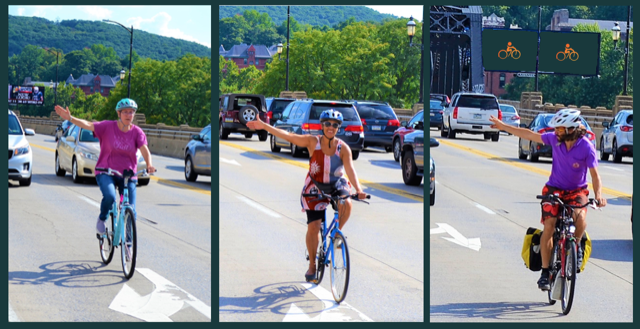
Defining What’s Appropriate
Professional Engineer turned Executive Director of Lehigh Valley CAT (the Coalition for Appropriate Transportation) Scott Slingerland is at the forefront of changing hearts and minds towards a greener future. Since the organization’s inception 24 years ago, CAT has sought to educate the public and influence “the powers that be” to achieve an internal and external landscape where cyclists, pedestrians, transit riders and motorists can respectfully coexist. I was intrigued by Scott’s story and the important work he’s doing at CAT. I asked some questions. Here are his answers.
PBE Is your position at CAT full-time? Do you freelance as a PE? (From Engineering to non-profit/advocacy is a big career change- What prompted the switch?)
SS I am full-time at CAT, but we have a great core group of volunteer leadership as well. I previously worked as engineer on burners/emissions controls from large power plants burning fossil fuels (prehistoric until you consider that 10 years ago, 50% of the U.S. electricity generation was coal). I left that world 10 years ago because I saw the need to simplify my own life, to make changes to shrink the scale of my daily life and energy consumption. What I discovered is a tremendous richness that lies within the towns, neighborhoods, and people that I previously passed by when driving my car. Since letting go of my car and my house, I feel more adaptable to changing daily needs. I have a good place to live, but I no longer feel ridiculous for cultivating a large lawn just to look at.
I still get to interact with engineers and planners through CAT’s work with PennDOT, Lehigh Valley Planning Commission, and regional/local transportation projects. Transportation engineering is a very interesting world, because it involves so much public behavioral input. Types of street designs, the adjoining buildings, and natural features create a vibe. This vibe influences peoples’ relationship with the space that subconsciously affects the speed they drive. Bottom line, if traffic engineers and planners can create more richness and fewer wastelands, drivers will slow down and people feel more comfortable walking and bicycling. If there is a place for speed, let it be on the interstate highways.
Our biggest job at CAT is to create a culture of cooperation between people driving bicycles & cars, walking, and riding the bus. This starts with individuals understanding the law and their rights, but just as important is the opportunity that bicyclists and pedestrians have to clearly communicate their intent to work with motorists. Every single time I ride my bike, I have multiple opportunities to acknowledge motorists with a friendly wave, to use my lane position and signals as indicators to (a) invite motorists to pass me, or (b) tell them that we need to be patient and wait 10 seconds. A course that we teach locally is CyclingSavvy, which details many strategies for a behavior shift.
PBE Can you describe a typical day “on the job” at CAT?
SS A typical day at CAT doesn’t really exist. Three days a week, we open the CAT bicycle cooperative to the public – a space for youth and adults to demystify their bicycles. People come in because they can earn a bike through volunteering, or even if they buy a new bike from a bike shop – they want to learn mechanics or on-road strategies. The other four days of the week involve local advocacy visits such as testing traffic signal detection for bicyclists, pedestrian crosswalk improvements, supporting our adopt-a-bus stop volunteers keeping it clean with 2,500 bus riders per day. Our team also studies local bicycle/pedestrian crashes-to respect the victims by learning crash causes to inform our outreach. And all this doesn’t even speak to organizing LVBike2Work Week in May or our youth bicycling education in schools which covers most of April-June and reaches ~3,000 kids per year.
PBE What’s the first thing you tell someone who is trying to decrease their car dependency?
SS My first suggestion would be, try to live without your car for one day on a weekend, like a Sunday. Instead of staying in bed all day, plan a short local adventure of 5-15 miles. Ride to a neighboring town for lunch, and stop on the way back to visit a friend who doesn’t know you’re coming. This is the essence of car-free or car-lite living. Planning trips to be efficient and multi-purpose.
PBE Do you have a ready reply to the “haters” who are so entrenched in car culture that they’re resistant to alternatives?
SS I don’t find many haters. I have many car-aficionado friends who are also cyclists. I meet car-drivers every day in parking lots who say, “that’s great you’re riding a bike”, “wish I could too”, “I used to ride a bike all over and it was enjoyable”. The biggest haters are car drivers who resent bicyclists who get away with violating traffic laws, or those don’t understand why a bicyclist would ride in traffic because they’ve seen too many crash stories. They don’t realize that driving in a car is pretty dangerous too, and in both cases the danger can be mitigated by knowing the leading crash causes. Riding with clarity and confidence can coexist with humility – this can disarm the haters.

Sister Sassy
One size- or style- does not fit all, and although times are changing, women continue to face challenges when it comes to cycle wear. “Find a need and fill it,” the saying goes. As is the case with many start ups, Rebecca Redett’s own needs sparked her entrepreneurial spirit. She founded Sassy Cyclist to create the clothes she wanted to ride in.
PBE Do you have any background/education/training in sewing and or fashion design?
RR No, not at all! I am a former nurse-midwife and spent my former career in healthcare. The idea for the company came from a love of cycling (and a dislike of the typical cycling apparel). My friends and I used to make a team jersey for an annual charity ride. And while we loved our own graphics, we weren’t so thrilled with the actual garment. So I decided to go ahead and try to make one we’d love! We were the Sassy Sisters so my company became SassyCyclist.
PBE How did you find/choose the company that manufactures the Sassy Cyclist line?
RR The first batch of jerseys was made in the garment district in NYC. Through a stroke of Google, I found a sportswear apparel manufacturer in Baltimore, where I live. Every subsequent collection and the development of new products (sleeveless style, headbands, and arm warmers) have been made at this local company. Its close proximity, 8 miles from my house, allows me to visit when I need to meet with the staff, deliver supplies, check on samples, and pick up the final products. I’ve learned a lot about cut and sew clothing production from these factory visits. And I like being involved at all stages of production.
PBE Did you start by making prototypes/one-offs? How long did it take to get to the production-run stage?
RR Yes, I made several prototypes, had to tinker with the fit and make adjustments along the way. It took a little over a year from the idea to the first collection of jerseys.
PBE What’s your favorite part of running your business?
RR Bike riding (I consider it part of my job! ), meeting other female cyclists, and the actual designing of the jerseys. I have tons of ideas for really fun jersey designs and other cycling gear, but only a few of them come to fruition since each collection is a big investment.
PBE Where do you find inspiration?
RR For design, ideas come from anywhere and everywhere- flowers, grasses, a cool pattern on a tile, repeating patterns. It’s fun because bright colors and eye-catching patterns are important for visibility in cyclewear.
Ideas for new products often come from fellow riders and people who come up to my booth. Starting to make arm warmers because women ask for them frequently. Same with the full zip style- a customer asked for it.
PBE What’s your favorite ride/route/destination?
RR I enjoy both mountain biking and road cycling, so my local favorite spots are:
Mountain biking: Little Gunpowder trail in Baltimore County. It’s fun, zippy, well cared for, and often runs along a river.
Road cycling: The many beautiful, hilly roads in nearby Northern Baltimore County. There are beautiful farms, fields, old stone fences, horses, roadside flowers. So picturesque, I often have to stop to take photos!

Tool Life
Unioris a 100 year old European company. Their broad range of tools are still manufactured in Slovenia with 5 factories employing 3000 people in fair-wage jobs. The Unior name comes from the words UNIverzalna ORodja- (“Universal Tools” in Slovenian). I found a wealth of information on the company’s websites. Chris Kreidl was my contact to learn more.
PBE What’s your job title/description?
CK Depends on the day! Unior USA is a small company, It’s more or less just me right now. I handle customer service, shipping & receiving, website maintenance, taking out the garbage, you name it! I suppose if I had to narrow it down to one specific title I’d just say General Manager.
PBE What did you do before working for Unior USA?
CK I’ve been with Unior USA for a little over a year now. Prior to that I spent the better part of the last 10 years on the road working as a mechanic for professional road and cyclocross teams. Jittery Joe’s, Team TIBCO, Team SmartStop, UnitedHealthcare Pro Cycling on the road. Planet Bike, Optum-Kelly Benefit Strategies, Rapha-Focus, Maxxis-Shimano Pro Cyclocross, and Alpha Bicycle Company on the cyclocross circuit.
PBE I see that Unior’s products are manufactured in Slovenia. Is there also a US-based facility for import/distribution? If so, where is it located?
CK Yes! My office/warehouse is where we handle all of our US distribution from, and that’s in Upstate NY in a little village called Ballston Spa. It’s about half an hour north of Albany.
PBE Were bike tools part of the Unior line from the beginning?
CKNope! Unior’s been in business making tools since 1919, we got our start producing tools and other forged items for agricultural and mining use. Unior has a strong history in contract manufacturing, and about 15 years ago they were making bike tools for another company when they decided to start producing their own as well. Unior’s reputation amongst mechanics in other industries led to a quick rise in our reputation in the bike market, and here we are today.
PBE What drives Unior’s design and innovation?
CK A couple things. The first is having exposure to segments outside of cycling. Aside from bike tools we produce a line of automotive tools, electrical tools, forgings for the auto industry, a whole mess of things. There are over 6000 different pieces in our tool line! We’ve been able to draw a lot of knowledge from the work we’ve done for those other areas and bring that to our bike tool line both in terms of design and construction.
Second, and perhaps closer to my heart, is our close involvement with professional mechanics. Having spent the better part of my adult life making sure my athletes were on bikes in top shape, I know the demands team mechanics face. The pressure is high, time is limited, and the expectations are enormous. We’re proud that a number of top-level road and mountain bike teams have come to us because they want to use the best tools possible. Team Quick-Step, Team Sky, Movistar, and Trek-Segafredo are the 4 Pro Tour road teams that work with us. We also co-title sponsor the Unior-Devinci Factory Racing team on the mountain bike World Cup circuit as well as provide tools to Commencal-Vallnord and Polygon-UR. Here in the US we’re also proud supporters of the Aevolo U-23 road team.
PBE When did Unior start expanding to the US market?
CK While a few items have been available for quite a while if you looked hard enough, Unior USA officially made it’s entrance into the US market in late 2016, but things were kept pretty mellow until I came on board in December 2018. We wanted to build a proper infrastructure and get enough inventory on hand to ensure we could meet expectations once we really started trying to promote the company.
PBE What’s your favorite part of your job?
CK Being associated with a company with such a storied history is really cool to me. I was fortunate enough to be brought to Slovenia last year prior to starting my job here to tour our factories and see just how the tools are made and it’s really something impressive. I love knowing that I work with a company that actually is producing what it sells rather than sticking its name on something from a random factory who knows where.
PBE What’s your favorite ride/route/destination?
CKLong story short, if I’m on my mountain bike, I’m happy. I was eager to learn the trails up here once the season got into full swing but I sadly had to sit out most of the summer with a badly sprained ankle. Prior to moving up here I lived in Asheville, North Carolina and the mountain biking around there will always hold a special place in my heart.

Wrap Star
We’ve all seen eye-catching vinyl wrapping on trucks and busses. But vinyl wrapping a frameset is the brainchild of triathlete, coach, and entrepreneur Richie Caiazza. He wanted his bike to stand out from all the others on the transition rack. A vinyl wrap emblazoned with his own design seemed like the perfect solution. He was right! And when fellow triathletes saw his bike, they wanted Richie to customize their frames, too. Thus, Bicycle Makeover was born. Bicycle Makeover is a new and practical way to make your bike uniquely you- your frame is the canvas-and imagination is the limit.
PBE Do you have background/education in design?
RC I basically learned by doing. I’m a mechanic by trade, and I worked mainly on diesel trucks. Everything I have designed has been self taught. I have learned through YouTube videos and trial and error on how to use Photoshop and Illustrator. It’s been a long and slow process, and I still have a tremendous amount to learn.
PBE Vinyl wrapping seems like a really specialized skill, how did you learn how to do that?
RC Much like learning the computer programs, learning how to vinyl wrap ANYTHING has proven to be challenging and time consuming. A bicycle frame has its own unique set of challenges. You’re basically trying to cover a round tube with a flat object. The math just doesn’t add up. Everyone told me it couldn’t be done, but I had no choice but to make it so.
PBE How many grams in weight does a wrap add?
RC A frame and fork adds between 50-70 grams, where a paint job can add from 250 grams and up. Plus, since the vinyl wrap is removable, it doesn’t void your frame’s warranty, and actually provides protection against chips, cracks and other damage.
PBE How long does a wrap last (under normal use and with proper care)?
RC Under normal conditions, you can expect a properly cared for wrap to last the life of the bike. If a seam comes up, and it’s addressed quickly, there will not be any peeling. In the field, I’ve seen the typical life span be between 3-5 years before the color begins to fade.
PBE What’s your favorite part of your business?
RC My favorite part of the business is when a customer gets their bike and the reactions that other people have to them. The get attention wherever they go. So, it’s a lot of fun to see how people love them.
PBE How did you choose your location or did it choose you?
RC My father owns another truck parts shop, and I operate out of the offices in one of the locations of that business.
PBE Do you still do coaching?
RC I do still coach, just not nearly the amount of clients that I once did. I really enjoy coaching, and watching the athletes progress from a novice to a competitive force in triathlon.
PBE What’s your favorite training and/or destination ride?
RC Anywhere the road takes me. I enjoy riding by myself. It gives me time to reflect on what I have to do, and to challenge myself to get better against me, and not anyone else. I feel that these alone rides have given me an edge when I compete.

Velo Orange: Amis des Randonneurs
Randonneur bikes are on a bit of a tear right now, as evidenced by the “rando row” on the Philly Bike Expo floor inhabited by builders like Johnny Coast and J.P Weigle. Although rando bikes aren’t deliberately designed to be anachronistic, with the fenders, lights and greater tire clearances required by randonneur rides such as Paris-Brest-Paris, they hearken back to the days when such design characteristics were de rigeur.
This presents a bit of a problem for ride participants and the builders who make these bikes. There’s much to be said for modern components, which work so well and incorporate so much intelligent engineering, but which may have abandoned compatibility with things like wider tires and fenders and 650b wheels. The result can be a mongrel hobbling together of old and new components from various manufacturers, with little recourse for finding replacement parts on the open road, should your 1972 Mafac centerpulls suffer a broken spring.
Into this breach between old world tradition and modern technology comes Velo Orange. The Annapolis, Maryland-based importer of bicycle components with classic designs and applications gives ample warning at its website: they are an “unusual business offering diverse products that may not run parallel to what you’d see from many mainstream companies and shops.”
The staff at Velo Orange are active riders and enthusiasts themselves, and so when a part doesn’t exist to suit their needs (or which is no longer being produced), they’ll step up to the plate with a design, find a builder to make the parts, and import them to the U.S. for all of us to use and enjoy.
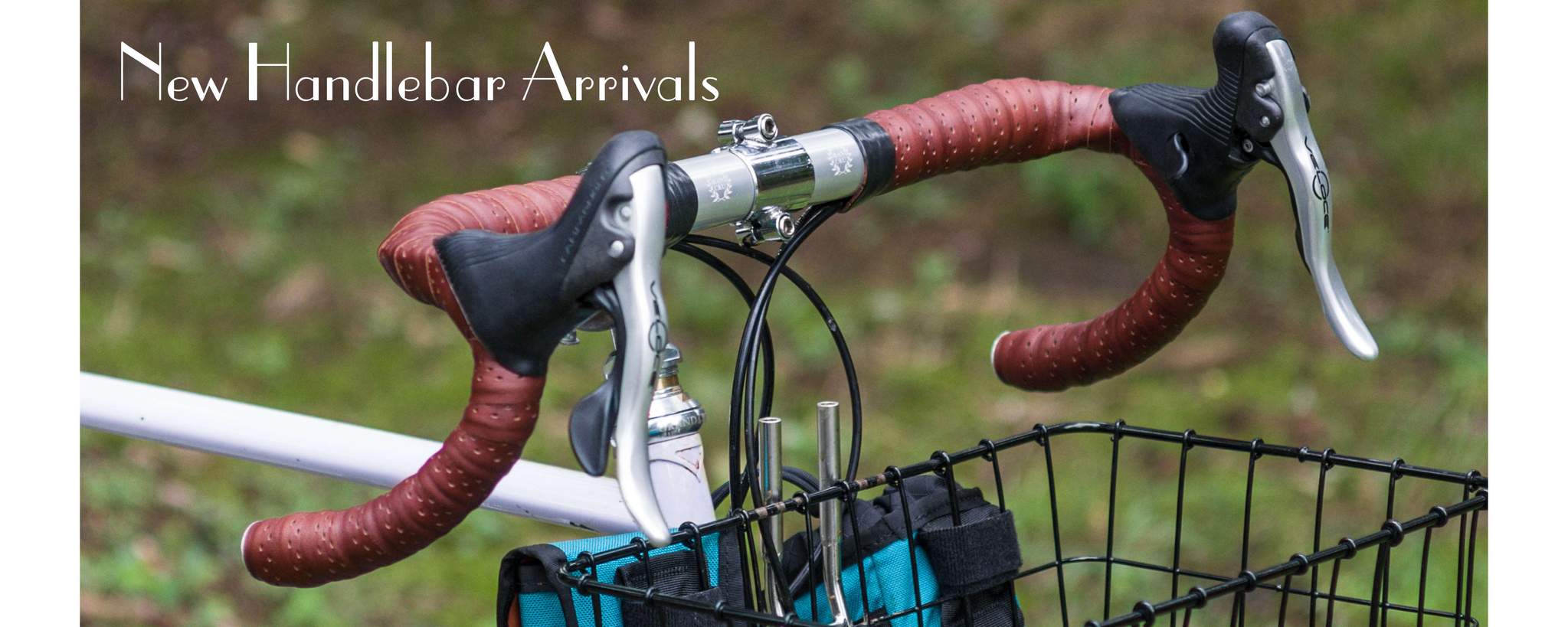
The active randonneur or cyclo-tourist will find their needs met by Velo Orange. A good example of a product that bridges tradition and modern innovation is their newly released Nouveau Randonneur handlebars. Designed with a shallow drop and gently swept back to accommodate a randonneur’s chief concern, comfort, these bars are also designed for aero brake/shift levers – an innovation far from the purview of many designers of original, classic rando bars.
Another Velo Orange offering that fills a modern need for a classic design are the Dynasis downtube shifters made by Dia-Compe. With the growing popularity of Eroica-style vintage events and their equipment restrictions, these specially designed levers allow the rider to use a larger, wide-range rear cogset of 10 or even 11 speeds without indexing (most component manufacturers stopped making downtube indexed shift levers after 9-speed). With their old-school “analog” design, a wide range of numbers of rear sprockets can be used without concern for spacing and compatibility issues that largely prevent cyclists from using parts from different component manufacturers in our modern age.
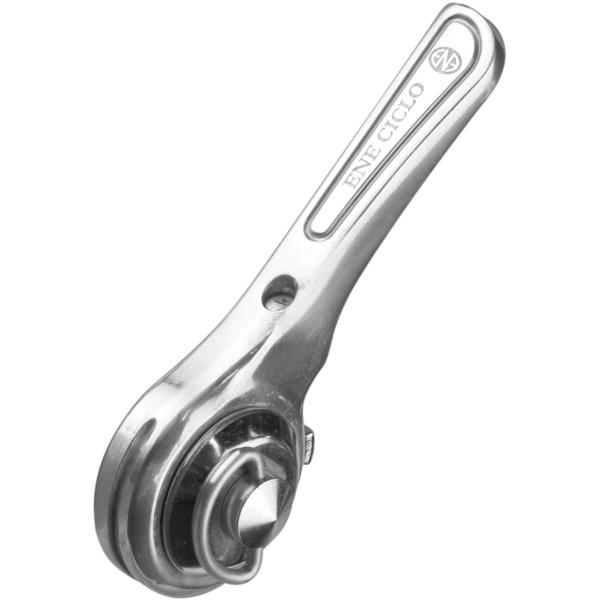
But you’re also never far from outright, unabashed nostalgia at Velo Orange, which warms the hearts of those of us of a certain age: You can buy sharp-looking gum rubber hoods for your neo-retro downtube shifters, or genuine leather toe straps (remember those?) with elegant Gran Cru toe strap buttons.
Velo Orange manages to exist firmly in the modern age while simultaneously evoking the class and elegance of a bygone era of cycling. It’s a balance that’s not easy to maintain, but perhaps it’s not surprising from this iconoclastic company whose motto exhorts cyclists to “Enjoy Life.”
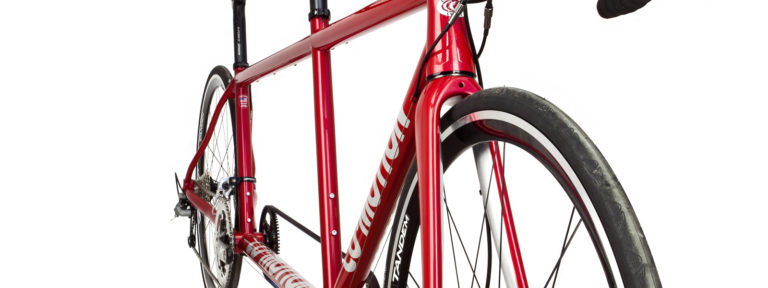
Co-Motion Cycles: one, two or three to go
Eugene, Oregon’s Co-Motion Cycles specializes in tandems, as their name implies. But, the company, founded in 1988, has spread its wings to embrace single-rider bikes. With the lush Oregon forests as an ideal testing ground, adventure bikes built for gravel roads have become a new specialty for this custom builder.
Dwan Shepard, appropriately enough the co-owner of Co-Motion Cycles, explains their design philosophy as follows: “All of our bicycles are very much built on the form follows function concept. The appearance isn’t disparate from “traditional”, but a closer look shows that every frame we produce uses material and hardware built exclusively by/for us for the sole purpose of building a better bike.”
Customers can become willing abettors to Co-Motion’s pursuit of excellence with the ability to customize a bicycle right at Co-Motion’s website. There are any number of “custom stock” Co-Motion models in both tandem and single versions, with an ample menu of wheel size, component group and brake (disc or caliper) choices. Once the customer has found the bike that suits her needs and desires, she can choose the paint from a large palette of colors in metallic and pearl finishes, and applied in a number of different patterns.
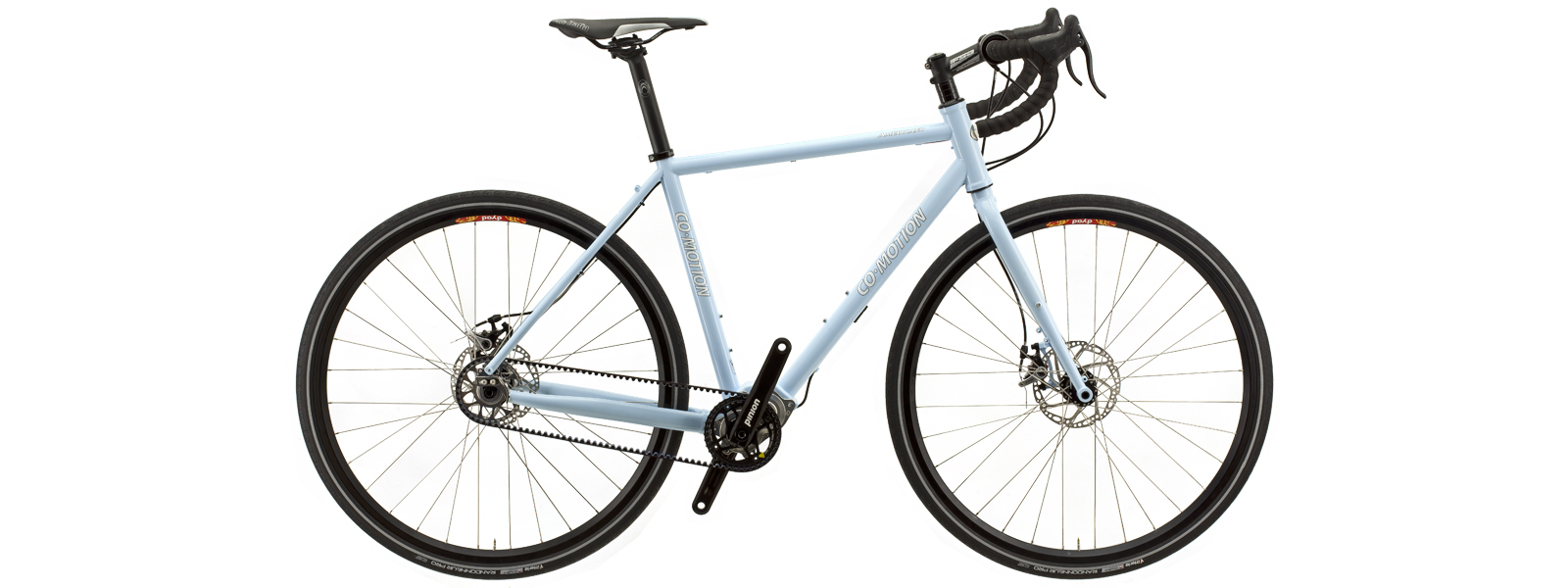
One of Co-Motion’s more interesting offerings is the Americano, a 700c wheel adventure touring bike that’s part throwback to the loaded touring bike craze of the 1980s, but also completely contemporary with its disc brakes and clearance to fit pavement-eating 38c tires. Hearkening tradition is the steel frame made from Reynolds 725 custom tubing and a full complement of mounts for fenders, front and rear racks, front headlight, and three water bottles. But the Americano looks forward with its three different drivetrain options: a traditional triple crankset and 10-speed rear cogset, a Rohloff 14-speed internal rear hub, or Co-Motion’s latest offering, a German-made Pinion 12 or 18-speed internal gearbox with Gates Carbon Drive.
The same go-anywhere ethos of Co-Motion’s single rider lineup is echoed and amplified in their tandem offerings, Co-Motion’s original specialty and the mainstay that built their reputation. Three wheel sizes are offered on Co-Motion’s tandems: 26 inch, 650b and 700c. The same customizable paint offered on single-rider bikes applies to tandems, and you can even get a “trident” model: a three-pilot bicycle for two parents and one child, or one parent and two children, with easily adjustable seat height and reach (stem length).

Co-Motion makes cycling a mutually enjoyable activity, whether embarked upon on separate bikes, as a couple on a tandem, or as a family on a trident. And with the number of customizable wheel size, frame design, paint and component options, you’re sure to find a bike that meets your needs and satisfies your desires.

Cobra Tools: builder for the builders
This is a story you might not be expecting to hear at a bike show.
Joe Roggenbuck got into framebuilding and built a brand called Cobra Frames. He bought a booth at the 2016 Philly Bike Expo and word got around about his well-crafted all road bikes that could handle any kind of terrain. He even concocted a slick marketing credo around the serpent he chose as his mascot: Strike Excellence.
Then he got out of frame building.
“I want to keep building some bikes, just to keep my head in the game. But I’m not selling any to the public anymore,” says Roggenbuck.
But this isn’t to say that Roggenbuck is leaving the bicycle world. He’s remade himself and his brand as a builder of specialty tools for framebuilders.
Using his past experiences as a framebuilder to guide him, Roggenbuck devised specific tools that, in his words, “solve annoying problems” for custom framebuilders.
Among the tools he’s developed are clamps to hold braze-ons in place as the torch is applied, and miters that hold the smaller, and sometimes curved tubes like seat and chainstays so that the builder can cut them.
Roggenbuck is only six months into his second coming as a builder for the builders, but the Philly Bike Expo has been an excellent networking opportunity for him. This year he shared a booth with Boulder, Colorado-based builder Olivetti Cycles.
It’s been a success from a sales standpoint as well. Roggenbuck showed us his tube bender that he says serves the middle ground that many custom framebuilders inhabit: between a bender that a hobbyist might use to bend a bumper for his Jeep, and an expensive, industrial-strength bender not necessary for the smaller gauge and thinner walled tubing used in bicycles. He sold one of the benders he produces for $1250 at this year’s Expo.
“Just from that sale alone, it’s been a net gain for me here,” he says.
With a nose for the specialty tools that framebuilding shops require, you’d be tempted to assume that Roggenbuck got into framebuilding with a background as a machinist. In fact, just the opposite is true. Working with metal while framebuilding cultivated a keen interest in machining specialty tools.
Roggenbuck is clearly happy with the niche within a niche he’s carved out for himself, and it’s proof that life doesn’t always turn out the way you expect it to.
“Building tools is just a more straightforward business,” he says. “Other builders sell their bikes by riding with their clients, but I was always a lot more comfortable talking shop, so this end of the business is a much better place for me to be.”

Chris Chance: Rolling boxcars again
Many frame builders struggle to have a career in bicycle fabrication, but not Chris Chance. In fact in 2015 he began a second career doing just that, with a new incarnation of the feted Fat Chance brand. 2018 is his second year at Philly Bike Expo. “I felt I had to come back after last year. The feel of this show is really nice, it’s a relaxed atmosphere,” he said about the expo.
He brought three bikes with him, the Yo Eddy mountain bike, Slim Chance road bike and Chris Cross gravel bike. He would’ve added a Wicked Fat Chance gravity bike to the mix, but the finish of the show model didn’t meet his high standards so it was left back at his Sausalito, California, base.
Chance hails from the northeastern USA, with old ties in the frame building industry to the likes of Richard Sachs and Peter Weigle. Back in the 1980s and 90s, his bikes were known for being little-known. That’s to say if a good bike feels like an extension of the rider, you probably won’t be so much aware of it, rather it will do what you want without any fuss.
The remembered quality of his bikes, coupled with the catchy titles, playing on his last name, have given Chance a smooth entry back into the cycling market.
Many owners of old Yo Eddies now wanted a new one. Chance says his current models retain much of the original company philosophy of making sound bikes that are fun to ride, but they benefit from improved brakes, gears, suspension, tires and wheel sizes.
The Wicked Fat Chance enduro mountain bike, was the biggest departure from what he has done before, sporting a 65 degree head angle and 140 mm travel fork to help the rubber side down at high speeds on gnarly descents.
“I’ve never done anything with a 65 degree head angle before, that’s new territory for me,” said Chance. “You sacrifice a little on the climb and low-speed handling, but it’s a lot more stable and controllable at higher speeds. The wider handlebars contribute to that too.”

The Yo Eddy now has 3” tires, can be run as a 1×11 or a single speed, with a choice of either 27.5+ wheels or 29er. A new CNC machined ‘demi-yoke’ was needed to accommodate the wider tires, along with proprietary-design dropouts and brake mount.
Chance sells a lot of frames with standard geometry, but he has no problem going custom when needed, for example in the case of unusual torso and limb dimensions, when non-standard tube dimensions are required to properly fit and balance the rider on the bike.
Since going outside tested standards produces what are effectively prototype bikes, custom geometry is a subject he approaches with great care. “We are set up to do custom sizing,” said Chance, “but we prefer to get some very specific numbers, perhaps from somebody who has a bike dialled in already or someone who is getting a proper professional fitting done.”
“We have a couple of different avenues we can take. One is to send a customer instructions to get body measurements, or preferably have them go to a fit shop to get body dimensions.
“The other way, which I prefer, is if they’ve been fit on a bike already or if they’ve been riding long enough to be dialled in on a bike or bikes that work for them. I send them instructions on measuring up the bike dimensions they have. That’s more accurate.
“We get some customers with a bit less cycling experience who are buying the bike because they know the brand, but usually our customers are people who have had bikes and know what has worked for them. You can trust those numbers.”
Looking around at the frame builder industry since his return, Chance commented “It feels like there are a lot more people doing it now. It’s fun to see lots of creativity in frame design and components.”
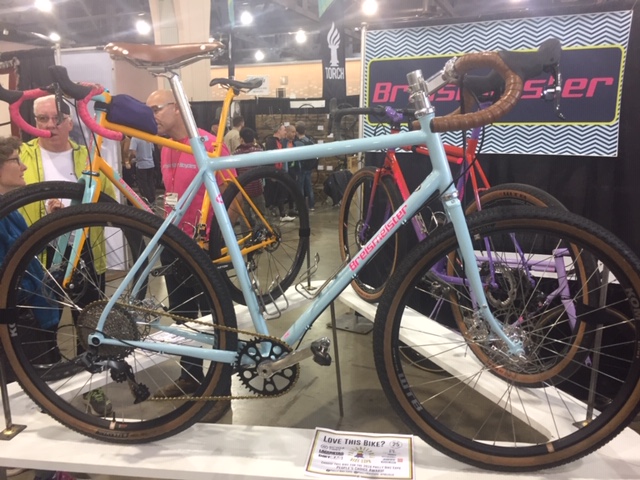
Breismeister Bicycles: Just For You
New York City has a reputation for being, well, a little impersonal. With about 10 million people concentrated in a region smaller than Rhode Island, it’s easy to get lost in the crowd.
Doug Breismeister, proprietor of his eponymous brand, doesn’t want you to feel adrift in a sea of bicycle-mounted humanity. His made-to-order custom bicycles and attention-garnering paint jobs betray this sentiment.
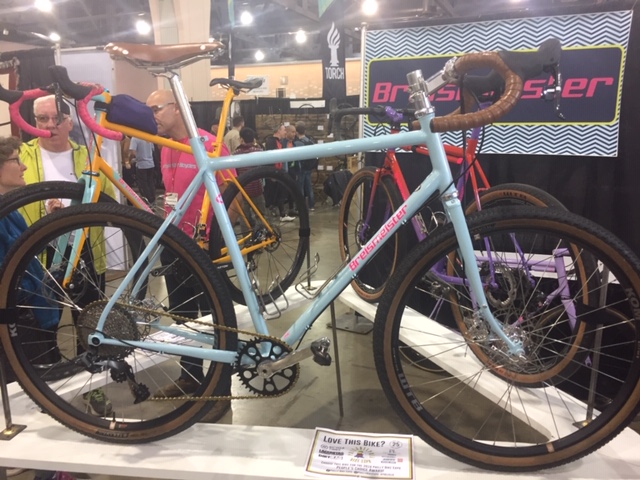
Breismeister’s beat is his frame building studio in Brooklyn, but as an active rider he escapes the asphalt of the city on longer rides into the suburbs and what little remains of green spaces on Long Island over a variety of broken city pavement, gravel paths, dirt tracks and debris-strewn bike lanes. His iconoclastic, all road bicycles suit the varied surfaces and demands of his home turf.
A sterling example of this type of category-defying steed was the bike that won the Best Gravel Bike award at this year’s NAHBS in Hartford, Connecticut, which Breismeister also brought with him to his third appearance at the Philly Bike Expo. With fillet-brazed Columbus Max tubing, compact double crankset with a wide range rear cogset, disc brakes, and 650b wheels shod with 47c wide tires, it can handle any surface thrown at it. With its use of disc brakes, the coolest thing about this bike is that it can also fit 700c wheels, albeit with slightly narrower tires (35c).
A builder for seven years now, Breismeister’s journey in the cycling world has taken him from a depressed stint as an art student in New York, onto a 3,000 mile bicycle journey to Oregon where he enrolled at Evergreen State College and started racing road and mountain bikes. Following his passion has worked a charm for Breismeister, whose blissful journey on two wheels eventually took him to Santa Cruz, California, hub of the NorCal builder’s scene and in the shadow of fillet-brazing standard-bearer Tom Ritchey.
“When I was in Santa Cruz, I fell in love with fillet-brazed bikes, in particular Mountain Goats, Moots and Ritcheys,” said Breismeister.
As a denizen of the Pacific Northwest for so many years during the 1990s, Breismeister’s role as a road, cyclocross and mountain bike racer cultivated a love of green spaces and the great outdoors. It’s clearly gotten under his skin, because when he returned to the Big Apple in the 21st century, his sojourns into the greener suburbs made him see the need for bicycles that could handle both urban jungle and suburban paths with equal aplomb.
“The all road bike is the most versatile beast out there,” he says.
As category-defying as Breismeister’s bikes seem to be, he does retain a dose of tradition through his exclusive use of steel tubing, and custom-painted top-tube mounted Silca pumps that were a mainstay of every custom builder’s offerings during the 1980s. And in addition to the all-road designs that have won him awards, Breismeister also offers representative bikes of more traditional categories like road and cyclocross.

The paint? Well that’s out of the eighties as well, with Miami Vice-like pastels, and fade jobs with matching or appropriately constrasting painted stems and seatposts. Ben Falcon Paint handles these distinctive paint schemes, whose retro gaud stops well short of being tacky or undignified.
It’s a marker of personal style for the 6’3″ Breismeister, who wears a bright pink t-shirt to promote his brand. It’s also a reminder that all bikes are personal, not just for the customer, but for the builder as well. If certain unique tastes and personal touches are not reflected in the builder’s creations, then maybe those bicycles haven’t been adequately shaped by the builder’s – the artist’s – passions.
And it is this passion that both sustains Breismeister’s craft, and wins him praise and support from others. He acknowledges the kindness of past landlords that have hosted his frame shop, who have extended him very low rents because they themselves were in the metalcraft business, or simply because they saw that he loves what he makes.
“I guess every frame builder probably says this, but I build because I’m passionate about it,” he says. “It’s a privilege to be able to do this.”
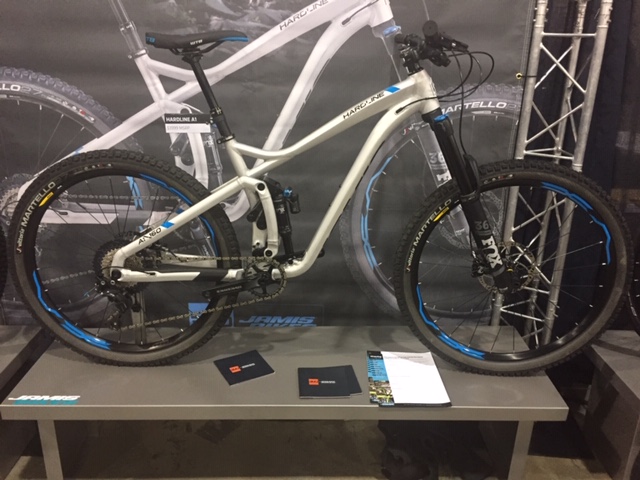
Jamis: family lines
A family-owned business started by Cypriot immigrant Georges Joannou in 1938, Jamis has been at the forefront of bicycle innovation for over 30 years. The New Jersey-based brand makes unique, high quality bikes across all categories and designed to fit all lifestyles.
Appropriately enough for a family-owned business, Jamis organizes their many different types of bikes into series, or groupings of similarly equipped bikes.
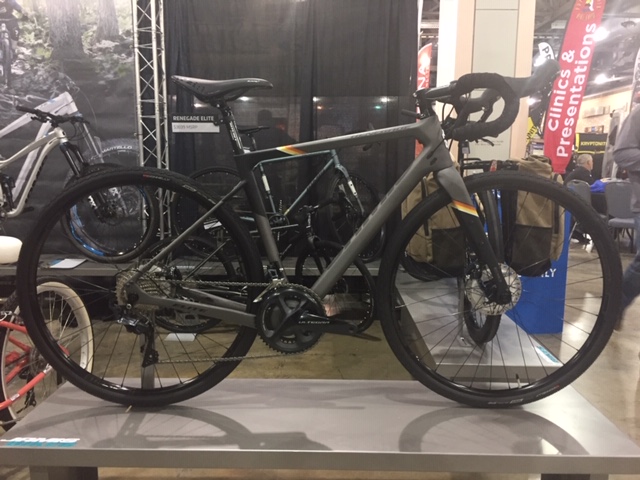
The Renegade Series has been leading the way in the growing adventure bike category; a bike designed to be so versatile it can be used as your road, commuting, bike-packing or gravel rig. With tire clearance from 25 to 47c and over 20 mounting points for racks, fenders or frame packs, the Renegade Series is unequalled in its performance and versatility.

For mountain bikers, Jamis’ 3VO (Three Variable Optimized) series of bikes, with a patented suspension platform designed by Chris Currie of Speedgoat Design has been turning heads. The unique suspension design is unlike anything else on the market currently. Unlike most dual link designs, the 3VO system maintains consistent alignment with the chainline. This allows the rider’s pedalling to propel her forward, while the bike still remains able to absorb obstacles in its path.
Bill, a product manager for Jamis, told us that the 3VO bikes “can compete with anything else out there.” They offer an ideal combination of the virtues of both full-suspension and hardtail designs, with none of the power loss.
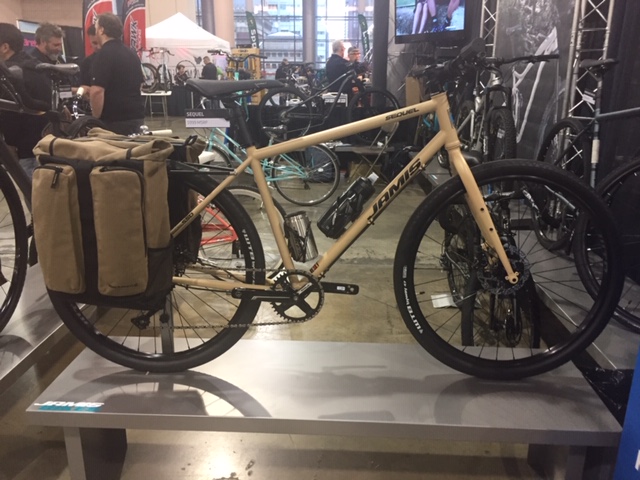
Bill also cited the Sequel urban/adventure bike as an attention-getter. It offers a comfortable and responsive ride thanks to its steel frame, made from Reynolds double-butted chromoly tubing. Jamis’ SSD custom geometry delivers an ideal combination of comfort and performance . Other features include 650b wheels with 12mm thru-axles and wide 47c tires. Hydraulic disc brakes, a 1 x 10 drivetrain and fender, bottle and rack mounts complete the package of this pedal-powered urban assault vehicle.
In a bicycle world seemingly made of carbon fiber, Jamis has been bucking the trend with its long-time use of high-quality steel frames throughout its product lines. Bill said that it’s not a rearward-looking retro-grouch effort to cling to cycling’s past days, but rather an acknowledgement of the enduring virtues of steel bicycle production.
Come check out the full line of Jamis bikes made for every rider at their Philly Bike Expo booth, or at your local Jamis dealer soon!
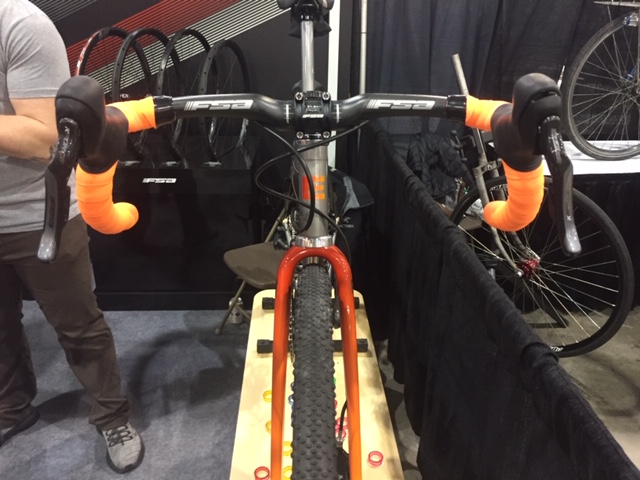
FSA: Peloton and backcountry favorite
Full Speed Ahead (FSA) came onto the scene in the 1990s, and took the road racing world by storm by introducing the first compact-gearing (50/34 chainrings) cranksets, made from carbon fiber. A number of pro riders and teams adopted their use, with their light weight and svelte looks quickly becoming a peloton favorite.
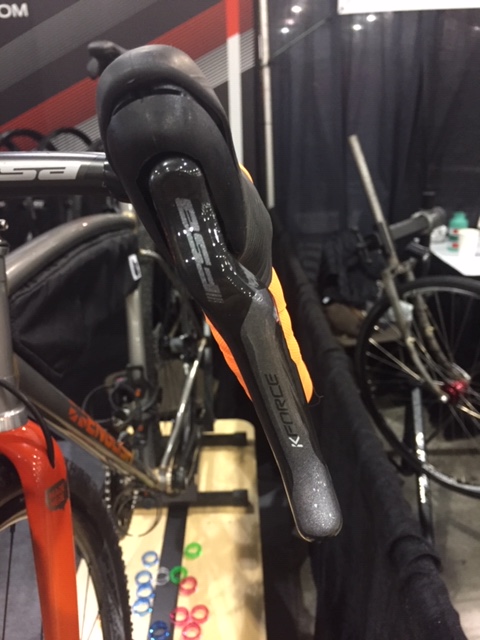
Fast forward twenty years, and FSA has now introduced a full road group, the K Force WE, complete with wireless electronic shifting, adjustable throw brake/shift levers that come in different lengths to fit your hands, and long battery life to ensure that your shift system lasts as long as your legs do.
FSA has also grown its component offerings to include a full range of components for MTB, e-bike and commuter bike uses. Derrick Henry, Director of OEM Sales for FSA USA, said that the company works with a lot of U.S.-based custom builders by supplying their components that serve a growing number of specialty applications.
Henry said that FSA’s line up for mountain bikes is expanding, in terms of the numbers of components in the marketplace, and definitely not in the weights of the components. To this end, he cited their new carbon Gradient handlebars, available in 800mm width and either 25 or 40mm rise.
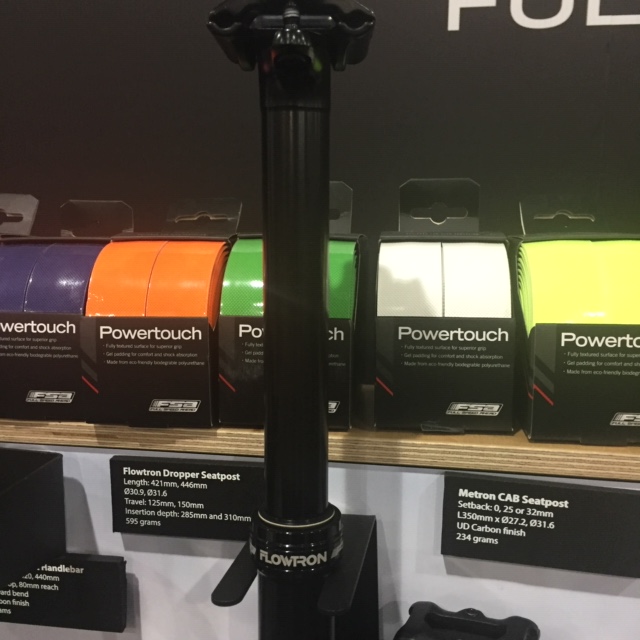
Another component for mountain bike use that offers the ideal combination of functionality, lightweight and good looks is the Flowtron dropper seatpost, available in 421 or 446mm lengths, 30.9 or 31.6 diameters, and with 125 or 150mm of travel.
Not shirking the road side of things, Henry also cited the new K-Wing AGX carbon handlebar, with internal cable routing and a flared drop for the growing subspecialty of gravel riding and racing.

It was the booming gravel road and adventure touring scenes which inspired FSA to revisit the design of their cranksets that helped build their reputation. FSA’s new “super-compact” cranksets offer chainring ratios of 48/32 or 46/30 for the super steep climbs and occasional single-track sojourns that characterize these cycling specialties.

From road to mountain bike to commuter use and everywhere in-between, FSA provides lightweight, strong and aesthetically pleasing components that will neither slow you down nor cramp your style.

Paragon Machine Works: standard bearer of the industry
Paragon Machine Works is one of the best known names worldwide for metal parts needed by frame builders as they assemble a frame. Yet when it first opened its doors for business, Paragon, which has its base at the northeastern end of the vast San Francisco Bay, might very well have gone in a different direction and not have become the international frame builder parts powerhouse it is known as today. Company founder, Mark Norstad, tells the story.

“When I started the company in 1983 it was a one-person job shop. The idea was I’d take on anything that came through the door, and the first thing that came through the door was bicycle dropouts. So that was a happy accident. Being in Marin County at the start of mountain biking… People were building bikes and they needed custom machine work.”
Although bicycle parts became an increasing part of Paragon’s work, the company has always remained a job shop, with work as diverse as making tubes, valves and bottle caps for a company in DNA synthesis, a submersible pump for landfills, wine making equipment, and even a special locking fasteners to keep nuts and bolts tight, but as time went on the company found itself concentrating more and more on bicycle work.
In 2008/9 when the Great Recession hit, Norstad recalls “All the job-shop work disappeared, and it was the bike stuff that financially got us through that. It was an eye-opener, I saw there is a real market here. That changed our focus and we’ve pursued the bike stuff more, and it’s paid off. It seems possible to me that high end bikes are more recession proof than many other manufacturing industries. If somebody has $10,000 to buy a custom bicycle, they have that kind of money no matter what the economy is doing. That’s what I saw, at least.”
Today Paragon has 12 full-time employees, including Norstad and his wife Donna. He provides parts to a wide swath of frame builders, mostly in the USA, but also the United Kingdom, Australia, across Europe and even a couple in Japan. This makes him a leading expert on what the industry is doing.
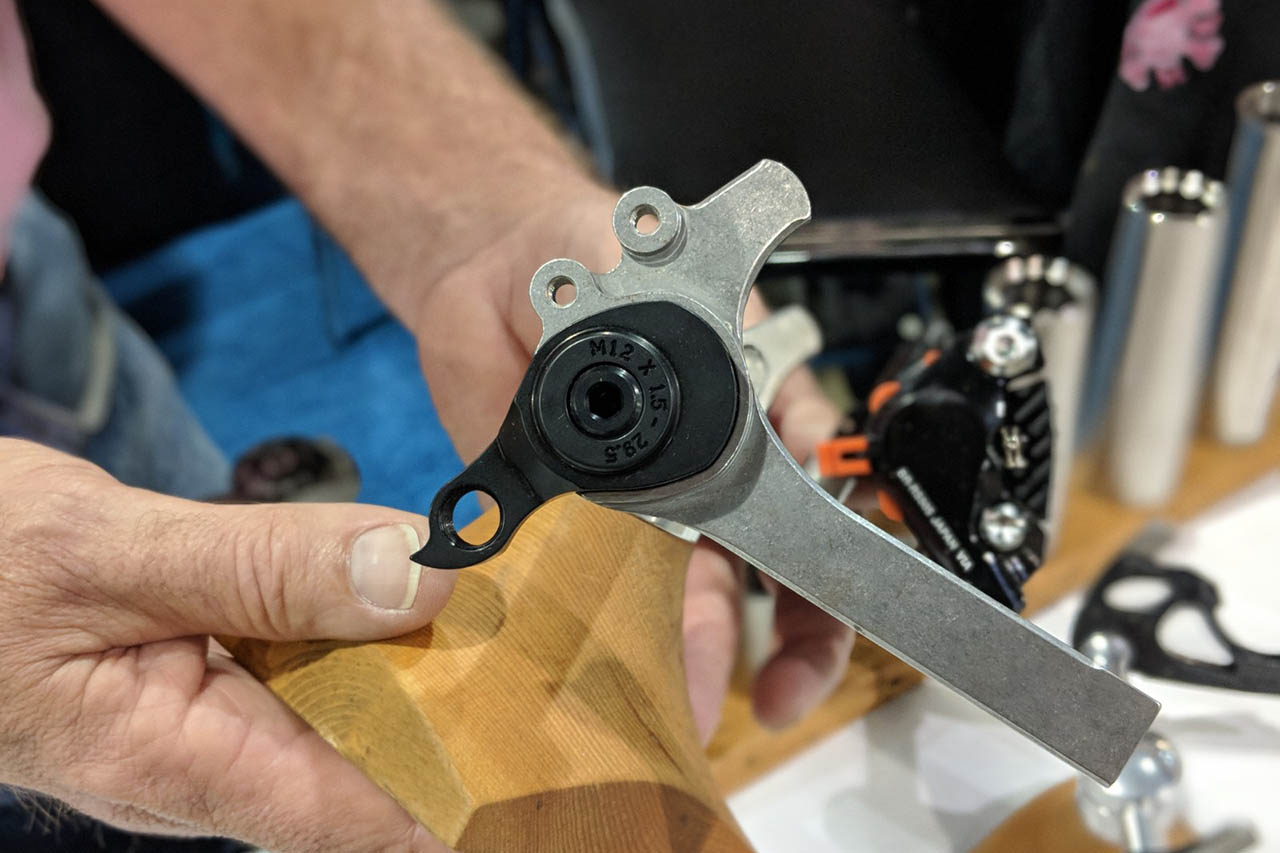
Among the newer products produced by Paragon recently are flat mount dropouts with rack eyelets for fenders and touring bikes. “That may not sound like an earth shattering thing, but if you use disk brakes and have fenders or pannier racks on your bike, it’s an important feature.”
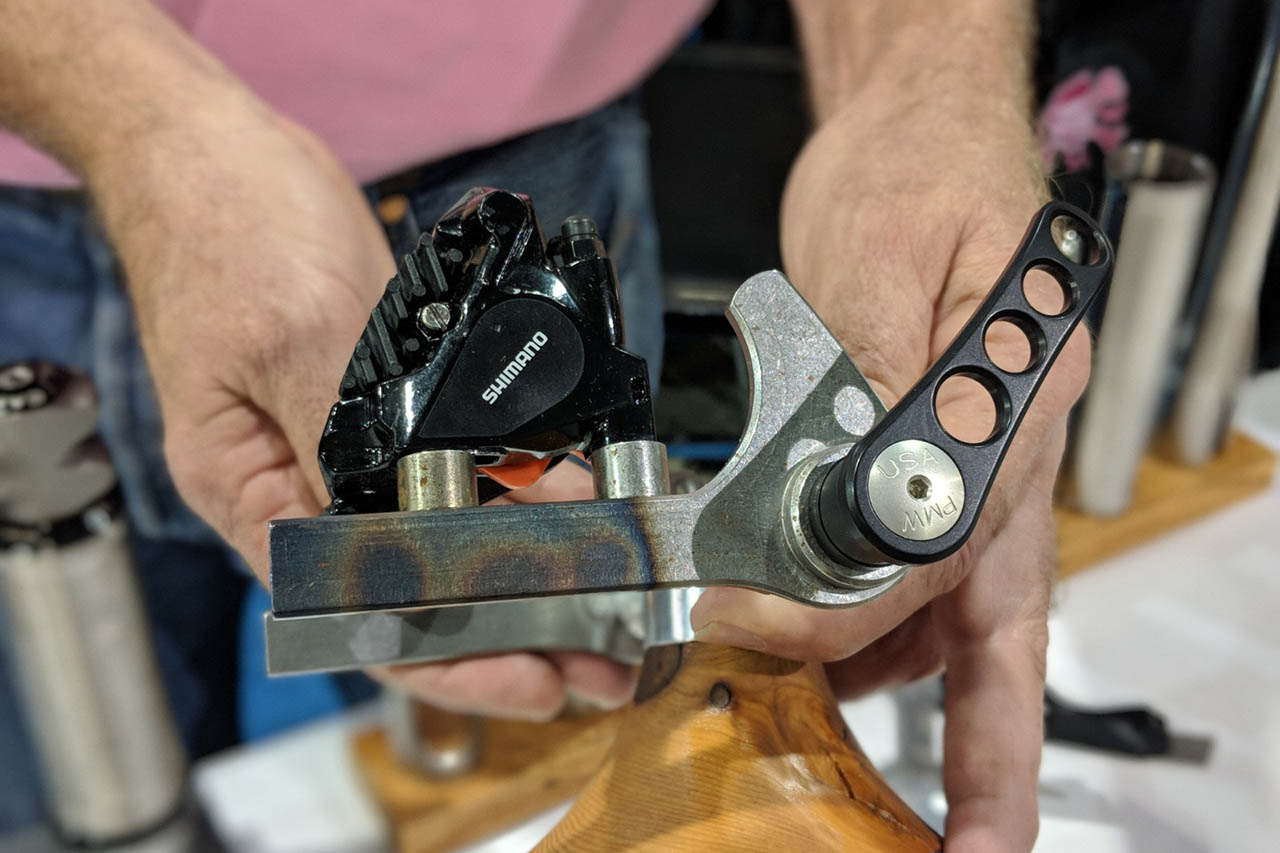
Another product that Paragon has recently added is the low-mount dropout. The enables a disc brake caliper to be mounted between the seat stay and chainstay, which is arguably the best place for it. “We’ve had that for a long while in the 10mm size, but recently we’ve started making it in 12mm,” says Norstad. These are available from Paragon in cro-moly, stainless steel and titanium.
The industry-wide move to the 12mm thru axle standard is noted by Paragon as still one of the strongest trends. And linked to this, he has recently moved the 10mm dropout onto Paragon’s list of inactive products. Other than that, Norstad says, the big thing is disc brakes on all kinds of bikes.
Back to the dropouts, though, “There are lots of 12mm axles on the market now, but the dropouts to receive them are still evolving. We’re developing a 1.5” circle, which will make the dropout lighter. But also a smaller diameter part requires less machining so we can sell it for less. So it’s going to be lighter and cheaper.”
Norstad reckons a bike made of steel or titanium will never be as light as a carbon bike, but he’s doing what he can to narrow the gap. And to think he could’ve ended up making pumps for landfill sites.
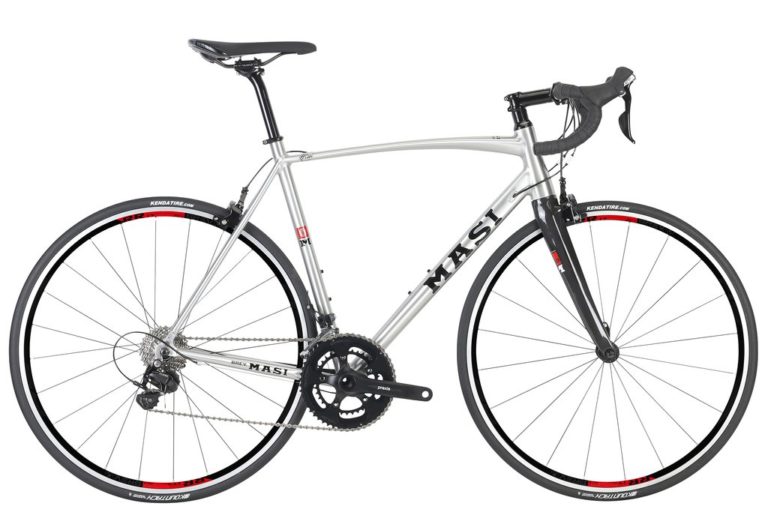
Haro/Masi: dual traditions
Any bike person knows of the 1979 movie “Breaking Away”, in which an American teenager becomes obsessed with cycling and its Italian heritage, adopting an Italian alter ego to spice up his humdrum midwestern existence in Bloomington, Indiana.
The bicycle that the movie’s hero drafts a tractor-trailer full of Cinzano wine astride: a Ferrari-red Masi Gran Criterium.
It’s particularly fitting because the Masi brand has roots in both Italy and Southern California. Faliero Masi was a former racer who set up his frame building shop near Florence. Masi Bicycles went on to produce frames for such great champions as Fausto Coppi, Louison Bobet, Federico Bahamontes, Tom Simpson and Eddy Merckx.
Through a partnership with some American businessmen looking to promote an Italian brand for the growing cycling scene in the U.S., Faliero Masi traveled to southern California to open up a production shop in Carlsbad, California in 1973. Among the fruits of the Carlsbad shop were the use of the first investment-cast lugs, and the apprenticeship of several framebuilders who would go on to produce bicycles under their own brand names. Among them were Mario Confente, Brian Baylis and Dave Moulton.
About the time that Masi was laying down roots in the U.S., another iconic brand for the uniquely American disciplines of BMX and Freestyle was setting up shop. Haro Bikes got its start in southern California in 1978, and built up a quick and passionate following throughout the 1980s.
In the 1990s, Haro, which had branched out to carry a line of mountain bikes and even a cyclocross frameset, acquired the rights to U.S. distribution of Masi Bicycles (several years earlier, Alberto Masi, Faliero’s son, had sold the Masi brand name to his American partners but continued to produce Italian-built frames under the Milano label).
Although both Haro and Masi, along with sister companies Del Sol and Shredder now sell Taiwanese-made bicycles, the dual traditions of Italy and the United States continue to shine through.
Rickey Strawn, Vice President of Sales for Haro Brands, told us that bicycles that represent the dual traditions of the Haro and Masi brands are among their best-sellers.
“Growth has been really positive and very consistent for both the Masi and Haro brands over the past several years,” he said. “BMX is coming back strong.”
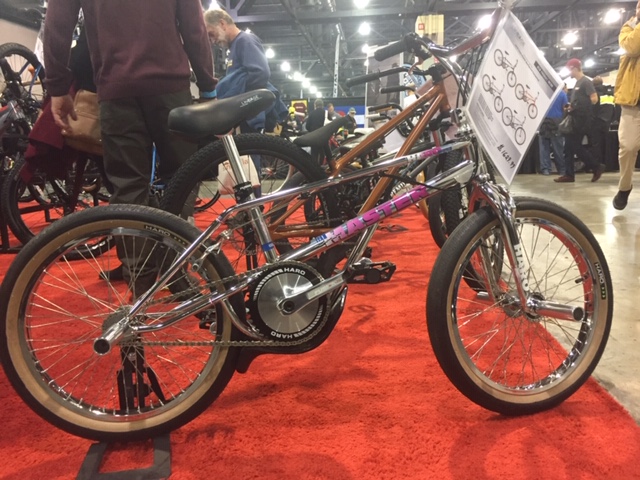
A nod to Haro’s BMX heritage was a replica of the 1989 Master Bashguard, unveiled earlier this year at Interbike. It’s part of a series of heritage replicas that are produced in small batches of 150. The 1989 replica Master Bashguard will be available in Haro dealers beginning in April 2019.
As for Masi, Italian tradition carries on through models made of steel, aluminum and carbon. Strawn told us that the gravel and adventure touring models are particularly popular right now, but Masi makes bikes suitable for a whole range of disciplines, including road and track racing.
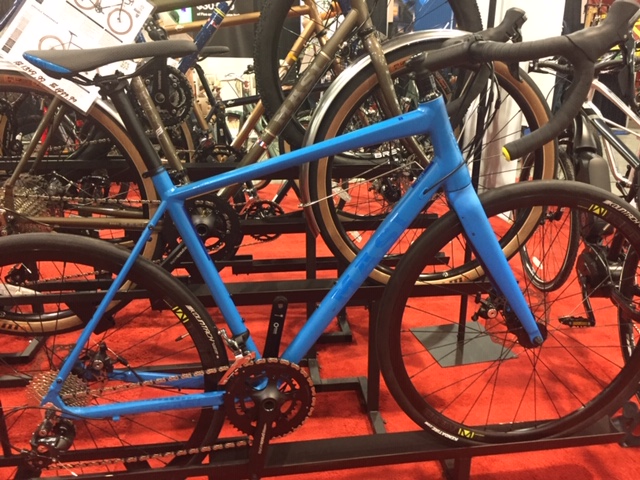
With a Hollywood ending to make Dave Stoller, the hero of Breaking Away proud, Masi has recently released an aluminum Gran Corsa SL model, with race geometry that’s an homage to the Gran Criterium ridden in the 1979 movie. “It has a stiff, lively ride quality and it feels like a carbon bike,” said Strawn.

Coast Cycles and the art of improvisation
Johnny Coast can improvise, and in this he possesses a quality that is essential for most successful frame builders.
Based in Brooklyn, New York, it might seem less than obvious that Coast’s niche is the randonnee bicycle, which is more often seen on countryside lanes rather than in a dense concrete jungle, but when the rando opportunity presented itself several years ago, he took it and here he is. The point of all this is that randonnee bikes often have retro features and require parts that are out of the mainstream.
For example, centerpull brakes. Coast has produced a neat cable hanger mounted below the headset assembly, since the old Mafac hangers were getting harder and harder to find.

More recently, Johnny has come up with a neat front derailleur clip. “I built a frame with a drive-train in mind. Then halfway through, when the frame came back from the painter, I changed my mind. I saw a Suntour XCD derailleur, and I want those. But they’re only available with braze-on fittings. I didn’t have a braze-on tab on the bike, I hadn’t thought of that, I’d been thinking of something else. So, there’s an adapter you can buy with a clamp-on, but they don’t match my style and mostly they’re made for oversize tubes, I don’t have those, so you need a plastic shim, which if you’re not careful can kink your seat tube. So I made my own. I made a little hinge out of stainless steel, took some Columbus XCR stainless tubing and modified it a little. I like how the Campy clamp-on has a little delta shape, so I kind of copied that in a nod to the old Campy clamp-ons.

It fits well, it’s stainless steel… It’s not an invention of mine, it’s something I’ve modified and gave it my spin.”
The XCD front derailleur, with the Coast clip also features on a lightweight randonnee bike he is showing at the Philly Bike Expo.

Art and Craft
Pratt Frameworks is the bicycle brand of artist/craftsman/furniture designer/framebuilder Max Pratt. Max builds custom steel frames by hand in Providence, RI. His specialty is fixed gear and cyclocross.
PBE In what ways are furniture making and frame building alike and different?
MP Furniture Making, like frame building, is all about craftsmanship. The amount of care one puts into a chair or table as a maker has a direct relationship to the surprise and delight of the user when interacting with those objects. Handmade bicycles share this quality.
PBE What are some of your other metal fabricating projects?
MP I will often weld frames for local folks who don’t have the facilities. A lot of people will find out you have a skill like that and you end up with new work. I just finished a set of multi-level racks for holding fish tanks, as an example. A lot of my furniture will also incorporate metal frames or hardware parts that I end up fabricating.
PBE Are you an RI native? How did you choose your location or did it choose you?
MP I grew up in Massachusetts, north of Boston, and spent my time outdoors and on the minuteman bike trail. Going to school at RISD brought me to Providence, and soon after, I was an official resident. As states go, RI is one of the best, and I hope to stay here a while.
PBE What’s your favorite part of the frame-building process?
MP Pressing headsets has always been a satisfying task and one that sort of commemorates the whole process, finally creating a frame-set out of a fork and frame.
PBE Where do you find inspiration?
MP I draw on the work of my fellow mentors and frame-builders for craft and building advice, and on woodworking techniques that I use in my design work. The paint is always a different source. Sometimes it’s an era or time-period, sometimes its another bike, and sometimes its an old British race car, it all depends on how me and the customer are feeling.
PBE Do you listen to music while you work? If yes, what kind?
MP Absolutely! Usually Jazz or Hip-Hop, I’ve played the upright bass for 12 years, but occasionally I’ll get into some rock n roll.
PBE What’s your favorite ride/route/destination?
MP I love getting down to the Ninigret Park in Charlestown, RI for riding fast, but my favorite place to ride is by far the Arastradero Preserve in Los Altos, CA.

Call Me the Breeze
Breezer is the namesake/brand of Marin County CA framebuilder, designer and cycling advocate Joe Breeze. Breeze pioneered the first mountain bikes. His prototype, “Breezer 1”, built in 1977, is now in the collection of the Smithsonian Institution’s National Museum of American History. In 2007 Joe Breeze, (along with other early mountain bike innovators), was featured in the documentary film ”Klunkerz: A Film About Mountain Bikes“. Today, the Breezer brand is a full line of mountain, adventure, and commuter bikes still designed under the guidance of Joe Breeze. He’ll be at the 2018 Philly Bike Expo and you can meet the legend in person! In the meantime, I sent interview questions to (and received answers from) current Brand Manager Mark Vanek. I asked him a few get-to-know-you questions.
PBE What did you do before coming to Breezer?
MV I’ve worked in the bike industry since 1993, starting in bike shops as a kid before working for manufacturers in 2000 with roles in sales, product management and marketing. Basically- I’ve loved bikes for a looong time and have been blessed to work in a few different roles that have allowed me to help empower both retailers and riders to get on bikes and have some fun.
PBE What’s your favorite part of your job?
MV Creating bikes that excite people to ride. And not just super-duper high-zoot machines. I’ve gotten the most enjoyment from seeing the look of excitement from inexperienced enthusiasts who buy a bike after not having ridden since they were kids.
PBE What’s one “Philadelphia-centric” thing folks may not know about the company?
MV In 2008 Breezer joined forces with Philadelphia-based Advanced Sports International and placed most of our internal positions here in Philly. Joe Breeze still lives in Fairfax, CA- where he built his first bikes in the early 70’s.
What’s your favorite ride/route/destination?
MV For mixed-terrain riding I have a road & gravel loop that goes through Bucks County and over into New Jersey that has a few water crossings, trail short cuts and beer stops. It’s the best for long days in the saddle! For mountain biking the sierras of central California are pretty amazing and still my favorite place for playing in the dirt.

Life as Art
Author, poet, messenger and entrepreneur Kurt Boone breathes the city. Utilizing his unique voice and vision, he shares the knowledge and experience gained from a decades-long street-level view of life. Meet him at the Philly Bike Expo where he’ll have books to sell (and sign) alongside his Messenger 841 Project line of messenger bags and streetwear.
PBE What year did you start working as a messenger ?
KB I started working as an indoor messenger/mail clerk through a college summer internship in 1978 at the headquarters of United Artist/MGM. I didn’t actually start doing street messenger work until 1990.
PBE When did you start writing with the intention to publish?
KB I started writing in my senior year in high school with an eye towards being a freelance journalist. My senior year in high school, I was on the track team and manager for the basketball team. I also owned two ten speed bicycles. My first writing assignments came from being a student reporter for York College student newspaper Pandora’s Box. I started documenting messenger culture around 2003. A licensing agent recommended that I document everything in messenger culture, as this would help my brand grow. I also worked for Urban Velo Magazine for a number of years as a freelance writer.
PBE What influenced your decision to branch out and create “the Messenger 841 Project” business?
KB In the early 1980’s I moved to Los Angeles, CA. I lived in Los Angeles for 6 years and received my associate degree in business administration from Los Angeles City College. After moving back to New York City in 1989, I did various jobs before deciding to be entrepreneur. At that point I went back to being a foot messenger. It was being a foot messenger along with my bicycle messenger co-workers that I saw “the messenger look” being some sort of fashion trend. School kids were wearing messenger bags all over the city. I was not sure to believe what I was seeing in the streets. Then one day I was looking at books in a Barnes & Noble store and I came across this book entitled “Messenger Styles”. Because of Hip Hop culture, street art and skateboarding, authentic street wear was a growing business. So in 2001, I created the Messenger 841 Project to be a streetwear brand representing messenger styles.
PBE What’s behind the name “Messenger 841”?
KB The name Messenger 841 is derived from my radio tag in 2001. In 2001 my two-way radio tag was the number 841. When dispatch called me with a pick up, they would called me 841, not by my name. So when I decided to create a clothing brand in 2001, I named it Messenger 841 using my radio code as the brand name.
PBE What’s your favorite part of the business?
KB My favorite part of the messenger business is traveling around the 5 boroughs of New York City to pick up and deliver packages. I see so many different neighborhoods and people in New York. That it is a thrill and adventure to see where my next messenger run will take me.
PBE What inspires you?
KB What inspired me to design apparel and document messenger culture is the people I meet from around the world who love their messenger job. Messengers are a unique bunch of workers that thrive on city streets around the world. The pride that bicycle messengers have is worth noting and admiring.
PBE What advice would you offer to new/young messengers?
KB Young messengers ask me for advice all the time. I tell them to learn the job and be careful. Being a messenger is a street job. I tell young messengers to be careful riding on city streets. Many times the streets are unforgiving. It makes no sense losing your life to deliver a package. On the other hand, I tell young people to take as much from the job as you can. A messenger job doesn’t always pay the best or offer the best employee benefit package, but the knowledge you get from working on the streets is extremely valuable.
PBE What notable changes have you witnessed over the years?
KB Going into my 21st year as a courier. The courier industry is in transition from a paper document business to a digital business, where at the end of the day a courier spends less time delivering documents and more time delivering parcels and often times delivering food or groceries. Not to be overlooked, if your heart likes cycling and street wear, the selling of messenger culture that involves marketing messenger bags, rain gear, track bicycles or cycling caps is something to consider. The messenger look is now part of pop culture.

Your Uber’s a Yuba
“Let’s all ditch our cars and start riding cargo bikes,” proclaimed Wired Magazine after test riding a Yuba Supermarche front loader. One of the three “A”s in the Philly Bike Expo’s tagline, is “Alternatives”, and cargo bikes really do offer a practical transportation alternative for getting around town. The aforementioned Supermarche’s easy-to-master handling can carry up to 3 kids (passengers), 3 kegs, or 300 lbs of just about anything you can imagine. A variety of rack, crate, basket and seating options are available to suit your hauling needs. The Yuba line features a range of both short and long wheelbase designs and electric assist models, too. Benjamin Sarrazin founded Yuba in 2007 and he tells a charming and inspiring first-person origin story of the company that you can read at yubabikes.com. More cargo bikes! Less cars! At the Expo, you’ll talk to Yuba’s Eastern USA Outside Sales and Events Representative, Jeff “Ride King” Wuerthele. We know Jeff because he’s a long-time bike industry vet, but he’s new to Yuba, so I asked him a few questions about his current situation:
PBE What is different and/or similar about this position compared to other jobs you’ve held?
JW Similar in that I’ve been a bike sales rep before with Kona and Diamondback. Different in that I have a HUGE territory and I’m working within the Cargo bike segment of the industry.
PBE What’s your favorite part of your job?
JW Serving people and helping to get more of them riding bikes.
PBE What developments or changes have you noticed in the cycling industry/scene in recent years?
JW Many developments. Some good, some bad. Bad: the decline of the brick n mortar retail shopping channel and experience for a variety of reasons. On-line consumer purchases bypassing the Independent Bicycle Dealer. Distracted driving as HUGE threat to road riding. Good: More miles of safe bicycle lanes in every city and a great focus by City Planning to add more. Urban lifestyle is happening, not a fad. Cargo bikes as an option to cars.
PBE What inspires you?
JW 1. God 2. Family 3. Friends 4. Serving others 5. Pittsburgh, PA
PBE What’s your favorite ride/route/destination?
JW The one I’m riding (to).

On Wheels
A lifelong racer, (he started when he was 13 yeas old) Boyd Johnson founded the company that bears his name in 2009. What began as Boyd Bikes, offering wheels, frames, and accessories, subsequently narrowed focus to just wheels, and became Boyd Cycling in 2011. As a small family-run business, supporting the family, (as opposed to a large corporation) is what drives Boyd Cycling to provide consistent high quality along with value.
PBE Are you SC born and raised? How did you choose your location or did it choose you?
BJ I grew up in Western New York and came to Greenville, SC for the first time in 1998 for a bike race. I fell in love with the town and needed a place that I could ride my bike through the winter. Moved south for the winters starting in 2000 and permanently in 2004.
PBE What are some of the biggest changes you’ve noticed in the cycling industry/scene over the years (or recently)?
BJ With wheels, obviously disc brake and chasing standards. Everybody wants to be the first to come out with something innovative even if it means developing a new “standard”. I think this has led to a lot of confusion for consumers who are tired of buying parts only to have them be obsolete a few months later. I think we have finally settled on standards for road, cyclocross, and gravel, although now it seems the MTB market is playing the game of ever changing axle standards.
PBE What’s your favorite part of operating your business?
BJ Getting to go to events, shows, and races all over the country and world. I love talking with current and potential customers about the rides they are doing, and even getting to ride with them. I also love when an idea for a project starts to come to light. That first ride on a prototype project, seeing an idea starting to come to reality is one of my favorite things.
PBE What inspires you?
BJ I just love cycling. I’ve been racing and riding since I was 13 years old, and being able to make my passion support myself and my family is something I never take for granted. Also, hearing all the happy and positive customer feedback keeps driving us to continuously improve and reminds us of why we operate the way we do.
What’s your favorite ride/route/destination?
I am a huge fan of exploration rides. I love riding in a new area, state, country and always manage to find fun routes. At home I love being able to go on the gravel roads in Jocassee gorges (we have a gravel wheelset named Jocassee). The riding in Taiwan is some of the best in the world. I head over there a few times per year and keep a bike there so I can go out and ride the super narrow, steep twisty mountain roads.

A Framebuilder’s Guide to the Galaxy
All happy frame builders are not alike. Ryan Johnson of Galaxy Gearworks has taken a very interesting journey from carpenter’s son in Arkansas to custom frame builder in Vermont. He’s been working with his hands almost since he could walk. He’s cleared the land and built his own home. The circumstance he finds himself in now is the realization of a dream. Ryan tells his story in detail at galaxygearworks.com which I recommend checking out. I asked a few more questions that weren’t already answered on his website:
PBE How did you choose your business name?
RJ I chose Galaxy Gearworks for a variety of reasons: I saw a rockabilly concert quite a long time ago with Paul Galaxy and the Galactics. It was an amazing show, and I always thought they had the coolest band name in the biz. I could never let that go. I liked the alliteration, and I’m a space nerd. So there’s that. It’s also vague enough that I could make other things other than strictly bike frames and parts. That was a huge deciding factor. Plus… it was an available domain. These days, that’s quite important as well.
PBE What’s your favorite part of the frame building process?
RJ I think my favorite part is final fit-up before the welding. That’s when all the work starts to pay off, and the bike looks like what you’ve drawn or envisioned.
PBE Where do you find inspiration?
RJ I find a lot of inspiration on Instagram for specific details and techniques, but I’d say most of my root inspiration has been from personal experiences and relationships with other people.
PBE Do you listen to music while you work? If yes, what kind?
RJ I grew up on a strict diet of heavy metal. My palette is broader now. I balance that metal side with rockabilly and punk. Heck, I’ll even go on an old school country binge from time to time. Absolutely no Radiohead or noodley jam bands though.
PBE What’s your favorite ride/route destination?
RJ My wife and I have been loving the Kingdom Trails up here in Vermont. Honestly though… my favorite is riding from my shop on my gravel bike and just finding new routes that surprise me. That’s awesome.
More 2018 Stories
- Curve Ahead
- Pello-sophy
- Art. Design. Ornament.
- Lezyne, Rhymes with Design
- Artiste et Altruiste
- Joy of Discovery
- If the Bike Fits, Ride It!
- Protecting Your Cycling Rights
- Everything Old is New Again
- Rags of Time
- Where There’s a Willary There’s a Way- ary
- It is Rocket Science
- Crust, as in Bread
- When You Think Chainlube
- Looking Sweet Upon (and Off of) the Seat
- Beards, Beer, Smiles and Wheels
- Cloaked in Mystery
- Toasty Heads, Toast Tea Threads
- Rare Bird
- Grips and Saddles, Rides and Battles
- The First 48
- To Ortlieb
- The White Industries Story
- Getting DaHang of It
- Hughes Muse
- Royal Ride

